 Leading Blog | Posts by Category |
 Leading Blog | Posts by Category |
02.01.26

First Look: Leadership Books for February 2026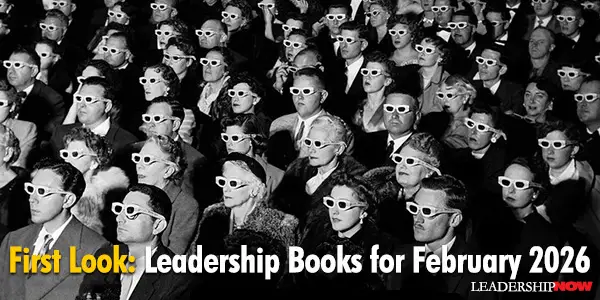
HERE'S A LOOK at some of the best leadership books to be released in February 2026 curated just for you. Be sure to check out the other great titles being offered this month.
Meetings are broken. They are relics from a bygone era of top-down hierarchies and factory-like procedures—designed to issue orders, flaunt power, and keep the hierarchy intact. In today’s digital, collaborate-or-bust era, this model isn’t just inefficient, it actively harms employees and organizations. Drawing on decades of research and stories from leading companies like Google, Salesforce, Pixar, YouTube, and Dropbox, Your Best Meeting Ever provides a blueprint to transform your meetings from monotonous, soul-crushing time sinks into powerful tools for collaboration. The secret? Treat them like products. Using seven product design principles, you’ll turn your meetings into well-designed products that actually drive work forward and serve your most important users—the people in your organization.
Welcome to the Transformation Economy. To truly compete in today's marketplace, enterprises must create transformative experiences that guide customers to achieve their aspirations, whether that's improving well-being, increasing prosperity, developing knowledge, or finding purpose. These aspirations speak to customers' greatest desires, their dreams for the future, and their conceptions of who they are and who they strive to be. In this book, bestselling author B. Joseph Pine II builds on his iconic work on the Experience Economy to explain what this new shift means for companies looking to stand out and gain competitive advantage. Using examples from organizations across industries, including Noom, Symplany, Hydrafacial, London Business School, and Johnnie Walker Whisky, Pine provides practical, proven frameworks for organizations to design, create, and guide transformative offerings that help customers reach their greatest aspirations and flourish over the long term.
Answer six simple questions daily and you can change almost anything. If you’ve ever hit a goal and thought, Now what?—you’re not alone. Permanence is your tool for lasting success—not the kind that’s here one day and gone the next, but the kind that sticks with you. How? Small, consistent steps—six questions daily—that keep you focused, on track, and synced with what you care about most. The real challenge isn’t just getting there. It’s staying there. In this book, you’ll learn the Daily Question Process, how to use feedforward instead of feedback, and how to build systems of accountability that actually work. You’ll stop thinking about quick wins and start getting better and better in a sustained way—driven by who you want to be, not what others are doing.
In an AI world that can write, code, and design, what's left for humans? Everything that matters. The world is changing fast. Are you ready for what's next? Technical skills alone won't keep you ahead anymore. Creativity has now become the dividing line between those who will lead the future and those who will be automated out of it. This book shows you how to build the creative abilities AI can't touch: finding problems worth solving, linking ideas in new ways, and infusing work with meaning that only humans understand. These aren't vague ideas - they're real skills you can start building today.
A Harvard Business School professor's guide to thinking about thinking, using the creative power of the unconscious. Gerald Zaltman's pioneering research methods for understanding the unconscious desires of customers are used by companies around the world. Dare to Think Differently draws on the same groundbreaking methods to explain the deep and innovative thinking used by highly successful executives. Reflecting emerging viewpoints in neuroscience, Zaltman contends that multiple forces, not just a brain, collaborate to produce a mind. Highly effective decision-makers are able and willing to go beyond their conscious thinking and surface powerful, creative, unconscious thoughts and feelings. They candidly ask whether what they feel they "know" is actually warranted, opening their minds to new alternatives. With this book, Zaltman presents six techniques to tap into the creative power of the unconscious: serious playfulness, befriending ignorance, asking the right discovery questions, chasing your curiosity, panoramic thinking, and using the "voyager outlook."
An empowering guide to career growth that reveals how to “be more lobster” —to never stop learning and pave the way to a meaningful working life. In today’s working world, careers are characterized by change. You can take control of your own development at any time, but many of us don't as we feel held back by time, money, or imposter syndrome. Careers used to be linear and ladder-like. They were about following in other people’s footsteps and focused on getting to the top. This predictable approach to careers no longer fits—and it doesn’t reflect people’s reality or their individuality. Enter the lobster, which never stops growing.
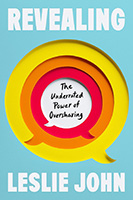 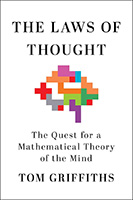 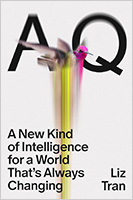 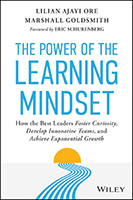
“I read books because, at their best, they make me better, more empathetic, more socially aware, more in tune to the stranger beside me. They help me imagine a better future, provide me with answers to my insatiable questions, take me to places I’ll never get to go. ” — Annie B. Jones
Posted by Michael McKinney at 05:53 PM
01.01.26

First Look: Leadership Books for January 2026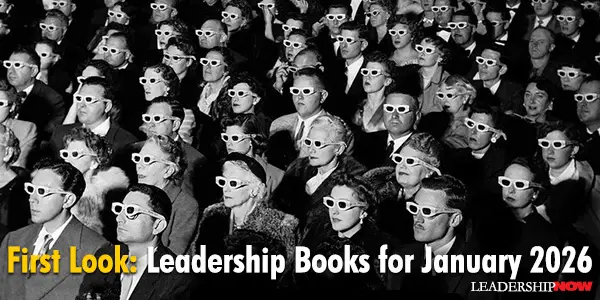
HERE'S A LOOK at some of the best leadership books to be released in Janaury 2026 curated just for you. Be sure to check out the other great titles being offered this month.
Setting goals is easy. Following through on them? A whole lot harder. It turns out, the secret to finishing what you start isn’t sheer willpower or the latest productivity hack. It’s becoming more intentional. With Intentional, bestselling author Chris Bailey distills a decade of deep research on productivity to deliver a profound, practical, and counterintuitive road map to getting things done. Forget extensive to-do lists and a never-ending workload. To reach your goals, you must structure your daily actions around what’s most important to you—and let go of the rest. This way, getting things done becomes second nature.
An eye-opening discussion on the transformative impact of AI and how to prepare for a new future. In The Next Renaissance, acclaimed AI advisor Zack Kass presents an optimistic and compelling vision of how artificial intelligence will shape our lives. Drawing on historical context, cutting-edge advancements, and firsthand experience, Kass lays out how AI will become a collaborative partner in building a better, more creative, and more compassionate world. Just as the original Renaissance revolutionized art, science, and society, today’s AI-driven Renaissance will redefine how we create, innovate, and flourish. Kass leverages his deep industry expertise to explain how this transformative technology will solve previously unimaginable challenges, presenting entirely new possibilities.
Rewire your organization—and your leadership—for a world driven by projects. It's time to stop treating projects as side work. In the age of constant transformation, projects are the primary way organizations create value and accelerate innovation. In this new paradigm—the project economy—traditional agile approaches are no longer enough. The next evolution is the project-driven organization, where projects sit at the center of how companies are structured, led, and rewarded. Powered by Projects explores this bold new model. Antonio Nieto-Rodriguez, the worldwide expert on project-based work, reveals the leadership styles and organizational structures necessary to drive success today.
Great ideas are all around us, waiting to be discovered. Here’s how to find them. We’re used to imagining creativity as a lightbulb moment—sudden, mysterious, reserved for the gifted few. But what if ideas aren’t conjured from thin air? What if they’re discovered—more like precious artifacts that we unearth and refine? In How Great Ideas Happen, cognitive scientist George Newman draws on cutting-edge research to show that creativity isn’t magic, it’s method. The most successful innovators don’t wait to be struck by brilliance; their creative process is more like archeology. As keen-eyed explorers, they scan the terrain, dig with intention, and, with a little luck, find gold.
Whether you are practicing guitar, pushing your limits at the gym, leading a team, honing a craft, studying medicine, or giving yourself the time and space to finally write that book, the pursuit of excellence is a big part of what makes life worth living—and it is for all of us. Unlike "pseudo-excellence," which is about hustle culture and hacks, genuine excellence is about challenging yourself in worthwhile endeavors, focusing on what matters most, and expressing the unique qualities that make you who you are. Too often, we get caught up in convenience and distraction to the detriment of our true potential. The good news is that we can set ourselves on a better path, one that includes more aliveness and resonance, more connection to self and others. Here, Stulberg finds convergence between modern science, age-old philosophy, and daily practice to explain that we are wired to strive for excellence—it is what we are here to do, core to our humanity. Yet our environment often works against us.
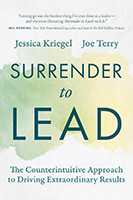 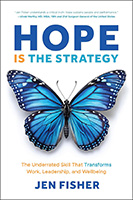 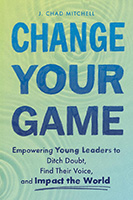 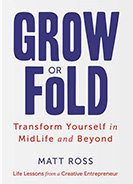
“I read books because, at their best, they make me better, more empathetic, more socially aware, more in tune to the stranger beside me. They help me imagine a better future, provide me with answers to my insatiable questions, take me to places I’ll never get to go. ” — Annie B. Jones
Posted by Michael McKinney at 05:01 PM
12.19.25

The Best Leadership Books of 2025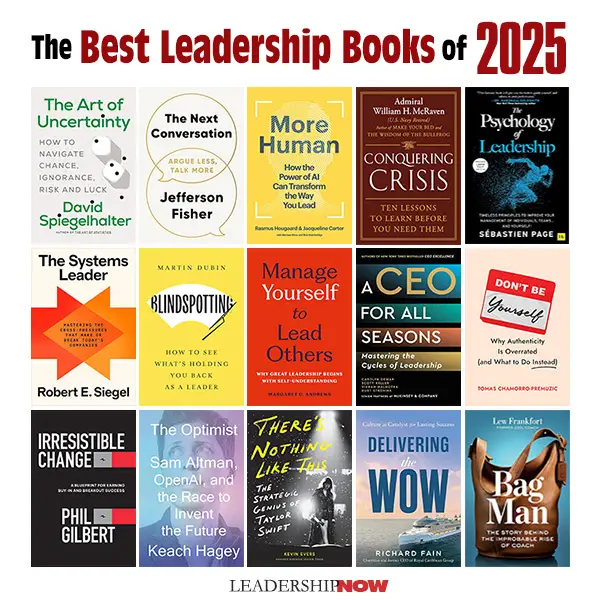
THE titles listed below, published in 2025, improve our self-awareness regarding relationships and communication the sine qua non of leadership and provide us with a wider perspective on innovation and the changes taking place around us.
(W. W. Norton & Company, 2025)
(TarcherPerigee, 2025)
(Harvard Business Review Press, 2025)
(Grand Central Publishing, 2025)
(Harriman House, 2025)
(Crown Currency, 2025)
(Harvard Business Review Press, 2025)
(Wiley, 2025)
(Scribner, 2025)
(Harvard Business Review Press, 2025)
(Wiley, 2025) Biographies:
(W. W. Norton & Company, 2025)
(Harvard Business Review Press, 2025)
(Fast Company Press, 2025)
(Harvard Business Review Press, 2025)
Posted by Michael McKinney at 10:21 AM
12.01.25

First Look: Leadership Books for December 2025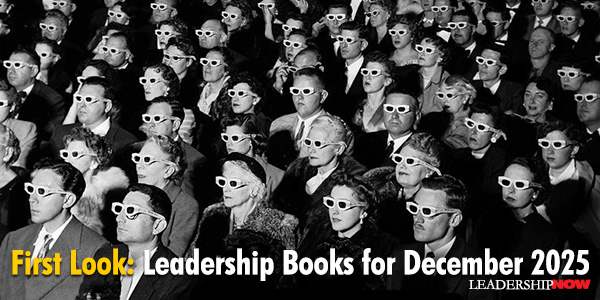
HERE'S A LOOK at some of the best leadership books to be released in December 2025 curated just for you. Be sure to check out the other great titles being offered this month.
In a world more connected than ever, why are we all feeling so disconnected? Leadership expert Dr. Michelle K. Johnston reveals the hidden crisis plaguing modern workplaces: an epidemic of disconnection that’s eroding team performance, personal satisfaction, and organizational success. The Seismic Shift in You offers a transformative approach to leadership that starts with the most critical factor—you. Drawing on years of coaching top leaders and the latest research, Johnston outlines seven powerful shifts to help you lead more effectively, including: Rediscover your sense of purpose and direction, Transform everyday interactions into meaningful connections, Spark authentic engagement by starting from within, and Cultivate high-performing teams grounded in trust and collaboration. With real-world stories and practical tools, Johnston offers the clarity you need to lead with greater meaning, fulfillment, and results.
AI tools are already reshaping the way we work and communicate, but as they gain autonomy, they will no longer be mere tools; they will become active participants in our world. As our digital identities become smarter and more capable, we enter the age of “Identic” AI: a place where ever-present AI companions streamline daily tasks, enhance wellbeing, and offer lifelong learning. For professionals, these intelligent agents will amplify creativity, boost productivity, and expand human potential. But with this extraordinary promise comes profound risks—to individuals, businesses, and society itself. From technology experts Joseph M. Bradley and Don Tapscott, You to the Power of Two is a thought-provoking and timely guide that will prepare readers to thrive in world of personal AI agents
In Monster Transformation, a team of veteran digital leaders delivers an expert framework to digital transformation that focuses on the competencies your employees will need to have―and develop―to enable your organization to function in a world defined by generative artificial intelligence. Monster Transformation blends actionable insights, real-world case studies, and immediately recognizable organizational behaviors that can either move forward or derail transformation in the age of AI. Whether you are leading, a part of, supporting or interested in organizational transformation, this book challenges conventional thought on dealing with transformation, provides insights on how and why barriers to effective change arise and pragmatic mechanisms to address challenges, diminish barriers and leverage employees.
If you're wondering how to stay relevant in a world where AI seems to be mastering capabilities once thought to be uniquely human, from cognitive tasks to emotional intelligence, Human Edge in the AI Age is your answer. This is not another book about what AI can do. It's about what you can do to thrive alongside it. As AI disrupts industries and job roles and the possibility of job displacement looms, it may also herald a new human renaissance---an Era of Entrepreneurs---where individuals take charge of their destinies, innovate fearlessly, and create value grounded in timeless human strengths such as creativity, empathy, and leadership. To navigate this seismic shift, Nitin Seth introduces the POSSIBLE framework, an original eight-dimensional guide to rediscovering the human edge.
Our organizations are stuck. We talk about agility but find ourselves bogged down in bureaucracy. We aspire to innovate but run into systems built to prevent mistakes, not spark breakthroughs. We need to learn and adapt, but we're operating with an outdated playbook built for efficiency and control. And our attempts to fix all this—by pouring trillions into huge, top-down transformations—make the problems worse. But there is a better way: Building an Octopus Organization. One of nature's most intelligent and curious creatures, the octopus is everything your organization needs to be: smart, endlessly adaptable, and highly resilient. Its eight tentacles work in concert, but each can also think for itself. This book shows how to achieve the same balance of cohesion and autonomy and to guide your organization toward a living, breathing system—one that learns, adapts, and thrives by tapping into the distributed intelligence of its people.
 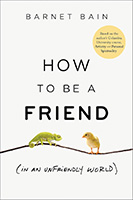 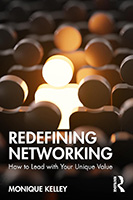 
“You can't think well without writing well, and you can't write well without reading well. And I mean that last "well" in both senses. You have to be good at reading, and read good things.” — Paul Graham, Y Combinator co-founder
Posted by Michael McKinney at 12:59 PM
11.01.25

First Look: Leadership Books for November 2025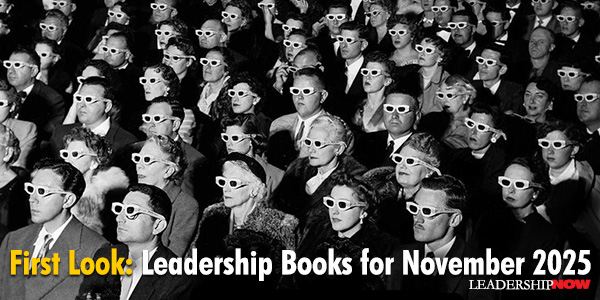
HERE'S A LOOK at some of the best leadership books to be released in November 2025 curated just for you. Be sure to check out the other great titles being offered this month.
What is the brand strategy Apple, Starbucks, and other market leaders have mastered for decades, yet never name? It’s not differentiation. It’s not purpose. It’s something far more powerful, and in today’s hyper-competitive business world, it’s the only strategy that consistently wins. It’s called De-Positioning, a method that turns your competitor’s strengths into liabilities while positioning your brand as the only solution your customer truly trusts. De-Positioning works by identifying the most critical problem your customer needs solved, exposing how your competitors fail to solve it, and making your brand the clear, inevitable choice. When applied with discipline, it renders competitors irrelevant.
What’s your Next Play? An elite performance coach reveals the life-changing two-word philosophy for simplifying success. It’s easy to become convinced that the secret to a great career, a high-performing team, or a fulfilled life must be hidden in a complex formula or framework. The truth about success is that it isn’t complicated. We just tend to make it that way. This book contains 34 powerfully simple strategies and 35 practical exercises designed to show how reaching the top of your game doesn’t require more. It requires less but better.
Strong cultures don't emerge by accident. They're built—with clarity, consistency, and design. This is your guide. Today's leaders are navigating a storm of competing demands: rising economic and social pressures, rapid technological disruption, and a workforce that expects greater purpose and accountability than ever before. In this unpredictable climate, a weak culture erodes trust, loyalty, and performance. A strong one, by contrast, makes the difference between clarity and confusion, resilience and fragility. It's time to get intentional about your company's culture.
Stop being someone who could succeed and become someone who predictably should succeed by using a revolutionary “probability hacking” framework to increase your odds of success. Every goal that you’re pursuing has two hidden numbers attached to it—a probability of success and a probability of failure. Whether you’re trying to start a business, run a marathon, get a promotion, earn a pilot’s license, grow a bumper crop of tomatoes, or sign an acting deal, these two percentages are always lurking in the shadows predicting what is going to happen. But most of us never think about them. We assume our odds are unknowable and unchangeable. This dangerous lie leads millions of people to fail at goals where they were perfectly capable of succeeding. You can choose a smarter path.
Quick Leadership by Selena Rezvani equips you with modern, people-first strategies for leading in today's fast-moving, fast-changing workplaces. Forget outdated, top-down management―this book is packed with real-world tips that help you build trust, boost performance, and bring out the best in your team (without burning yourself out). Selena Rezvani, a renowned leadership expert and coach, guides readers through simple, doable strategies that boost trust, inclusivity, and innovation - critical elements in a time when employees are demanding more purpose, autonomy, and respect in their work. In Quick Leadership, Rezvani offers a wealth of insights on how to cultivate a thriving work culture.
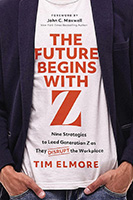 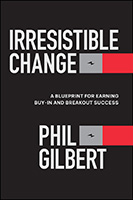 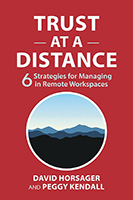 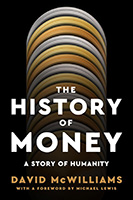
“You can't think well without writing well, and you can't write well without reading well. And I mean that last "well" in both senses. You have to be good at reading, and read good things.” — Paul Graham, Y Combinator co-founder
Posted by Michael McKinney at 08:35 AM
10.01.25

First Look: Leadership Books for October 2025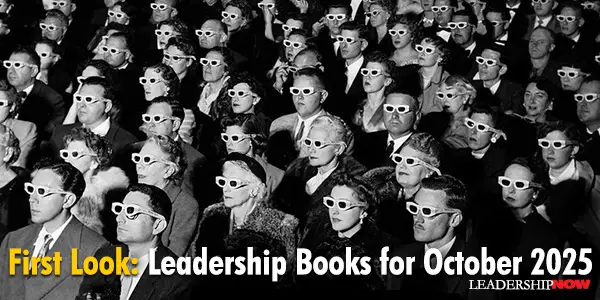
HERE'S A LOOK at some of the best leadership books to be released in October 2025 curated just for you. Be sure to check out the other great titles being offered this month.
In the high-stakes world of corporate leadership, becoming a Fortune 500 CEO is an Everest-like ascent—with only the savviest managing to avoid falling off the mountain. In A CEO for All Seasons,you’ll find an essential climbing route that will take you through every stage. Unique in applying a number of sophisticated metrics to isolate the world’s top 200 CEOs, reduce them to a representative sample, and then reap their wisdom, the McKinsey team, in A CEO for All Seasons, spotlights the specific stage-based hurdles that CEOs face. From preparing for the role to starting strong to sustaining momentum to ensuring a lasting legacy, the book leaves no segment of the journey unmapped. Along the way, it offers proven strategies for maintaining forward progress and, crucially, alerts readers to common blind spots that can sabotage success, as revealed by a detailed survey of thousands of executives.
"Just be yourself" might be the worst advice you've ever received. For years, we've been told that authenticity is the key to success—that we should be true to ourselves, tune out others' opinions, and lead with unwavering genuineness. This feel-good message has spawned countless self-help books, leadership seminars, and viral social media posts. There's just one problem: science says it's wrong. Drawing on decades of research, renowned psychologist Tomas Chamorro-Premuzic reveals an uncomfortable truth: our obsession with authenticity is backfiring. From Silicon Valley's authenticity worship to failed diversity programs, he exposes how our fixation on our "true selves" undermines both individual and organizational success.
Ever wonder why some of our most effective leaders aren’t known for the skills we’ve been told are essential for great leadership? Would you describe Elon Musk or Steve Jobs as having empathy or humility? Of course not, and yet they’ve led teams that achieved extraordinary results. So, what leadership attributes, habits, and skills do cause teams to become more than the sum of their parts? Why does a team made of up superstars often underperform? What causes teams to work together effectively and produce high team intelligence? Jon Levy unpacks the myths that hold leaders and their teams back and points out the paradox of success: focusing on creating teams that operate well is what makes an effective leader, but focusing purely on the leader does almost nothing for the team.
Your mindset may be the only thing standing between you and your potential. Break free from the beliefs that hold you back. As a leader, do you find yourself frustrated, wondering why employees don't meet expectations, peers are slow to act, or pressure from your boss falls unfairly on your shoulders? It's easy to point a finger at others and double down on getting results. But have you ever considered that the problem might not be them—that it might be you? In Leadership Unblocked, Wilkins reveals seven key beliefs that hold leaders back, from "I know I'm right" to "I need to be involved" to "I don't belong here." Combining illustrative and powerful coaching conversations and research from the fields of neuroscience, leadership, and adult development theory, Wilkins offers a self-coaching guide for identifying, unpacking, and breaking through these barriers.
In Delivering the WOW, Fain shows how a culture united people around a mission, delighted guests, and unlocked extraordinary performance. Drawing on vivid stories from 33 years at the helm, Fain explains how a remarkable culture was forged and strengthened through: • Alignment: ensuring every employee understands the same clear mission, beyond hierarchy or titles • Intentionality: never losing sight of the ultimate goal and ensuring that every action, big or small, supports that objective • Continuous improvement: never being satisfied; always believing that there are ways to improve • Crisis response: deeply rooted culture as a stabilizing force during black swan events, including the global pandemic. Invaluable principles like these are woven into unforgettable stories which help explain how the company's profitability, guest capacity, and employee base all grew more than thirtyfold.
Robert Dilenschneider delivers an insightful and original discussion of how to cultivate respectfulness in every facet of your life. You’ll learn how to embody and encourage respectful behavior and speech among work colleagues, family, friends, and others. You’ll learn about how respectfulness has life-changing consequences for all who practice it and why it’s within reach for us all. You’ll also discover why it’s so sorely needed in an increasingly fragmented society and how it can transform our interactions for the better.
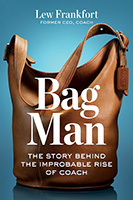 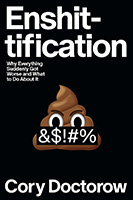 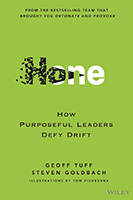 
“You can't think well without writing well, and you can't write well without reading well. And I mean that last "well" in both senses. You have to be good at reading, and read good things.” — Paul Graham, Y Combinator co-founder
Posted by Michael McKinney at 08:58 AM
09.01.25

First Look: Leadership Books for September 2025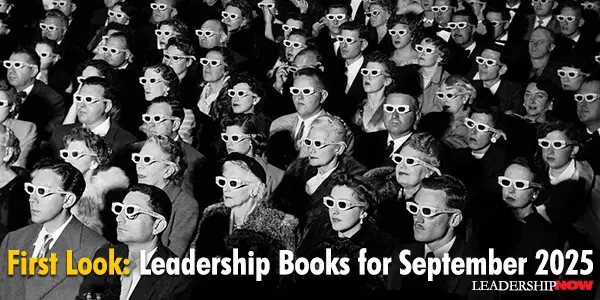
HERE'S A LOOK at some of the best leadership books to be released in September 2025 curated just for you. Be sure to check out the other great titles being offered this month.
Why are groups so hard? From boring work meetings to dysfunctional families to warring nations, group dynamics shape every aspect of our lives. How can we avoid the common pitfalls of living and working together and get the most from our groups? The solution isn’t to change individuals—it’s to understand the world from a collective perspective. In The Collective Edge, Colin Fisher, one of the world’s foremost experts on group dynamics, distills decades of research into practical strategies to help groups function at their highest levels. The secret to getting the most from your groups is knowing how to work with the invisible forces of group dynamics instead of being mindlessly pushed around by them. Whether you’re a leader, team member, or simply interested in better understanding how groups work, The Collective Edge provides essential wisdom that will help your groups unlock their true potential.
Based on real-world evidence from senior executives and successful entrepreneurs, this book argues that an effective leader must act like an ambivert: an introvert at times and an extrovert at others. Thanks to landmark books such as How to Win Friends and Influence People, many professionals think that only extroverts can be standout leaders, but Karl Moore’s interviews with over 750 CEOs from around the world prove that introverts make excellent leaders too. These insights make clear that the optimal leadership style is ambivert, with senior leaders combining introversion―being excellent listeners and thinking before they speak―and extroversion―inspiring and connecting with their teams. This book teaches how introverts and extroverts work, manage, and lead effectively and how readers can be better leaders regardless of their natural communication style. It empowers leaders to celebrate the strengths of their personality type while being flexible and to understand when to incorporate the strengths of other types into their leadership approach to be more effective.
What is the “best” way to lead others? The answer may surprise you. The basis for powerful, effective leadership comes from within—from understanding the people, ideas, and events that have shaped your worldview and how these influences express themselves in your leadership style. In Manage Yourself to Lead Others, leadership expert Margaret Andrews helps you understand yourself and translate this understanding into effectively managing yourself, leading others, working with your boss, and making better decisions. Andrews has taught thousands of executives in her professional development course at Harvard, and she shares her insights, practical tips, and questions for reflection here. This book will allow you to identify the kind of leader you want to be, the behavioral patterns that help get you there or stand in your way, and what it takes to develop new leadership capabilities.
Since 2020, global events have reshaped our expectations of work and leadership. Today's workforce seeks more than just a paycheck; they crave meaning, purpose, connection, and belonging. Traditional leadership models no longer suffice. In The Secure Leader, Dr. Jaime Goff offers a groundbreaking path forward. She argues that true leadership begins not with mastering techniques, but with understanding who you are and why you lead. Embark on a transformative journey of self-discovery and learn how to: • Deconstruct Your Story: Explore how your early experiences have shaped your worldview and leadership approach, often embedding hidden anxieties and insecurities. • Identify Key Themes: Recognize the constructive and destructive patterns that influence your interactions and decisions. • Re-author Your Narrative: Develop a new, empowering leadership story that honors your past, strengthens your present, and creates a foundation for a fulfilling future.
In their important new book, Wharton professor Peter Cappelli and workplace strategist Ranya Nehmeh deliver a balanced, research-based approach to navigating the complex landscape of remote and hybrid work. They provide a fresh perspective on why hybrid models often fail and what organizations must do differently to succeed in this new era―with takeaways that may not be welcome to all. In this timely book, discover: + Why remote work succeeded initially but has become increasingly problematic over time + What has been lost with the move away from in-office work, The hidden benefits of in-person work, How work dynamics post-pandemic have further influenced workplace culture and employee attitudes, How career advancement opportunities have changed, How new hires are faring, and How the changes have impacted home life. In Praise of the Office also reveals when in-office works best, when fully remote work works best, and what is required to make hybrid work. Plus, it identifies what aspects of hybrid can do the most damage to employers and employees.
Capitalism has historically focused on profit generation, with positive impact left to non-profits. This system has fueled unprecedented growth, but has also generated unsustainable consequences—deepening inequality, widespread job displacement, and eroding social trust. It’s time for a new paradigm—one that recognizes the inextricable link between positive impact and returns. Long-term profitability depends on maintaining public trust, societal wellbeing, and operating legitimacy. This new reality necessitates a new set of principles—transformation principles—to guide our decision-making as we build for growth and for good.
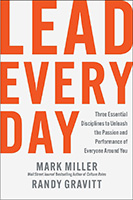 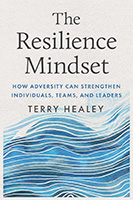 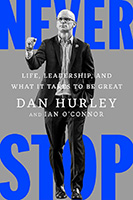 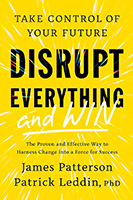
“You can't think well without writing well, and you can't write well without reading well. And I mean that last "well" in both senses. You have to be good at reading, and read good things.” — Paul Graham, Y Combinator co-founder
Posted by Michael McKinney at 08:49 AM
08.01.25

First Look: Leadership Books for August 2025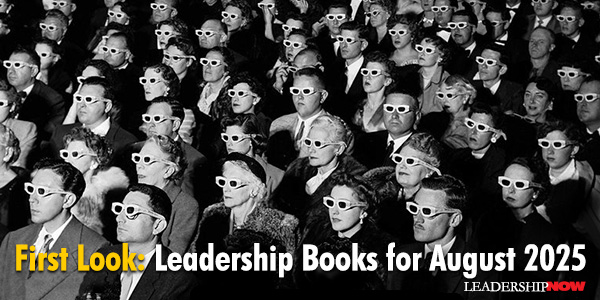
HERE'S A LOOK at some of the best leadership books to be released in August 2025 curated just for you. Be sure to check out the other great titles being offered this month.
The brutal truth: most startups and scale-ups don't fail because of bad products. They fail because they never figure out how to grow fast―and profitably. Some chase market share at all costs, burning cash on customers who won't pay enough to sustain the business. Others over-monetize too soon, pushing away the customers they need to reach scale. Still others obsess over customer loyalty, missing larger markets and monetization potential. And then there are those who assume a great product will sell itself, only to realize too late that pricing, packaging, positioning and value selling matter just as much. The true winners take a different approach. They adopt a Profitable Growth Mindset, refusing to choose between market expansion and monetization―instead, they dominate both. Instead of relying on instinct or momentum.
What if you could summon genuine confidence anytime you need it? Being happier, building better relationships, overcoming fear: the missing link between you and everything you want to achieve is self-confidence. The problem? Confidence is hard to build, and even when we do, it often feels temporary and forced. After years of research and working with over 250,000 individuals, Juan Bendaña uncovered the four myths about confidence that actually cause and reinforce self-doubt. Confidence is not linked to genetics, extraversion, insecurities, or competence. To combat these myths, Juan Bendaña developed the Confidence Cycle, a repeatable flywheel that will help you gain and sustain confidence in every aspect of life through three key decisions: Decision #1: Micro-Energy, Decision #2: Micro-Courage, Decision #3: Micro-Action
Great leaders don’t just see the path ahead—they see themselves clearly first; mastering self-awareness is the difference between thriving at the top and blindly leading toward failure. Great leaders aren’t just skilled strategists—they’re deeply self-aware. In Aware, Les Csorba, reveals how identifying blind spots and having the courage to address them can determine the success or failure of a leader and their organization. Drawing from decades of experience as a Partner with Heidrick & Struggles, the worldwide recruiting and leadership consulting firm advising top executives and Fortune 500 corporate boards—and his time serving as Special Assistant to the President in the White House —Les shares how self-awareness, paired with bold action, separates exceptional leaders from those who fall short.
Be yourself. Be fully present. Be in the moment. This is a message we hear constantly. While this may be beneficial some of the time, the biggest obstacle to making wiser decisions that actually drive lasting success is ourselves. Being fully immersed in our own limited point of view biases our decisions toward defending our previous actions and maintaining our self-image. We need to exit our me-here-and-now self and get an outside perspective that sees us and the situation we are in objectively. We need a coach. This book shows us how to become our own coach by using a mental technique called psychological distancing.
Tap into your hidden intelligence and transform your life. How are some people so much smarter than the rest of us? Where do visionary creatives and savvy decision-makers like Vincent van Gogh, Steve Jobs, Abraham Lincoln, Maya Angelou, Nikola Tesla, Marie Curie, Albert Einstein, Wayne Gretzky, Warren Buffett, and William Shakespeare get their extraordinary mental abilities? In 2021, researchers at Ohio State’s Project Narrative, renowned for collaborations with NASA, Hollywood, and Silicon Valley, announced they had the answer. They named it Primal Intelligence. And they published scientific proof that Primal Intelligence was impossible for computers—but could be strengthened in humans. Intrigued, U.S. Army Special Operations developed Primal training for its most classified units. The Army then authorized trials on civilian entrepreneurs, doctors, engineers, managers, salesforces, coaches, teachers, investors, and NFL players. Their leadership and innovation improved significantly. They coped better with change and uncertainty. They experienced less anger and anxiety. Finally, the Army provided Primal training to college and K-12 classrooms. It produced substantial effects in students as young as eight.
 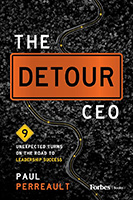 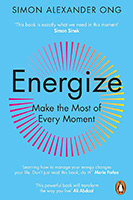 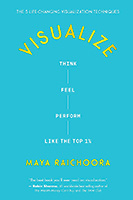
“You can't think well without writing well, and you can't write well without reading well. And I mean that last "well" in both senses. You have to be good at reading, and read good things.” — Paul Graham, Y Combinator co-founder
07.01.25

First Look: Leadership Books for July 2025
HERE'S A LOOK at some of the best leadership books to be released in July 2025 curated just for you. Be sure to check out the other great titles being offered this month.
Have you ever wanted to create a business that's not only good but great? Have you ever felt as though you're destined to do something bigger and more significant with your life? If so, you should know that you don't need millions in funding, a marketing department, or influencer status. If you have an idea, the determination to bring it to life, a deep and abiding belief in your product, and a devotion to your customers, you already have the humble starting point behind one of the world's fastest-growing and most beloved brands: Beekman 1802. In this book, for the first time, Ridge and Kilmer-Purcell present the twelve principles that made the biggest difference in their entrepreneurial journey, and show how these principles are relevant for anyone ready to defy the odds and grow a brand that matters.
In Flow Leadership, Gaëlle Devins―experienced executive and founder of FlowFusion―delivers a groundbreaking approach to unlocking the full potential of your team. This book introduces the 3P Assessment & Model, a powerful framework built on years of hands-on leadership, workshops, and academic research, helping leaders balance the three essential elements of high-performing teams: People, Purpose, and Performance. When these three forces align, they create a sustained state of FLOW@WORK―where individuals, teams, and entire organizations thrive. Gaëlle Devins explains how to ensure the people you lead at work feel their best, are at their best, and produce their best work.
This book presents a game-changing synthesis of 50 years of leadership research as a comprehensive guide for seasoned and aspiring leaders, and anyone who wants to help their boss become a better leader. Authors Jeffrey Hull and Margaret Moore, translate academic research and their extensive experience in leading and coaching into a practical, self-coaching roadmap for your own growth in these times of exponential change and disruption. This book organizes the science of leadership (15,000+ studies and articles showing what improves individual, team, and organizational performance) into nine capacities which build upon each other. Each capacity is brought to life by real-life stories, a science overview, practices, and ways to deal with overuse.
Great teams can sometimes feel like magic. So much so that it can be hard to pin down why they work so well. But such dynamics are explainable—and replicable. And at their heart is emotional intelligence. While much has been written about the power of emotional intelligence at the individual level, little has been said about the benefits of this concept for groups. And it's not as simple as putting a number of emotionally intelligent people together and expecting them to work cohesively. Instead, leaders need to build a team culture around agreed-upon norms and habits. This book combines thirty years of research and team development to present a model for building and leading emotionally intelligent teams.
As leaders, we all hit a point when things stop going well. A problem emerges that we think we can handle but discover we can't. The tools that got us this far somehow stop working. We don't understand; what are we missing? What we don't see is what we can't see: we have blindspots. It's a known fact that we're often not great judges of ourselves, even when we think we are. Sometimes we're simply unaware of a behavior or trait that's causing problems. Other times, where we see normal, effective behavior, others see tremendous deficits. Bottom line: until we uncover these blindspots, we can’t move forward or deliver on our goals as leaders. The good news is that you can learn to do your own blindspotting. Blindspotting provides a framework for understanding six types of blindspots.
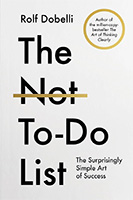 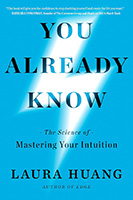 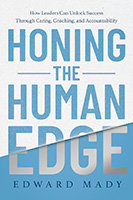 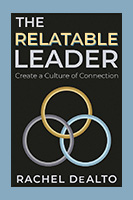
“You can't think well without writing well, and you can't write well without reading well. And I mean that last "well" in both senses. You have to be good at reading, and read good things.” — Paul Graham, Y Combinator co-founder
Posted by Michael McKinney at 06:02 AM
06.20.25

10 Books You Should Read This Summer 2025
SUMMER begins today. It’s time to select a few books to make you think and supercharge your leadership. The top summer reading list for leaders this year includes books on systems thinking, personal growth, self-knowledge, and psychological distancing for better decision-making. This year, we’ve also added a few books for the entrepreneur. Here are ten suggestions for creating your reading plan.
For Entrepreneurs
06.01.25

First Look: Leadership Books for June 2025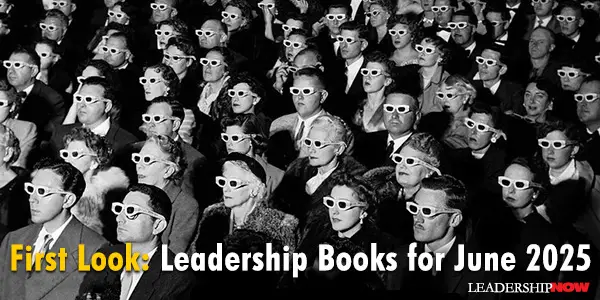
HERE'S A LOOK at some of the best leadership books to be released in June 2025 curated just for you. Be sure to check out the other great titles being offered this month.
A groundbreaking blueprint for mastering “cross-pressures” in a rapidly changing world, teaching leaders to execute and innovate, think locally and globally, and project ambition and statesmanship alike—from a Stanford Business School lecturer and consultant to some of the biggest and most innovative CEOs. Part of the problem is that these challenges, while acutely felt, are rarely articulated in a way that makes them graspable and actionable. Robert E. Siegel has witnessed the impact of these cross-pressures from different perspectives. As a lecturer in management at Stanford’s Graduate School of Business, an operator, a venture capitalist, and a consultant, he sees countless teams of managers, at all sorts of companies, struggling to lead their companies into the future.
From the creators of the theory of ethical blindness comes an investigation into how corporate scandals happen, revealing the common pattern behind them and how your organization can avoid them. Too often, the stories of corporate scandals are narrated like Hollywood movies in which once-celebrated CEOs are unmasked as sociopaths and ultimately convicted for their crimes. What we fail to realize, however, is that most bad things are done by average people with honorable values and without bad intentions.
Navigate the chaos of information overload and supercharge your efficiency with Lean Learning, a groundbreaking guide that reveals a counterintuitive approach to success: winning by learning less. From an early age, we’re taught that more is better. More money, more information, more skills. But times have changed. What was once valuable has now become a burden, and if information alone were the answer, we’d all be exactly where we want. In today’s fast-moving world, the difference between success and failure is not in what you know but in what you do with what you know. Lean Learning equips you with the tools to do just that, propelling you towards your goals with greater efficiency, purpose, and results.
Based on decades of empirical research and data, Founders, Keepers gives founders a practical roadmap for navigating the inevitable challenges that come with startup growth. It’s a brutal paradox—the same founder attributes required to put a startup in motion will invariably blow it up. The difference between success and failure lies in the personal journey that every founder must pursue to avoid their own worst impulses. Steeped in nearly forty years of research in leadership psychology, Founders, Keepers begins with the same personality assessment Rich Hagberg, a psychologist and executive management coach, gives his clients. Hagberg and Tien Tzuo, founder and CEO of Zuora, help founders build a Swiss Army knife of practical tools that will give them a much better chance of making it to the next level of success.
Turn dreaded workplace feedback into opportunities for growth and trust with Firm Feedback in a Fragile World, your guide to fostering stronger teams and a thriving workplace through effective, confident communication. “We need to talk.” It’s a phrase that can fill us with dread. For many, the statement signals conflict or criticism. But what if it didn’t? What if feedback and conversations in your workplace inspired growth, built trust, and created thriving teams? In Firm Feedback in a Fragile World, Jeff Hancher redefines how we approach feedback in the workplace. Combining relatable stories, research, and practical tools, Hancher offers a roadmap to turn feedback from a source of tension into a powerful leadership tool. As a military veteran, corporate leader, and leadership coach, he provides actionable insights that help leaders and employees alike navigate feedback with confidence and clarity.
Stop holding yourself back and make a powerful impact by taking control of your life and transforming your mindset around health, relationships, and success. Growth doesn't happen overnight; it's a choice. You must wake up every day and choose growth. These decisions compound over time, and with ruthless consistency, the outcomes are life-changing. Whether training for a marathon, leading a family, or starting a business, being intentional with everything we do is essential for success. Nick Bare shares a simple philosophy for helping people tap into the clarity and resolve they need to keep progressing: go one more.
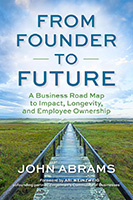 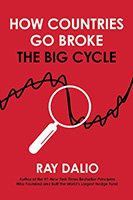 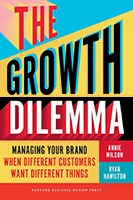 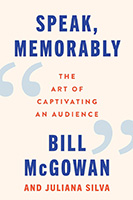
“You can't think well without writing well, and you can't write well without reading well. And I mean that last "well" in both senses. You have to be good at reading, and read good things.” — Paul Graham, Y Combinator co-founder
05.01.25

First Look: Leadership Books for May 2025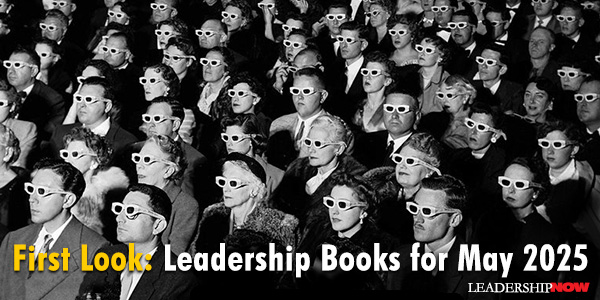
HERE'S A LOOK at some of the best leadership books to be released in May 2025 curated just for you. Be sure to check out the other great titles being offered this month.
Dave Whorton went on a journey to find a better way to build companies, a way focused on long-term stability and steady growth, funded through profitability; a way in which leaders were committed to a purpose beyond personal wealth generation, to putting their people first, and to setting up their companies to endure. He calls these companies "Evergreen." Another Way combines Whorton's inspiring story with his Evergreen 7Ps framework, designed to guide more entrepreneurs and business leaders to follow his path. Full of revelations, practical advice, and real-world examples of companies going Evergreen, Another Way is as instructive as it is inspiring at showing capitalism at its best.
Increasingly, people report feeling overlooked, ignored, and underappreciated at work. Simply put, they don't feel like they matter to their leaders or organizations—and it's taking a toll. This hidden epidemic of insignificance is fueling a mental health crisis, intensifying loneliness, and, for organizations, driving disengagement, turnover, and low performance. Zach Mercurio reveals how mattering to others is a fundamental—yet often overlooked—requirement for thriving. He introduces a simple yet effective framework for making daily interactions with your people more meaningful: Noticing: the practice of seeing and hearing others, Affirming: the practice of showing people how their unique gifts make a difference, and Needing: the practice of showing people they're relied on and indispensable
How to measure a life? After a career of service, retired four-star general Stanley McChrystal had much to contemplate. He pondered his successes and failures, his beliefs and aspirations, and asked himself, Who am I, really? And more importantly, who have I become? When I die, how will I be measured? In the end, McChrystal came to a conclusion as simple as it was profound: the reality of who we are cannot be recorded in dates or accomplishments. It is found in our character—the most accurate, and last full measure, of who we choose to be. On Character offers McChrystal’s blueprint for living with purpose and integrity, challenging us to examine not just our deeds but who we become through them.
An inspiring, practical book by Gui Loureiro, Regional CEO overseeing Walmex, Walmart Canada, and Walmart Chile, and his executive leadership coach Carlos Marin that shows how even the most successful leaders must be open to personal change in order to transform their company. Reinventing the Leader is the turbulent story of how it happened that’s especially relevant in this age of globalization. Gui learns from Carlos that to change the company he must first transform his own leadership style. Written from the dual perspectives of a CEO and his leadership coach, this candid book provides an insightful blueprint for any organization’s success. Today’s leaders are expected to inspire by sharing a vision based on purpose, not just profits. Loureiro and Marin’s enlightening account of self-discovery and business reinvention defines a fresh new approach to leadership for the future.
From Jon Gordon comes a powerful new fable on what it takes to build a truly great team. Through engaging storytelling, real-world lessons, and actionable insights, Gordon reveals the seven commitments that great teams must make to build trust, foster connection, overcome adversity, and achieve extraordinary success. Whether you're a business leader, coach, entrepreneur, or team member, this book will inspire you to commit, lead with purpose, and build a team that wins, thrives, and leaves a lasting impact.
In The Optimist, the Wall Street Journal reporter Keach Hagey presents the most detailed account yet of Altman’s rise, from his precocious childhood in St. Louis to his first, failed startup experience; his time as legendary entrepreneur Paul Graham’s protégé and successor as head of Y Combinator, the start-up accelerator where Altman became the premier power broker in Silicon Valley; the founding of OpenAI and his recruitment of a small yet superior team; and his struggle to keep his company at the cutting edge while fending off determined rivals, including Elon Musk, a former friend and now Altman’s bitter opponent. Hagey delivers a nuanced, balanced, revelatory account of the individual who is leading us into what he himself has called “the intelligence age.” Altman is a figure out of Isaac Asimov or Neal Stephenson. Or he is the author himself: if it feels as though we have all collectively stepped into a science fiction short story, it is Altman who is writing it.
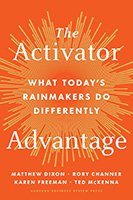 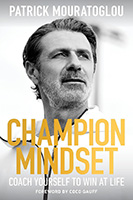  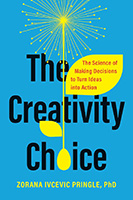
“You can't think well without writing well, and you can't write well without reading well. And I mean that last "well" in both senses. You have to be good at reading, and read good things.” — Paul Graham, Y Combinator co-founder
Posted by Michael McKinney at 07:35 AM
04.01.25

First Look: Leadership Books for April 2025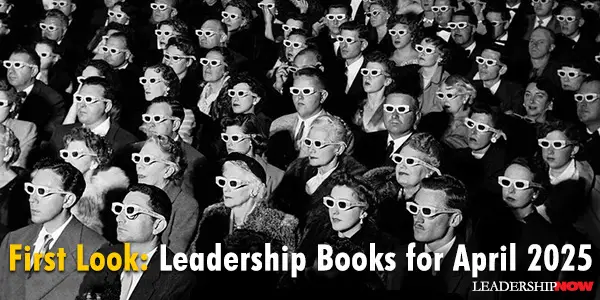
HERE'S A LOOK at some of the best leadership books to be released in April 2025 curated just for you. Be sure to check out the other great titles being offered this month.
The Psychology of Leadership offers a fresh take on leadership through the lens of groundbreaking research in positive, sports, and personality psychology. Leaders will develop what feels like mind-reading abilities for interpreting workplace personalities, hidden motivations, and group dynamics. They will learn how to inspire their organization to move mountains, improve their ability to listen, communicate and, when necessary, persuade. Along the way they will dramatically improve their own mindset and resilience.
In Master Your Mindset, bestselling author Michael Pilarczyk reveals a life-changing approach that has helped countless individuals transform their lives. His unique method combines powerful insights with real-life examples, showing you how to break free from limiting beliefs and reach your most ambitious goals. This book offers more than just advice―it provides a clear, actionable, and repeatable 12-step strategy to help you master your mindset and create lasting success in every area of life. With Master Your Mindset, you'll have the tools to break free from limiting beliefs and take control of your personal and professional success. A practical, life-changing guide to unlocking your full potential―whether you seek personal fulfillment, professional success, or deeper inner peace and meaning in life.
In today’s dynamic business environment, the success of any organization is deeply rooted in the quality of its internal relationships. Psychologist and organizational behavior expert Dr. Karen Bridbord offers a revolutionary guide to career success and advancement, regardless of your industry, your company’s size, or your role. This groundbreaking book sheds light on how nurturing strong work relationships can lead to unmatched productivity and greater overall wellness throughout the organization and among its staff. The Relationship-Driven Leader explores the profound influence of everyday interactions on team experience and team performance. Bridbord emphasizes the importance of “micro-moments” in leadership to spark significant improvements. This book empowers you to take the first step toward becoming the leader everyone aspires to work with by enhancing your leadership skills, boosting workplace productivity, and mastering innovative conflict-management techniques. By focusing on well-being through relationship-building, you can create a healthier, more engaged, and more productive team.
Written for leaders of high-growth companies, a framework for predicting and overcoming obstacles to scale successfully. Growth is hard. CEOs must constantly evolve to make it through the gauntlet of never-ending challenges. This book is written for leaders like you who recognize that success depends upon harnessing your people’s strengths to build a high-functioning and resilient organization. In Running the Gauntlet, the duo of veteran strategic advisors shows you how to predict and prepare for the challenges you’ll encounter as your company moves through four stages of growth, how to use key levers to proactively drive organizational growth including sharpening focus, calibrating culture, strengthening leadership, and elevating talent, how to evolve your role as CEO as the organization becomes larger and more complex and how to avoid the pitfalls that derail growth.
Our lives are guided by our attachments. When they’re healthy, they offer us security, pleasure, and validation. But for many of us, something has gone awry. We’re distracted and sabotaged by these attachments, like control, perfection, or success, which morph into internal conversations that undermine our best selves—ultimately inhibiting our ability to live a full, happy life. The antidote to the poison of unhealthy attachments? Trading them in for positive aspirations. Rooted in a blend of Western and Eastern psychology, supported by research, and told through the stories of real people from all walks of life who have overcome their own self-sabotage, Detach walks readers through the ten unhealthy attachments many of us carry, as well as the ten positive aspirations we can use to combat each one of them.
Throughout his 40-year career, Admiral McRaven has experienced every manner of calamity imaginable. From managing failed hostage rescues to responding to student unrest, McRaven has learned how to successfully navigate crises—those moments that push the limits of your experience and challenge your confidence, when leadership skills alone may not be enough. Conquering Crisis provides a new set of tools for facing these stressful moments with poise. It breaks crises down into five phases assess, report, contain, shape, and manage—and provides concrete steps to come out the other side stronger. With incredible personal stories, thought-provoking parables, and memorable lessons, Admiral McRaven sheds light on the ways we can rise to the occasion in times of crisis and act as leaders, no matter the situation.
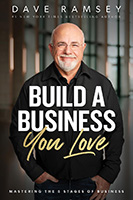 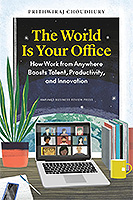 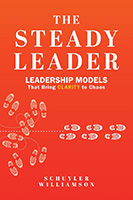 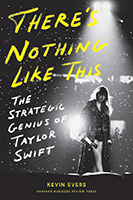
“You can't think well without writing well, and you can't write well without reading well. And I mean that last "well" in both senses. You have to be good at reading, and read good things.” — Paul Graham, Y Combinator co-founder
Posted by Michael McKinney at 06:00 PM
03.01.25

First Look: Leadership Books for March 2025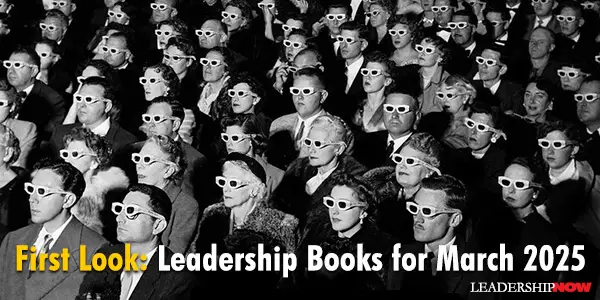
HERE'S A LOOK at some of the best leadership books to be released in March 2025 curated just for you. Be sure to check out the other great titles being offered this month.
as our job expands, the added pressure to perform corrupts our actions, and our increased power will blind us to the impact of those actions. Even the most well-intentioned manager can quickly become the boss nobody wants to work for. You’re the Boss is your executive coach in book form. It offers a fresh, evidence-based framework for managing pressure and power with grace and intelligence. Nawaz’s potent, proven strategies guide you to anticipate the unavoidable hazards of leadership without changing who you are, based on over two decades of coaching and in-depth research into the psychology of behavior and relationships. Discover a powerful way to manage yourself and others, navigate working relationships, and communicate effectively. Become the boss you want to be—and others need—while experiencing less stress and greater impact.
Life isn’t linear, and yet we constantly try to mold it around linear goals: four-year college degrees, ten-year career plans, thirty-year mortgages. What if instead we approached life as a giant playground for experimentation? Based on ancestral philosophy and the latest scientific research, Tiny Experiments provides a desperately needed reframing: Uncertainty can be a state of expanded possibility and a space for metamorphosis. Neuroscientist and entrepreneur Anne-Laure Le Cunff reveals that all you need is an experimental mindset to turn challenges into self-discovery and doubt into opportunity. Readers will replace the old linear model of success with a circular model of growth in which goals are discovered, pursued, and adapted—not in a vacuum, but in conversation with the larger world.
Humans have always been good at inventing tools that change the way we live and work—though not always good at adapting to those changes. Will the power of AI create a new era of robotic, impersonal efficiency, or will it catalyze a renaissance, redefining leadership and the world of work? So far, that question has mostly prompted a wave of anxiety about the disappearance of jobs and the loss of humanness in our work lives. AI has the power to transform leadership for the better—the key is in how leaders use it. By delegating tasks to AI and using it to augment skills and behaviors, leaders have an opportunity to unlock a truly human experience of work while enhancing organizational performance. The AI-augmented leader moves beyond a focus on the technology itself to constantly probe how it can enhance and deepen the core qualities of human-centered leadership: awareness, wisdom, and compassion. In this way, AI can help leaders and organizations become more human.
No matter who you’re talking to, The Next Conversation gives you immediately actionable strategies and phrases that will forever change how you communicate. Jefferson Fisher, trial lawyer and one of the leading voices on real-world communication, offers a tried-and-true framework that will show you how to transform your life and your relationships by improving your next conversation. The Next Conversation will give you practical phrases that will lead to powerful results, from breaking down defensiveness in a hard talk with a family member to finding your own assertive voice at the boardroom conference table. Your every word matters, and by controlling how you communicate every day, you will create waves of positive impact that will resonate throughout your relationships to last a lifetime.
Conflict is getting the better of us. From our homes and community centers to C-Suites and Congress, disagreements are happening everywhere, with increasing frequency, and are being treated like zero-sum games that allow little margin for error and even less room for productive conversations. Conflict Resilience is not another book about conflict resolution, nor is it about problem solving. Conflict Resilience combines practical applications of advanced conflict management and study of the human brain to teach anyone how to turn conflict and negotiation into an act of union. This book provides the most cutting-edge and scientifically-grounded tools for driving agreement when possible and for empowering you to disagree better when the differences cut deep and the relationships matter most. This is a chance to bring people together, and an invitation to radically transform how we interact with our friends and families, our co-workers, our students, and our neighbors—anyone with whom we find ourselves in disagreement.
In our distracted, divisive world, the transformative power of true listening has never been more essential. Radical Listening is a revolutionary guide to mastering this vital skill from renowned experts Christian van Nieuwerburgh and Robert Biswas-Diener. Moving beyond simply hearing words, their groundbreaking framework teaches you to actively co-create meaning and connection. Though we spend nearly three hours a day on the receiving end of communication, listening is frequently neglected. We're bombarded by data, digital distractions, and a culture that celebrates talkers over listeners. Radical Listening provides the antidote, equipping you with six core competencies: Noticing, Quieting, Accepting, Acknowledging, Questioning, and Interjecting.
In The Super Upside Factor, Daniel Kang draws on his experience as a venture capitalist at Softbank Vision Fund and a Y Combinator-backed founder to adapt asymmetric principles for personal and professional life. He offers a clear framework for maximizing luck and generating outsized returns―what he calls Super Upsides. Through vivid, real-life experiments, Kang demonstrates how he put these principles into practice―from securing a book deal writing just 15 minutes a day; to recovering from a spiralling plane as a pilot; to raising millions by betting on pivotal career shift. Backed by decision science research and personal experimentations, the book strikes a balance between theory and practical advice, guiding readers to identify and optimize skewed life bets. Beyond the tactical elements, Kang explores the human side of applying these principles, including discussions on mental health, emotional struggles, and even tactically quitting.
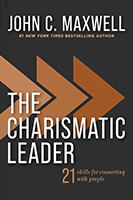 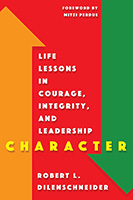 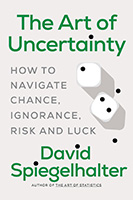 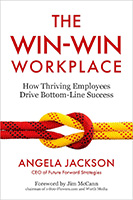
“You can't think well without writing well, and you can't write well without reading well. And I mean that last "well" in both senses. You have to be good at reading, and read good things.” — Paul Graham, Y Combinator co-founder
Posted by Michael McKinney at 09:56 PM
02.01.25

First Look: Leadership Books for February 2025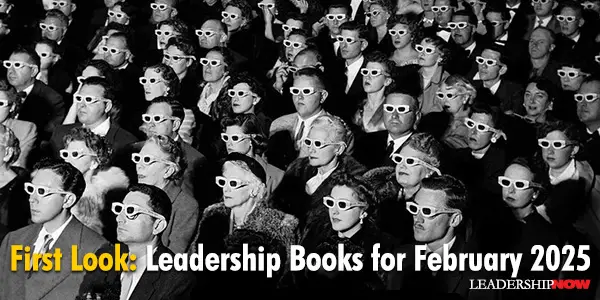
HERE'S A LOOK at some of the best leadership books to be released in February 2025 curated just for you. Be sure to check out the other great titles being offered this month.
We have a choice. We can either be reactive and struggle to adjust to transformational events on the fly, or we can be proactive and control the narrative—reinventing work to align with the evolving environment. Futurist Rishad Tobaccowala has had a highly successful career because he has anticipated and capitalized on emerging trends. In Rethinking Work, Rishad outlines the reasons why being proactive in this era of unprecedented change is the only way organizations will survive and thrive. Schools, banks, law firms, startups, medical offices—every sector will be affected by the current or soon-to-be-emerging trends and events that Rishad describes in this invaluable guide.
Striving is in our nature. We all want to perform at our best when it matters most. But in today's world, many of us feel lost, isolated, and overwhelmed. We're paralyzed by fear of failure and crippled by insecurities. We know we’re capable of more, yet no matter how hard we try, we feel stuck. We’ve been sold the wrong path to success and personal fulfillment. Renowned performance scientist and bestselling author Steve Magness reveals a new path to sustainable success. In Win the Inside Game, Magness argues that excellence and fulfillment are not mutually exclusive; we can and should seek both. When we measure our worth by our achievements, cement our identities to our careers, and sacrifice our well-being in the pursuit of external validation, it backfires. We default to survival mode, protecting and defending ourselves instead of being free to fulfill our potential.
It is clear that leaders carry a unique burden. They are guardians, protectors, providers, judges, helpers, servants, counselors, and friends—and only a Giant can be all those at one time. Leaders live and die with the actual results they create, and those results are created with and through the people they lead. Dave Durand spent 35 years founding, leading, and selling companies with more than a billion dollars in combined sales. Having led hundreds of thousands of people, he distills leadership influence in usable terms. Leading Giants illuminates the Four Superpowers of a Leader. By learning to serve as a firm but compassionate leader in the face of challenges, you will do the right things, the right way, and reap the benefits. Because life and business are full of good people engaging in destructive behavior, influencing people away from vice and into virtue is the key to peace, prosperity, and profits..
Doubt crushes leaders daily—from GMs of Fortune 500 companies to small business owners across America, leaders nearly unanimously express doubt and fear in the face of adversity. This makes sense because adversity pushes us beyond our training and our comfort zones. We cannot simply put our heads down and endure. Instead, learn that adversity is an opportunity for transformation. When faced with circumstances beyond our capabilities, we must grow to meet those challenges by persevering and becoming the person the situation requires. Perseverance > Endurance empowers leaders to gain clarity of their challenges, apply sound leadership principles, and lead their teams to victory by embracing the five factors of perseverance: Change, Uncertainty, Acceptance, Choice, and Growth.
The average American worker spends 156 hours a year engaged in the kind of moderate to intense workplace conflict that adversely impacts both performance and health. Managers spend twenty-six percent of their time addressing and resolving conflicts on their team—the equivalent of chewing up one full workday each week. But what if it didn’t need to be like this? What if there was a way to spend less time in stressfully interpersonal interactions and more time on the things that really matter? Because our responses are ingrained byproducts of the subcortex in action, they are predictable. If you can predict how someone will behave in a given circumstance, you can formulate a game plan. The secret is knowing which of the five patterns someone is wired to use when smacked by a stressor. You’ll learn the formula for identifying your coworkers’ and loved ones’ conflict styles and how to use this information to foster better communication and more effective, collaboration.
For Navy SEALs, success isn’t only a result of relentless training in shooting, skydiving, or combat—though they are experts at those things. The real secret is that they use their innate human capabilities to turn the stress of uncertain and complex situations to their advantage. In more than two decades of leading, training, and coaching top performers, Rich Diviney (founder of the SEALs’ “Mind Gym”) discovered that while most elite individuals and teams are masters of preparation, it’s how they react when things don’t go according to plan that separates the best from the rest. They are Masters of Uncertainty.
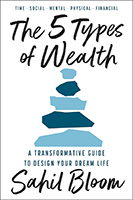 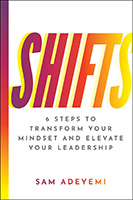 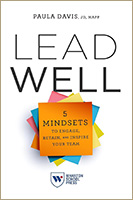 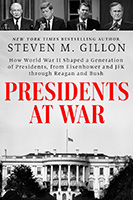
“You can't think well without writing well, and you can't write well without reading well. And I mean that last "well" in both senses. You have to be good at reading, and read good things.” — Paul Graham, Y Combinator co-founder
Posted by Michael McKinney at 07:30 AM
01.01.25

First Look: Leadership Books for January 2025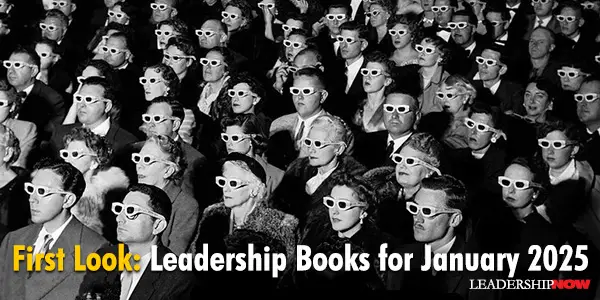
HERE'S A LOOK at some of the best leadership books to be released in January 2025 curated just for you. Be sure to check out the other great titles being offered this month.
There are more pieces of digital data than there are stars in the universe. This data helps us monitor our planet, decipher our genetic code, and take a deep dive into our psychology. As algorithms become increasingly adept at accessing the human mind, they also become more and more powerful at controlling it, enticing us to buy a certain product or vote for a certain political candidate. Some of us say this technological trend is no big deal. Others consider it one of the greatest threats to humanity. But what if the truth is more nuanced and mind-bending than that? In Mindmasters, Columbia Business School professor Sandra Matz reveals in fascinating detail how big data offers insights into the most intimate aspects of our psyches and how these insights empower an external influence over the choices we make. With passion and clear-eyed precision, Matz shows us how to manage psychological targeting and redesign the data game. Mindmasters is a riveting look at what our digital footprints reveal about us, how they're being used—for good and for ill—and how we can gain power over the data that defines us.
Changing how we work can feel overwhelming. Like trying to budge an enormous boulder. We’re stifled by the gravity of the way we’ve always done things. And we spend so much time fighting fires—and fighting colleagues—that we lack the energy to shift direction. But with the right strategy, we can move the boulder. In Reset, Heath explores a framework for getting unstuck and making the changes that matter. The secret is to find “leverage points”: places where a little bit of effort can yield a disproportionate return. Then, we can thoughtfully rearrange our resources to push on those points.
Whether you’re a leader, a member of a team, a spouse, or a parent, this engaging and rigorous exploration unpacks the science of inspiration. Through compelling stories, fascinating research, and practical tips for addressing the common dilemmas we face daily, Inspire reveals how all of us, regardless of status or circumstance, can be more inspiring more often. Social psychologist and leadership expert Adam Galinsky has spent three decades building a method for determining when we are inspiring versus infuriating, and where various leaders—presidents, CEOs, coaches, teachers, parents, and a wealth of others—currently land on that spectrum. .
In an era where the foundational elements of business are being disrupted, Essential emerges as a crucial guide for leaders navigating the profound changes reshaping industries and markets worldwide. This book, penned by a team of seasoned business and leadership strategists, offers a radical and necessary perspective on management transformation, emphasizing the importance of human-centered leadership in meeting the full potential of the technology age. Essential is not just a book; it's a roadmap for 21st-century leaders facing existential challenges in a rapidly evolving global market. Perfect for managers, executives, directors, founders, entrepreneurs, and any business leader aiming to steer their organization towards success in a transformed landscape, this book provides the tools and insights needed to lead with conviction and humanity. Whether you're looking to redefine your leadership approach, adapt to the transformed market, or leave a lasting legacy, this book offers a compelling case for why now is the time for a leadership reinvention.
Business is on the cusp of a profound transformation. Conventional work models are failing to adapt to the evolving needs and expectations of the modern workforce. Simultaneously, the emergence of disruptive technologies such as artificial intelligence, coupled with web3 innovations, including the metaverse and decentralized work models, is unlocking a new realm of possibilities. It raises the question: Is the era of traditional employment over? The tools of tomorrow will amplify human potential, from collaborating in virtual spaces through digital avatars, to managing transactions transparently on blockchain. Those who embrace these technologies—and the ways people want to work—will unleash unprecedented levels of productivity and innovation. But those who don't risk losing out on the best talent, and even becoming obsolete.
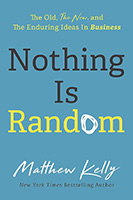  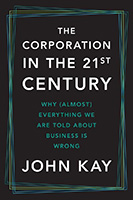 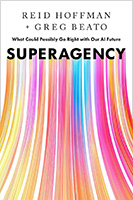
“You can't think well without writing well, and you can't write well without reading well. And I mean that last "well" in both senses. You have to be good at reading, and read good things.” — Paul Graham, Y Combinator co-founder
Posted by Michael McKinney at 02:40 PM
12.25.24

10 Books You Should Read This Winter 2024
THE WINTER months are the perfect time for a little binge-reading. While I can’t promise that any of the titles suggested are cozy reads, they will get you fired up. Personally, I would start with Productive Failure and Mindshift. Like The Illusion of Innovation by Elliott Parker, they will get you thinking in new ways and set you up for the others. Use this list to create your own winter reading plan. Here are ten suggestions to begin the new year intentionally.
Posted by Michael McKinney at 12:38 PM
12.10.24

The Best Leadership Books of 2024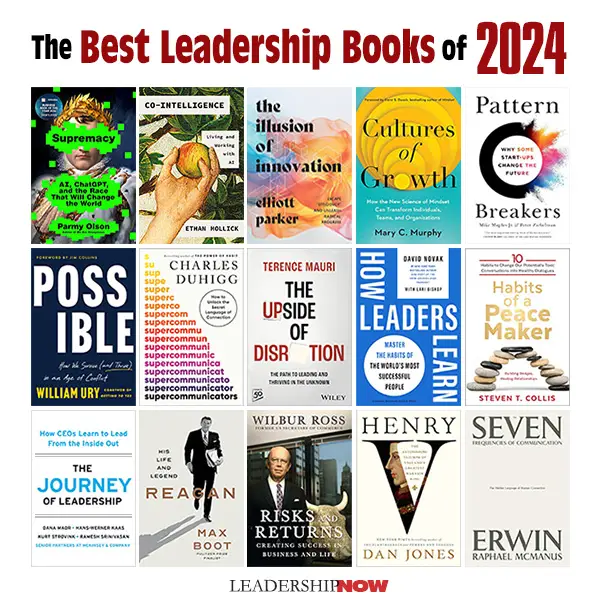
THE titles listed below, published in 2024, improve our self-awareness regarding relationships and communication the sine qua non of leadership and provide us with a wider perspective on innovation and the changes taking place around us.
(Random House, 2024)
(Harper Business, 2024)
(Ideapress Publishing, 2024)
(Portfolio, 2024)
(Simon & Schuster, 2024)
(PublicAffairs, 2024)
(Shadow Mountain, 2024)
(Arena Publishing, 2024)
(Wiley, 2024)
(Harvard Business Review Press, 2024)
(Portfolio, 2024)
(St. Martin's Press, 2024)
Biographies:
(Liveright, 2024)
(Regnery, 2024)
(Viking, 2024)
Posted by Michael McKinney at 11:40 AM
12.01.24

First Look: Leadership Books for December 2024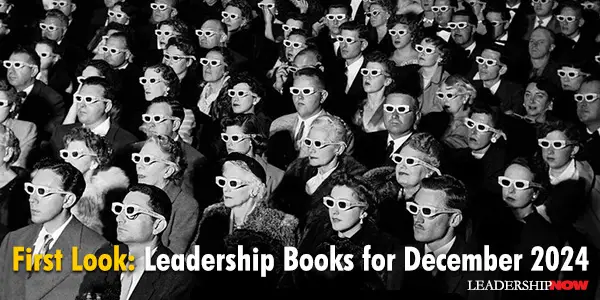
HERE'S A LOOK at some of the best leadership books to be released in December 2024 curated just for you. Be sure to check out the other great titles being offered this month.
In this groundbreaking book, internationally acclaimed author and entrepreneurial mindset expert Gary Schoeniger combines insights gleaned from hundreds of everyday entrepreneurs with cutting-edge research to create a practical how-to guide that not only shows us how to be more innovative and entrepreneurial in our own lives but also how to unlock the untapped entrepreneurial potential in others. Ultimately, The Entrepreneurial Mindset Advantage shows us how a subtle shift in our perspective can make a big difference in our lives. While this book will certainly benefit those who want to start a business, it looks beyond new venture creation to expose the entrepreneurial mindset as a teachable framework for thinking that has become essential for individuals and organizations to adapt and thrive in today's rapidly changing world.
Momentum is magnetic. People want to be with, work with, and build relationships with people who have momentum. But what is it, exactly? Renowned author, speaker, consultant, and coach Sam Silverstein has the surprising answer. Momentum is constant, conscious movement toward your goal that is in alignment with your purpose and mission. This goal is always connected with what we are called to do in the service of others. In his simple but powerful step-by-step strategy, Silverstein shows you how to identify what you should be acting on and create continuous progress on your goals and in your life. You will attract others to your mission, and you will create transformative influence in the events you encounter and the lives of the people around you.
In a world of disruption and uncertainty, Still Standing emerges as a beacon of resilience, offering the essential strategies for navigating the pressures of building and leading our organizations into the future. Still Standing is not just a book; it's a tactical roadmap for businesses and their leaders, who are determined to create everyday resilience in the face of constant change. Whether you're seeking to enhance your leadership skills, navigate the challenges of business, or manage workplace burnout and wellbeing, this book offers the insights and strategies needed to thrive and innovate in these uncertain times. Join Cherry Rose Tan in exploring the three capabilities that will empower you to not just survive, but flourish in the competitive world of business and innovation.
Are you ready to transform your life and achieve extraordinary success? Outsmart the Learning Curve reveals the secrets of how ordinary people can overcome obstacles, acquire new skills rapidly, and reach their full potential. Whether you're a recent grad, a mid-career professional seeking change, or simply striving for continuous improvement, this book is your roadmap to personal and professional growth. Unlike many self-development books that focus on world-class performers, Outsmart the Learning Curve celebrates the growth and transformation of ordinary people, offering relatable inspiration and attainable strategies for readers from all walks of life. Outsmart the Learning Curve doesn't just tell you what to do—it shows you how to do it, with actionable advice on experiential learning, personality development, and overcoming self-doubt.
HBR Daily Leader provides 365 days' worth of insights and inspiration, an easy and enjoyable way to make your professional development a regular habit. Every page offers something new, whether it's an insight to spark your thinking, a quote to inspire you, or a question to reflect on. And each day presents you with an opportunity to take on topics such as communicating effectively, managing your time, expanding your influence, and cultivating new skills. Elevate your leadership practice and presence with wisdom drawn from the best of Harvard Business Review.
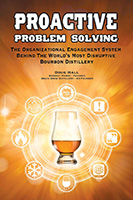 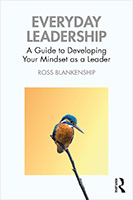 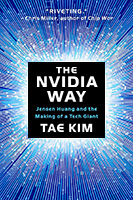 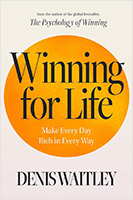
“You can't think well without writing well, and you can't write well without reading well. And I mean that last "well" in both senses. You have to be good at reading, and read good things.” — Paul Graham, Y Combinator co-founder
Posted by Michael McKinney at 09:15 AM
11.01.24

First Look: Leadership Books for November 2024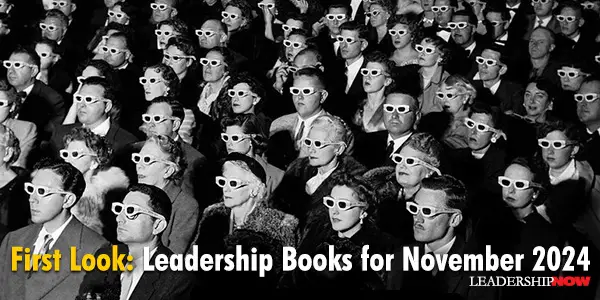
HERE'S A LOOK at some of the best leadership books to be released in November 2024 curated just for you. Be sure to check out the other great titles being offered this month.
Five Generations at Work explores how to maximise the dynamics of our generational diversity to create more collaborative and competitive organisations. An energising and pragmatic read, this book unpacks six years of research and work with organisations and individuals who are taking progressive action to lead from lenses versus labels, evidencing the value of generational diversity. For the first time in history, we have up to five generations at work. In the context of a world in flux and polycrisis, our diversity is a powerful force multiplier for good, if we debunk the stereotypes and know how to unlock it.
Can I trust you? With mounting international tensions, economic collapses, family divisions, and political discord, trust is in short supply. Without it, cultures deteriorate, productivity fades, and resources are wasted. Many recognize the current lack of trust, but few know how to address it. David Horsager has been pioneering trust solutions for decades and now offers this essential guide for leaders. It includes 40 Trust Tools built on his proven 8-Pillar Framework—equipping you to solve your biggest challenges with trust.
All organizations have a culture, whether they acknowledge it or not—and whether it's helping or hindering them. Get it right, and culture can be a positive force for good. Get it wrong, and culture can be a negative force, becoming toxic and undermining performance and reputations. In short, culture matters. Organizational culture, though, can be a tricky thing to understand and master. The Power of Culture tackles this head-on, exploring what culture is, and why it matters; how it needs to be aligned with strategy and values; and how to understand it, change it, and make it a reality.
Byron Wien, a legendary figure on Wall Street, shares his profound insights and life lessons in Stay at Risk and Live Forever. Co-authored by Taylor Becker, this memoir provides a unique blend of personal anecdotes and professional wisdom from Wien's decades-long career. Known for his famous "Ten Surprises" and "Life's Lessons" lists, Wien guides readers through the complexities of investment strategy, risk management, and lifelong learning.
In today’s volatile, fast-paced, and decentralized business environment, even the most talented leaders can’t succeed alone—they need to mobilize the full potential of the team. The world’s highest-performing organizations understand they need more than leadership to win—they need teamship. Teamship is a profound shift from today’s hierarchical model to sharing the load among a team that elevates one another and the organization to achieve exponential results.
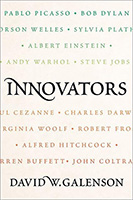 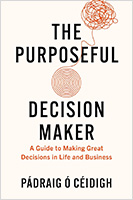 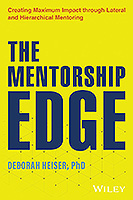 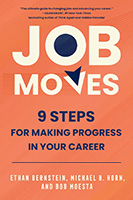
“You can't think well without writing well, and you can't write well without reading well. And I mean that last "well" in both senses. You have to be good at reading, and read good things.” — Paul Graham, Y Combinator co-founder
Posted by Michael McKinney at 08:41 AM
10.01.24

First Look: Leadership Books for October 2024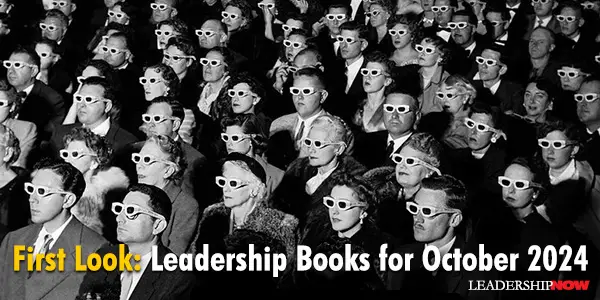
HERE'S A LOOK at some of the best leadership books to be released in October 2024 curated just for you. Be sure to check out the other great titles being offered this month.
As the world navigates the rapid and disruptive effects of AI, climate change, and geopolitical conflicts, the world of work, too, needs to change. Jobs are giving way to skills as the currency of work to ensure a more agile, resilient, and flexible enterprise that cannot just respond but must thrive in the face of these challenges. This pivot from jobs to skills will require us to rethink everything we know about work. Building on his bestselling book Work without Jobs, Ravin Jesuthasan returns, this time with coauthor Tanuj Kapilashrami, an international human resources leader, to provide the framework organizations need to thrive in a world demanding perpetual reinvention.
Written by a leading global expert on human cognition, productive failure, and learning methods, Productive Failure shows you how to design the experience of failing. Research shows that repeated experiences of intriguing, constructive failure can help students (and our own children, and anyone else we lead) develop creativity and learn more deeply. When carefully curated, failure can become a signal for learning, not the noise detracting from it. The result? Learners gain a lifelong readiness to push themselves outside of their comfort zones, using setbacks as launchpads for learning and innovation. The evidence-based principles in this book are powerful, not only in formal schooling contexts, but also for anyone taking charge of and designing their own lifelong learning.
Change isn’t an easy sell. And, in business, pivoting in a new direction requires teams to work together cooperatively. You need to say what they can’t unhear. This compact and actionable guide will get you thinking differently about where change comes from and how to initiate it. By introducing and exploring nine “persuasion proverbs,” Webster highlights the behavioral, cognitive, and psychological principles that underpin lasting change, and offers a powerful alternative to the standard tactics of influence and persuasion.
Outrage is everywhere—on the left and on the right—and many companies have found themselves in the crosshairs. GoFundMe was pressured to cut off funding to protesting truckers in Ottawa. Facebook and other tech companies have been accused of manipulating elections in many countries and by many parties. People are angry with the world—in some cases, rightfully so—and now view companies as they do governments, as targets of their wrath and potential forces for social change. Managing outrage has moved from being an occasional leadership challenge, like handling a PR crisis, to a necessary and critical leadership capability, like strategic thinking or financial acumen. Based on his popular University of Oxford leadership course and case studies on organizations such as IKEA, Nestlé, the Vatican, and others, Karthik Ramanna offers practical steps to make sense of the outrage, work with relevant stakeholders to progress through it, and emerge stronger for it.
As CEO of the Consumer Technology Association, owner and producer of CES, Gary Shapiro has had a front row seat to the launch of nearly every recent major technology. He's seen tech companies rise and fall, and bankrupt entrepreneurs become billionaires. After more than four decades in the industry, he knows that leaders who make it in the tech world have one thing in common: they know how to pivot. Drawing upon detailed case studies, economic theory, and personal experience, Pivot or Die offers a behind-the-scenes look at the development of innovative technology and business strategies. Along the way, Shapiro offers a "pivot" framework for leaders in technology and beyond to stay flexible and agile.
The Seven Frequencies of Communication is a groundbreaking revelation of the hidden language that connects humanity. As a renowned speaker, award-winning author, and coach with a global impact, McManus distills his vast experience in the world of communication into a brand-new understanding of how we speak, hear, and change each other. McManus creates a fresh and vibrant system of seven unique frequencies that liberate us to communicate most effectively. Are you a Maven, a Seer, a Commander, a Professor, a Healer, a Challenger, or a Motivator? When you unlock your frequency, you unleash your potential. The Seven Frequencies of Communication is for everyone who wants their message to be heard. Whether you are a leader, a parent, a CEO, a speaker, a coworker, or a friend—this book is for you.
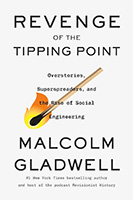 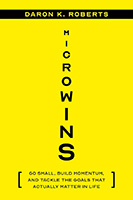 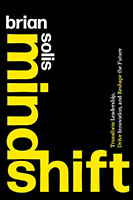 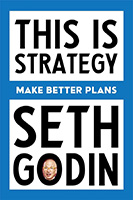
“You can't think well without writing well, and you can't write well without reading well. And I mean that last "well" in both senses. You have to be good at reading, and read good things.” — Paul Graham, Y Combinator co-founder
Posted by Michael McKinney at 09:09 AM
09.01.24

First Look: Leadership Books for September 2024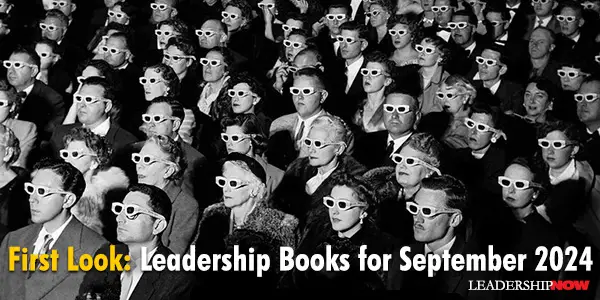
HERE'S A LOOK at some of the best leadership books to be released in September 2024 curated just for you. Be sure to check out the other great titles being offered this month.
This isn’t just another self-help theory: Dynamic Drive is your practical guide to unlocking your true potential. Through her decades of experience working with top athletes and peak performers across industries, renowned keynote speaker and leadership expert Molly Fletcher has created a proven formula backed by research that outlines the seven keys to sustainable success. The truth is fulfillment doesn’t come from setting and accomplishing goals in isolation. It comes from Dynamic Drive—a holistic approach that connects all parts of you with your purpose and allows you to engage in meaningful growth, both personally and professionally.
In The Upside of Disruption renowned disruption thinker and best-selling author Terence Mauri delivers a compelling set of mindset shifts for today's unique leadership challenges. In the book, you'll find the future-ready insights and tools you need to lead for today and prepare your organization for tomorrow. The author explains why so many of us continually overestimate the risks of bold decisions while underestimating the downsides of standing still for too long in an increasingly complex and volatile world. You'll learn about the upside of disruption and how to turn it into a tailwind for laser-like focus and strategic courage.
When the pressure is on, many of the world’s top CEOs turn to McKinsey & Company to reinvent themselves and their organizations. The Journey of Leadership brings the experience of one of the world’s most influential consulting firms right to your fingertips. This book is the first-ever explanation of McKinsey’s step-by-step approach to transforming leaders both professionally and personally, including revealing lessons from its legendary CEO leadership program, The Bower Forum, which has counseled more than five hundred global CEOs over the past decade. It is a journey that helps leaders hone the psychological, emotional, and, ultimately, human attributes that result in success in today’s most demanding top job.
Most people have experienced the slippery slope of dialogue that descends into -polarized argument. We yell at each other. We gaslight. We twist one -another’s words and meanings. We embrace facts that support our conclusions and ignore those that don’t. Or we sit in silence, afraid to discuss anything of substance. If how you treat others matters to you, this book offers powerful new habits that can give you the confidence to engage in dialogue about hard topics while building and strengthening relationships. Steven T. Collis, one of the world’s leading experts on civil -discourse, reveals ten practical habits that can help you navigate the potential minefields of hard topics and leave you and those you converse with feeling thoughtful and productive.
Learn the foolproof framework to take back control and create immediate and lasting change. Getting stuck in life is a guarantee. Staying stuck is a choice. In The Art of Changing Course, amputee, diabetic record-holding powerlifter, and renowned motivational speaker and author Chris Ruden provides a clear-cut process that walks readers through digestible, actionable stages to get unstuck, allowing you to rise beyond simple awareness of the desire to change and become the person you truly want to be. Backed by numerous psychological principles, management techniques, and organizational change theories, The Art of Changing Course focuses on helping readers make three distinct shifts: from subconscious to conscious, conscious to communicated, and finally, communicated to broadcasted.
Generative AI and the remote-work revolution show us every day that we're in a new era. The rules and norms have changed—and so must leadership. And yet, coercive bureaucracy, hierarchy, and control—old ways of thinking and working—are still with us, a deep-seated and powerful legacy. We are living through a profound transition from an old, industrial era to a new one that is digital, transparent, and complex. In this important new book by former dean of Harvard Business School Kim Clark, written with his business school professor son, Jonathan, and management consultant daughter, Erin, the dynamic struggle between two competing paradigms of leadership is compellingly illustrated: an old paradigm that involves control and power over people versus a new one that enables and inspires power through people.
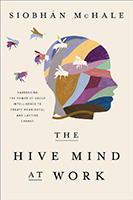 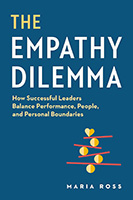 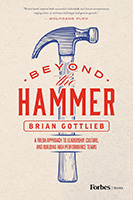 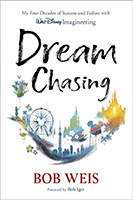
“You can't think well without writing well, and you can't write well without reading well. And I mean that last "well" in both senses. You have to be good at reading, and read good things.” — Paul Graham, Y Combinator co-founder
Posted by Michael McKinney at 09:55 AM
08.01.24

First Look: Leadership Books for August 2024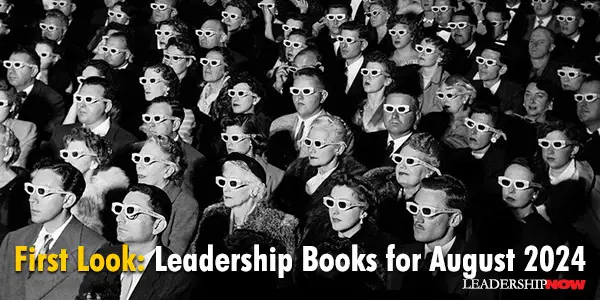
HERE'S A LOOK at some of the best leadership books to be released in August 2024 curated just for you. Be sure to check out the other great titles being offered this month.
An engaging guide to owning and elevating your work experience. With tips, watchouts, and funny stories, Leading Yourself will give you the encouragement and tactics to up-level your career, even if you aren't in your dream job. You'll learn to manage your self-talk, find meaning in the mundane, optimize your time at work, and build relationships with the people who matter.
In an era marked by increasing profiteering and inequality, The Ethical Imperative offers a compelling alternative vision―one where companies champion the collective prosperity of employees, shareholders, and communities. Cooper leverages academic studies and research to challenge the status quo. He exposes the critical threat of public disengagement from businesses and institutions, urging a departure from outdated, profit-only models that harm corporations, consumers, and communities alike.
Companies are fighting the wrong battle. The consensus has been to learn the best practices from tech giants and then imitate them. But new paths for growth aren't created by imitation; they're forged by radical differentiation. In Smart Rivals, Harvard Business School professor Feng Zhu and former Bloomberg journalist Bonnie Yining Cao show business leaders how to create competitive advantages by offering product features and benefits that tech giants and other competitors cannot match in the digital/AI age.
Technology, isolation, and increasing demands for productivity are making the workplace a hotbed for stress—it's no surprise employees are abandoning traumatic workplaces in unprecedented numbers. Ed Beltran, the CEO of a powerhouse leadership communication company, believes the antidote to stressed-out workplaces starts with conversation. This is no ordinary self-help book. The transformative process of fierce resilience goes well beyond developing mere coping skills. It helps people take control of their emotional health, become more resilient, and build organizations with resilience as a core part of their DNA.
How you do anything is how you do everything. Great performance, whether at work or at home, starts with the little things: making your bed, organizing your closet, maintaining your yard, shooting a basketball, closing a deal. Elevate Your Excellence offers a foolproof approach to improve the often-neglected everyday disciplines like hydration, sleep quality, and mindset maintenance that can make all the difference in generating high-quality performance. Anderson encourages readers to make simple and immediately actionable tweaks to begin doing ordinary things extraordinarily well to transform their lives.
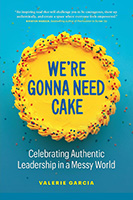 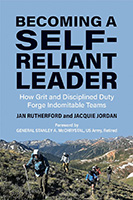 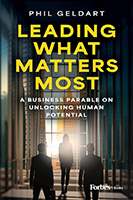 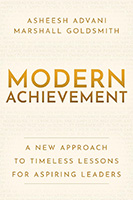
“Miss a meal if you have to, but don't miss a book.” — Jim Rohn
Posted by Michael McKinney at 08:55 AM
07.01.24

First Look: Leadership Books for July 2024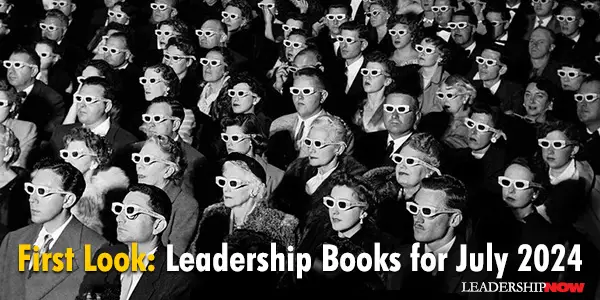
HERE'S A LOOK at some of the best leadership books to be released in July 2024 curated just for you. Be sure to check out the other great titles being offered this month.
In Lead Boldly, peak performance coach Hugh Blane shares his three guiding principles for converting human potential into inspired performance. He does this by providing a detailed road map for transforming a leader’s results at work and home in unprecedented ways. Lead Boldly makes the compelling case that there are vast levels of untapped potential in every corner and cubicle of organizations. Because of unparalleled stress, burnout, disengagement, and continual distraction, employers are sitting on a treasure trove of potential but have, until Lead Boldly, lacked the keys to developing the mindset and skill set to unlock it.
The breakthrough concepts of Pattern Breakers come from the observations of Mike Maples Jr., a seasoned venture capitalist, who noticed something strange. Start-ups like Twitter, Twitch, and Lyft had achieved extraordinary success despite their disregard for “best practices.” In contrast, other startups deemed highly promising often failed, even when they seemed to do everything right. Pattern-breaking success, they reveal, demands a different mindset and actions to harness developments others miss or that may, at first, seem crazy. Maples and Ziebelman vividly illustrate an unexpected world where chaos is welcome, naysayers are a positive signal, movements galvanize believers—but one that ultimately change the future. They challenge us to rethink how to transcend the ordinary and achieve the extraordinary.
From former Navy SEAL, entrepreneur, father, and New York Times bestselling author Mark Divine comes Uncommon—an inspirational book following Mark Divine's trademark warrior monk philosophy that will lead you to the summit of personal development. To be common is to be an everyday person. It's to do the things that you are expected to do, whether that's what your parents want for you, or your employer, or your spouse, et cetera. But if you want to be more than you are, more than you think you can be, then you need to recognize and learn from your mistakes to lead a life of excellence.
Supercharge the wellbeing and productivity of everyone around you using the power of encouragement. In The Art of Encouragement, renowned performance coach and keynote speaker Jordan Montgomery delivers a captivating story designed to walk the reader through a dramatic journey of heartfelt, easy-to-understand lessons about encouragement and its many facets. The author compels you to take action by showing you that you're fully equipped and ready to implement encouragement within your own organization, team, family, and community.
In From Conflict to Convergence, two expert collaborative problem solvers deliver an incisive, hands-on guide to de-escalating conflict and constructively engaging with those you disagree with to find better solutions to problems. In this book full of real-life stories and examples, you'll find a collection of tried and tested strategies you can employ immediately as you negotiate and navigate your most seemingly intractable conflicts. You'll learn how finding what the authors call “higher ground” can advance your interests even when facing people and groups you think you have little in common with and how this can set the stage for longer term cooperation.
In The Soil of Leadership, Dr. Britt Yamamoto presents a unique and memorable perspective on leadership that challenges conventional wisdom for guiding others. Inviting us to “dig where we stand,” The Soil of Leadership seamlessly weaves evocative metaphors and captivating narratives from Dr. Yamamoto’s life as both a sustainable farmer and organizational leader. Through these vivid examples, he illuminates the profound notion that genuine leadership doesn’t solely emerge from visible accomplishments; rather, it thrives within the hidden roots that allow our true potential to flourish.
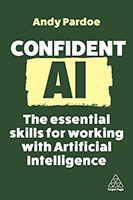 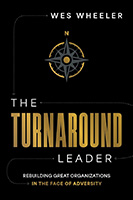 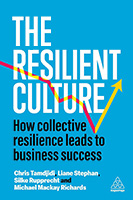 
“Miss a meal if you have to, but don't miss a book.” — Jim Rohn
Posted by Michael McKinney at 06:59 AM
06.21.24

10 Books You Should Read This Summer 2024
SUMMER is here. The summer is a perfect time to explore new ideas and perspectives to challenge your thinking and expand your potential. Create a summer reading plan. Try a book you usually don’t pick up. Wally Bock offers his advice on this here. Here are ten suggestions for books released this year to inspire you and help grow your leadership.
Come inside a jury room as one juror leads a starkly divided room to consensus. Join a young CIA officer as he recruits a reluctant foreign agent. And sit with an accomplished surgeon as he tries, and fails, to convince yet another cancer patient to opt for the less risky course of treatment. In Supercommunicators, Charles Duhigg blends deep research and his trademark storytelling skills to show how we can all learn to identify and leverage the hidden layers that lurk beneath every conversation. (Blog Post)
In Possible, Ury argues conflict is natural. In fact, we need more conflict, not less—if we are to grow, change, evolve and solve our problems creatively. While we may not be able to end conflict, we can transform it—unleashing new, unexpected possibilities. With this groundbreaking book, international negotiator William Ury shares a new “path to possible”—time-tested practices that will help readers unlock their power to constructively engage and transform conflict. (Blog Post)
When you put learning at the center of everything you do, you grow your career, your leadership, your relationships, and your joy and fulfillment in life. But even for people who are naturally curious and interested in solving problems, being an effective learner who can turn their learning into action takes insight and practice. David Novak shows you how to master active learning. This compilation of wisdom and practical habits from Novak's life and from some of the most successful leaders in the world—CEOs from many industries, military and political leaders, sports greats, experts, and coaches—is your active-learning practice manual.
Inspired by venture capitalists’ unique way of thinking, The Venture Mindset offers a transformative playbook for delivering results in a rapidly changing world from a top Stanford professor and a technology executive. Venture capitalists are known for their extraordinary ability to spot opportunities. They know how to identify emerging trends, how to bring new industries into being, and when to hold them and when to fold. Their unique mindset has made them the force behind world-changing companies such as Amazon, Google, Moderna, SpaceX, and Zoom. Combining their insight and extensive experience, they present nine distinct principles that will help you make better decisions, transform your business, and achieve remarkable results, no matter your industry. (Blog Post)
A radical set of new ideas for how entrepreneurs, investors, and corporate leaders can use the pattern-breaking mindset to dominate the future. Pattern-breaking success, the authors, demands a different mindset and actions to harness developments others miss or that may, at first, seem crazy. Pattern Breakers is filled with firsthand storytelling about initial interactions with some of the most transformative start-ups of recent times. Maples and Ziebelman vividly illustrate an unexpected world where chaos is welcome, naysayers are a positive signal, movements galvanize believers—but one that ultimately change the future. They challenge us to rethink how to transcend the ordinary and achieve the extraordinary.
The Way of The Champion is the synthesis of everything Paul Rabil learned on his path to becoming one of the greatest lacrosse players of all time. But this is not merely a sports book. It is a guide to embodying a champion's mindset—in sports, in business, and in relationships. According to Rabil, “No one is born to be a champion. It can only be earned—through equal parts philosophy, execution, and sheer determination. I've won and lost championships, business deals, and relationships. I've learned that our best moments come after we've faced our most devestating defeats—when we choose to rise with unwavering resolve. That's the way of the champion."
John C. Maxwell, tackles the problem of our divided world in his latest book High Road Leadership. “Today it is causing people to fall—into disputes, frustration, anger, and despair. His solution is to expose the problems of taking the low and middle roads when interacting with others and teach people how to instead take the high road. Leaders who practice high road leadership value all people, do the right things for the right reasons, take accountability for their actions, and place people above their own agenda. Maxwell teaches the principles and practices of high-road leadership that can increase anyone’s influence and help them make their world a better place.
Drawing on two decades spent leading HR organizations at Deloitte and Cisco, Ashley Goodall reveals why change is not the same as improvement, and how, by prioritizing team cohesion (instead of reshuffling teams at will), by using real words (rather than corporate-speak), by sharing secrets (not mission statements), by fixing only the things that are truly broken (instead of moving fast and breaking everything in sight, and more, leaders at every level can create the stability that people need to thrive.
Nothwithstanding her personal opinions, Leadership from Bad to Worse is a valuable look at how leadership that is bad, invariably, inexorably, gets worse—unless it is somehow, by someone or something, stopped or slowed. The process of going from bad to worse tends to be steady, as opposed to hasty. But once bad burrows in, it digs in. It digs in deeper and then deeper, making it difficult finally to extract or excise without getting rid of whoever and whatever is involved. Knowing that bad leadership can be checked before it corrupts is knowing that bad and then worse can be, if not completely precluded, then sometimes short-circuited.
Many business leaders have repeatedly asked Nido Qubein to chronicle how a small college in North Carolina rose to national attention and grew substantially in spite of the Great Recession of 2008 and the coronavirus in 2020. The author demonstrates his respect for the academy as he leads his team to nurture a God, family, and country university focused on providing the perfect balance between intellectual discovery and practical life skills. You'll find a long list of useful strategies that can be successfully implemented in any enterprise and you'll find yourself thinking differently about some processes and preparing distinctively for some new initiatives.
Posted by Michael McKinney at 11:57 AM
06.01.24

First Look: Leadership Books for June 2024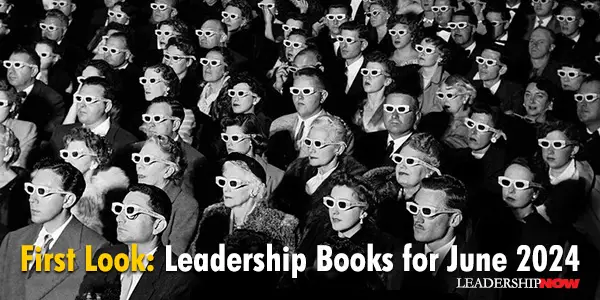
HERE'S A LOOK at some of the best leadership books to be released in June 2024 curated just for you. Be sure to check out the other great titles being offered this month.
In the bestselling The Signal and the Noise, Nate Silver showed how forecasting would define the age of Big Data. Now, in this timely and riveting new book, Silver investigates “the River,” the community of like-minded people whose mastery of risk allows them to shape—and dominate—so much of modern life. These professional risk-takers—poker players and hedge fund managers, crypto true believers and blue-chip art collectors—can teach us much about navigating the uncertainty of the twenty-first century.
In Good Judgment, Dr. Davis explains what the science of personality is and how it works, and how all of us can use it to improve our working relationships, careers, and lives. Whether you’re a novice manager looking to hire your first assistant, a board member in need of the ideal CEO, an angel investor trying to choose between two different startups, or a new parent selecting a pediatrician, understanding the science of personality and how to utilize it is the key to exercising good judgment—at work and in life.
Robert Roncska offers insights into the transformation of positive cultures that turned sour and negative cultures that became renowned. When he assumed command of the USS Texas, the ship ranked at the bottom of its squadron and faced recurring safety issues. Through innovative strategies, he successfully transformed the culture, propelling his submarine's ranking and retention from last place to first place in the Pacific Fleet within a remarkable two-year period. Starting with a loving and people-centric approach, Roncska laid the groundwork of trust, standards, and purpose. In this book, he presents a roadmap that leaders can adapt to any industry, empowering readers to create high-quality relationships and elevate their organization's performance beyond expectations.
When you put learning at the center of everything you do, you grow your career, your leadership, your relationships, and your joy and fulfillment in life. But even for people who are naturally curious and interested in solving problems, being an effective learner who can turn their learning into action takes insight and practice. With infectious enthusiasm and optimism, David Novak shows you how to master active learning. This compilation of wisdom and practical habits from Novak's life and from some of the most successful leaders in the world—CEOs from many industries, military and political leaders, sports greats, experts, and coaches—is your active-learning practice manual. Chapter by chapter, Novak and his all-star roster of leaders share how they've climbed to the highest levels in their fields.
The AI transformation is underway, but where are the leaders who will ensure their companies implement AI successfully and responsibly? Up until now, leaders have largely ceded their role in the AI transformation, pushing strategy formulation out to tech teams and leaving investment decisions to groups that don't have a full view of the organization or its goals. A generation of AI transformation failures awaits if leaders don't connect their use of AI to their strategies. This book helps leaders take control of the wildly rapid deployment of AI across organizations. Clearly and concisely, it focuses on the nine actions leaders need to take in order to successfully preside over the transition to a more AI-centric future that will lead to growth for all—companies and workers—and avoid the kinds of mistakes that author David De Cremer has seen many early adopters make.
The Gouge, in military parlance, is what you really need to know in order to be smarter than the situation you are in. As a US Navy SEAL, who became a Vice Admiral, Bob Harward lived by the Gouge and used it as a guiding principle for leadership and day-to-day life. More specifically, his success in his military and corporate careers was predicated on the people who worked with him, and for him. Now, he is sharing it with the world. In this book, he uses life stories to illustrate how anyone can use the Gouge, not only for their own well-being but also for any organization or community. At its foundation, it is your personal contract with people and humanity. In this book, Harward boils all of this down into the Gouge philosophy and its key ingredients: on how to move yourself and the people around you forward, using the best information and experienced based knowledge, so that you too can live by the Gouge.
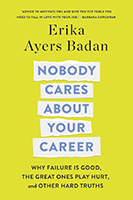 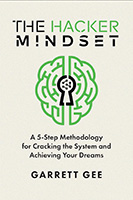 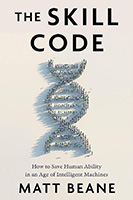 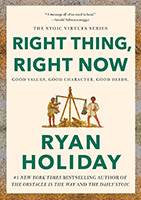
“Miss a meal if you have to, but don't miss a book.” — Jim Rohn
Posted by Michael McKinney at 08:15 AM
05.01.24

First Look: Leadership Books for May 2024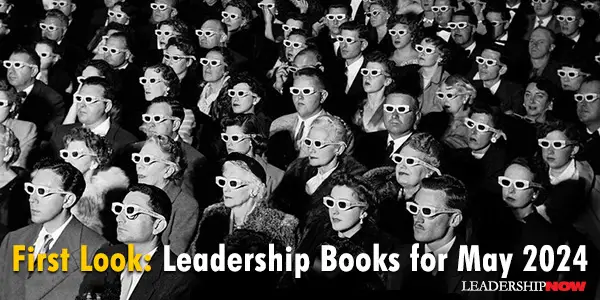
HERE'S A LOOK at some of the best leadership books to be released in May 2024 curated just for you. Be sure to check out the other great titles being offered this month.
The world’s most influential leadership expert, John C. Maxwell, tackles the problem of our divided world in his latest book High Road Leadership. “Today it is causing people to fall—into disputes, frustration, anger, and despair. His solution is to expose the problems of taking the low and middle roads when interacting with others and teach people how to instead take the high road. Leaders who practice high road leadership value all people, do the right things for the right reasons, take accountability for their actions, and place people above their own agenda. In his trademark communication style, Maxwell teaches the principles and practices of high-road leadership that can increase anyone’s influence and help them make their world a better place.
Ask leads to smarter decisions, more creative solutions, and deeper relationships. Too often, we don’t find out what’s truly on others’ hearts and minds because we don’t know how to ask the right questions in the right ways. Co-founder of Transcend and former international business consultant and Teach for America executive Jeff Wetzler wants to show you how to fix that. In Ask, he brings you a powerful method called The Ask Approach™, based on a simple premise: that tapping into what other people truly think, know, and feel is a game-changing superpower.
Becoming a CEO is a high-stakes moment, whether it's your first, second, or third time in the seat. What you say and how you act in your early days as CEO sets the tone for how you'll be perceived for years to come. Yet, until now, few CEOs have shared their stories on what worked, what didn't, and what they wish they'd done differently. In The New CEO, Dr. Ty Wiggins, an experienced leadership advisor specializing in CEO transitions, explains how to land well as a new CEO, accelerate your impact, and unlock the most affirming experience of your career.
Scott Mautz defines mental strength as the ability to self-regulate emotions, thoughts, and behaviors to achieve exceptional outcomes, despite adversity. It’s the leadership superpower of our times. Mentally strong leaders are confident and in control of themselves and their environment; they have endurance, are disciplined, and external stressors make their decision-making sharper. They’re a safe port in a storm for their team. The Mentally Strong Leader gives readers a mental exercise plan to become such a leader. Readers will walk away with a menu of over 50 proven tools they can choose from to build a tailored set of habits in six areas that will make them mentally stronger
I'm not here to make work friends. Or am I? Managers, peers, work friends, mentors, frenemies, annoying people, romantic interests, your boss's boss, and so on. We probably spend more hours with our coworkers than with anyone else. So even if they're not all perfect, it's worth building connections with them that will provide you with support, help you network and learn, and keep your career moving forward.
Inspired by venture capitalists’ unique way of thinking, The Venture Mindset offers a transformative playbook for delivering results in a rapidly changing world from a top Stanford professor and a technology executive. Venture capitalists are known for their extraordinary ability to spot opportunities. They know how to identify emerging trends, how to bring new industries into being, and when to hold them and when to fold. Their unique mindset has made them the force behind world-changing companies such as Amazon, Google, Moderna, SpaceX, and Zoom. Stanford Professor Ilya Strebulaev has devoted two decades to studying VCs’ counterintuitive approaches to decision-making and the reasons behind the successes and failures of corporate innovations. Alex Dang has witnessed up close how VCs’ thinking and mechanisms can create successful businesses at companies like Amazon and McKinsey. Combining their insight and extensive experience, they present nine distinct principles that will help you make better decisions, transform your business, and achieve remarkable results, no matter your industry.
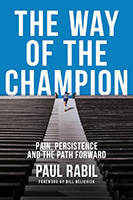 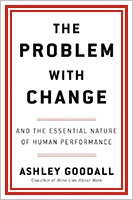 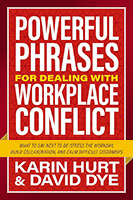 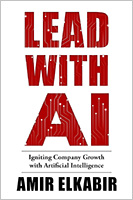
“Miss a meal if you have to, but don't miss a book.” — Jim Rohn
Posted by Michael McKinney at 08:40 AM
04.01.24

First Look: Leadership Books for April 2024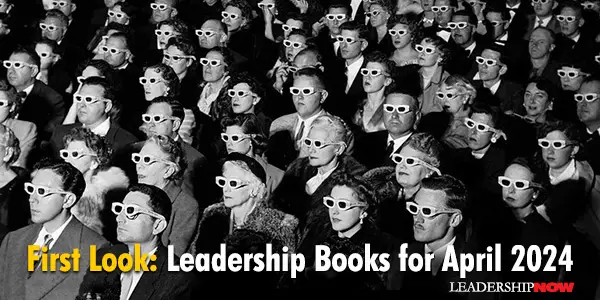
HERE'S A LOOK at some of the best leadership books to be released in April 2024 curated just for you. Be sure to check out the other great titles being offered this month.
Google’s Executive Productivity Advisor offers insights on how to make the “new way of work” work for you, providing actionable steps to optimize your productivity, accomplish more, prevent burnout, and cultivate a harmonious work-life balance. Every day, tens of thousands of Google employees, from executives to interns, rely on Laura Mae Martin’s tips and best practices for how to make the most of their time. Now, with Uptime, Laura brings her unique approach to productivity and well-being to anyone who wants to be more effective and experience “calm accomplishment,” whether at work, at school, or in their own personal lives.
Something new entered our world in November 2022 — the first general purpose AI that could pass for a human and do the kinds of creative, innovative work that only humans could do previously. Wharton professor Ethan Mollick understood that humans had developed a kind of co-intelligence that could augment, or even replace, human thinking. Through his writing, speaking, and teaching, Mollick has become one of the most prominent and provocative explainers of AI, focusing on the practical aspects of how these new tools for thought can transform our world. In Co-Intelligence, Mollick urges us to engage with AI as co-worker, co-teacher, and coach. He assesses its profound impact on business and education, using dozens of real-time examples of AI in action. Co-Intelligence shows what it means to think and work together with smart machines, and why it's imperative that we master that skill.
What is a mentor? Why is having a mentor crucial to success? Or how do you make sure that you're a good mentor? In Mentorship Unlocked: The Science and Art of Setting Yourself Up for Success, veteran entrepreneur and innovator Janice Omadeke delivers an insightful discussion of mentorship, including what it is, how to find a qualified mentor, and how to make mentorship work for you. In the book, she explores the mentorship advice that helped her start a groundbreaking company after studying entrepreneurship and strategic management at MIT and Harvard. You’ll find practical steps you can take to build your own plan for finding the right mentor for you, or for becoming someone else’s trusted advisor.
Perhaps you're busy but still feel empty. Maybe things haven't turned out how you'd hoped, and life seems stale and unfulfilling. What if you could wake up every morning excited about your purpose, knowing you're fulfilling your greatest potential? A more meaningful life is within your reach, and it starts in one place: your mind. Living with a mindset of false narratives will keep you stuck, locked in a prison of unpursued dreams and goals. But cultivating a new mindset based on what is actually true will set you free—free to start exploring and growing beyond the limits you thought you had. In Think This, Not That, Dr. Josh Axe unpacks the top twelve mental barriers holding people back from realizing their potential and becoming the greatest version of themselves, and contrasts each one with a new empowering mindset.
Leading successfully in a world full of disruption means building more than technical skills. Yes, you must deliver results, but to run a successful business you need people—and people today want leaders who can and will work to see beyond themselves and only the bottom line—you must learn to lead with your heart. Being vulnerable with your staff is intimidating, but when connecting with people not only will you grow as a leader and a person, but your business will grow as well. Bringing your authentic self to your leadership takes courage and commitment, but you reap profound benefits from heart-led generous acts. This book presents 7 ways to give of yourself for everyone’s gain. As you build your skills with the guidance from this trusted reference, success will spread from your generosity to the people you work with, to your organization, to your own career and even society. There is no more powerful leader than a generous leader.
Today’s institutions are facing a serious, global crisis that threatens to destroy how we work, live, serve, and play. No, it’s not a health or financial crisis; it’s a leadership crisis. Organizations around the world are lacking effective, competent leaders who know how to make a significant personal investment in both their organization and the people within it. More importantly, this generation of leaders isn’t awakening the untapped potential within their teams. That is a problem—perhaps the problem—that leads us into dull, dreary workdays and wholly ineffective, unsatisfying work. It’s time to change that. Leaders aren’t born; they’re equipped!
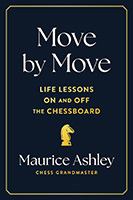 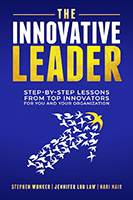 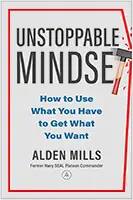 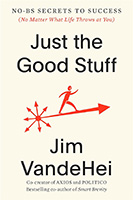
“Miss a meal if you have to, but don't miss a book.” — Jim Rohn
Posted by Michael McKinney at 07:21 AM
03.01.24

First Look: Leadership Books for March 2024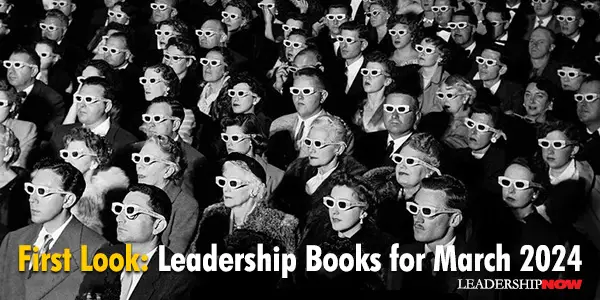
HERE'S A LOOK at some of the best leadership books to be released in March 2024 curated just for you. Be sure to check out the other great titles being offered this month.
Our current definition of “productivity” is broken. It pushes us to treat busyness as a proxy for useful effort, leading to impossibly lengthy task lists and ceaseless meetings. We’re overwhelmed by all we have to do and on the edge of burnout, left to decide between giving into soul-sapping hustle culture or rejecting ambition altogether. But are these really our only choices? From the aggressive rethinking of workload management, to introducing seasonal variation, to shifting your performance toward long-term quality, Slow Productivity provides a roadmap for escaping overload and arriving instead at a more timeless approach to pursuing meaningful accomplishment. The world of work is due for a new revolution. Slow productivity is exactly what we need.
In Think Remarkable, tech titan Guy Kawasaki teams up with Madisun Nuismer, producer of the Remarkable People podcast, to share invaluable knowledge from more than 40 years of working with game-changing organizations such as Apple, Canva, Google, Mercedes Benz, and Wikipedia, and delivers insights from a collection of amazing interviews that'll kick you into high gear and get you ready to start showing the world your best, most amazing self. Together the authors show you how to lead a fulfilling life by drawing on insights from working closely with some of the world's most remarkable people.
In Cultures of Growth, Dweck’s protégé, Mary Murphy, a social psychologist at both Stanford and Indiana University, shows that mindset transcends individuals. A growth mindset culture can transform any group, team, or classroom to reach breakthroughs while also helping each person achieve their potential. Create environments where people want to be, where everyone can thrive and achieve their potential, both individually and together. In a world where success seems reserved for a chosen few, Cultures of Growth unveils a radically different approach to creating organizations that inspire learning, growth, and success at all levels.
Leadership from Bad to Worse is about how leadership that is bad, invariably, inexorably, gets worse--unless it is somehow, by someone or something, stopped or slowed. The process of going from bad to worse tends to be steady, as opposed to hasty. But once bad burrows in, it digs in. It digs in deeper and then deeper, making it difficult finally to extract or excise without getting rid of whoever and whatever is involved. Bad leadership is a social disease. But unlike diseases that are physical or psychological, it remains at the margins of our collective concerns. Leadership from Bad to Worse is, then, a corrective. Knowing that bad leadership can be checked before it corrupts is knowing that bad and then worse can be, if not completely precluded, then sometimes short-circuited.
People love to keep score. Managers keep score of a range of business metrics: market share, revenue, profit margin, growth rate. In our personal lives, social media has us keeping score by likes and followers. Offering both descriptive and prescriptive advice and anecdotes, The Score That Matters will help you unlock true fulfillment and happiness by discovering your purpose, identifying your values, and creating critical behaviors and living them faithfully every day in all aspects of your life.
Entrepreneurs often have a burning need to succeed. But that same relentless brilliance that propels you in your career can take a toll on your teams, personal relationships, and even your health. Gino Wickman, bestselling author of Traction, teams up with mindfulness expert Rob Dube to help readers strike a crucial balance between those inner and outer worlds while taking your success to new heights. In Shine, they share 10 disciplines to help you stay sharp and energetic without burning out. You’ll learn to: Set boundaries in your work life (without compromising productivity) that allow you to become a better leader and better person; Practicable sustainable ways to reset your energy and recognize burnout and stress before they happen; Tap into a flow state to harness unbridled creativity, think clearly, and move through your career and life with ease.
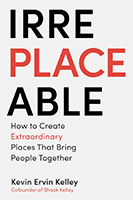 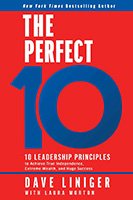 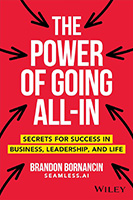 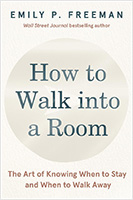
“... a mind needs books as a sword needs a whetstone, if it is to keep its edge.” — George R.R. Martin, A Game of Thrones
Posted by Michael McKinney at 09:34 AM
02.01.24

First Look: Leadership Books for February 2024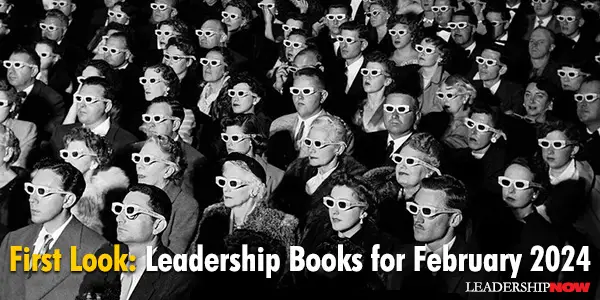
HERE'S A LOOK at some of the best leadership books to be released in February 2024 curated just for you. Be sure to check out the other great titles being offered this month.
Learn how to perform at your very best, from the psychologist who has advised elite military operators, Olympic medalists, big wave surfers, neurosurgeons, cliff divers, first responders, Cirque du Soleil acrobats, professional athletes and coaches, Fortune 500 business executives, and CIA analysts. Learned Excellence is a comprehensive and practical guide to the mental disciplines of high performance, from the expert who developed the US Navy SEALs mental toughness curriculum and has worked with thousands of top athletes, elite military personnel, business executives, and first responders. These stars perform across a wide variety of fields, but they all have something in common: when they are at work they know how to think clearly, stay focused, and shrug off setbacks under very high levels of stress.
The always-on, hustle culture creates an unhealthy, counterproductive relationship with work. Many workers believe that to compete with other top talent, they must embrace a culture that rewards long hours and a constant connection to work. Businesses and society endorse busyness, overwork, and extreme commitment as the most valued traits in workers. Sometimes that endorsement is explicit, as when Elon Musk told X/Twitter employees to work "long hours at high intensity" or get fired. More often it's an implicit contract, a buildup of organizational and cultural norms and the adoption of new technologies that make it easy to tether people to work. Either way, this workaholic behavior is unhealthy and counterproductive for workers and for organizations. It's time to fight back.
Today's headlines teem with employee unrest over racial injustice, communities infuriated by corporate environmental impacts, staff anxiety over surveillance, public outrage over corruption in business, and discoveries of child labor in supply chains. We've traveled far and fast from the old world of business ethics, where black-and-white concerns about bribery and fraud could be addressed via rules and processes. Simply maximizing shareholder value while not breaking the law is no longer a tenable approach, but we've never been so confused about what it means to do the right thing—and why it's so important.
Come inside a jury room as one juror leads a starkly divided room to consensus. Join a young CIA officer as he recruits a reluctant foreign agent. And sit with an accomplished surgeon as he tries, and fails, to convince yet another cancer patient to opt for the less risky course of treatment. In Supercommunicators, Charles Duhigg blends deep research and his trademark storytelling skills to show how we can all learn to identify and leverage the hidden layers that lurk beneath every conversation. Communication is a superpower and the best communicators understand that whenever we speak, we’re actually participating in one of three conversations: practical (What’s this really about?), emotional (How do we feel?), and social (Who are we?). If you don’t know what kind of conversation you’re having, you’re unlikely to connect.
Virtually every problem can be traced back to one root cause: leadership. Far too many leaders are struggling, merely maintaining the status quo and unable to find the way forward. What these leaders need is a fresh take on how to unlock their full potential. Uncommon Greatness is the key many leaders have been searching for their entire career. This book will reframe much of what you know about traditional leadership theory and practice, challenge some of your deeply held assumptions, and provide scores of practical and concrete ideas you can use today. Former Vice President of High Performance Leadership at Chick-fil-A, Inc., Mark Miller believes it’s possible for all leaders to lead at a higher level and increase their impact on the world.
Follow the incredible career journey of Lisa Lutoff-Perlo, from her stories as an ambitious young woman to President and CEO of Celebrity Cruises to Vice Chairman for External Affairs at Royal Caribbean Group. A shining testament to the value of being an authentic leader and never sacrificing your integrity, Lutoff-Perlo details the ins and outs of her extraordinary 40-year career. Along the way, she ultimately transformed and redefined relaxed luxury cruising with the launch of the bold, innovative Edge Series ships in 2018, which drove unprecedented demand for Celebrity Cruises and propelled the brand’s financial performance. She climbed the corporate ladder from the very bottom and overcame countless obstacles to reach the top of the cruise industry.
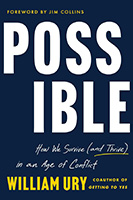 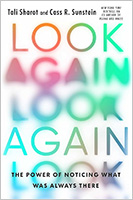 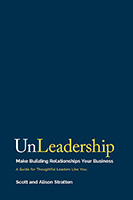 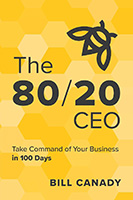
“... a mind needs books as a sword needs a whetstone, if it is to keep its edge.” — George R.R. Martin, A Game of Thrones
Posted by Michael McKinney at 11:13 AM
01.01.24

First Look: Leadership Books for January 2024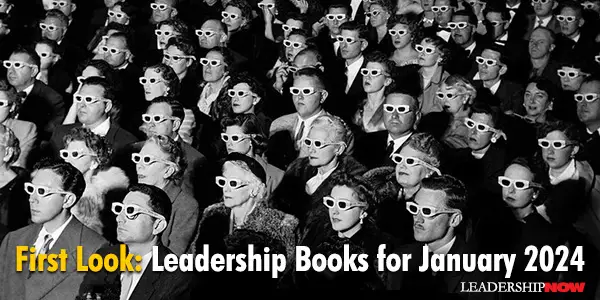
HERE'S A LOOK at some of the best leadership books to be released in January 2024 curated just for you. Be sure to check out the other great titles being offered this month.
It’s never been harder building successful teams. With challenges of work-from-anywhere, flex-schedule and generational divides, business leaders bend over backwards searching for solutions that work. They’ve tried everything from food perks and ping pong tables to endless team-building exercises and training—but nothing sticks. Now, in his long-awaited book for leaders at all levels, bestselling author Mike Michalowicz reveals his proven formula to build an unstoppable team for any work environment.
There are an estimated 200-500 million 1:1 meetings held each day around the world, but are they run as transformatively as they could be? Or are they just talk? In Glad We Met Rogelberg helps us maximize the potential of these crucial conversations. 1:1s are arguably one of the most critical meeting types for the success of team members, managers, coaches, teams, and organizations. The best managers recognize that 1:1s are not an add-on to their role as a manager. Conducting 1:1s successfully are foundational to being a manager. At the same time, these meetings are the core of a direct report's experience and development at work, including how well they engage and attach to their role, perceive the effectiveness of their manager, and envision their future at the organization.
There are moments when we achieve peak performance: An athlete plays a perfect game; a business has a quarter with once-in-a-lifetime profits. But these moments are often elusive, and for every amazing day, we may have a hundred ordinary and even unsatisfying days. Fulfillment doesn’t come from isolated peak experiences, but rather from many consistent good days. So how do we sustain performance, while avoiding burnout and maintaining balance? In Optimal, Daniel Goleman and Cary Cherniss reveal how emotional intelligence can help us have a great day, any day. They explain how to set a realistic, attainable goal of feeling satisfied that you’ve had a productive day — to consistently work at your ‘optimal’ level. Based on research of how hundreds of people build the inner architecture of having a good day, they sketch what an optimal state feels like, and show how emotional intelligence holds the key to our best performance.
Michael D. Watkins presents an actionable new framework to help aspiring leaders learn to think strategically—a set of skills more necessary than ever in a world of constant change. Pattern recognition. Systems perspective. Mental agility. Structured problem-solving. Visioning. Political savvy. For every good leader who has mastered of one of these disciplines is a great leader who knows and has mastered all of them. Watkins presents the six disciplines that separate the great from the good. Developed over the course of his storied career, Watkins’ approach to strategic thinking—"a set of mental disciplines leaders use to recognize potential threats and opportunities, establish priorities, and mobilize themselves and their organizations to envision and enact promising paths forward”—is the model followed by some of today’s most successful first-time CEOs and new business leaders.
Sometimes it seems that too many people are suffering from a crisis of identity, not sure what they stand for or what they want to do with their lives. The Goodwill Jar answers this problem. It teaches that when we focus on the good, offer the benefit of the doubt, and open our hearts to love, we can all live a richer life full of meaningful relationships. After all, humans are social creatures. Imagine what kind of world we would live in if everyone shared the goal of leaving others better than we found them. Follow the path of a typical person as they navigate the relationships that occur in every stage of life, from childhood to the grave. It starts with the foundational values of our youth, proceeds through those tumultuous teen years, on to early adulthood, mid-life, and finally ends at retirement. Every choice builds a legacy. Our leadership foundation begins when we are very young, setting the core values that drive choices for the rest of our lives. Once you know how to fill the goodwill jar of others, you can’t help but to live with a full goodwill jar yourself.
Every organization is plagued by destructive friction. Yet some forms of friction are incredibly useful, and leaders who attempt to improve workplace efficiency often make things even worse. Drawing from seven years of hands-on research, The Friction Project by bestselling authors Robert I. Sutton and Huggy Rao teaches readers how to become “friction fixers.” Sutton and Rao kick off the book by unpacking how skilled friction fixers think and act like trustees of others’ time. They provide friction forensics to help readers identify where to avert and repair bad organizational friction and where to maintain and inject good friction. Then their help pyramid shows how friction fixers do their work, from reframing friction troubles they can’t fix right now, so they feel less threatening, to designing and repairing organizations. The heart of the book digs into the causes and solutions for five of the most common and damaging friction troubles: oblivious leaders, addition sickness, broken connections, jargon monoxide, and fast and frenzied people and teams.
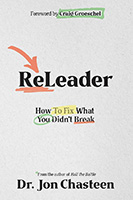 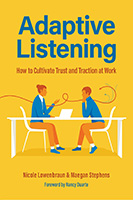 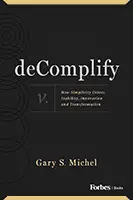 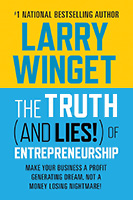
“... a mind needs books as a sword needs a whetstone, if it is to keep its edge.” — George R.R. Martin, A Game of Thrones
Posted by Michael McKinney at 04:11 PM
12.12.23

The Best Leadership Books of 2023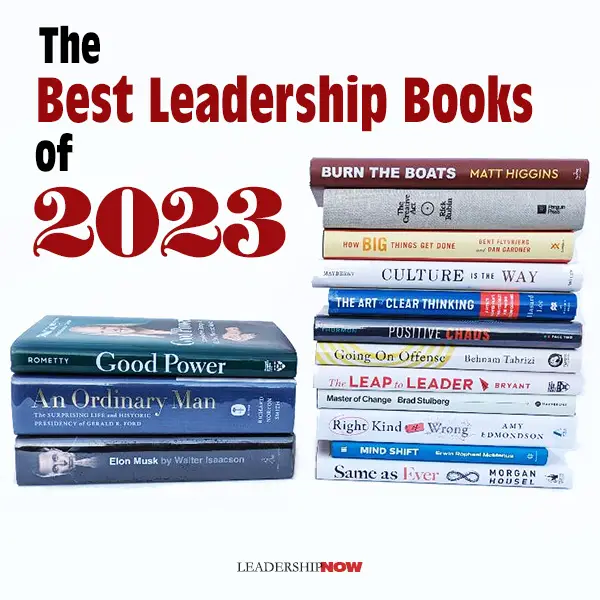
THE titles listed below—published in 2023—capture many of the key themes and trends organizations are wrestling with. In a time of great uncertainty, courage, empathy, love, and a passion to improve the status quo now and forever are required. These titles address how it can be done and how others are doing it. How many have you read?
(William Morrow, 2023)
(Penguin Press, 2023)
(Currency, 2023)
(Wiley, 2023)
(St. Martin's Press, 2023)
(Page Two, 2023)
(Ideapress Publishing, 2023)
(Harvard Business Review Press, 2023)
(HarperOne, 2023)
(Atria Books, 2023)
(Convergent Books, 2023)
(Portfolio, 2023)
Biographies:
(Harvard Business Review Press, 2023)
(Harper, 2023)
(Simon & Schuster, 2023)
Posted by Michael McKinney at 10:06 AM
12.01.23

First Look: Leadership Books for December 2023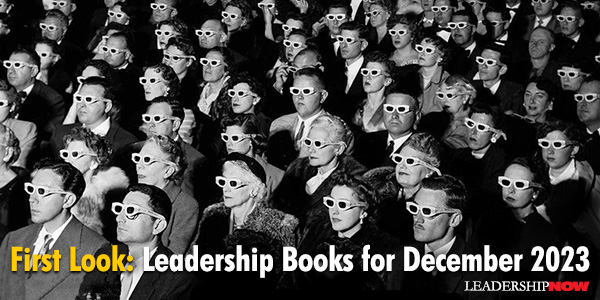
HERE'S A LOOK at some of the best leadership books to be released in December 2023 curated just for you. Be sure to check out the other great titles being offered this month.
How did Apple overcome a culture of secrecy? How did Pixar out-innovate Disney? Why do companies kill creativity? Does Shark Tank teach us something about the way we pursue success that isn't true? We've been told that working harder and smarter is the only way to succeed in business and life. But it's not true. Hustle culture is causing burnout and pain in our lives, making us feel divided. What if instead we focused on working creatively with others? And asked How can we shape cultures people love? There is hope in co-creation. Brave Together is a deep exploration into how we can live and lead as co-creators, filled with unexpected stories, powerful principles, and a future-oriented framework.
We’re told you can lead a horse to water, but you can’t make it drink. But what if this is not true? Having spent the past two decades helping Fortune 500 brands and leaders embrace the changes they’d rather fight or ignore, Michael McQueen understands what it takes to change even the most stubborn minds. But persuading others is getting harder and harder. In our ideology-driven and polarized age, certainty has taken the place of curiosity and open-mindedness has given way to obstinance. Drawing on the latest discoveries in disciplines ranging from neuroscience to behavioral economics, McQueen suggests that we are too often using nineteenth- and twentieth-century techniques to change twenty-first-century minds—and are wondering why it’s not working. What we need is an upgrade in our understanding of what it really takes to influence others.
Learn the NASA Astronaut mindset to solve problems, provide leadership in the face of adversity, and never give up when pursuing your wildest ambitions. Mike Massimino achieved his dream of exploring space. Now he distills stories and insights from NASA into an actionable guide to accomplish your biggest goals. Mike reveals how to make possible the seemingly impossible—on Earth. Written with characteristic wit and a big heart, Mike identifies ten hard-earned lessons of spaceflight and his other life experiences, including: One in a Million Is Not Zero, The Thirty-Second Rule, Be Amazed, Know When to Pivot. We all have our own personal “moon shots” we’d like to take in life, but as mission control will tell you, doing one big thing really means getting a thousand little things right along the way.
What’s the difference between your competitor and your enemy? You know who your competitors are. You keep tabs on them regularly, and can list them calmly, along with their strengths and weaknesses. But your enemies are a whole other matter. They’re the haters and the doubters who said you’d never make it, the ones who stomped on your dreams. When you think about your enemies, you get emotional. You feel like you won’t let anything—or anyone—stop you. In Choose Your Enemies Wisely, Patrick Bet-David shows how to harness that emotion to turbocharge your business, dominate this year, and grow for generations after. But first, you need to choose your enemies wisely.
A fresh take on assessing your priorities – both professionally and personally – to ensure you are in the best position to make a positive difference to the people and places around you, and in the process to transform your own life. The disruptive moment in which we find ourselves living demands that we are our own agents of change. The Seven Games of Leadership is a guide for readers through seven key phases of personal and professional development, with the aim not of climbing a corporate ladder but of finding true and lasting satisfaction in what they do. It encourages the realization that revolutionary change is not about destroying the current status quo, but about co-designing and rebuilding different paths for individuals to thrive, and go on to have a positive impact on society at large.
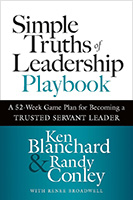 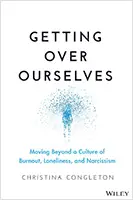 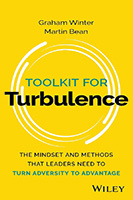 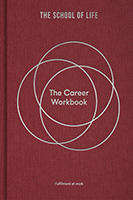
“... a mind needs books as a sword needs a whetstone, if it is to keep its edge.” — George R.R. Martin, A Game of Thrones
Posted by Michael McKinney at 07:41 AM
11.01.23

First Look: Leadership Books for November 2023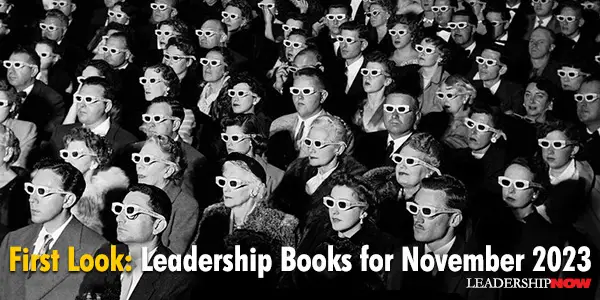
HERE'S A LOOK at some of the best leadership books to be released in November 2023 curated just for you. Be sure to check out the other great titles being offered this month.
Every investment plan under the sun is, at best, an informed speculation of what may happen in the future, based on a systematic extrapolation from the known past. Same as Ever reverses the process, inviting us to identify the many things that never, ever change. With his usual elan, Morgan Housel presents a master class on optimizing risk, seizing opportunity, and living your best life. Through a sequence of engaging stories and pithy examples, he shows how we can use our newfound grasp of the unchanging to see around corners, not by squinting harder through the uncertain landscape of the future, but by looking backwards, being more broad-sighted, and focusing instead on what is permanently true.
Books on innovation mostly focus on how to nurture innovative cultures and brainstorm ideas. The Heart of Innovation is the first popular book to concretely delve into what innovations really are and how to create them. Many attempts at innovation fail because customers turn out to be indifferent. The key to success is to uncover unmet authentic demand; what customers cannot be indifferent to. Through fresh case studies, ranging from how SoulCycle revolutionized the fitness industry, to how IBM built an $8 billion business on the Web, to a single mother ending abuse in a slum in Africa, The Heart of Innovation explores how authentic demand is often hidden or taken for granted.
Healthy communication is essential in any professional or personal relationship. When the lines of communication are frayed or broken, the resulting drama, unnecessary conflict, and inefficiency often lead to 'dropping the ball'. Better communication yields better results. It's a no-brainer―honest conversations build deeper, more productive relationships. It may seem simple in theory, but healthy communication is one of the most challenging things to master in practice. The Communication Code helps you set up conversations and communication in a way that creates a win-win scenario for everyone involved.
What is “being geeky?” It’s being a perennially curious person, one who's not afraid to tackle hard problems and embrace unconventional solutions. McAfee shows how the geeks have created a new culture based around four norms: science, ownership, speed, and openness. The geek way seems odd at first. It's not deferential to experts, fond of planning and process, afraid of mistakes, or obsessed with "winning." But it explains everything from why Montessori babies turn out to be creative tinkerers to how newcomers are disrupting industry after industry (and still just getting started). When all four norms are in place, a culture emerges that is freewheeling, fast-moving, egalitarian, evidence-driven, argumentative, and autonomous. Why does the geek way work so much better?
The logical, inspirational, and simplified approach you need to lead through unprecedented chaos―and help your teams and organizations thrive In today’s world of near-constant disruption, every leader faces a slew of conflicting demands involving employees of different generations, cultures, and age groups; one of history’s tightest labor markets; and never-ending geopolitical, climate, financial, and health challenges. Lead Through Anything provides simple, tested and actionable strategies to help you continually level-up your impact as an individual, manager, and leader.
In Areté, Brian Johnson integrates ancient wisdom, modern science, and practical tools to, as per the sub-title of the book, help you win the ultimate game of life and fulfill your destiny. What Brian has developed is much more than a bunch of coping mechanisms for the over-stressed modern person; although that would be an improvement for most of us. He's developed a training program for the soul. Commit to this training and you will gain the ability to transmute your biggest problems, your darkest days, into unstoppable courage, endless enthusiasm, and an unshakable faith in the future. This book will change your life.
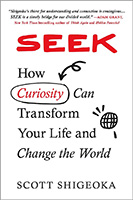 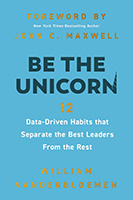 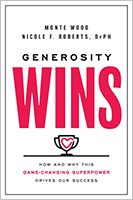 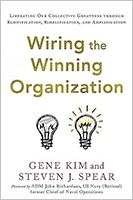
“... a mind needs books as a sword needs a whetstone, if it is to keep its edge.” — George R.R. Martin, A Game of Thrones
Posted by Michael McKinney at 07:09 AM
10.01.23

First Look: Leadership Books for October 2023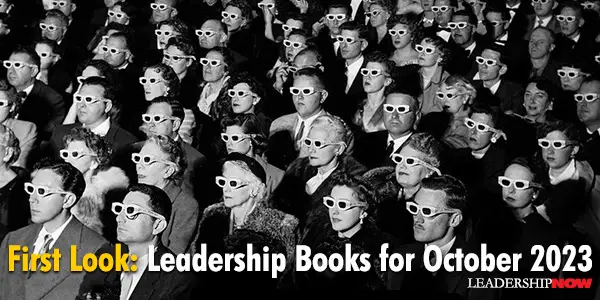
HERE'S A LOOK at some of the best leadership books to be released in October 2023 curated just for you. Be sure to check out the other great titles being offered this month.
We live in a world that’s obsessed with talent. We celebrate gifted students in school, natural athletes in sports, and child prodigies in music. But admiring people who start out with innate advantages leads us to overlook the distance we ourselves can travel. We underestimate the range of skills that we can learn and how good we can become. We can all improve at improving. And when opportunity doesn’t knock, there are ways to build a door. Hidden Potential offers a new framework for raising aspirations and exceeding expectations.
Throughout his thirty years of work as a mindset expert and leadership coach, Erwin Raphael McManus has been obsessed with these questions: Why do some people succeed despite having all the odds stacked against them? How do others achieve the unthinkable, only to watch their lives slip away? Are there mental structures for failure and success? McManus has come to realize that too many of us have “near-life” experiences. We almost pursue our dreams. We almost make the decision that changes everything. We are always one choice away. In Mind Shift, McManus brings together twelve mental frameworks that have helped some of the most accomplished people on earth create internal structures of success.
Speed has gotten a bad name in business, much of it deserved. When Facebook made "Move fast and break things" an informal company motto, it fueled a widely held belief that we can either make progress or take care of people, one or the other. That a certain amount of wreckage is the price we have to pay for inventing the future. Leadership experts Frances Frei and Anne Morriss argue that this belief is deeply flawed—and that it keeps you from building a great company. Helping executives and entrepreneurs solve their toughest problems over the past decade, Frei and Morriss learned that the trade-off between speed and excellence is false. The best leaders solve hard problems with fierce urgency while making their organizations—employees, customers, and shareholders—even stronger. They move fast and fix things.
Ron Shaich, founder and former CEO of Panera Bread, is a business visionary who has been part of building three iconic restaurant brands: Au Bon Pain, Panera Bread, and now Cava. How did Shaich succeed repeatedly in such a notoriously tough industry? By discovering today what will matter tomorrow and never hesitating to undertake sweeping transformations in order to get the job done. He offers clear-headed lessons for the entire life cycle of an enterprise, from bootstrapping a startup to going public to managing large companies to selling a business. And the relevance of his message doesn't end in the boardroom. Telling yourself the truth, knowing what really matters, and getting it done is the path to creating and sustaining a meaningful life, a market-leading business, and even a healthier society.
In Leadership Revolution, executive coach Lori Mazan delivers an exciting new approach to leadership development tailor-made for the 21st century. Drawing on lessons learned from coaching top executives for 25 years, you’ll learn how to attract and retain talent by accelerating and individualizing their professional growth and how to re-think leadership in the new remote and hybrid work environment. An invaluable and practical strategy guide for leadership and talent development, Leadership Revolution is the perfect resource for managers, executives, coaches, and other business leaders looking for proven ways to shape the next generation of leaders in their firms.
How do some of the world's top leaders unlock the potential of others, create trust, and lead through change? Jacob started out with one basic question: Is vulnerability the same for leaders as it is for everyone else? It turns out that it's not. On August 20, 1991, Hollis Harris, the CEO of struggling Continental Airlines told his 42,000 employees to pray for the future of the company. The next day he was fired. What Hollis did was vulnerable, but it was not leadership. While vulnerability cripples some leaders, others tap into it and use it as a superpower. Vulnerability alone makes leaders seem incompetent. Competence on its own makes it hard for leaders to connect with their people. The key is to develop both competence and vulnerability, what Jacob calls "The Vulnerable Leader Equation."
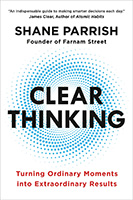 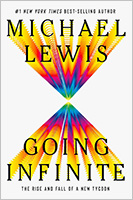 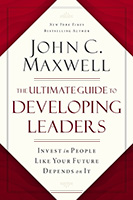 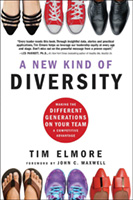
“... a mind needs books as a sword needs a whetstone, if it is to keep its edge.” — George R.R. Martin, A Game of Thrones
Posted by Michael McKinney at 11:50 AM
09.22.23

10 Books to Get You Back to Work – Fall 2023
THE FALL EQUINOX arrives on September 23. Time to turn the page. Temperatures begin to drop. The days get shorter. And as plant life slows down and the leaves change color, we should make the time to reflect and take stock of where we are and where we need to go. A good book helps us to do just that. Here are ten books to help you get back into the world of work and make plans for an improved future:
When our trust is broken, and when our own trustworthiness is called into question, many of us are left wondering what to do. We barely know how trust works. How could we possibly repair it? In How Trust Works, Dr. Kim draws on this research and the work of other social scientists to reveal the surprising truths about how relationships are built, how they are broken, and how they are repaired. Dr. Kim’s work shows how we are often more trusting than we think and how easily our trust in others can be distorted.
How do we decide how we decide? We make such decisions all the time. If you trust your doctor, you might decide to follow a simple rule for medical decisions: Do whatever your doctor suggests. If you like someone a lot, and maybe love them, but are not sure whether you want to marry them, you might do this: Live with them first. Some of these strategies are wise. They prevent error. They improve your emotional well-being. Some of these strategies are foolish. They lead you in the direction of terrible mistakes. They prevent you from learning. They might make you miserable. Decisions about Decisions explores how people do, and should, make decisions about decisions.
We used to think of failure as the opposite of success. Now, we’re often torn between two “failure cultures”: one that says to avoid failure at all costs, the other that says fail fast, fail often. The trouble is that both approaches lack the crucial distinctions to help us separate good failure from bad. As a result, we miss the opportunity to fail well. With vivid, real-life stories from business, pop culture, history, and more, Edmondson gives us specifically tailored practices, skills, and mindsets to help us replace shame and blame with curiosity, vulnerability, and personal growth. You’ll never look at failure the same way again.
From the author of Steve Jobs and other bestselling biographies, this is the astonishingly intimate story of the most fascinating and controversial innovator of our era—a rule-breaking visionary who helped to lead the world into the era of electric vehicles, private space exploration, and artificial intelligence. For two years, Isaacson shadowed Musk, attended his meetings, walked his factories with him, and spent hours interviewing him, his family, friends, coworkers, and adversaries. The result is the revealing inside story, filled with amazing tales of triumphs and turmoil, that addresses the question: are the demons that drive Musk also what it takes to drive innovation and progress?
The most effective leaders are “human leaders:” leading with empathy, vulnerability, and authenticity. But many still adhere to the outdated myth that leaders must be “superhero leaders: infallible, unflappable, and fearless." Tragically, their innate ability to inspire remains locked within, blunting their impact. In The Unlocked Leader veteran executive leadership coach Hortense le Gentil explains how superhero leaders can become effective human leaders.
We live in a world that’s obsessed with talent. We celebrate gifted students in school, natural athletes in sports, and child prodigies in music. But admiring people who start out with innate advantages leads us to overlook the distance we ourselves can travel. We underestimate the range of skills that we can learn and how good we can become. We can all improve at improving. And when opportunity doesn’t knock, there are ways to build a door. Hidden Potential offers a new framework for raising aspirations and exceeding expectations.
Speed has gotten a bad name in business, much of it deserved. When Facebook made "Move fast and break things" an informal company motto, it fueled a widely held belief that we can either make progress or take care of people, one or the other. That a certain amount of wreckage is the price we have to pay for inventing the future. Leadership experts Frances Frei and Anne Morriss argue that this belief is deeply flawed—and that it keeps you from building a great company. Helping executives and entrepreneurs solve their toughest problems over the past decade, Frei and Morriss learned that the trade-off between speed and excellence is false. The best leaders solve hard problems with fierce urgency while making their organizations—employees, customers, and shareholders—even stronger. They move fast and fix things.
Throughout his thirty years of work as a mindset expert and leadership coach, Erwin Raphael McManus has been obsessed with these questions: Why do some people succeed despite having all the odds stacked against them? How do others achieve the unthinkable, only to watch their lives slip away? Are there mental structures for failure and success? McManus has come to realize that too many of us have “near-life” experiences. We almost pursue our dreams. We almost make the decision that changes everything. We are always one choice away. In Mind Shift, McManus brings together twelve mental frameworks that have helped some of the most accomplished people on earth create internal structures of success.
Every investment plan under the sun is, at best, an informed speculation of what may happen in the future, based on a systematic extrapolation from the known past. Same as Ever reverses the process, inviting us to identify the many things that never, ever change. With his usual elan, Morgan Housel shows how we can use our newfound grasp of the unchanging to see around corners, not by squinting harder through the uncertain landscape of the future, but by looking backwards, being more broad-sighted, and focusing instead on what is permanently true. By doing so, we may better anticipate the big stuff, and achieve the greatest success, not merely financial comforts, but most importantly, a life well lived.
The logical, inspirational, and simplified approach you need to lead through unprecedented chaos―and help your teams and organizations thrive. Lead Through Anything provides simple, tested and actionable strategies to help you continually level-up your impact as an individual, manager, and leader. It walks you through the process of developing a leadership mentality that balances three key elements to achieve sustainable success. And be sure to include some fiction in your reading. Neurologist Richard Restak suggests for memory’s sake, we should be reading more fiction. He has observed over decades of treating patients for memory loss, that fiction requires active engagement with the text, starting at the beginning and working through to the end unlike non-fiction which you can read in chunks. Fiction requires extended attention and the ability to remember what happened at every stage of the story.
Posted by Michael McKinney at 06:55 AM
09.01.23

First Look: Leadership Books for September 2023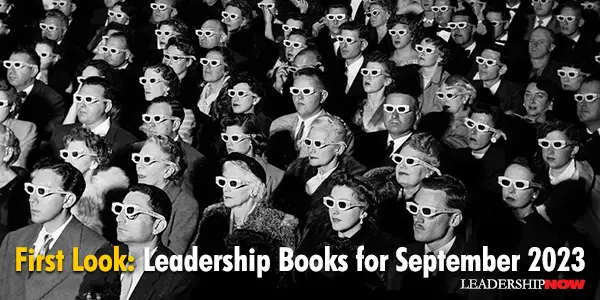
HERE'S A LOOK at some of the best leadership books to be released in September 2023 curated just for you. Be sure to check out the other great titles being offered this month.
We used to think of failure as the opposite of success. Now, we’re often torn between two “failure cultures”: one that says to avoid failure at all costs, the other that says fail fast, fail often. The trouble is that both approaches lack the crucial distinctions to help us separate good failure from bad. As a result, we miss the opportunity to fail well. After decades of award-winning research, Amy Edmondson is here to upend our understanding of failure and make it work for us. In Right Kind of Wrong, Edmondson provides the framework to think, discuss, and practice failure wisely. Outlining the three archetypes of failure—basic, complex, and intelligent—Amy showcases how to minimize unproductive failure while maximizing what we gain from flubs of all stripes. She illustrates how we and our organizations can embrace our human fallibility, learn exactly when failure is our friend, and prevent most of it when it is not. This is the key to pursuing smart risks and preventing avoidable harm.
From social disruptions like economic recessions, pandemics, and new technologies to individual disruptions like getting married, career transitions, and becoming a parent, we undergo change and transformation—both good and bad—regularly. Change is not the exception, it’s the rule. Yet we endlessly fight it, often viewing it as a threat to our stability and sense of self. Master of Change flips this script on its head and offers a path for embracing and even growing from life’s constant instability. Brad Stulberg, sustainable excellence expert, coach, and bestselling author of The Practice of Groundedness, offers a new model that describes change as an ongoing cycle of order, disorder, and reorder—yes, we return to stability, but that stability is somewhere new. Drawing on modern science, ancient wisdom, and daily practice, Stulberg offers concrete principles for developing a mindset called rugged flexibility, along with habits and practices to implement it.
Discover how leaders from the world’s most successful companies are dealing with stress, pressure, and constant change—and still thriving. Backed by psychological research and brain science, Fast Forward’s 5 Power Principles have helped more than 100,000 professionals achieve extraordinary success and happiness. As they have excelled, so have their businesses and teams. For the first time, authors Wendy Leshgold and Lisa McCarthy share their proven system along with compelling stories from the people who have made their boldest ambitions a reality. Fast Forward will help you and your teams create the life you want this year and every year.
From the author of Steve Jobs and other bestselling biographies, this is the astonishingly intimate story of the most fascinating and controversial innovator of our era—a rule-breaking visionary who helped to lead the world into the era of electric vehicles, private space exploration, and artificial intelligence. Oh, and took over Twitter. For two years, Isaacson shadowed Musk, attended his meetings, walked his factories with him, and spent hours interviewing him, his family, friends, coworkers, and adversaries. The result is the revealing inside story, filled with amazing tales of triumphs and turmoil, that addresses the question: are the demons that drive Musk also what it takes to drive innovation and progress?
The most effective leaders are “human leaders:” leading with empathy, vulnerability, and authenticity. But many still adhere to the outdated myth that leaders must be “superhero leaders: infallible, unflappable, and fearless." Tragically, their innate ability to inspire remains locked within, blunting their impact. In The Unlocked Leader veteran executive leadership coach Hortense le Gentil combines real life stories, rigorous research, and practical tools to explain how superhero leaders can become effective human leaders. You’ll discover: How to identify the mental obstacles that stand between you and leadership authenticity, and sap your energy and impact - your mindtraps. How to confront your fears and escape those traps by operating a mindshift. Practical strategies to better connect with yourself and others - a mindbuild.
Leaders have an unprecedented opportunity to overcome the great disconnect between employers and employees by inviting individuals to become part of something bigger than themselves—to belong. The need to belong is innate and enduring, yet often elusive. Genuine belonging requires a bold approach, one that offers both depth and credibility to the work required from leaders whose organizations are craving a sense of connection, security, and acceptance. Belonging Rules offers nuanced, direct guidance for navigating both the pre-existing and ever-evolving social and organizational demands of today’s workplace. The five rules within, based on extensive research and application, create a framework to dissect and decode the complex, complicated, and controversial issues of the modern workforce.
 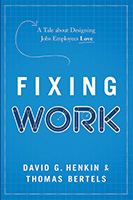 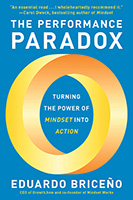 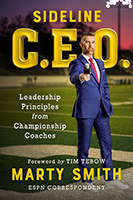
“... a mind needs books as a sword needs a whetstone, if it is to keep its edge.” — George R.R. Martin, A Game of Thrones
Posted by Michael McKinney at 07:10 AM
08.01.23

First Look: Leadership Books for August 2023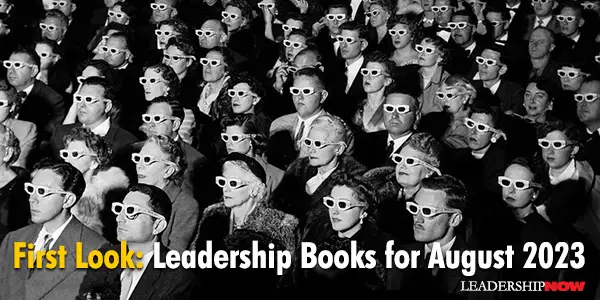
HERE'S A LOOK at some of the best leadership books to be released in August 2023 curated just for you. Be sure to check out the other great titles being offered this month.
Data indicates that most strategic efforts to change a company’s culture fail. So how do companies succeed in this endeavor? A top strategy professor and two highly successful CEOs found that, in companies that had successfully changed their culture, leaders had taken dramatic actions that embodied the new cultural values. These actions inspired stories that became company legends, repeated in every department and handed on to new employees. Through compiling and analyzing 150 stories from business leaders who have achieved change, they identified 6 attributes that every successful culture change story has in common
Greg Harden changes lives. This is why hundreds of world-class athletes, doctors, lawyers, teachers, business leaders, college students, and professionals from all walks of life have come to him for advice and direction--including 7-time Super Bowl Champion Tom Brady, 23-time Olympic Gold Medalist Michael Phelps, Heisman Trophy winners Desmond Howard and Charles Woodson, CEOs of major companies, and championship coaching staffs from all over the world. Harden teaches his students how to practice, train, and rehearse to give 100 percent, 100 percent of the time, and challenges them by asking: If you don't believe in yourself, why should I believe in you? Champions aren't born. They're built. Greg Harden spent over 30 years building them at the University of Michigan and gained national recognition when 60 Minutes Sports profiled him as "Michigan's Secret Weapon."
When our trust is broken, and when our own trustworthiness is called into question, many of us are left wondering what to do. We barely know how trust works. How could we possibly repair it? Peter H. Kim, the world’s leading expert in the rapidly growing field of trust repair, has conducted over two decades of groundbreaking research to answer that question. In How Trust Works, he draws on this research and the work of other social scientists to reveal the surprising truths about how relationships are built, how they are broken, and how they are repaired. He shows how we are often more trusting than we think and how easily our trust in others can be distorted. He illustrates these insights with accounts of some of the most striking and well-known trust violations that have occurred in modern times and unveils the crucial secrets behind when and why our attempts to repair trust are effective, and which breaches of confidence are just too deep.
Here is one of the most fundamental questions in human life: How do we decide how we decide? We make such decisions all the time. If you trust your doctor, you might decide to follow a simple rule for medical decisions: Do whatever your doctor suggests. If you like someone a lot, and maybe love them, but are not sure whether you want to marry them, you might do this: Live with them first. Some of these strategies are wise. They prevent error. They improve your emotional well-being. Some of these strategies are foolish. They lead you in the direction of terrible mistakes. They prevent you from learning. They might make you miserable. Decisions about Decisions explores how people do, and should, make decisions about decisions. It aims to see what such decisions are, to explore how they go right, and see where they go wrong.
Steven Bartlett has never been one to follow conventional rules. He’s achieved extraordinary success and emerged as one of the greatest marketing minds of our time by doing things differently. But there is a method to his maverick style. Between founding and running a global digital marketing agency, investing in over forty companies, creating a hit podcast, and launching a venture fund for minority businesses, Bartlett has learned valuable lessons about success and failure, discovering a set of principles that he uses to guide him on his journey from strength to strength. In The Diary of a CEO, he presents these thirty-three fundamental laws that will ensure excellence and help you take real steps toward achieving your most daring goals.
Maximize your leadership impact with the latest insights and research from the field of adaptive leadership. In The End of Leadership as We Know It, a team of veteran executive and leadership strategists delivers an expert analysis of the ten most common errors leaders make when attempting to address disruption and concrete strategies for avoiding them. In the book, you’ll find ways to apply the latest research in adaptive leadership and complexity to your own leadership style and achieve the impact you seek to have on your business, your followers, and yourself. The authors explain how to rethink the essence of leadership during times of flux and show you how to deal with unpredictable situations.
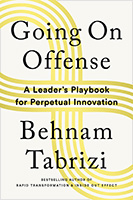 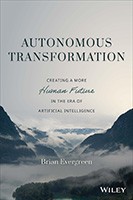 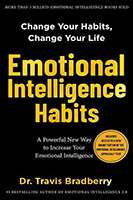 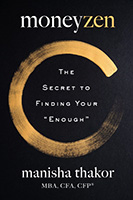
“... a mind needs books as a sword needs a whetstone, if it is to keep its edge.” — George R.R. Martin, A Game of Thrones
Posted by Michael McKinney at 05:42 AM
07.01.23

First Look: Leadership Books for July 2023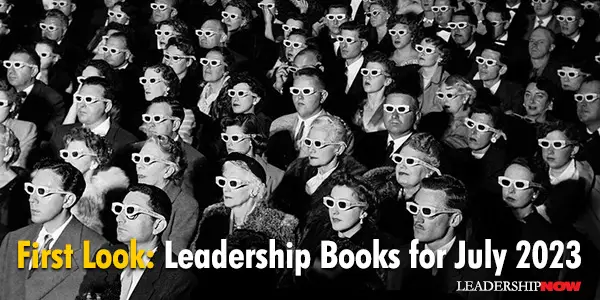
HERE'S A LOOK at some of the best leadership books to be released in July 2023 curated just for you. Be sure to check out the other great titles being offered this month.
The chasm separating managers from leaders is widening as the skills required to be an effective leader grow in number and complexity. But you're ambitious. You want to cross that chasm. And your organization needs you to cross it in order to join its bench of stars who will lead with empathy and humanity and ground the organization's strategies in a meaningful, mission-driven, and purposeful way. The Leap to Leader is your trusted playbook for making the biggest jump of your career. You'll learn from more than a hundred successful leaders who share their powerful insights and compelling stories of how to make the leap, along with practical strategies and tactics for building a loyal following, moving up quickly to broaden your impact, and making the subtle but crucial mindset shifts that are required to lead others effectively.
Leaders don't have to choose between relationships and results! Sadly, compassion and accountability are too often in tension —leaders feel they have to pick one or the other. But solely prioritizing accountability can create toxic work environments that drive away good talent. On the other end of the spectrum, being too nice can compromise performance and productivity. Finding harmony between compassion and accountability is the ultimate catalyst for improved results and a thriving workplace. The solution is recognizing that compassion and accountability are not opposites. In fact, accountability is an element of compassion. Compassionate Accountability is the process of building connection while getting results.
In Leading Through Disruption, Andrew Liveris provides a new leadership paradigm for resilience and agility in a rapidly changing world. This book is a must-read guide for leaders in various sectors who are keen on not only ensuring current success, but protecting the planet’s future for everyone. Liveris, who was recently chosen to lead the Brisbane 2032 Olympic Organizing Committee and is former Chairman and CEO of The Dow Chemical Company, presents a variety of powerful tools that will enable you to tackle any problem quickly and responsively, with an eye to creating a more equitable, sustainable future.
If you're thinking of cutting your midlevel managers in the new world of work, think again. "Middle manager." The term evokes a bygone industrial era in which managers functioned like cogs in a vast bureaucratic machine. In recent decades, midlevel managers became a favorite target for the chopping block—underappreciated, often considered a superfluous layer of the organization. Not only does this outdated perspective need to change, but the future demands it. In Power to the Middle, McKinsey thought leaders Bill Schaninger, Bryan Hancock, and Emily Field call for a profound reimagining of managers and their roles. They explain how middle managers are uniquely positioned close to the ground but with a crucial connection to company strategy, enabling them to guide their organizations through periods of rapid and complex change, as well as to help shape the new world of work.
James Burstall runs one of the most successful TV production companies in the UK. But during his tenure at Argonon he has had to deal with a variety of existential crises. Through them all, he's managed to guide his team out the other side successfully. Whether it's been the credit crunch or terror attacks. Recessions. Natural disasters. Pandemics. The TV industry has felt the strain of these recurring events like all of us. And each time, James has put strategies in place in order to be prepared for the next time something like this happens: because it will happen again. In 16 concise lessons, hard won from real-world experience, this book uses practical examples to demonstrate how we can turn disasters into opportunities. Though painful, shock events can actually be good for us. It is possible to turn venom into rocket fuel! We can survive crises and thrive.
Here is one of the most fundamental questions in human life: How do we decide how we decide? We make such decisions all the time. If you trust your doctor, you might decide to follow a simple rule for medical decisions: Do whatever your doctor suggests. If you like someone a lot, and maybe love them, but are not sure whether you want to marry them, you might do this: Live with them first. Some of these strategies are wise. They prevent error. They improve your emotional well-being. Some of these strategies are foolish. They lead you in the direction of terrible mistakes. They prevent you from learning. They might make you miserable. Decisions about Decisions explores how people do, and should, make decisions about decisions. It aims to see what such decisions are, to explore how they go right, and see where they go wrong.
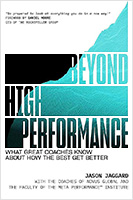 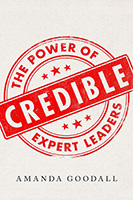 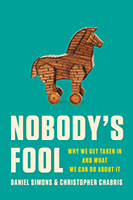 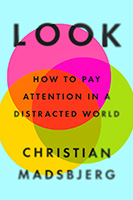
“... a mind needs books as a sword needs a whetstone, if it is to keep its edge.” — George R.R. Martin, A Game of Thrones
Posted by Michael McKinney at 06:16 AM
06.16.23

10 Books You Should Read This Summer 2023
CARY GRANT enjoyed reading—often in the evenings with a scotch. He was inclined to read biographies, current affairs, and self-help books. As a parent dedicated to learning, he especially loved reading to his daughter Jennifer. She remembers, “I can still feel the perfect ease of our Hampton summer days, swimming, boating, tennis, reading, and backgammon by the pool with burgers. Divine.” He told his daughter, “One must always be careful with books and treasure them.” The summer is a perfect time to relax and read, taking time to reflect. Also, as Wally Bock suggests, take the time to pick up something you’ve always wanted to read, something fun to read, and perhaps re-read a book that will help you to reconnect. Here are ten suggestions for books to inspire you and help to grow your leadership.
Music producer Rick Rubin has thought deeply about where creativity comes from and where it doesn’t, he has learned that being an artist isn’t about your specific output, it’s about your relationship to the world. Creativity has a place in everyone’s life, and everyone can make that place larger. In fact, there are few more important responsibilities.
In this fictional account of an entrepreneur's rollercoaster ride to the top, Cap Treeger crafts a series of dynamic, well-drawn lessons for anyone that wants to start or build a business.
Former IBM CEO Ginni Rometty her groundbreaking path from a challenging childhood to becoming the CEO of IBM and one of the world's most influential business leaders. With candor and depth, Rometty shares milestones from her life and career while redefining power as a way to drive meaningful change in positive ways for ourselves, our organizations, and for the many, not just the few—a concept she calls "good power."
From the preeminent presidential scholar and acclaimed biographer of historical figures including George Washington, Herbert Hoover, and Nelson Rockefeller comes this eye-opening life of Gerald R. Ford, whose presidency arguably set the course for post-liberal America and a post-Cold War world.
The Wisdom of the Bullfrog draws countless experiences from Admiral McRaven’s incredible life, including crisis situations, management debates, organizational transitions, and ethical dilemmas, to provide readers with the most important leadership lessons he has learned over the course of his forty years of service.
This book helps managers understand the postmodern worldview held by generation Z and younger millennials, how it influences their behaviour at work, and how they want to be led in the workplace.Karl Moore takes a practical and down-to-earth approach to understanding what drives millennials and generation Z and how the education system they were brought up in has informed their worldview.
From discovering how credibility stems from vulnerability, to why being honest about what you don’t yet know can empower others to feel more confident and capable of contributing, you will learn how to improve yourself while becoming a better leader.
The Leap to Leader is your trusted playbook for making the biggest jump of your career. You'll learn from more than a hundred successful leaders who share their powerful insights and compelling stories of how to make the leap, along with practical strategies and tactics for building a loyal following, moving up quickly to broaden your impact, and making the subtle but crucial mindset shifts that are required to lead others effectively.
In recent decades, midlevel managers became a favorite target for the chopping block—underappreciated, often considered a superfluous layer of the organization. Not only does this outdated perspective need to change, but the future demands it.
Stulberg offers a new model that describes change as an ongoing cycle of order, disorder, and reorder—yes, we return to stability, but that stability is somewhere new. He offers concrete principles for developing a mindset called rugged flexibility, along with habits and practices to implement it.
Posted by Michael McKinney at 09:53 AM
06.01.23

First Look: Leadership Books for June 2023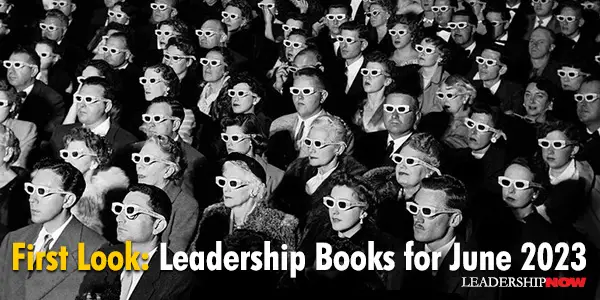
HERE'S A LOOK at some of the best leadership books to be released in June 2023 curated just for you. Be sure to check out the other great titles being offered this month.
Can a magnetic culture elevate you to unparalleled performance? Absolutely! And your journey to a magnetic culture starts by recognizing that good culture simply isn't enough to drive top performance. With uncertainty swirling around every corner in the world today, team members are reevaluating their workplaces and walking out as they look past hollow promises and perks that are a mere temporary bandage. People are searching for teams with purpose, a compelling vision, and a sense of belonging where they can pursue their full potential and live their lives to the fullest. In Leading with Significance, Joey Havens breaks through the limiting barriers of common culture theory and shows, with great transparency, the real human emotions that elevate a culture to one that is genuine, enduring, and magnetic.
In the war for customer acquisition, businesses invest millions of dollars to improve customer experience. They deliver packages faster, churn out new products, and endlessly revamp their UI, often putting greater strain on employees for diminishing returns. According to Tiffani Bova, this siloed focus on customer experience – without considering the impact on your staff – actually hinders growth in the long run. The most successful companies adopt an Experience Mindset that strengthens both employee experience (EX) and customer experience (CX) at the same time.
In Positive Chaos, Dan Thurmon helps you better understand the true nature of chaos, including the positive aspects that you can harness to learn, grow, and excel. Using illuminating findings from a first-of-its-kind study, 2022 State of Chaos in the Workplace, Thurmon reveals the current impact of chaos experienced by the workforce and shares effective strategies and leadership attributes for succeeding in chaotic times. From discovering how credibility stems from vulnerability, to why being honest about what you don’t yet know can empower others to feel more confident and capable of contributing, you will learn how to improve yourself while becoming a better leader. Chaos does not have to be confusing or debilitating. Positive Chaos will help you to learn to understand and embrace chaos, rise above the noise, and be truly proactive, helpful, and fulfilled.
When we choose to go to the gym at 6am, keep running that marathon, or stay up late to study, we are making conscious, value-based decisions that help us fulfill our goals. But even though we know that daily good choices add up to healthy routines and strong results, these days it’s just too easy to surrender to negative thoughts and old habits. How can we not? Enter Functional Imagery Training (FIT). Grounded in science, FIT helps us lengthen our Choice Point: that moment when we say to ourselves, “Am I going to make the healthy decision, or am I going to choose to take an action that I know will undermine my success?” Merging mindfulness, motivational interviewing, and cognitive behavioral therapy into a user-friendly model—the first non-academic book of its kind—The Choice Point grants us control of the decisions that define us.
In Rewired, the world’s most influential management consulting firm, McKinsey & Company, delivers a road-tested, how-to manual their own consultants use to help companies build the capabilities to outcompete in the age of digital and AI. Many companies are stuck with digital transformations that are not moving the needle. There are no quick fixes but there is a playbook. The answer is in rewiring your business so hundreds, thousands, of teams can harness technology to continuously create great customer experiences, lower unit costs, and generate value. It’s the capabilities of the organization that win the race.
Have you ever had the experience of working with someone and they just didn't “get” you? They do all the things that wind you up, put you off and drive you nuts. And have you ever worked with someone and you just didn't “get” them? You couldn't figure out what made them tick, and you know you were underwhelming as a manager and leader for them. Of course, you have. We all have. Why do those experiences keep happening? Particularly when we’ve also experienced the opposite: great working relationships that soar. In How To Work with (Almost) Anyone, Michael Bungay Stanier shares a tested process that sets up working relationships for the best possible success. It shows you how to communicate about who you are and what brings out the best and the worst in you. It gives you the tools to talk with your colleagues about how you operate, and to set a social contract for how you’ll work together (not just what you’ll be working on). It teaches you how to keep relationships strong and healthy, clear and clean.
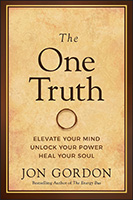 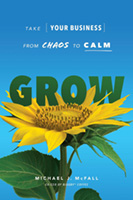 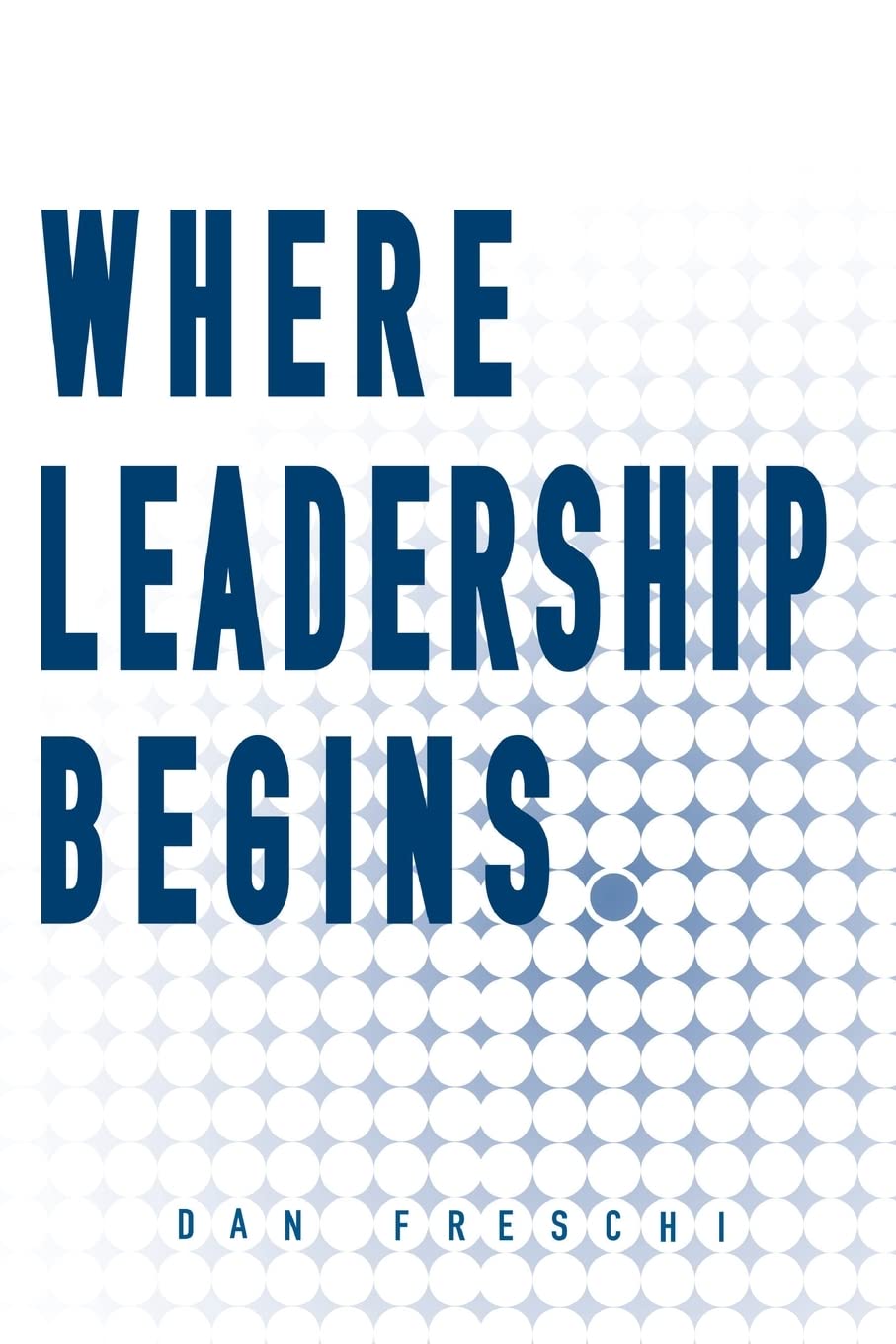 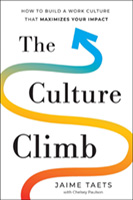
“... a mind needs books as a sword needs a whetstone, if it is to keep its edge.” — George R.R. Martin, A Game of Thrones
Posted by Michael McKinney at 06:48 AM
05.01.23

First Look: Leadership Books for May 2023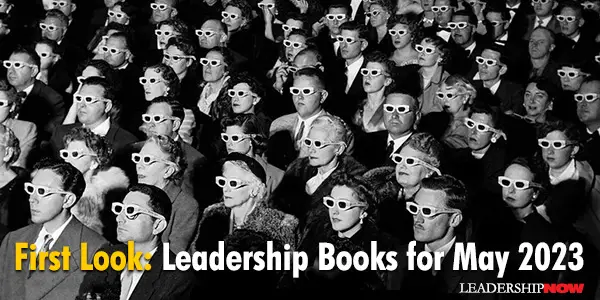
HERE'S A LOOK at some of the best leadership books to be released in May 2023 curated just for you. Be sure to check out the other great titles being offered this month.
Perhaps more than ever before, young people entering the workforce are searching for meaning and authenticity in their careers. This book helps managers understand the postmodern worldview held by generation Z and younger millennials, how it influences their behaviour at work, and how they want to be led in the workplace. Karl Moore takes a practical and down-to-earth approach to understanding what drives millennials and generation Z and how the education system they were brought up in has informed their worldview. Focusing on listening, purpose, reverse mentoring, feedback, and how people relate to each other in the workplace, Generation Why provides the essential tools for effectively working with millennials and generation Z and unlocking their full professional potential.
Blue Ocean Strategy forever changed how the world thinks about strategy. Now W. Chan Kim and Renée Mauborgne offer up a bold, new idea that will transform how we all think about innovation and growth. Disruption dominates innovation theory and practice. But disruption, for all its power, is destructive—displacing jobs, companies, and even entire industries. Are we missing an alternative approach to innovation and growth? In Blue Ocean Strategy, the authors, reveal another way to innovate and grow. Beyond Disruption redefines and expands the existing view of innovation by introducing a new approach, nondisruptive creation, that is free from the destructive displacement that happens when innovators set out to disrupt.
The COVID-19 pandemic caused an awakening that shocked the world — a structural change in how and where people work and live. One thing we now know for certain: Nothing is going back to normal. How organizations adapt to this culture shock will determine whether they thrive or even survive and whether U.S. and global productivity will go up or down. The immediate danger is that most employees will now operate more like independent contractors or gig workers than employees who are loyal and committed to your organization. The risk grows as your workforce’s mentality continues to shift from my life at work to my life at home. It may become nearly impossible to create a culture of committed team members and powerful relationships at work. How will you maintain your customers’ commitment when you’re struggling to create a culture of dedicated employees who build and strengthen relationships with those customers?
Dan Sullivan, the world's leading coach for highly successful entrepreneurs, wants you to know that achieving 10X growth is exponentially easier than striving for 2X growth. Most find this idea confusing at first because simply imagining 10X growth causes them to think they need to do 10X more work to achieve it. However, being a 10X entrepreneur is nothing like what most people think. 10X is not the outcome; it's a counterintuitive process you can apply every time you want exponential growth in your life and business. To make 10X possible, you must focus on expanding what Dan defines as your four most important freedoms—time, money, relationship, and purpose.
What if we could create the best job someone ever had? What if we had that job? The workplace has undergone a massive shift. Remote work and economic instability have depressed innovation and left us disconnected and disengaged. Paychecks no longer buy loyalty, happiness, and effort. Alarmed managers are responding with harsh top-down edicts, layoffs, surveillance and mandatory meetings. Workers are responding by quiet quitting and working their wage. There is a better answer, a human answer, and it is within everyone’s reach. Godin brings us a powerful vision of how we can change the course. The choice is simple: either we keep treating people as disposable, and join in the AI-fueled race to the bottom—or we come together to build a significant organization that enrolls, empowers, and trusts everyone to deliver their best work, no matter where they are.
Unprecedented numbers of Americans are quitting their jobs, rethinking their routines, breaking away from stifling expectations. We're still living through the Great Resignation and quiet quitting. The most suffocating iron cage of all is the premise that each of us must have a career. We must follow a linear path of success, locking into a dream early, always climbing higher, never stopping until we reach the top. Few ideas have created more misery, squandered more human potential, or ruined more relationships. Feiler resolved to help us all imagine better. After dismantling the three lies about work, Feiler lays out the one truth: that each of us must write our own story. Showing that the people who are happiest at work don’t climb, but dig, Feiler introduces the six questions to ask in a workquake that allow us to perform a meaning audit, tapping into our truest selves and our deepest hopes to create the meaning we crave and the success we deserve.
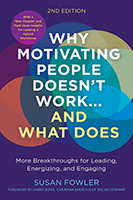 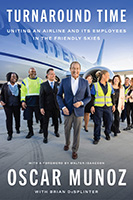 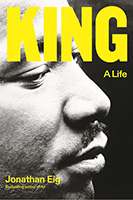 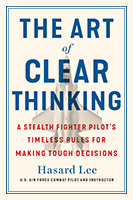 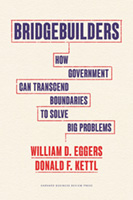 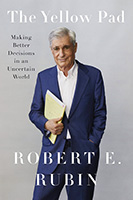 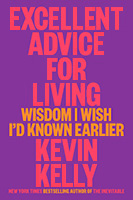 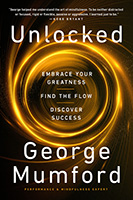
“... a mind needs books as a sword needs a whetstone, if it is to keep its edge.” — George R.R. Martin, A Game of Thrones
Posted by Michael McKinney at 07:12 AM
04.01.23

First Look: Leadership Books for April 2023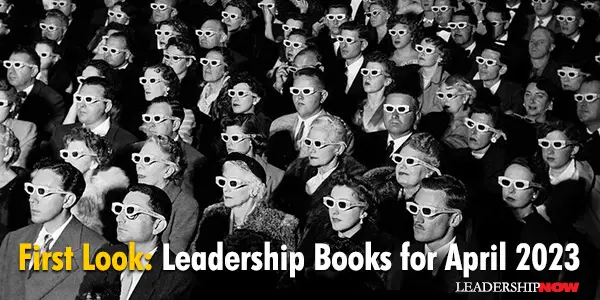
HERE'S A LOOK at some of the best leadership books to be released in April 2023 curated just for you. Be sure to check out the other great titles being offered this month.
The title “Bullfrog” is given to the Navy SEAL who has served the longest on active duty. Admiral McRaven was honored to receive this honor in 2011 when he took charge of the United States Special Operations Command. When McRaven retired in 2014, he had 37 years as a Navy SEAL under his belt, leading men and women at every level of the special operations community. During those four decades, Admiral McRaven dealt with every conceivable leadership challenge, from commanding combat operations—including the capture of Saddam Hussein, the rescue of Captain Phillips, and the raid for Osama bin Laden. THE WISDOM OF THE BULLFROG draws on these and countless other experiences from Admiral McRaven’s incredible life, including crisis situations, management debates, organizational transitions, and ethical dilemmas, to provide readers with the most important leadership lessons he has learned over the course of his forty years of service.
Grace Under Pressure: Leading Through Change and Crisis focuses on three things leaders need to do when change and adversity strike: take care of their people, take care of themselves, and prepare for the future. And they must do it all with a sense of grace—calmly, collectedly, and compassionately. He shares his expertise here, focusing on how leaders need to prepare for change by focusing on what matters most—their people. Among the themes Baldoni explores are fear and loss as well as empathy, resilience, and hope. This book also provides a roadmap for leaders seeking to create community as they meet the coming challenges with dignity and grace.
From the preeminent presidential scholar and acclaimed biographer of historical figures including George Washington, Herbert Hoover, and Nelson Rockefeller comes this eye-opening life of Gerald R. Ford, whose presidency arguably set the course for post-liberal America and a post-Cold War world. For many Americans, President Gerald Ford was the genial accident of history who controversially pardoned his Watergate-tarnished predecessor, presided over the fall of Saigon, and became a punching bag on Saturday Night Live. Yet as Richard Norton Smith reveals in a book full of surprises, Ford was an underrated leader whose tough decisions and personal decency look better with the passage of time.
Anxiety disorders are the most common mental illnesses in the world. But in our workplaces, anxiety has been a hidden problem—there in plain sight but ignored. Until now. The Anxious Achiever is a book with a mission: to normalize anxiety and leadership. As leadership expert and self-proclaimed anxious achiever Morra Aarons-Mele argues, anxiety is built into the very nature of leadership. It can—and should—be harnessed into a force for good. Inspired by the popular podcast of the same name, The Anxious Achiever is filled with personal stories, research-based insights into mental health, and lots of practical advice.
We say some people march to the beat of a different drummer. But implicit in this cliché is that the rest of us march to the same beat. We sleepwalk through life, find ourselves on well-worn paths that were never ours to walk, and become a silent extra in someone else’s story. Extraordinary people carve their own paths as leaders and creators. They think and act with genuine independence. They stand out from the crowd because they embody their own shape and color. We call these people geniuses—as if they’re another breed. But genius isn’t for a special few. It can be cultivated. This book will show you how. You’ll learn how to discard what no longer serves you and discover your first principles—the qualities that make up your genius. You’ll be equipped to escape your intellectual prisons and generate original insights from your own depths. You’ll discover how to look where others don’t look and see what others don’t see.
There's a force we encounter every day that we aren't aware of—and it threatens to derail otherwise promising careers and lives: microstress. This hidden epidemic of small moments of stress has insidiously infiltrated both our work and our personal lives with invisible but devastating effects. Microstress doesn't trigger the normal stress response in our brains to help us deal with it. Instead, it embeds itself in our minds and accumulates daily, one microstress on top of the other. Unregistered microstress weighs us down, damages our physical and emotional health, and contributes to a decline in our well-being. What's more, microstress is baked into our lives. The source is seldom a classic antagonist, such as a demanding client or a jerk boss. Instead, it comes from the people with whom we are closest: our friends, family, and colleagues. The good news is that once you understand microstress, you can fight back.
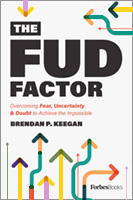 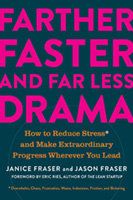 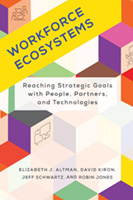 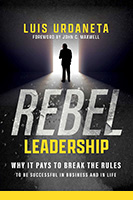
“... a mind needs books as a sword needs a whetstone, if it is to keep its edge.” — George R.R. Martin, A Game of Thrones
Posted by Michael McKinney at 07:40 AM
03.01.23

First Look: Leadership Books for March 2023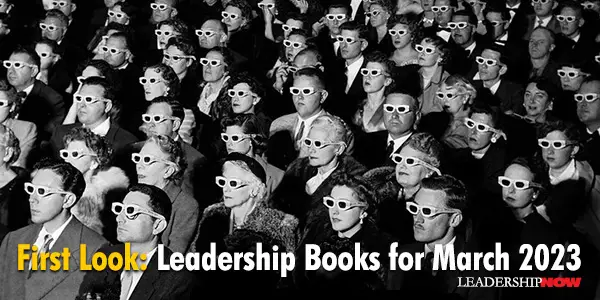
HERE'S A LOOK at some of the best leadership books to be released in March 2023 curated just for you. Be sure to check out the other great titles being offered this month.
We constantly encounter complex problems at home, in our places of work, and in society at large. Even if we had all the time and money in the world, sometimes no good solution can be found. So, what should we do, especially when we can’t wait? The answer: a workaround. The Four Workarounds shows how seemingly intractable problems―from public urination to the challenges of delivering lifesaving medicine to remote communities―were addressed using unconventional tactics. Some of the world’s biggest and most admired companies are already using Savaget’s research to transform the ways they do business. And these same lessons can also revolutionize the ways we approach the challenges we all encounter every day of our lives.
How can you overcome fear or ineffectiveness as a speaker? Learn the Laws of Communication! In The 16 Undeniable Laws of Communication, John C. Maxwell shares everything he’s learned from a lifetime of communication. Learn how to: Speak from conviction, Prepare your content and yourself for speaking, Find and use your personal and communication strengths, Focus on your audience and connect, Tell better stories, Read the room and create energy and anticipation, Add value to people, and Inspire people to take action
Culture Rules is a clarion call for leaders around the world. The pandemic has magnified the essential role that culture plays in an organization’s health, vitality, and sustainability—some passed the test with flying colors while others are seeing with fresh eyes, deeply rooted issues and challenges within their culture. Most important, this book is not just another compilation of case studies. Culture Rules makes the case for why leaders should invest their time and energy on building culture and gives them three simple, actionable rules they must play by if they want to stay in the game and win!
Former IBM CEO Ginni Rometty recounts in Good Power, her groundbreaking path from a challenging childhood to becoming the CEO of IBM and one of the world's most influential business leaders. With candor and depth, Rometty shares milestones from her life and career while redefining power as a way to drive meaningful change in positive ways for ourselves, our organizations, and for the many, not just the few—a concept she calls "good power." Rometty's "memoir with purpose" combines the experiences that defined her life—personal hurdles, high-stakes decisions, passionate advocacy—with the actionable advice of a coaching session to highlight lessons that shape authentic leadership. Behind-the-scenes stories and practical guidance offer us a blueprint for how we can all use good power to advance our careers, inspire our teams, improve our companies, and create healthier societies.
Incentives send powerful signals that aim to influence behavior. But often there is a conflict between what we say and what we do in response to these incentives. The result: mixed signals. Consider the CEO who urges teamwork but designs incentives for individual success, who invites innovation but punishes failure, who emphasizes quality but pays for quantity. Employing real-world scenarios just like this to illustrate this everyday phenomenon, behavioral economist Uri Gneezy explains why incentives often fail and demonstrates how the right incentives can change behavior by aligning with signals for better results.
Marketing professor at the Wharton School of the University of Pennsylvania, Jonah Berger’s cutting-edge research reveals how six types of words can increase your impact in every area of life: from persuading others and building stronger relationships, to boosting creativity and motivating teams. Almost everything we do involves words. Words are how we persuade, communicate, and connect. They’re how leaders lead, salespeople sell, and parents parent. They’re how teachers teach, policymakers govern, and doctors explain. Even our private thoughts rely on language. But certain words are more impactful than others. They’re better at changing minds, engaging audiences, and driving action. What are these magic words, and how can we take advantage of their power?
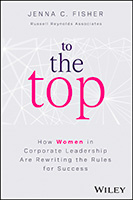 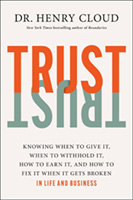 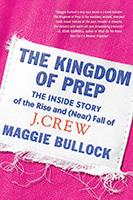 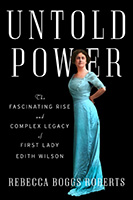
“A library is not a luxury but one of the necessities of life.” — Henry Ward Beecher
Posted by Michael McKinney at 07:33 AM
02.01.23

First Look: Leadership Books for February 2023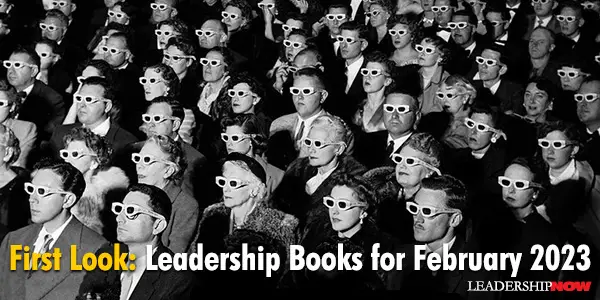
HERE'S A LOOK at some of the best leadership books to be released in February 2023 curated just for you. Be sure to check out the other great titles being offered this month.
Former NFL Pro, world-renowned keynote speaker, and management consultant Matt Mayberry delivers an incisive and hands-on blueprint to employee engagement and peak productivity. In the book, you'll explore how leaders, at every level, can build a workplace culture that drives organizational excellence and unleashes the full potential of every employee. You’ll also learn: how to build a culture where people can become the best version of themselves and transform organizational performance, five common roadblocks that prevent leaders from using culture to get the best from their people and how to overcome them, and how to implement your playbook for cultural excellence across your entire organization.
With over two decades’ experience both observing and interpreting how people channel disaster into opportunity in the most extreme circumstances and environments on Earth, Ben Ramalingam has a unique vantage point from which to identify the key principles that can enable anyone to use stress as an opportunity for change. In Upshift, Ramalingam distils this expertise into an insightful, powerful, and engaging book that will show you how to reframe your set responses to stress and pressure and instead use them to harness the potential they hold not just for improving your work, your relationships, and your mindset, but for transforming them.
“There just aren’t enough hours in the day to get everything done!” Sound familiar? Forget the old concepts of time management and the hustle culture of working until you burn out. You and your entire team can get more done, in far fewer hours, with the right blueprint. Come Up for Air is that blueprint. Through years of building a leading efficiency consulting business, Nick Sonnenberg has discovered the primary reason why so many teams are overwhelmed. It’s not because they don’t have enough time, managers expect too much of their employees, or there aren’t enough people. The problem is that everyone is drowning in unnecessary work and inefficiencies that prevent them from focusing on the work that drives results. In Come Up for Air, you’ll discover the CPR® Business Efficiency Framework, a proven system for leaders, managers, and teams to maximize their performance and reduce overwhelm by using the right tools in the right way, at the right time.
Executive fellow at Harvard Business School, Guest Shark on Shark Tank, and famed angel investor Matt Higgins reveals the counterintuitive formula for a life of perpetual growth that has been practiced for thousands of years by military leaders and serial entrepreneurs alike—forget the Plan B and burn the boats. From Sun Tzu to Julius Caesar, the ancient Israelites to Ukrainian President Volodymyr Zelensky, there’s a bold and highly effective tactic seen throughout history—when leaders want to motivate their troops for success, they destroy all opportunities for retreat, and go all-in on the mission. They burn their boats; it’s win or perish, and the clarity of sheer desperation propels them to victory.
The best leaders, in the biggest moments, know how to read the situation, respond in the most effective way possible, and move forward. You can, too. Leadership coaching legends David Noble and Carol Kauffman show you how with their innovative new framework—MOVE—which equips you with the tactics you need to slow down high-stakes situations before they speed you up. You'll learn to master the moment, generate response options, and quickly evaluate those options before acting. As you get better and better at using the framework, you'll find you can recognize these moments as they arrive, like a great athlete who can read the field as a play unfolds or a great conductor who anticipates what's needed to deliver a great performance..
Intrinsic motivation―doing a thing for its inherent satisfaction rather than external rewards―is the key to success and satisfaction in any endeavor. A legendary performance coach shares his simple, proven, and fun methods for cultivating and keeping it. As more of us work remotely and the frequency of our in-person contact decreases, this desire for connection and trust has only become more important; the social drive is so strong that our body temperature drops when we feel excluded. To satisfy our psychological needs in today’s professional world, we must pursue them consciously and purposefully―but unfortunately, most of us don't know how to do so effectively. Instead, we waste our time on ineffective coping strategies that often make us feel even worse. The true solution to becoming happier, healthier, and more productive is to become intrinsically motivated.
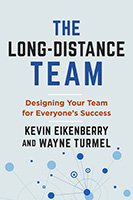 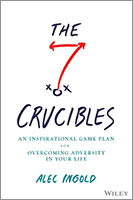 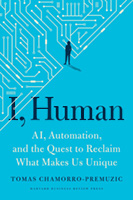 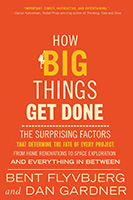
“A library is not a luxury but one of the necessities of life.” — Henry Ward Beecher
Posted by Michael McKinney at 06:53 AM
01.01.23

First Look: Leadership Books for January 2023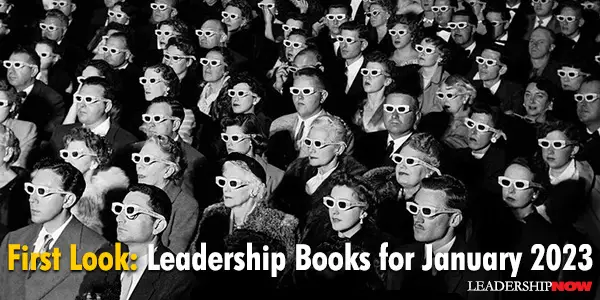
HERE'S A LOOK at some of the best leadership books to be released in January 2023 curated just for you. Be sure to check out the other great titles being offered this month.
Leadership is engaging others to solve daunting challenges. Those challenges appear in our professional lives, in our communities, our families―and they seem unsolvable, beyond our ability to see what needs to be done or outside our capacity to make the changes needed. They are not. Because, leadership is an activity―small actions taken in moments of opportunity. And as you start to look around, you can begin to see more of those moments, seize the opportunity in those moments. Most importantly, you can help others see those opportunities too.
When was the last time you pushed yourself beyond your comfort zone and dared to fail? In Disruptable, Allan Young shows you how embracing your different, getting outside your comfort zone, observing the impossible, daring to fail, and taking purposeful action will set you on a path of intentional personal disruption that will change your world forever. If you are ready to face your fears and embrace your failures, you can also enjoy the freedom of limitless growth.
A tale of mentorship, hard truths, and the path to success. In this fictional account of an entrepreneur's rollercoaster ride to the top, Cap Treeger crafts a series of dynamic, well-drawn lessons for anyone that wants to start or build a business. The hero of the story, Ren, is fired up with ambition and has a strategic dream in place to build his own startup from the ground up, but he has a lot to learn about how this particular sector of the business world works. Ren's journey guides readers through numerous factors necessary for success, including building a solid team with strategic placement of individuals in carefully selected roles appropriate to their skill sets and crafting the all-important business model. Ren navigates the daunting process with grace and hands readers an account loaded with insight-rendering Finding the Way, told in a straightforward and reader-friendly manner, a valuable gem amidst business-building literature.
Essential reading for any executive, Into the Metaverse, will reshape how you think about the internet and its place for those who want to lead successful businesses, today and into the future. If the internet was first used to connect us to information, and then developed into a social media forum to connect people, then Web3, which connects people, places and things, will help enable the successor state to today's mobile internet - the Metaverse. It will bring together and merge our physical and digital lives, and - in the same way that social media upended our lives and our businesses - the Metaverse will shake things up even more. Into the Metaverse is the essential business guide to understanding the ground-breaking technologies that enable this monumental shift and the opportunities it presents from a business and societal perspective.
Why so much hoopla over a successful car wash? Roughly 80 percent of Rising Tide’s workforce consists of people with autism. While part of the success comes from their mission, that doesn’t explain the excellence that permeates every aspect of the business: service quality, customer experience, teamwork, management, and organizational design. The Power of Potential tells the inspiring, surprising reason why: The wash’s excellence isn’t in spite of their unusual workforce, but because of it. Thanks to their unconventional staff, the Rising Tide team was able to discover and correct common problems that typically fly under the radar in businesses. By spotting and correcting these hidden problems, any business, with any kind of workers, can achieve unexpected wins and leave average behind. The common problems include: You Hire Based on Interviews, You Think Great Talent Is the Secret to a Great Business, Your Managers Are “Good Enough,” and You Fire Your Worst Employees. To our surprise, solving the four problems changed who we were as a company. The result was four unexpected wins that added up to a culture of excellence—but leadership is needed to reinforce what matters.
Leading in a Non-Linear World leads readers through a groundbreaking set of science-based strategies to help them face rising demand, uncertainty and change posed by disruptive technologies and seismic shifts in globalisation. The book shows how our mindset, more than our knowledge and expertise, has the potential to be our greatest asset in facing the future. Jean Gomes reviews the latest brain research revealing that our mindset is the interplay of feeling, thinking, and seeing, and how we can build it to significantly increase our wellbeing and performance.
 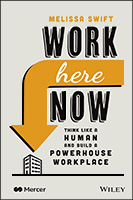 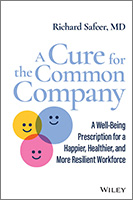 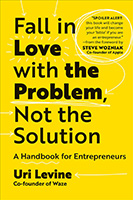
New Edition of Classic Leadership Book:
“A library is not a luxury but one of the necessities of life.” — Henry Ward Beecher
Posted by Michael McKinney at 08:11 AM
12.07.22

The Best Leadership Books of 2022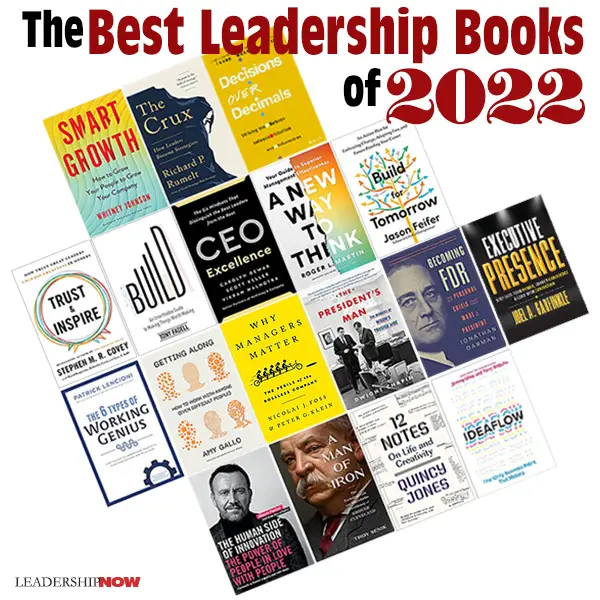
The titles listed below—published in 2022—reflect a need to get realigned with solid leadership practices and thinking.
(Harvard Business Review Press, 2022)
(PublicAffairs, 2022)
(Simon & Schuster, 2022)
(Harper Business, 2022)
(Scribner, 2022)
(Harvard Business Review Press, 2022)
(Harmony, 2022)
(Matt Holt, 2022)
(Harvard Business Review Press, 2022)
(PublicAffairs, 2022)
(Portfolio, 2022)
(Wiley, 2022)
(Berrett-Koehler Publishers, 2022)
(JAG Press, 2022)
BIOGRAPHY
(William Morrow, 2022)
(Random House, 2022)
(Simon & Schuster/Threshold Editions, 2022)
(Abrams Image, 2022)
Posted by Michael McKinney at 11:00 AM
12.01.22

First Look: Leadership Books for December 2022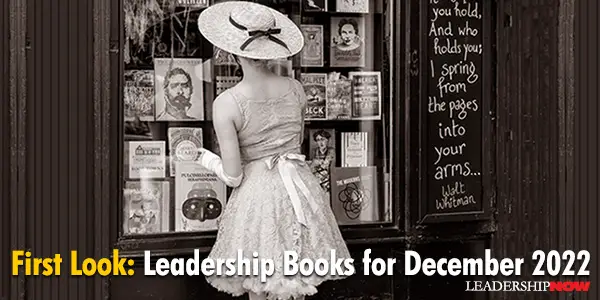
HERE'S A LOOK at some of the best leadership books to be released in December 2022 curated just for you. Be sure to check out the other great titles being offered this month.
When productivity expert Chris Bailey discovered that he had become stressed and burnt out because he was pushing himself too hard, he realized that before he could continue to give advice on productivity, he needed to learn how to rein things in and take a break. Productivity advice works—and we need it now more than ever—but it’s just as vital that we also develop our capacity for calm. By finding calm and overcoming anxiety, we don’t just feel more relaxed and at ease—we invest in the missing piece that leads our efforts to become sustainable over time. We build a deeper, more expansive reservoir of energy to draw from throughout the day, and have greater mental resources at our disposal to do good work and live a meaningful life.
Make It Count came about after a serious and unfortunate incident. Hunter was chasing his dreams, moving from serving in the US Marine Corps for six years, to working as a full-time Firefighter and EMT, to exploring entrepreneurship. He was contemplating his move from the fire department to live his passion of owning a business when it happened ― his friend and former partner at the fire department, Jordan, was killed in a tragic car crash. The incident struck Hunter deeply as he realized that Jordan, who had made such a mark on the lives of those who knew him, wasn't going to be around to do that anymore. His life had unexpectedly ended at the young age of 30, and he had run out of time — no more memories made with his wife and newborn daughter, no more time with his family and friends, no more chances to fulfill his dreams. So that's when Hunter decided to practice one of the dominating principles he teaches in his new book: help others realize the importance of making the most of the time they're given and building a legacy that will last.
Build a sustainable high-performance culture around the seven classical virtues. Virtue is more than a word: It’s a way for us all to live, a way to flourish as human beings. And when applied to organizational life, virtue serves to enhance engagement, strengthen teamwork, and foster success in business. Better Humans, Better Performance connects the classical virtues―Trust, Compassion, Courage, Justice, Temperance, Wisdom, and Hope
Whether you're a leader of ten, a hundred, or many more, there's no one more important to lead than yourself. If you're not leading yourself, why would anyone else want to follow you? Ryan Leak speaks to thousands of leaders every year, and he has learned that the most successful people have taken ownership of their own development—and in order to realize your potential, you need to fully understand yourself. Being a great leader is not about having all the answers but asking the right questions—and that starts with careful introspection and inviting others to tell you what they see in you. Leveling Up helps you focus on the person you're becoming and think about the goals you want to accomplish
Disruption for disruption's sake isn't a smart strategy when you're seeking ways to accelerate your career and become truly indispensable. In The Bold Ones, you'll discover it's more about being bold than disruptive: being simultaneously confident enough to challenge industries, yet practical enough to recreate them. Internationally celebrated disruption strategist Shawn Kanungo offers a playbook for individuals who know they need to become bolder to push their careers and companies forward―but don't know how to innovate: You'll learn where to start, what to do, and how to break through with your ideas. Distilling lessons learned from some of the world's most extraordinary disruptors, The Bold Ones presents eight unconventional pillars to success.
Every 15 minutes, each of us can make ten or more small decisions. Some of them are relatively inconsequential, while others can change the course of our lives. What if you could improve all of your decisions, across the board, and start to build a healthier, more productive, and meaningful life? In Wise Decisions: A Science-Based Approach to Making Better Choices, a team of accomplished industry experts delivers an evidence- and research-based blueprint for making the best decisions you can with the information you have. You’ll learn to make the targeted, repeated investment of energy required to turn your decision-making process into one informed by reason, emotion, intuition, and science.
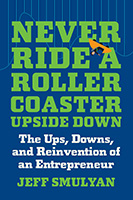 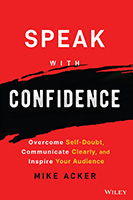 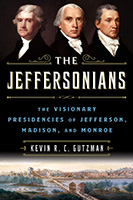 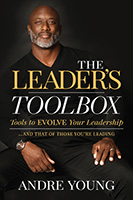
“A library is not a luxury but one of the necessities of life.” — Henry Ward Beecher
Posted by Michael McKinney at 10:48 AM
11.01.22

First Look: Leadership Books for November 2022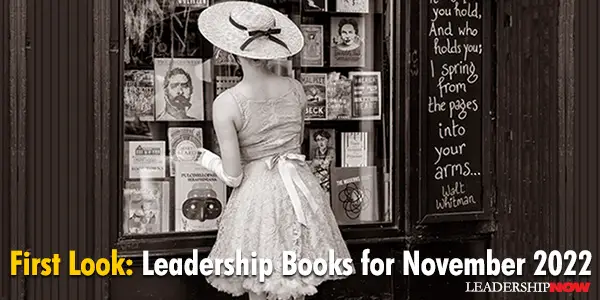
HERE'S A LOOK at some of the best leadership books to be released in November 2022 curated just for you. Be sure to check out the other great titles being offered this month.
If you took the economic might of Amazon, and added the penetration of Facebook, the ubiquity of Google, and the cultural significance of YouTube, you might have something starting to resemble Alibaba. Commonly mischaracterized as a kind of Chinese eBay for businesses, Alibaba and its interlinked network of products and services have exploded into global markets, disrupting conventional businesses and creating previously unimaginable opportunities for millions of small businesses worldwide. This book reveals the Tao of Alibaba—the company’s “secret sauce”—a consciously cultivated ethos and spirit that has enabled Alibaba to weather tough times and setbacks, and persist toward a common mission. It is a blueprint of the company’s management philosophy, crystalized into the most important elements that have driven its success, and it provides a road map for how to incorporate these principles into any organization’s operations.
Based on their research with thousands of executives from around the world, the authors share deep insights on how to implement smarter collaboration and avoid the potential pitfalls. They also help leaders troubleshoot thorny challenges like misaligned incentives, collaboration overload, and unintended consequences on diversity and inclusion. Complete with how-tos and cases, the book concludes with inspiring examples of groups harnessing smarter collaboration to tackle society's biggest challenges such as saving the oceans, eradicating diseases, and tackling global warming. Smarter Collaboration is the essential guide for forward-thinking leaders to transform their organizations, reshape the way they work, and increase impact and success.
In a masterful re-appraisal of a company that once claimed to “bring good things to life,” pre-eminent financial journalist William D. Cohan argues that the incredible story of GE’s rise and fall is not only a paragon, but also a prism through which we can better understand American capitalism. Beginning with its founding, innovations, and exponential growth through acquisitions and mergers, Cohan plumbs the depths of GE's storied management culture, its pioneering doctrine of shareholder value, and its seemingly hidden blind spots, to reveal that GE wasn't immune from the hubris and avoidable mistakes suffered by many other corporations. In Power Failure, Cohan punctures the myth of GE, exploring in a rich narrative how a once-great company wound up broken and in tatters—a cautionary tale for the ages.
Civility Rules! offers an opportunity to learn about the history, substance, and significance of civility through the lens of George Washington’s “Rules of Civility.” Drawing on personal experience, real-life examples, and a foundational belief that civility is integral to a democratic society, author Shelby Scarbrough shares how we might work toward a more perfect union by building a personal practice of civility. Civility is not an archaic concept of manners and politeness but rather a crucial component of a functioning democracy. Shelby shows us how―with conscientious practice and patience―we can each contribute to the preservation of our democracy, one interaction at a time.
This book will be your guide to avoiding the hazards of inflation while positioning your company to thrive when the business cycle stabilizes. It provides Ram’s down-to-earth recommendations and real-world examples to help you navigate a landscape that may be new to you. As you learn to lead through inflation, you will be better prepared for recession and stagflation as well. You will know how to protect your cash, your customers, and your capital investments. Your psychology will shift from anxiety and fear to optimism and excitement as you define the path to a reimagined future.
Burnout is among the most significant on-the-job hazards facing workers today. It is also among the most misunderstood. Citing a wealth of research data and drawing on illustrative anecdotes, The Burnout Challenge shows how organizations can change to promote sustainable productivity. Maslach and Leiter provide useful tools for identifying the signs of employee burnout, most often exhaustion, cynicism, and ineffectiveness. They also advise managers on assembling and interpreting worker self-evaluation surveys, which can reveal workplace problems and potential solutions. And when it comes to implementing change, Maslach and Leiter offer practical, evidence-driven guidance. The key, they argue, is to begin with less-taxing changes that employees nonetheless find meaningful, seeding the ground for more thorough reforms in the future.
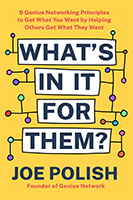 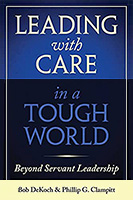 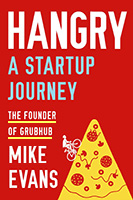 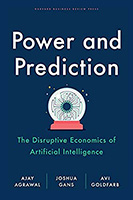
“A library is not a luxury but one of the necessities of life.” — Henry Ward Beecher
Posted by Michael McKinney at 07:08 AM
10.03.22

10 Books to Get You Back to Work – Fall 2022
SUMMER is over. It’s time to take stock of where you are and prepare now to improve your leadership. Books have the power to break the inertia in our lives—help us to shift gears—to see in a new way. These titles can help us to recalibrate the structures in our lives to defeat inertia and raise our standards. Here are ten books to help you get back to work ... better.
Posted by Michael McKinney at 06:44 AM
10.01.22

First Look: Leadership Books for October 2022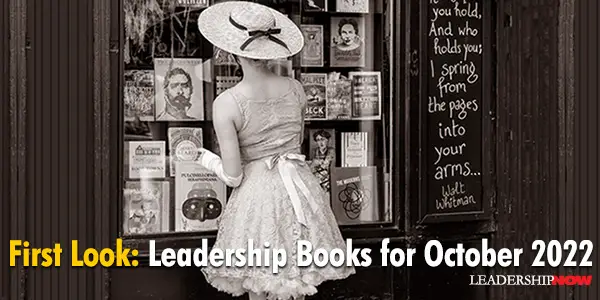
HERE'S A LOOK at some of the best leadership books to be released in October 2022 curated just for you. Be sure to check out the other great titles being offered this month.
Business leaders, with millions of dollars down the drain, struggle to abandon a new app or product that just isn’t working. Governments, caught in a hopeless conflict, believe that the next tactic will finally be the one that wins the war. And in our own lives, we persist in relationships or careers that no longer serve us. Why? According to Annie Duke, in the face of tough decisions, we’re terrible quitters. And that is significantly holding us back. In Quit, Duke teaches you how to get good at quitting. Drawing on stories from elite athletes like Mount Everest climbers, founders of leading companies like Stewart Butterfield, the CEO of Slack, and top entertainers like Dave Chappelle, Duke explains why quitting is integral to success, as well as strategies for determining when to hold em, and when to fold em, that will save you time, energy, and money.
It’s tempting to be seduced by futurist fantasies where every company has the culture of a startup, and where employees in wacky, whimsical office settings, liberated from hierarchies and bosses that oppress them, are the foundation for breakthrough performance. “Get real,” warn Nicolai J. Foss and Peter G. Klein. These fads ironically lead to micromanaging and, often, to disaster. Companies and societies, they show, need authority and hierarchy to coordinate work, including creative work. And, counterintuitively, they illustrate how the creative use of authority and hierarchy helps companies to be more agile and flexible, enabling educated, motivated people and teams to thrive. And not a moment too soon: they provide evidence that global challenges such as the proliferation of artificial intelligence, economic disruption, empowered knowledge workers, and black swan events such as the pandemic actually make hierarchy and the job of the manager more important than ever.
Agile decision making is imperative as you lead in a data-driven world. Amid streams of data and countless meetings, we make hasty decisions, slow decisions, and often no decisions. Uniquely bridging theory and practice, Decisions Over Decimals breaks this pattern by uniting data intelligence with human judgment to get to action – a sharp approach the authors refer to as Quantitative Intuition (QI). QI raises the power of thinking beyond big data without neglecting it and chasing the perfect decision while appreciating that such a thing can never really exist. Successful decision-makers square critical thinking with open-mindedness by blending information, intuition, and experience.
Yes, women faced massive social and institutional headwinds, and struggled with double standards and what psychologists call “pattern matching.” Yet those who thrived, Boorstin found, shared key commonalities that made them uniquely equipped to lead, grow businesses, and navigate crises. They were highly adaptive to change, deeply empathetic in their management style, and much more likely to integrate diverse points of view into their business strategies, filling voids that their male counterparts had overlooked for generations. By utilizing those strengths, they had invented new business models, disrupted industries, and made massive profits along the way. Featuring new interviews with Katrina Lake, Gwyneth Paltrow, Jenn Hyman, Whitney Wolfe Herd, Lena Waithe, Shivani Siroya, Julia Collins, and more, When Women Lead is a radical blueprint for the future of business, and our world at large.
In this leadership book, renowned industry analyst Josh Bersin introduces a new way to think about organizational design, employee engagement, and employee development. Distilled from decades of research and management theory into seven practical yet profound management principles, Bersin outlines how business leaders can create enduring companies that thrive with improved customer satisfaction, employee retention, and business agility. Leaders of irresistible companies understand that by unleashing the power of the human spirit, their companies can go faster and farther than their competitors by empowering people and creating employee-centric cultures. If you can make your company—large or small—irresistible, your employees will contribute, innovate, and grow more than you thought possible.
We all want great ideas, but few actually understand how they’re born. Innovation doesn’t come from a sprint or a hackathon--it’s a result of maximizing ideaflow. Jeremy Utley and Perry Klebahn of Stanford’s renowned Hasso Plattner Institute of Design (aka the “d.school”) offer a proven strategy for coming up with great ideas by yourself or with your team, and quickly determining which are worthy. Perhaps you have experienced low ideaflow. Have you been in that quiet conference room, with a half-filled whiteboard, and an unmet business target?. With the proven system in this book, entrepreneurs, managers, and leaders will learn how to tap into surprising and valuable ideas on demand and fill the creative pipeline with breakthrough ideas.
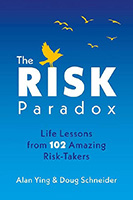  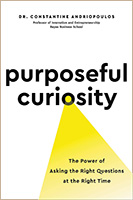 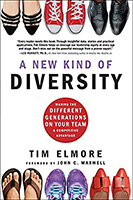
“A library is not a luxury but one of the necessities of life.” — Henry Ward Beecher
Posted by Michael McKinney at 05:56 AM
09.01.22

First Look: Leadership Books for September 2022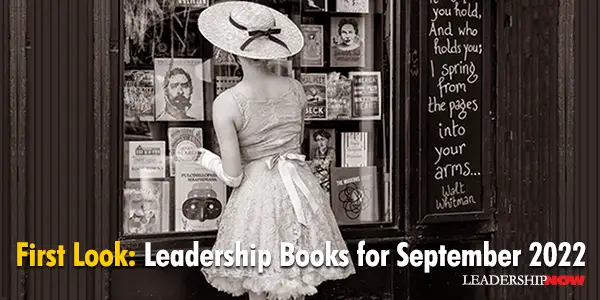
HERE'S A LOOK at some of the best leadership books to be released in September 2022. Be sure to check out the other great titles being offered this month.
The moments of greatest change can also be the moments of greatest opportunity. Adapt more quickly and use the power of change to your advantage with this guide from the editor in chief of Entrepreneur magazine and host of the Build for Tomorrow podcast. We experience change in four phases. The first is panic. Then we adapt. Then we find a new normal. And then, finally, we reach the phase we could not have imagined in the beginning, the moment when we realize that we wouldn’t go back. Build for Tomorrow is designed to accelerate that process—to help you lessen your panic, adapt faster, define the new normal, and thrive going forward. And it arrives as we all, in some way, have felt a shift in our lives. The pandemic forced a moment of collective change, and we are still being forced to make new plans and adjustments to our lives, families, and careers. Many of us will never go back, continuing to work from home, demanding higher wages, or starting new businesses.
The best leaders aren’t all found in one particular discipline, functional group, or silo. They’re found across the organizational and cultural spectrums, helping others realize their true potential through both ordinary and heroic acts of inspiration and encouragement. In The Unexpected Leader: Discovering the Leader Within You, Jacqueline M. Baker delivers an insightful and compelling exploration of how to define, refine, and elevate your leadership potential. You’ll absorb lessons from other real-life leaders and actualize the leader within you by learning to meet the demands of a rapidly changing workplace with a brand-new approach to leadership development. In the book, you’ll find examples of how stellar leadership can be found anywhere and everywhere—and in anyone—and discover new strategies for implementing the latest leadership techniques in a culturally and demographically diverse workforce.
Psychologist Woo-kyoung Ahn devised a course at Yale called “Thinking” to help students examine the biases that cause so many problems in their daily lives. It quickly became one of the university’s most popular courses. In Ahn’s class, students examine “thinking problems”―like confirmation bias, causal attribution, and delayed gratification―and how they contribute to our most pressing societal issues and inequities. Now, for the first time, Ahn presents key insights from her years of teaching and research in a book for everyone. Thinking 101 is a book that goes far beyond other books on thinking, showing how we can improve not just our own daily lives and tackle real-world problems through better awareness of our biases but also the lives of everyone around us. It is, quite simply, required reading for everyone who wants to think―and live―better.
Work relationships can be hard. The stress of dealing with difficult people dampens our creativity and productivity, degrades our ability to think clearly and make sound decisions, and causes us to disengage. We might lie awake at night worrying, withdraw from work, or react in ways we later regret—rolling our eyes in a meeting, snapping at colleagues, or staying silent when we should speak up. In Getting Along, workplace expert and Harvard Business Review podcast host Amy Gallo identifies eight familiar types of difficult coworkers—the insecure boss, the passive-aggressive peer, the know-it-all, the biased coworker, and others—and provides strategies tailored to dealing constructively with each one.
In an era of evidence-based inquiry, people need to be able to demonstrate the value of their projects credibly. But how do you do that when there isn’t an obvious measure connected to the project, like increased sales? In their new book Patti and Jack Phillips, the cofounders of ROI Institute, show how you can adopt the same methodology used by more than 6,000 organizations in seventy countries to evaluate large institutional initiatives. By following their six-step process, you can build a case for any project, process, or intervention, even so-called soft programs. The authors explain how to link your project to a meaningful business outcome, make sure your project will actually influence that outcome, identify metrics that will show if you’re making progress, collect and analyze data, and use the results to build support.
The 6 Types of Working Genius is the fastest way to help people identify the type of work that brings them joy and energy, and avoid work that leads to frustration and burnout. Beyond the personal discovery and instant relief that Working Genius provides, the model also gives teams a remarkably simple and practical framework for tapping into one another’s natural gifts. In classic Lencioni fashion, Pat brings his model to life in a page-turning fable that is as relatable as it is compelling. He tells the story of Bull Brooks, an entrepreneur, husband, and father who sets out to solve his own frustration at work and stumbles into a new way of thinking that changes the way he sees his work, his team, and even his marriage. In addition to this book, Lencioni and the Table Group have created a 10-minute assessment that helps individuals quickly identify their gifts and apply this model to themselves and their teams.
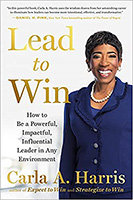 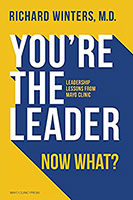 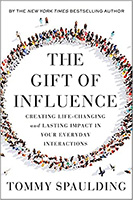 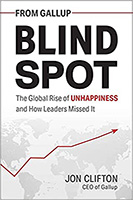
“A library is not a luxury but one of the necessities of life.” — Henry Ward Beecher
Posted by Michael McKinney at 03:01 PM
08.01.22

First Look: Leadership Books for August 2022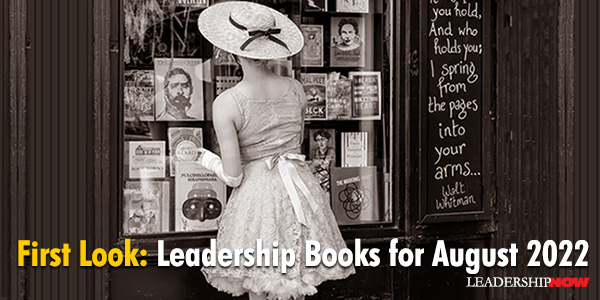
HERE'S A LOOK at some of the best leadership books to be released in August 2022. Be sure to check out the other great titles being offered this month.
Is there an alternative to the "system of systems" we live in: school, college (debt), job, different job, more different jobs, 401K/pension, retire (hopefully but probably not)? And if there is an alternative can it really work for everyone regardless of where they currently are in the system? Is there something else out there that works equally well for the 18-year-old deciding whether or not to go to college, the 45-year-old questioning his/her career path, the 65-year-old who is way short of being able to retire, and anyone else feeling dazed and confused in the modern world? In Unlock Your Potential, author and entrepreneur Jeff Lerner answers those questions with a resounding YES! He shows readers how the failings of our education, employment, and retirement systems have opened doors most people didn't even know exist. And, most important, he'll show YOU how to step through those doors—where they exist, how they work, what it takes to go through them, and what's on the other side.
Algorithms and apps analyze data and tell you how to beat the traffic, what books to buy, what music to listen to, and even who to date—often with great results. But what do you do when you face the big decisions of life—the "wild problems" of who to marry, whether to have children, where to move, how to forge a life well-lived—that can’t be solved by measurement or calculation? In Wild Problems, beloved host of EconTalk Russ Roberts offers puzzled rationalists a way to address these wild problems. He suggests spending less time and energy on the path that promises the most happiness, and more time on figuring out who you actually want to be. He draws on the experience of great artists, writers, and scientists of the past who found creative ways to navigate life’s biggest questions. And he lays out strategies for reducing the fear and the loss of control that inevitably come when a wild problem requires a leap in the dark.
Life is full of paradoxes. How can we each express our individuality while also being a team player? How do we balance work and life? How can we improve diversity while promoting opportunities for all? How can we manage the core business while innovating for the future? For many of us, these competing and interwoven demands are a source of conflict. Since our brains love to make either-or choices, we choose one option over the other. We deal with the uncertainty by asserting certainty. There's a better way. In Both/And Thinking, Wendy Smith and Marianne Lewis help readers cope with multiple, knotted tensions at the same time. Drawing from more than twenty years of pioneering research, they provide tools and lessons for transforming these tensions into opportunities for innovation and personal growth.
Professional women are subject to blind spots—obstacles that can minimize career potential, impact, or advancement. Some women end up drifting instead of driving through their careers, going it alone instead of building a posse, and leaving their “reputationality” (that special something we are known for) to chance. Authors and executive coaches Brenda Wensil and Kathryn Heath have spent decades coaching more than 800 women and working with women executives, middle managers, and professionals across industries and age groups. In this book, they outline six challenges women commonly face on their professional journeys and map a way to accelerate through them for higher-impact careers.
In True North: Emerging Leader Edition, renowned leadership expert Bill George and Millennial tech entrepreneur Zach Clayton issue the challenge to emerging leaders—from Gen X to Millennials and Gen Z—to lead their organizations authentically through never-ending crises to make this world a better place for everyone. The authors offer practical strategies and techniques to become an authentic leader and reveal how you can navigate your own path to success. They draw on extensive information from a diverse collection of inspirational real-life leaders and combine it with invaluable advice on everything from personal values to crisis leadership and self-awareness. The Emerging Leader Edition is filled with dramatic stories of how successful leaders such as Microsoft’s Satya Nadella and Merck’s Ken Frazier to PepsiCo’s Indra Nooyi and General Motors’ Mary Barra, and emerging leaders like OneTrust’s Kabir Barday and Rent the Runway’s Jenn Hyman, overcame great challenges to build highly successful organizations.
Unleash the power of storytelling to transform your talks, speeches, and presentations—whether your audience is a boardroom of executives, a classroom of students, or an auditorium full of eager listeners. Everyone, regardless of their background and training, can improve their storytelling abilities. But what is a story? How can you tell it in a way that delights and informs your listeners? Take a journey into the keys to great storytelling with two of the country’s top experts on story presentation and speech writing. In The Art of the Tale, expert storytellers Steven James and Tom Morrisey team up and tap into their lifetimes of experience to show you how to prepare stellar presentations, tell stories in your own unique way, adapt your material to different groups of listeners, and gain confidence in your ability as a speaker.
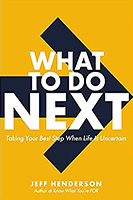 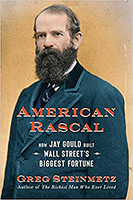  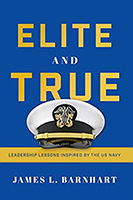
“To add a library to a house is to give that house a soul.” — Cicero
Posted by Michael McKinney at 07:07 AM
07.01.22

First Look: Leadership Books for July 2022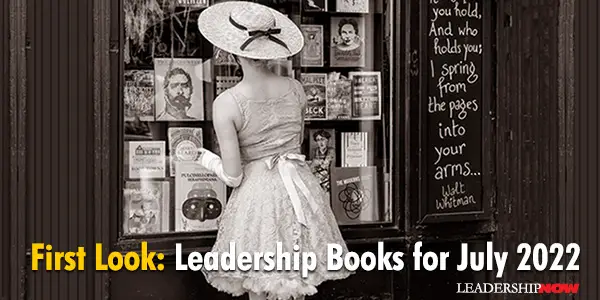
HERE'S A LOOK at some of the best leadership books to be released in July 2022. Be sure to check out the other great titles being offered this month.
In any high-pressure environment, from special operations to the operating theatre, you can divide people into two groups - those who control their performance from the inside out, and those whose performance is controlled from the outside in. In Inside Out, Charlie Unwin, one of the world's leading performance psychologists, explains the techniques that enable the elite to perform at their best under immense pressure. It reveals how they think, prepare and perform, taking you inside the highly unpredictable modern battlefield, the chaos of the catwalk, the operating theatre, the stadium, the maximum-security prison and the opera house. Whatever the challenge, whether life-or-death, or simply chasing a promotion at work, we are all susceptible to becoming 'outside in' - when you start paying more attention to the thought of not messing up than the process of doing something well. The 'Inside Out' method helps you gain control so that you can have a greater impact. It's about mindset, learning new skills, maintaining confidence and sustaining great results over time.
Exploring the dos and don’ts of sustainable corporate innovation, this book explains the most frequently made mistakes and highlights the most common pitfalls in the innovation process. To remain successful, organizations must be able to respond effectively to the fast pace of change or even stay one step ahead of it. To make this possible, it is crucial to look at the future in the right way. This means embracing uncertainty, seizing opportunities and recognizing threats in good time. Through the author's insightful and knowledgeable text, you will gain greater insight into the technological evolutions of the next 10 years and discover how this insight can be turned into a concrete approach that will build future-proof and successfully innovating companies and organisations.
In Driving Results: Six Lessons Learned from Transforming an Iconic Company, now-retired Bridgestone CEO Gary Garfield delivers an incisive and eye-opening road map of how to transform any organization, department, or group. Through a series of massive changes, Garfield drove record results while the CEO. By sharing his learnings on driving change in this insightful book, you’ll learn how you can use the six essential elements to drive results through change at your organization or with your team.
In The Upside of Uncertainty, INSEAD professor Nathan Furr and entrepreneur Susannah Harmon Furr provide a sweeping guide to embracing uncertainty and transforming it into a force for good. Drawing from hundreds of interviews, along with pioneering research in psychology, innovation, and behavioral economics, Nathan and Susannah provide dozens of tools—including mental models, techniques, and reflections—for seeing the upside of uncertainty, developing a vision for what to do next, and opening ourselves up to new possibilities.
From the leading theorist of the Metaverse comes the definitive account of the next internet: what the Metaverse is, what it will take to build it, and what it means for all of us. The term “Metaverse” is suddenly everywhere, from the front pages of national newspapers and the latest fashion trends to the plans of the most powerful companies in history. It is already shaping the policy platforms of the US government, the European Union, and the Chinese Communist Party. But what, exactly, is the Metaverse? As pioneering theorist and venture capitalist Matthew Ball explains, it is a persistent and interconnected network of 3D virtual worlds that will eventually serve as the gateway to most online experiences, and also underpin much of the physical world. For decades, these ideas have been limited to science fiction and video games, but they are now poised to revolutionize every industry and function, from finance and healthcare to education, consumer products, city planning, dating, and well beyond.
The ability to persuade and influence is the cornerstone of success. In Ignite a Shift, internationally acclaimed speaker Stephen McGarvey explores the subtleties of effective communication and highlights the essential fact that thinking impacts emotions which drive behavior. It is the quintessential guide to communication, positive persuasion and influencing with integrity. It reveals the proven techniques that the world's most effective leaders are using to motivate themselves and others to excel professionally and personally.
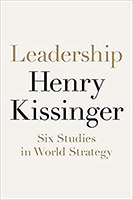 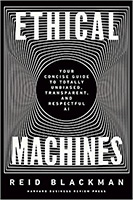 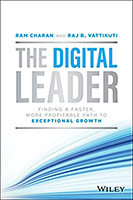 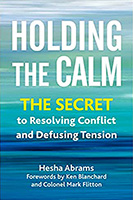
“To add a library to a house is to give that house a soul.” — Cicero
Posted by Michael McKinney at 03:01 PM
06.20.22

10 Books You Should Read This Summer
HER FATHER was an Olympic athlete, and her mother a physical education instructor. And unlike her siblings, Grace Kelly preferred reading to physical activity. Although her father was well-read, her proclivity to read didn’t always sit well with her father. He wanted her to be more athletic. At school, she was encouraged to read widely. And she did. And we should too. For me, reading some fiction is like taking a walk. It provides a diversion that gives your mind a chance to think through what you’ve been reading and learning. Especially for leaders, reading outside the normal leadership fare helps to provide you with context for your leadership. Reading fiction, histories, and biographies builds empathy and provide insights into human nature. While I like just about everything from David Baldacci, like his latest Dream Town, I also like to go back and read classics from authors like John Steinbeck. Wally Bock recommends that we take this time to read something we’ve always wanted to read, something to read for fun, and something we’ve never read about or that really stretches our brain. He even provides a helpful, downloadable sheet to help organize our list. With a few extra hours of daylight, the summer is an ideal time to relax and read. Listed below are ten books released this year that will entertain, make you think, and improve your leadership. Pick at least three and take some time to make yourself better this summer.
And I can’t leave out Build. If you’re looking for business or career wisdom, this is the book to turn to now.
Posted by Michael McKinney at 06:22 AM
06.01.22

First Look: Leadership Books for June 2022
HERE'S A LOOK at some of the best leadership books to be released in June 2022. Be sure to check out the other great titles being offered this month.
In The Power of One More, you'll: • Learn why you're closer to your dreams and goals than you think and why using The Power of One More strategies will help you cross the finish line in whatever race you're running; • Understand the psychology and science of how to use The Power of One More in every part of your life will help you solve problems and achieve levels of success you never thought possible; • Discover time-tested and unique solutions to challenges that will remove the mental roadblocks you've been battling for years
Drawing insights from its strategies, structure, and history, Seo teaches readers the skills of competitive debate, and in doing so shows how they can improve their communication with friends, family, and colleagues alike. He takes readers on a thrilling intellectual adventure into the eccentric and brilliant subculture of competitive debate, touching on everything from the radical politics of Malcom X to Artificial Intelligence. Seo proves beyond a shadow of a doubt that, far from being a source of conflict, good-faith debate can enrich our daily lives. Indeed, these good arguments are essential to a flourishing democracy, and are more important than ever at time when bad faith is all around.
Is power the last dirty secret or the secret to success? Both. While power carries some negative connotations, power is a tool that can be used for good or evil. Don’t blame the tool for how some people used it. If fully understood and harnessed effectively, power skills and understanding become the keys to increasing salaries, job satisfaction, career advancement, organizational change, and, happiness. In 7 Rules of Power, Jeffrey Pfeffer, professor of organizational behavior at the Stanford University Graduate School of Business, provides the insights that have made both his online and on-campus classes incredibly popular—with life-changing results often achieved in 8 or 10 weeks. Rooted firmly in social science research, Pfeffer’s 7 rules provide a manual for increasing your ability to get things done, including increasing the positive effects of your job performance.
In Building Trust: Exceptional Leadership in an Uncertain World, Darryl Stickel, one of the world’s foremost experts on trust, outlines his groundbreaking Trust Unlimited blueprint for building trust. Stickel moves away from the traditional approach of influencing people’s willingness to trust—the con artist’s tactic—to employing one or more of ten levers, which leaders can “pull” to close the gap between how much they are trusted and how much they should be. This approach also makes them more trustable and increases trust where it is deficient. Detailed case studies provide examples of his Trust Unlimited model in action.
What is the difference between a startup that makes it, and one that crashes and burns? Behind every story of success is an unfair advantage. But an Unfair Advantage is not just about your parents' wealth or who you know: anyone can have one. An Unfair Advantage is the element that gives you an edge over your competition. This groundbreaking book shows how to identify your own Unfair Advantages and apply them to any project. Drawing on over two decades of hands-on experience, Ash Ali and Hasan Kubba offer a unique framework for assessing your external circumstances in addition to your internal strengths. Hard work and grit aren't enough, so they explore the importance of money, intelligence, location, education, expertise, status, and luck in the journey to success. From starting your company, to gaining traction, raising funds, and growth hacking, The Unfair Advantage helps you look at yourself and find the ingredients you didn't realize you already had, to succeed in the cut-throat world of business.
Leading lightly is about looking at what you do through a radical new lens. It’s a way to powerfully transform your performance, make better decisions, gain greater self-awareness, and develop the capacity to manage your work and life with enduring ease and clarity. An alternative to the everyday stress, pace, challenges, and burdens that weigh you down, Leading Lightly shows you how to shift your mindset, live lighter, and optimize your effectiveness. Part leadership, part mental fitness, part health and wellness guide, this book empowers you to work at your best and operate at your fullest potential.
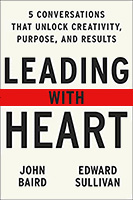 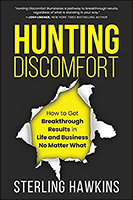 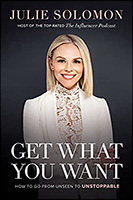
“To add a library to a house is to give that house a soul.” — Cicero
Posted by Michael McKinney at 06:54 AM
05.01.22

First Look: Leadership Books for May 2022Here's a look at some of the best leadership books to be released in May 2022. Be sure to check out the other great titles being offered this month.
What passes for strategy in too many businesses, government agencies, and military operations is a toxic mix of wishful thinking and a jumble of incoherent policies. Richard P. Rumelt’s breakthrough concept is that leaders become effective strategists when they focus on challenges rather than goals, pinpointing the crux of their pivotal challenge—the aspect that is both surmountable and promises the greatest progress—and taking decisive, coherent action to overcome it. Rumelt defines the essence of the strategist’s skill with vivid storytelling, from how Elon Musk found the crux that propelled the success of SpaceX to how the American military came to grips with the weaknesses of its battle strategy. Musk’s core challenge, for example, was rocket reusability. His intense focus on the soft landing of SpaceX’s rockets enabled them to be used again—radically reducing the cost of putting a pound in orbit. Musk’s strategy was not based on how value is created or how to position SpaceX in its industry. It was a design foraction, the mental maneuver that focuses energy on what really made a difference through understanding the crux and creating an effective response that led to breakthrough.
“We are living an earned life when the choices, risks, and effort we make in each moment align with an overarching purpose in our lives, regardless of the eventual outcome.” That’s the definition of an earned life. But for many of us, that pesky final phrase is a stumbling block: “regardless of the eventual outcome.” Not being attached to the outcome goes against everything we’re taught about achievement and fulfillment in modern society. But now, in his most personal and powerful work to date, world-renowned leadership coach Marshall Goldsmith offers a dazzling but simple approach that accommodates both our persistent need for achievement and the inescapable “stuff happens” unfairness of life. Goldsmith implores readers to avoid the Great Western Disease of “I’ll be happy when. . . .” He offers practical advice and exercises aimed at helping us shed the obstacles, especially the failures of imagination, that prevent us from creating our own fulfilling lives. With this book as their guide, readers can close the gap between what they plan to achieve and what they actually get done—and avoid the trap of existential regret, the kind that reroutes destinies and persecutes our memories. Packed with illuminating stories from Goldsmith’s legendary career as a coach to some of the world’s highest-achieving leaders as well as reflections on his own experiences, The Earned Life is a road map for ambitious people seeking a higher purpose.
Unresolved workplace conflict wastes time, increases stress, and negatively affects business outcomes. But conflict isn’t the problem, mismanagement is. Leaders unintentionally mismanage conflict when they fall into patterns of what Marlene Chism calls “the Three As:” aggression, avoidance, and appeasing. “These coping mechanisms are ways human beings avoid the emotions that come with conflict, but in the end it’s all avoidance,” says Chism. In this book she shows how to fearlessly deal with conflict head-on by expanding your conflict capacity. Conflict capacity is a combination of three elements. The foundation is the Inner Game—the leader’s self-awareness, values, discernment, and emotional integrity. The Outer Game is the skills, tools, and communication techniques built on that foundation. Finally, there’s Culture—the visible and invisible structures around you that can encourage or discourage conflict.
Reggie Fils-Aimé, retired President and Chief Operating Officer of Nintendo of America Inc., shares leadership lessons and inspiring stories from his unlikely rise to the top. Although he’s best known as Nintendo's iconic President of the Americas-immortalized for opening Nintendo’s 2004 E3 presentation with, “My name is Reggie, I'm about kicking ass, I'm about taking names, and we're about making games”-Reggie Fils-Aimé’s story is the ultimate gameplan for anyone looking to beat the odds and achieve success. Learn from Reggie how to leverage disruptive thinking to pinpoint the life choices that will make you truly happy, conquer negative perceptions from those who underestimate or outright dismiss you, and master the grit, perseverance, and resilience it takes to dominate in the business world and to reach your professional dreams.
At the heart of Admiral James Stavridis’s training as a naval officer was the preparation to lead sailors in combat, to face the decisive moment in battle whenever it might arise. In To Risk it All, he offers up nine of the most useful and enthralling stories from the US Navy’s nearly 250-year history, and draws from them a set of insights that we can all put to use when confronted with fateful choices. Conflict. Crisis. Risk. These words have a distinct meaning in a military context that we hope will never apply identically in our own lives. But at the same time, as Admiral Stavridis shows with great clarity, many lessons are universal. To Risk it All is filled with thrilling and heroic exploits, but it is anything but a shallow exercise in myth burnishing. Every leader in this book has real flaws, as all humans do, and the stories of failure, or at least the decisions that have been defined as such, are as crucial as the stories of success. In the end, when this master class is concluded, we will be better armed for hard decisions both expected and not.
Most people try their best to avoid conflict. Bar Rescue host Jon Taffer understands that. Conflict can have negative results. It’s easy to think that the key to a happy workplace or marriage is to avoid conflict. In reality, that’s not the case—the key is to argue smarter. Enter the Toolkit for Getting Conflict Right. Taffer’s approach is focused on deliberate conflict—otherwise known as “conflict with a purpose.” There are selective and strategic ways to have difficult conversations, and when doing so, to stay aware of your objectives rather than escalating tension unnecessarily. As Taffer explains, “The key is to act affirmatively, constructively, and productively.” Eliminating conflict isn’t always the answer; inevitably there will be times when it will arise. Engaging in conflict can be a way to clear the air, and get to the bottom of issues that, once resolved, can strengthen friendships, ease tensions at work, and address problems before they have a chance to bubble over.
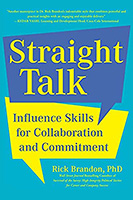 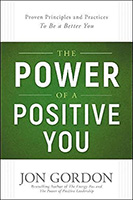 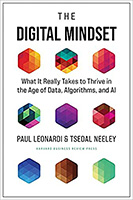
 Build your leadership library with these specials on over 28 titles. All titles are at least 40% off the list price and are available only in limited quantities. “To add a library to a house is to give that house a soul.” — Cicero
Posted by Michael McKinney at 07:15 AM
04.01.22

First Look: Leadership Books for April 2022Here's a look at some of the best leadership books to be released in April 2022. Be sure to check out the other great titles being offered this month.
You've long been told to "Do what you love." Sounds simple, but the real challenge is how to do this in a world not set up to help you. Most of us actually don't know the real truth of what we love—what engages us and makes us thrive—and our workplaces, jobs, schools, even our parents, are focused instead on making us conform. Sadly, no person or system is dedicated to discovering the crucial intersection between what you love to do and how you contribute it to others. In this eye-opening, uplifting book, Buckingham shows you how to break free from this conformity—how to decode your own loves, turn them into their most powerful expression, and do the same for those you lead and those you love.
Over a stellar career, Roger Martin has advised the CEOs of some of the world's most successful companies. From the beginning, he noted that almost every executive he talked to had a "model"—a framework or way of thinking that guided their strategy and activities. But these models tended to become automatic, so much so that when one didn't work, the typical response was just to apply it again—with greater enthusiasm. Martin took a fresh, critical approach to helping. When company leaders came to him with fundamental questions—How do you decide where to play and how to win? What is the key to shaping and changing corporate culture? How can you design a successful, sustainable innovation process?—his first response was to break the spell of the current model with a memo articulating a new way to think about the problem at hand and a more powerful and effective way to successfully overcome it.
Why is leading innovation in today’s dynamic business environment so distressingly hit-or-miss? More than 90 percent of high-potential ventures don’t reach their projected targets. Surveys show that 80 percent of executives consider innovation crucial to their growth strategy, but only 6 percent are satisfied with their innovation performance. Should leaders aim for Steve Jobs-level genius, shower their projects with resources, or lean in to luck and embrace uncertainty? None of the above, say Christopher Bingham and Rory McDonald. Drawing on cutting-edge research and probing interviews with hundreds of leaders across three continents, in Productive Tensions Bingham and McDonald find that the most effective leaders and successful innovators embrace the tensions that arise from competing aims: efficiency or flexibility? consistency or change? product or purpose? Bingham and McDonald spotlight eight critical tensions that every innovator must master, and they spell out, with dozens of detailed examples of both success and failure, how to navigate them.
Cut through the noise and create the biggest possible audience for your work. This book offers a proven method for expanding your reach online so you can make a meaningful difference for others. Anyone who makes the bold decision to put their ideas out into the world wants to reach as many people as possible. Unfortunately, too many think it’s a question of numbers—the more people you can get in front of, the better. But true reach is about expanding your audience while making a meaningful and enduring difference that has a lasting impact. Reach provides a clear and structured approach to creating a successful online presence that will create the biggest possible impact for any message. Becky Robinson shares a framework to cultivate followers that requires four commitments: value, consistency, endurance, and generosity. When you make these four commitments, you’ll deliver memorable content on a regular basis while keeping the long-term view in mind and being committed to helping and sharing with others.
In 2008, with no event production experience and two college degrees between the four of them, Elliott Bisnow, Brett Leve, Jeff Rosenthal, and Jeremy Schwartz became business partners and set out to build a global events company. With passion and tenacity, they began cold calling as many inspiring company founders as they could and tried to convince them to attend their first event. In the beginning, only nineteen people said yes. Since then, they have grown Summit into a global community with events all over the world, hosting luminaries including Jeff Bezos, Richard Branson, Shonda Rhimes, Brené Brown, Kendrick Lamar, and Al Gore. In 2013, the Summit founders acquired Powder Mountain, the largest ski resort in the United States, with a dream of building a mountaintop town of the future. In Make No Small Plans, they reveal the triumphs, mistakes, and cornerstone lessons from their journey, which began during the Great Recession and continues today.
In their groundbreaking book, Human + Machine, Accenture technology leaders Paul R. Daugherty and H. James Wilson showed how leading organizations use the power of human-machine collaboration to transform their processes and their bottom lines. Now, as AI continues to rapidly impact both life and work, those companies and other pioneers across industries are tipping the balance even more strikingly toward the human side with technology-led strategy that is reshaping the very nature of innovation. In Radically Human, Daugherty and Wilson show this profound shift, fast-forwarded by the pandemic, toward more human—and more humane—technology. Artificial intelligence is becoming less artificial and more intelligent. Instead of data-hungry approaches to AI, innovators are pursuing data-efficient approaches that enable machines to learn as humans do. Instead of replacing workers with machines, they're unleashing human expertise to create human-centered AI. In place of lumbering legacy IT systems, they're building cloud-first IT architectures able to continuously adapt to a world of billions of connected devices. And they're pursuing strategies that will take their place alongside classic, winning business formulas like disruptive innovation.
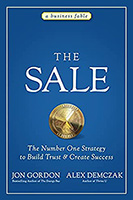 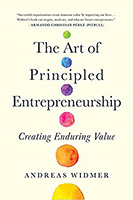 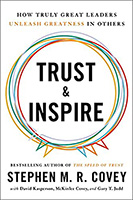
 Build your leadership library with these specials on over 28 titles. All titles are at least 40% off the list price and are available only in limited quantities. “He that loves a book will never want a faithful friend, a wholesome counselor, a cheerful companion, an effectual comforter. By study, by reading, by thinking, one may innocently divert and pleasantly entertain himself, as in all weathers, as in all fortunes.” — Isaac Barrow
Posted by Michael McKinney at 05:13 AM
03.01.22

First Look: Leadership Books for March 2022Here's a look at some of the best leadership books to be released in March 2022. Be sure to check out the other great titles being offered this month.
What if the most powerful coach that could help you reach your own potential was actually...yourself? Take Charge Of You teaches you the secrets to self-coaching. Everyone could use a good coach to help them reach their full potential. Unfortunately, there just aren't enough good ones to go around, and the ones that exist are often too expensive or sought-after for most of us to even consider hiring them. But that doesn't mean you should go without! Your life is too important to leave your personal growth and professional development up to chance. Take Charge of You helps you define for yourself what you want out of life and give yourself what you need to succeed.
Leading to Greatness is a hands-on how-to leadership development program designed to guide leaders to self and organizational excellence. By applying five core leadership principles top-level executives will be primed to take their organizations and teams into the future. Principle 1: Define a crystal-clear understanding of values and purpose―and never deviate. Principle 2: Recognize core strengths and align them with passion. Principle 3: Identify and engage the right people and get them in the right seats; no leader excels at everything. Principle 4: Learn to manage energy―not time―to become fully engaged in life (and thus, leadership). Principle 5: Develop a consistent inner discipline to achieve exceptional results. Author Jim Reid combines his decades of top-level leadership and coaching experience with the best research and science available to deliver to leaders a practical and actionable plan that when consistently applied in one’s life becomes a transformative experience.
Discover true leadership with this actionable guide from a world renowned leadership expert, psychoanalyst, and executive coach. In Leading Wisely: Becoming a Reflective Leader in Turbulent Times, renowned leadership expert, psychoanalyst and executive coach Manfred Kets De Vries delivers an insightful and unique exploration of what it means to lead with wisdom. The book demonstrates that exclusive reliance on knowledge, data, and information yields a superficial leadership style lacking in depth and discernment. What's more important in the wisdom equation is possessing humility, judgment, empathy, compassion, and night vision.
The time-honored tradition of defining career development exclusively in terms of promotions, moves, and title changes is dead. Beyond, between, and besides the climb up the positional ladder, there are many other ways that employees can―and want to―grow. However, many organizations still operate under the notion that promotions are the only option for career development, leaving employees disengaged, managers frustrated, and the business disadvantaged in its efforts to retain talent. The good news is that career development is so much more than promotions alone, and managers are in a powerful position to redefine career development and create positive results for their employees and their organizations in this area. In Promotions Are So Yesterday, Julie Winkle Giulioni offers you a new approach for developing your employees' careers and helping them thrive in a company when promotions are not readily available. Discover an easy-to-apply framework of seven alternative dimensions of development that will engage your employees―dynamic opportunities for growth that are completely within your control as a manager.
From the world’s most influential management consulting firm, McKinsey & Company, an insight-packed, revelatory look at how the best CEOs do their jobs based on extensive interviews with today’s most successful corporate leaders—including chiefs at Netflix, JPMorgan Chase, General Motors, and Sony. Being a CEO at any of the world’s largest companies is among the most challenging roles in business. Billions, and even trillions, are at stake—and the fates of tens of thousands of employees often hang in the balance. Yet, even when “can’t miss” high-achievers win the top job, very few excel. Thirty percent of Fortune 500 CEOs last fewer than three years, and two out of five new CEOs are perceived to be failing within eighteen months. For those who shoulder the burden of being the one on whom everyone counts, a manual for excellence is sorely needed.
Feelings of loneliness among employees are on the rise with 72% of global workers suffering from it. This sense of isolation is contributing to a real and growing mental health problem that affects both individuals and organizations. In Connectable, you’ll learn how tackling the issue of worker loneliness head on can transform an isolated workforce into one that’s happier, more engaged, and more productive. With more than a decade of experience spent helping companies lessen worker loneliness, Ryan Jenkins and Steven Van Cohen distill their methodology, showing you what’s causing today’s loneliness, the role inclusion plays in solving it, and how you can decrease loneliness and increase belonging, engagement, and performance with employees at every level―including yourself.
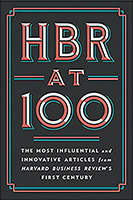 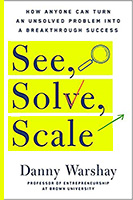 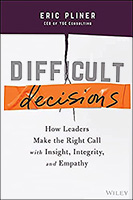
 Build your leadership library with these specials on over 28 titles. All titles are at least 40% off the list price and are available only in limited quantities. “He that loves a book will never want a faithful friend, a wholesome counselor, a cheerful companion, an effectual comforter. By study, by reading, by thinking, one may innocently divert and pleasantly entertain himself, as in all weathers, as in all fortunes.” — Isaac Barrow
Posted by Michael McKinney at 07:11 AM
02.01.22

First Look: Leadership Books for February 2022Here's a look at some of the best leadership books to be released in February 2022. Be sure to check out the other great titles being offered this month.
Everybody has regrets, Daniel H. Pink explains in The Power of Regret. They’re a universal and healthy part of being human. And understanding how regret works can help us make smarter decisions, perform better at work and school, and bring greater meaning to our lives. Drawing on research in social psychology, neuroscience, and biology, Pink debunks the myth of the “no regrets” philosophy of life. And using the largest sampling of American attitudes about regret ever conducted as well as his own World Regret Survey—which has collected regrets from more than 15,000 people in 105 countries—he lays out the four core regrets that each of us has. These deep regrets offer compelling insights into how we live and how we can find a better path forward.
Leadership legend and bestselling author Ken Blanchard and trust expert and thought leader Randy Conley present this carefully curated collection of fifty-two essential leadership principles that are easy to implement and practice. Effective leadership is an influence process where leaders implement everyday, commonsense approaches that help people and organizations thrive. Yet somehow, many of these fundamental principles are still missing from most workplaces. In Simple Truths of Leadership, legendary servant leadership expert Ken Blanchard, whose books have sold millions of copies worldwide, and his colleague Randy Conley, known and recognized for his many years of thought leadership and expertise in the field of trust, share fifty-two Simple Truths about leadership that will help leaders everywhere make commonsense leadership common practice.
Human beings are born to connect―but in today’s increasingly polarized world, we’re losing sight of the importance of building and maintaining professional relationships. And that’s bad for business. In Bridge the Gap, two prominent Fortune 500 coaches explore how your biology and biography define and refine your behavior in relationships where you struggle to connect. Focusing on personal responsibility and awareness, meta-cognition, and curiosity, they provide a reliable and replicable framework to enhance open communication. And they illuminate the inner workings of the human brain and mind, and how they impact the way you connect, communicate, and collaborate.
From impromptu elevator pitches to full-board presentations, sales and marketing professionals face an “audience” daily―often with make-or-break consequences. As the person delivering the performance, you need to know you have a great script and are able to maintain composure throughout. In Pitch Like Hollywood, we learn how to up our game substantiall ―no matter what business we’re in―by incorporating elements of a classic Hollywood pitch: driving emotion, piquing curiosity, and ultimately winning over decision makers with powerful persuasion and performance. They take us on an insider’s tour of the entire process, from defining the fundamentals to designing effective presentation strategies to overcoming stage fright.
You've shed antiquated systems and processes. You went all-in on digital. Your teams settled into new, often better, ways of doing things. But did your organization change enough to stay competitive in the post-pandemic world? Did you fully leverage the once-in-a-lifetime opportunity to leap forward and grow stronger? Are you shaping the new environment to your advantage? If not, it's not too late to learn from the best. New York Times #1 bestselling author Keith Ferrazzi, along with coauthors Kian Gohar and Noel Weyrich, shows leaders how to shape their organizations and practices to remain competitive in a new, post-pandemic context.
Today, PayPal’s founders and earliest employees are considered the technology industry’s most powerful network. Since leaving PayPal, they have formed, funded, and advised the leading companies of our era, including Tesla, Facebook, YouTube, SpaceX, Yelp, Palantir, and LinkedIn, among many others. As a group, they have driven twenty-first-century innovation and entrepreneurship. Their names stir passions; they’re as controversial as they are admired. In building what became one of the world’s foremost companies, they faced bruising competition, internal strife, the emergence of widespread online fraud, and the devastating dot-com bust of the 2000s. Their success was anything but certain. In The Founders, award-winning author and biographer Jimmy Soni explores PayPal’s turbulent early days. With hundreds of interviews and unprecedented access to thousands of pages of internal material, he shows how the seeds of so much of what shapes our world today—fast-scaling digital start-ups, cashless currency concepts, mobile money transfer—were planted two decades ago. He also reveals the stories of countless individuals who were left out of the front-page features and banner headlines but who were central to PayPal’s success.
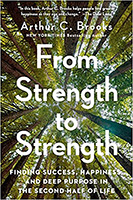 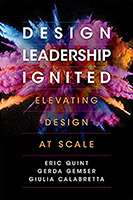 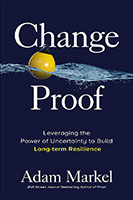
 Build your leadership library with these specials on over 28 titles. All titles are at least 40% off the list price and are available only in limited quantities. “He that loves a book will never want a faithful friend, a wholesome counselor, a cheerful companion, an effectual comforter. By study, by reading, by thinking, one may innocently divert and pleasantly entertain himself, as in all weathers, as in all fortunes.” — Isaac Barrow
Posted by Michael McKinney at 12:08 AM
01.01.22

First Look: Leadership Books for January 2022Here's a look at some of the best leadership books to be released in January 2022. Be sure to check out the other great titles being offered this month.
There is significant evidence that an effective organizational culture provides a major competitive edge―higher levels of employee and customer engagement and loyalty translate into higher growth and profits. Many business leaders know this, yet few are doing much to improve their organizations’ cultures. They are discouraged by misguided beliefs that an executive’s tenure and an organization’s attention span are too short for meaningful transformation. James Heskett provides a roadmap for achievable and fast-paced culture change. He demonstrates that an effective culture supplies the trust that makes managing change of all kinds easier. It provides a foundation on which changes in strategy can be based, and it’s a competitive edge that can’t easily be hacked or copied.
Two world-renowned strategists detail the seven leadership imperatives for transforming companies in the new digital era. Digital transformation is critical. But winning in today's world requires more than digitization. It requires understanding that the nature of competitive advantage has shifted—and that being digital is not enough. In Beyond Digital, Paul Leinwand and Matt Mani from Strategy&, PwC's global strategy consulting business, take readers inside twelve companies and how they have navigated through this monumental shift: from Philips's reinvention from a broad conglomerate to a focused health technology player, to Cleveland Clinic's engagement with its broader ecosystem to improve and expand its leading patient care to more locations around the world, to Microsoft's overhaul of its global commercial business to drive customer outcomes. Other case studies include Adobe, Citigroup, Eli Lilly, Hitachi, Honeywell, Inditex, Komatsu, STC Pay, and Titan.
Escape the mediocrity that ensnares so many in business and become a better, more effective leader. Have you ever wondered what it would take to be a better leader, or achieve your wildest dreams, or make a bigger difference in the world? The answer lies in the choices you make: about everything from how you spend your time to the way you view the world. Smart Leadership is the latest essential business title from internationally bestselling author of Win the Heart and Chess Not Checkers. In this book, he shares the four research-based “smart choices” the best leaders make to scale their influence and results.
Donald Miller shares the plan that led him to turn his life around. There are four characters in every story: The victim, the villain, the hero, and the guide. These four characters live inside us. If we play the victim, we’re doomed to fail. If we play the villain, we will not create genuine bonds. But if we play the hero or guide, our lives will flourish. The hard part is being self-aware enough to know which character we are playing. In this book, Donald will use his own experiences to help you recognize if the character you are currently surfacing is helping you experience a life of meaning. He breaks down the transformational, yet practical, plan that took him from slowly giving up to rapidly gaining a new perspective of his own life’s beauty and meaning, igniting his motivation, passion, and productivity, so you can do the same.
Growth is the goal. Helping people develop their potential—enabling them to articulate and become the self they want to be, are capable of being, and that best serves them and others in the short and long term—is what we as individuals and leaders strive toward. But how do we grow? It turns out it happens in a predictable way, which means we can understand where we are in our growth and chart a way forward. In this compact, complete guide, Whitney Johnson dives more deeply than ever into the S Curve of Learning so that you can envision how growth happens and direct yourself and others in your organization to create a culture that fosters it. The growth and learning journey comes in three phases: the Launch Point, the Sweet Spot, and Mastery. Compelling examples of successful people will show you when and why growth is slow, how to keep going, what to do when growth and learning are almost too fast to keep up with, and how to leap from one growth journey to another.
Becoming a Master Communicator, by Renée Marino-communication coach, Broadway actress, and star of Clint Eastwood’s Jersey Boys film-is a guide for those looking to have clear and authentic communication with others by using digital technology as a tool—but not the only tool. Smartphones and computers make everyday communication incredibly convenient. However, when used as an individual’s sole source of connection, it can make one forget real human contact and interaction are incredibly vital, thus causing unnecessary misunderstandings. Through personal stories and easily applicable practices, Renée Marino explains how to become a master communicator in personal and professional settings by knowing when to use digital technology and when to put the devices down to have a direct conversation.
 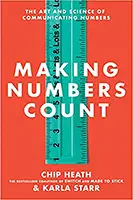 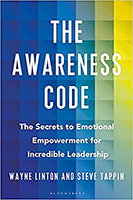
 Build your leadership library with these specials on over 28 titles. All titles are at least 40% off the list price and are available only in limited quantities. “He that loves a book will never want a faithful friend, a wholesome counselor, a cheerful companion, an effectual comforter. By study, by reading, by thinking, one may innocently divert and pleasantly entertain himself, as in all weathers, as in all fortunes.” — Isaac Barrow
Posted by Michael McKinney at 09:32 AM
12.15.21

The Best Leadership Books of 2021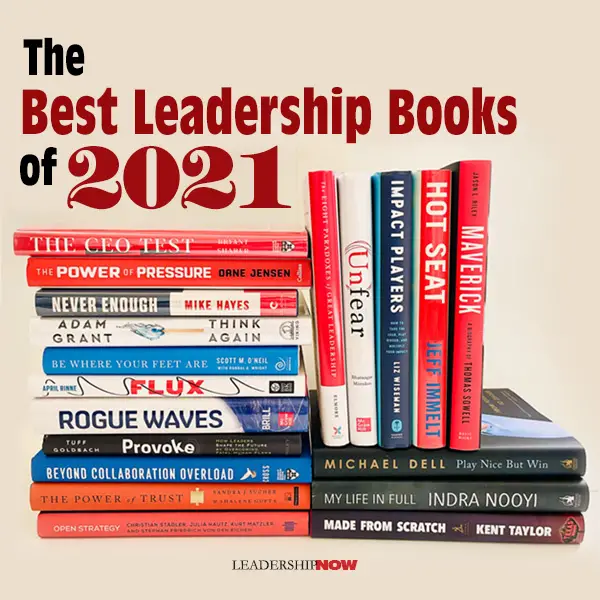
The political environment in the United States as elsewhere is driven by fear-based narratives. And that feeds our approach in society at large. It leads to short-term thinking. That’s not the way to lead. Leadership is about hope. Former PepsiCo CEO Indra Nooyi wrote, “the fundamental role of a leader is to look for ways to shape the decades ahead, not just react to the present, and to help others accept the discomfort of disruptions to the status quo.” Leaders are dealers in hope. Many of the books listed below help us to do just that. Others were included because they help us to think differently, opening us up to potential we might not have considered. The books listed below help us to build the right foundation from which we can lead others. When we get it right on the inside, we can do right on the outside.
(Harvard Business Review Press, 2021)
(Collins, 2021)
(Celadon Books, 2021)
(Viking, 2021)
(St. Martin's Essentials, 2021)
(Berrett-Koehler Publishers, 2021)
(McGraw-Hill Education, 2021)
(Wiley, 2021)
(Harvard Business Review Press, 2021)
(PublicAffairs 2021)
(The MIT Press 2021)
(Harper Business 2021)
(McGraw-Hill Education, 2021)
(HarperCollins Leadership, 2021)
Emerging Theme:
Biographies:
(Basic Books, 2021)
(Avid Reader Press / Simon & Schuster, 2021)
(Portfolio, 2021)
(Portfolio, 2021)
(Simon & Schuster, 2021)
Posted by Michael McKinney at 12:30 PM
12.01.21

First Look: Leadership Books for December 2021Here's a look at some of the best leadership books to be released in December 2021. Don't miss out on other great new and future releases not listed here.
With Amy Herman’s Fixed., we now have access to what the FBI, NATO, the State Department, Interpol, Scotland Yard, and many more organizations and their leaders have been using to solve their most intractable problems. Demonstrating a powerful paradigm shift for finding solutions, Herman teaches us to see things differently, using art to challenge our default thinking and open up possibilities otherwise overlooked. Her unexpected, insightful, and often delightful methodology is sought after by leaders and professionals for whom failure is catastrophic. Luckily for us, these tactics work— no matter the problem’s scale or complexity.
Five simple qualities that captures the essence of outstanding leadership today. In today’s world, leadership is all about establishing community and connectivity so everyone can be part of something bigger than themselves. To have the grace to create this kind of leadership, we need greater self-awareness and genuine connection to others. In The Five Graces of Life and Leadership, CEO of the celebrated consulting firm Korn Ferry delivers a meaningful and thought-provoking exploration of leadership, emphasizing the five kinds of grace that leaders absolutely must have to lead their teams in today’s evolving workscape. In the book, you’ll learn how to the best leaders make their teams feel comforted, safe, and secure that they’re headed in the right direction.
Tom Ziglar shares ten leadership virtues that are essential for coaching employees through immense change and creating an environment of maximum potential and productivity. Delivering cutting-edge new research, wisdom gleaned from experience, and poignant insights from his work at Zig Ziglar Corp, Tom Ziglar identifies the communication styles that will keep everyone on the same page, regardless of their working environment. He also emphasizes the importance of closing the "empathy gap" between management and staff in order to create a more connected team that operates to its fullest potential--and how developing each team member's unique dreams, goals, and abilities sets up the company for success.
Great leaders embrace a higher purpose to win. The Net Promoter System shines as their guiding star. Few management ideas have spread so far and wide as the Net Promoter System (NPS). Since its conception almost two decades ago by customer loyalty guru Fred Reichheld, thousands of companies around the world have adopted it—from industrial titans such as Mercedes-Benz and Cummins to tech giants like Apple and Amazon to digital innovators such as Warby Parker and Peloton. Now, Reichheld has raised the bar yet again. In Winning on Purpose, he demonstrates that the primary purpose of a business should be to enrich the lives of its customers. Why? Because when customers feel this love, they come back for more and bring their friends—generating good profits. This is NPS 3.0 and it puts a new take on the age-old Golden Rule—treat customers the way you would want a loved one treated—at the heart of enduring business success.
A global pandemic, economic volatility, natural disasters, civil and political unrest. From New York to Barcelona to Hong Kong, it can feel as if the world as we know it is coming apart. Through it all, our human spirit is being tested. Now more than ever, it's imperative for leaders to demonstrate compassion. But in hard times like these, leaders need to make hard decisions—deliver negative feedback, make difficult choices that disappoint people, and in some cases lay people off. How do you do the hard things that come with the responsibility of leadership while remaining a good human being and bringing out the best in others? Most people think we have to make a binary choice between being a good human being and being a tough, effective leader. But this is a false dichotomy. Being human and doing what needs to be done are not mutually exclusive. In truth, doing hard things and making difficult decisions is often the most compassionate thing to do.
When we think of resilience, we think of being able to “roll with the punches” and “bounce back” after uncertainty or change. But resiliency expert and bestselling author Adam Markel encourages you to aim higher. In Change Proof, he shows you how to truly, actually embrace change―to find the creative opportunity in uncertainty, as opposed to simply riding it out or reacting to it. In Change Proof, Markel demonstrates that this kind of resilience―thriving versus surviving―is a skill you can cultivate, both personally and professionally. Using case studies, current research, and real-life anecdotes from his work as an executive mentor, Markel clearly lays out the fundamentals of the required mind shift―how to change your relationship with change.
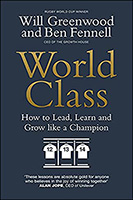 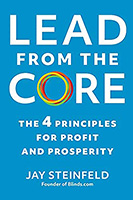 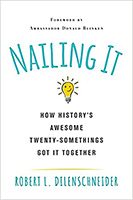
 Build your leadership library with these specials on over 28 titles. All titles are at least 40% off the list price and are available only in limited quantities. “He that loves a book will never want a faithful friend, a wholesome counselor, a cheerful companion, an effectual comforter. By study, by reading, by thinking, one may innocently divert and pleasantly entertain himself, as in all weathers, as in all fortunes.” — Isaac Barrow
Posted by Michael McKinney at 10:21 AM
11.01.21

First Look: Leadership Books for November 2021Here's a look at some of the best leadership books to be released in November 2021. Don't miss out on other great new and future releases not listed here.
Become a next generation leader—rich in emotional and social intelligence and orchestrating outstanding collaborative results—by mastering these eight status quo-shattering paradoxes. The Eight Paradoxes of Great Leadership unpacks the fresh strategies and new mindset required today from a next generation leader. Author Dr. Tim Elmore helps leaders of all kinds navigate increasingly complex, rapidly changing environments, as well as manage teams who bring a range of new demands and expectations to the workplace that haven’t been seen even one generation prior.
By leading with “we”—putting the collective above the individual, holding the sum above the parts, and emphasizing the importance of the role that everyone plays—you can not only help solve the escalating challenges of today but also unlock extraordinary growth for your business, and abundance on our planet. Timely and compelling, this book’s message is simple: The future of profit is people’s purpose, aligned. Lead With We not only examines why we must all conduct business differently in order to grow in today’s market, but provides the how—concrete steps any reader, wherever they find themselves in the business hierarchy, can take toward success.
Does power corrupt, or are corrupt people drawn to power? Are entrepreneurs who embezzle and cops who kill the result of poorly designed systems or are they just bad people? Are tyrants made or born? If you were suddenly thrust into a position of power, would you be able to resist the temptation to line your pockets or seek revenge against your enemies? Based on deep, unprecedented research from around the world, Corruptible will challenge your most basic assumptions about becoming a leader and what might happen to your head when you get there. It also provides a roadmap to avoiding classic temptations, suggesting a series of reforms that would facilitate better people finding a path to power—and ensuring that power purifies rather than corrupts.
Millennials, Baby Boomers, Gen Z—we like to define people by when they were born, but an acclaimed social researcher explains why we shouldn't. Boomers are narcissists. Millennials are spoiled. Gen Zers are lazy. We assume people born around the same time have basically the same values. It makes for good headlines, but is it true? Bobby Duffy has spent years studying generational distinctions. In The Generation Myth, he argues that our generational identities are not fixed but fluid, reforming throughout our lives. Based on an analysis of what over three million people really think about homeownership, sex, well-being, and more, Duffy offers a new model for understanding how generations form, how they shape societies, and why generational differences aren’t as sharp as we think.
The Leader's Mind taps into the same tips and techniques honed by top-tier athletes, such as how to get in a "zone," thrive on a team, and stay humble, to become a champion at work and the ultimate team player at home. Stop struggling with the expectations you face at work and at home by fundamentally changing the way you process what’s happening in your life. The mental edge that sets elite athletes apart outlined in this book will help you become the champion leader you want to be.
Gary Vaynerchuk explores the twelve essential emotional skills that are integral to his life—and business—success and provides today’s (and tomorrow’s) leaders with critical tools to acquire and develop these traits. For decades, leaders have relied on “hard” skills to make smart decisions, while dismissing the importance of emotional intelligence. Soft skills like self-awareness and curiosity aren’t quantifiable; they can’t be measured on a spreadsheet and aren’t taught in B-schools or emphasized in institutions. We’ve been taught that emotional intelligence is a “nice to have” in business, not a requirement. But soft skills can actually accelerate business success, Gary Vaynerchuk argues. For analytical minds, it’s challenging to understand how to get “better” at being self-aware, curious, or empathetic—or even why it’s important to try.
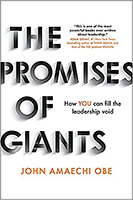 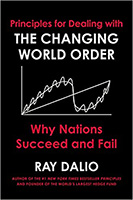 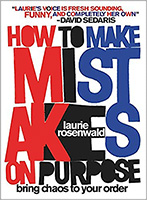
 Build your leadership library with these specials on over 28 titles. All titles are at least 40% off the list price and are available only in limited quantities. “There’s a lot to learn from the right leadership books. If you think you know it, think again. Ask those you trust what books have inspired them, and dig in. Always have at least one book going.” — Kent Taylor, Made From Scratch
Posted by Michael McKinney at 09:53 AM
10.01.21

First Look: Leadership Books for October 2021Here's a look at some of the best leadership books to be released in October 2021. Don't miss out on other great new and future releases not listed here.
In this book, General McChrystal offers a battle-tested system for detecting and responding to risk. Instead of defining risk as a force to predict, McChrystal and coauthor Anna Butrico show that there are in fact ten dimensions of control we can adjust at any given time. By closely monitoring these controls, we can maintain a healthy Risk Immune System that allows us to effectively anticipate, identify, analyze, and act upon the ever-present possibility that things will not go as planned. McChrystal illustrates how these ten factors are always in effect, and how by considering them, individuals and organizations can exert mastery over every conceivable sort of risk that they might face.
You were born to be an entrepreneur. You were taught to be an employee. Aspiring entrepreneurs are instinctively driven to be the master of their own fate and to explore the limits of their potential. But most hear two conflicting voices in their heads: an optimistic voice telling them all the reasons they should start a business, and a second voice-one that fears uncertainty-telling them all the reasons they should remain someone else's employee. Millions of future business owners feel trapped by those voices-like they are meant for something more but are stuck where they are.
From Michael Dell, renowned founder and chief executive of one of America’s largest technology companies, the inside story of the battles that defined him as a leader. Play Nice But Win is a riveting account of the three battles waged for Dell Technologies: one to launch it, one to keep it, and one to transform it. For the first time, Dell reveals the highs and lows of the company's evolution amidst a rapidly changing industry—and his own, as he matured into the CEO it needed. With humor and humility, he recalls the mentors who showed him how to turn his passion into a business; the competitors who became friends, foes, or both; and the sharks that circled, looking for weakness. What emerges is the long-term vision underpinning his success: that technology is ultimately about people and their potential.
Why are some of the world’s most successful companies able to stay ahead of disruption, adopting and implementing innovative strategies, while others struggle? It’s not because they hire a new CEO or expensive consultants but rather because these pioneering companies have adopted a new way of strategizing. Instead of keeping strategic deliberations within the C-Suite, they open up strategic initiatives to a diverse group of stakeholders—front-line employees, experts, suppliers, customers, entrepreneurs, and even competitors. Open Strategy presents a new philosophy, key tools, step-by-step advice, and fascinating case studies—from companies that range from Barclays to Adidas—to guide business leaders in this groundbreaking approach to strategy.
In every organization there are Impact Players—those indispensable colleagues who can be counted on in critical situations and who consistently receive high-profile assignments and new opportunities. Whether they are on center stage or behind the scenes, managers know who these top players are, understand their worth, and want more of them on their team. While their impact is obvious, it’s not always clear what actually makes these professionals different from their peers. Liz Wiseman reveals the secrets of these stellar professionals who play the game at a higher level. Drawing on insights from leaders at top companies, Wiseman explains what the most influential players are doing differently, how small and seemingly insignificant differences in how we think and act can make an enormous impact, and why—with a little coaching—this mindset is available to everyone who wants to contribute at their highest level.
Fear and uncertainty have been undermining performance and well-being in the workplace for as long as we have had workplaces. Here’s a little-known fact of business: mismanaged fear is responsible for almost all of the dysfunction that most organizations experience. While fear can drive short-term results, it does so at the cost of high employee burnout and turnover. It also undermines long-term business performance. But we can’t eradicate it entirely; it is inherent to the human condition. Winning organizations aren’t fear-free; they know how to reframe fear into opportunities for learning and growth. They create resilient cultures of unfear.
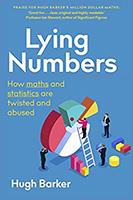 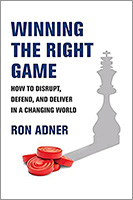 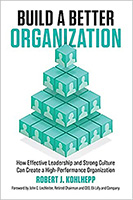
 Build your leadership library with these specials on over 28 titles. All titles are at least 40% off the list price and are available only in limited quantities. “There’s a lot to learn from the right leadership books. If you think you know it, think again. Ask those you trust what books have inspired them, and dig in. Always have at least one book going.” — Kent Taylor, Made From Scratch
Posted by Michael McKinney at 10:13 AM
09.10.21

Elon Musk: In His Own Words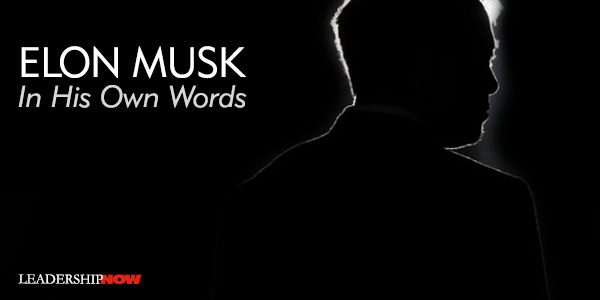
ELON MUSK is a polarizing figure. In part, because he thinks differently than most people. At a 2017 World Government Summit, he once told an audience, “Some people think I’m an alien.” His raw ideas may sound irrational, but in time they seem obvious — even to his critics. Editor Jessica Easto has compiled his thoughts in Elon Musk: In His Own Words. Easto has organized the book into three parts: Getting Started, Growth, and Wit, Wisdom, and Personal Values. Here are several: ☙ I think I would make far fewer mistakes [if I were to go back in time and talk to my 20-year-old self], like, “Here’s a list of all the dumb things you’re about to do. Please do not do them.” It’d be a very long list. ☙ Do you have the right axioms, are they relevant, and are you making the right conclusions based on those axioms? That’s the essence of critical thinking, and yet it is amazing how often people fail to do that. I think wishful thinking is innate in the human brain. You want things to be the way you wish them to be, and so you tend to filter information that you shouldn’t filter. ☙ I do think a good framework for thinking is physics, you know, the first principles reasoning. What I mean by that is boil things down to their fundamental truths and reason up from there as opposed to reasoning by analogy. Through most of our life, we get through life by reasoning by analogy, which essentially means kind of copying what other people do with slight variations. And you have to do that, otherwise mentally you wouldn’t be able to get through the day. But when you want to do something new, you have to apply the physics approach. Physics has really figured out how to discover new things that are counterintuitive, like quantum mechanics; it’s really counterintuitive. ☙ A lot of times people think creating companies is going to be fun. I would say it’s not. It’s really not that fun. There are periods of fun, and there are periods where it’s just awful. Particularly if you’re the CEO of the company, you actually have a distillation of all the worst problems in the company. There’s no point in spending your time on things that are going right, so you only spend your time on things that are going wrong.... I think you have to feel quite compelled to do it and have a fairly high pain threshold. ☙ It’s better to approach this [building a company] from the standpoint of saying—rather than you want to be an entrepreneur or you want to make money—what are some useful things that you do that you wish existed in the world? ☙ Fundamentally, if you don’t have a compelling product at a compelling price, you don’t have a great company. ☙ Things move as fast as the least lucky and least competent supplier. Any natural disaster you care to name—all of those things have happened to our suppliers. The factory has burned down, there’s been an earthquake, there’s been a tsunami, there’s been massive hail, there’s been a tornado, the ship sank, there was a shoot-out at the Mexican border—no kidding. That delayed trunk carpet. ☙ If we don’t succeed, then we will be certainly pointed to as a reason why people shouldn’t even try for these things. So I think it’s important that we do whatever is necessary to keep going. ☙ Always take the position that you are, to some degree, wrong, and your goal is to be less wrong over time. ☙ You should actually take the approach that the constraints that you are given are guaranteed to be some degree wrong.… The counterpoint would be that they're perfect [which is never].... Question your constraints. It does not matter if the person handing you those constraints won a Nobel Prize—even Einstein was wrong some of the time. ☙ I have no problem with negative feedback, nor do I have a problem with critical reviews. If I had a problem with critical reviews, I would spend all my time battling critical reviews. There have been hundreds of negative articles—hundreds—and yet I’ve only spoken out a few times. I don’t have a problem with critical reviews, I have a problem with false reviews. ☙ The first step is to establish that something is possible; then probability will occur. ☙ As you get older, your obligations increase. And once you have a family, you start taking risks not just for yourself but for your family as well. It gets much harder to do things that might not work out. So now is the time to do that—before you have those obligations. I would encourage you to take risks now; do something bold. You won’t regret it. ☙ I just want to emphasize that sometimes—in fact, most of the time—I get way too much credit or attention for what I do. I’m just the visible element. But the reason those companies are successful is because we have extremely talented people at all levels that are making it happen. ☙ Honestly, I really am just trying to do the most amount of good with the time that I have on this earth. And, you know, not always succeeding, but that’s the goal. ☙ Really should be a rule that oatmeal-raisin cookies can’t look too much like choc chip. Doppelgänger cookie trickery! 
Posted by Michael McKinney at 10:47 AM
09.01.21

First Look: Leadership Books for September 2021Here's a look at some of the best leadership books to be released in September 2021. Don't miss out on other great new and future releases not listed here.
In The Art of Statistics, world-renowned statistician David Spiegelhalter shows readers how to derive knowledge from raw data by focusing on the concepts and connections behind the math. Drawing on real world examples to introduce complex issues, he shows us how statistics can help us determine the luckiest passenger on the Titanic, whether a notorious serial killer could have been caught earlier, and if screening for ovarian cancer is beneficial. The Art of Statistics not only shows us how mathematicians have used statistical science to solve these problems — it teaches us how we too can think like statisticians. We learn how to clarify our questions, assumptions, and expectations when approaching a problem, and — perhaps even more importantly -- we learn how to responsibly interpret the answers we receive.
Most organizations have created always-on work contexts that are burning people out and hurting performance rather than delivering productivity, innovation and engagement. Collaborative work consumes 85% of employees' time and is drifting earlier into the morning, later into the night, and deeper into the weekend. The dilemma is that we all need to collaborate more to create effective organizations and vibrant careers for ourselves. But conventional wisdom on teamwork and collaboration has created too much of the wrong kind of collaboration, which hurts our performance, health and overall well-being.
In Provoke: How Leaders Shape the Future by Overcoming Fatal Human Flaws, renowned strategy consultants and best-selling authors Geoff Tuff and Steven Goldbach deliver an insightful exploration of how people tend to act tentatively in the face of uncertainty and provide the tools we need to do things differently. Tuff and Goldbach offer up a compelling argument for the proposition that taking a "wait and see" approach is the exact opposite of what helps visionary leaders change the world. Drawing on principles from business and behavioral economics, the book shows readers from all walks of life how to provoke action as a mechanism to advance.
Your personal goals need a long-term strategy. Just as CEOs who optimize for quarterly profits often fail to make the strategic investments necessary for long-term growth, the same is true in our own personal and professional lives. We need to reorient ourselves to see the big picture so we can tap into the power of small changes that, made today, will have an enormous and disproportionate impact on our future success. We need to start playing The Long Game. Everyone is allotted the same twenty-four hours — but with the right strategies, you can leverage those hours in more efficient and powerful ways than you ever imagined. It's never an overnight process, but the long-term payoff is immense: to finally break out of the frenetic day-to-day routine and transform your life and your career.
For a dozen years as one of the world’s most admired CEOs, Indra Nooyi redefined what it means to be an exceptional leader. The first woman of color and immigrant to run a Fortune 50 company — and one of the foremost strategic thinkers of our time — she transformed PepsiCo with a unique vision, a vigorous pursuit of excellence, and a deep sense of purpose. Now, in a rich memoir brimming with grace, grit, and good humor, My Life in Full offers a firsthand view of Nooyi’s legendary career and the sacrifices it so often demanded.
Iteration rules product development, but it isn’t enough to produce dramatic results. This book champions Radical Product Thinking, a systematic methodology for building visionary, game-changing products. When we iterate without a clear vision or strategy, our products become bloated, fragmented, and driven by irrelevant metrics. They catch “product diseases” that often kill innovation. Radical Product Thinking (RPT) gives organizations a repeatable model for building world-changing products. The key? Being vision-driven instead of iteration-led. Radhika Dutt guides readers through the five elements of the methodology (vision, strategy, prioritization, execution and measurement, and culture) to develop a clear process for translating vision into reality, and turning RPT skills into muscle memory.
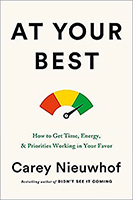 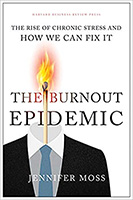 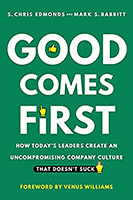
 Build your leadership library with these specials on over 28 titles. All titles are at least 40% off the list price and are available only in limited quantities. “There’s a lot to learn from the right leadership books. If you think you know it, think again. Ask those you trust what books have inspired them, and dig in. Always have at least one book going.” — Kent Taylor, Made From Scratch
Posted by Michael McKinney at 06:36 PM
08.01.21

First Look: Leadership Books for August 2021Here's a look at some of the best leadership books to be released in August 2021. Don't miss out on other great new and future releases not listed here.
Do you wish you could stop the mayhem of work and life and just take a minute? Do you sense you could contribute more if there were a little more room in the day? Does busyness deprive you and your burnt-out team of the oxygen your talents need to catch fire? Many have felt that way, yet taking a pause has seemed impossible—until now. Juliet shows all of us how to reclaim time for thinking and make room for what truly matters. Whether you are an individual trying to build a more sane and humane flow of daily work, a team that wants new levels of efficiency and effectiveness, or an entire organization changing your culture toward thoughtfulness, this book will lead you there.
Will the next rogue wave sink your ship―or will you choose to profit from it? At this moment, rogue waves are forming under your business. Emerging technologies, changing demographics, the data economy, automation, and other trends―the undercurrents of radical, systemic change―are crashing into each other. When they converge, they’ll produce sea changes that sink companies and wash away entire industries overnight. If your competitor can’t ride out the next wave and you can, you win. In Rogue Waves, Jonathan Brill―a renowned expert on resilient growth and decision making under uncertainty―shows you how to prepare your business to survive and thrive through the most radical upheavals.
Discover eight powerful mindset shifts that enable leaders and seekers of all ages to thrive in a time of unprecedented change and uncertainty. Being adaptable and flexible have always been hallmarks of effective leadership and a fulfilling life. But in a world of so much—and faster-paced—change, and an ever-faster pace of change, flexibility and resilience can be stretched to their breaking points. The quest becomes how to find calm and lasting meaning in the midst of enduring chaos. A world in flux calls for a new mindset, one that treats constant change and uncertainty as a feature, not a bug. Flux helps readers open this mindset—a flux mindset—and develop eight “flux superpowers” that flip conventional ideas about leadership, success, and well-being on their heads. They empower people to see change in new ways, craft new responses, and ultimately reshape their relationship to change from the inside out.
Too Proud to Lead provides essential advice on how to avoid that hubristic behavior that can endanger businesses, as well as cope with arrogant overconfidence in others in the workplace. Laying out the dangers of arrogant overconfidence for both individuals and organizations, Too Proud To Lead explores the economic and psychological costs of hubristic behaviour and argues for a new approach to leadership in order to avoid the pitfalls of hubris. The authors reveal exactly how confidence can sour into overconfidence--and why it can happen to anyone. With this easily-absorbed book, packed with checklists and key insights, readers acquire the essential arsenal of tools for understanding, identifying, anticipating and coping with hubris, in both themselves and in the workplace, leading to better lives and sustained success for years to come.
Be energized, but not overwhelmed. What’s the most pressure you’ve ever been under? How did you react? What helped? What didn’t? Over the past five years, Dane Jensen has asked these questions of thousands of high performers—from Olympic gold medalists to Navy SEALs, politicians, executives and busy parents. What has emerged from these conversations is that while everyone’s experiences under pressure are unique, pressure follows patterns and develops in predictable ways. If we can recognize the patterns, we can improve our ability to sidestep the biological traps that can sabotage us—and use the energy that accompanies pressure to thrive.
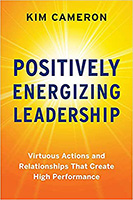 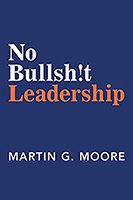 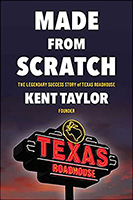
 Build your leadership library with these specials on over 28 titles. All titles are at least 40% off the list price and are available only in limited quantities. “Books are the carriers of civilization. Without books, history is silent, literature dumb, science crippled, thought and speculation at a standstill. Without books, the development of civilization would have been impossible. They are engines of change, windows on the world and lighthouses erected in the sea of time. They are companions, teachers, magicians, bankers of the treasures of the mind. Books are humanity in print.” — Barbara Tuchman
Posted by Michael McKinney at 06:27 AM
07.04.21

10 Books You Should Read This Summer
LIKE HIS MOTHER Rose, John Kennedy believed that reading constituted the most important instrument of knowledge. JFK‘s advisor Ted Sorensen said he read widely on history, biography, and politics. “But he had little interest in abstract theories. He primarily sought truths upon which he could act and ideas he could use in his office.” Reading gives us a chance to reflect on our lives, grow our knowledge, and become more creative. Never threatened by opposing views, Kennedy welcomed new and even controversial perspectives. He stated in the Saturday Review magazine in October 1960: If this nation is to be wise as well as strong, if we are to achieve our destiny, then we need more new ideas for more wise men reading more good books in more public libraries. These libraries should be open to all—except the censor. We must know all the facts and hear all the alternatives and listen to all the criticisms. Let us welcome controversial books and controversial authors. For the Bill of Rights is the guardian of our security as well as our liberty. With a few extra hours of daylight, the summer is an ideal time to relax and read. Listed below are ten books released this year that will entertain, make you think, and improve your leadership. Pick at least three and take some time to make yourself better this summer.*
To think again may make us uncomfortable. But rethinking can also help us find solutions to old problems, deepen our perspective, release us from inherited dogma and other people’s opinions, and understand how our closely held values relate and are applied to our changing environment. As JFK advised in the statement above, our challenge is to listen to others and to rethink those deeply held ideas and beliefs that tend to divide us—especially those ideas that we have blindly accepted from others.
This book discusses seven tests that all leaders face in one form or another. Their goal in writing the book is “to start conversations, not end them, and to provide guidance and frameworks to help refine your thinking and strategies on the aspects of leadership that matter most.”
Wherever there is judgment, there is noise. Noise is a hidden force that clouds our judgment and undermines our decisions. It is variability in judgments that should be identical. We can make better choices by reducing both noise and bias by following the prescriptions offered here.
Change comes most readily when you turn an uphill battle into a downhill one. You will learn methods for identifying and overcoming common barriers to change, such as impulsivity, procrastination, and forgetfulness. This book will help you reshape your environment and improve your trajectory by utilizing fresh starts and cues, building flexible habits, and more.
We are told to work smarter, not harder. Friedman will show you how. By reverse engineering what has worked for others, we can unlock patterns that will work in our own lives. How do you take apart a work you admire, enabling you to extract its formula and unleash your own creative juices?
Baldoni reflects on the practical application of grace. Over the course of the last year, he has collected his thoughts on the response to the pandemic and its implications. These notes touch on many elements of what it means to be a good citizen, a friend, and a leader. A quick read but plenty to meditate on.
Instead of looking for balance, learn to be where your feet are. Finding balance is “like aspiring to be in the middle.” On the other hand, “being present, focused, committed, and hardworking at home and at work is the path to finding success and fulfillment.”
Gladwell asks, “How is it that, sometimes, for any number of unexpected and random reasons, technology slips away from its intended path?” The Bomber Mafia held to their belief. “They persisted, even in the face of technology’s inevitable misdirection, even when abandoning their dream offered a quicker path to victory, even when Satan offered them all the world if only they would renounce their faith. Without persistence, principles are meaningless. Because one day your dream may come true. And if you cannot keep that dream alive in the interim, then who are you?”
When the conversation changes from a discussion of ideas to a battle between good and evil—you’re good they’re bad—then the game changes, and we feel increasingly certain of our own superiority and, at the same time, more and more mystified by the other side. It doesn’t have to be this way. You can rehumanize the other side, restore your curiosity, and break free from outrage.
The pressure is always to have more. So we keep adding more and more. We add tasks, commitments, and possessions while neglecting to subtract any. Ironically, the secret to having more is to subtract. Make a “To Don’t” list. The summer is an excellent time to ask yourself what you could take away to have more. *If you struggle to read or doubt the immense payoff for doing so, you might pick up Jeff Brown and Jesse Wisnewski’s Read to Lead: The Simple Habit That Expands Your Influence and Boosts Your Career (August 2021).
Posted by Michael McKinney at 12:04 AM
07.01.21

First Look: Leadership Books for July 2021Here's a look at some of the best leadership books to be released in July 2021. Don't miss out on other great new and future releases not listed here.
According to a Fortune 500 study, as much as 80% of working time is lost to tiresome meetings, unclear expectations, difficult decisions, and other wasteful delays. Overcoming the lack of clarity behind this waste - on both an individual and organizational basis - would reap huge rewards. In The Power of Clarity, Ann Latham exposes the unrecognized confusion and explains how to eliminate it. This fascinating guide to workplace productivity and effectiveness draws upon extensive research and case studies to demonstrate how you can get better results in far less time while also increasing confidence and commitment.
Trust is, however, an elusive, even mushy, concept. Creating and sustaining trust does not, Sandra Sucher and Shalene Gupta show, come from "reputation-building" and PR but by being the "real deal," creating products, services, and technologies that work, having good intentions, treating people fairly, and taking responsibility for all the impacts an organization creates, whether intended or not. Then, through a framing of how to think through the elements of trust - competence, motives, means, impact - combined with in-depth stories from twenty years of research we emerge with a new understanding of the business, economic and societal importance of trust and how to regain it once lost. How to, in short, bridge the gap from where you are to where you should be.
In Persuade: The 4-Step Process to Influence People and Decisions, accomplished sales, negotiation, and influence experts Andres Lares, Jeff Cochran, and Shaun Digan PhD deliver a concise and insightful take on how to transform your ability to persuade others regardless of the setting. Persuade is perfect for executives, managers, entrepreneurs, and other business leaders and will earn a place in the libraries of any professional who negotiates or influences on a regular basis. It is an invaluable resource for anyone seeking to improve their persuasion or deal-making abilities.
Meritocracy: the idea that people should be advanced according to their talents rather than their birth. While this initially seemed like a novel concept, by the end of the twentieth century it had become the world's ruling ideology. How did this happen, and why is meritocracy now under attack from both right and left? In The Aristocracy of Talent, esteemed journalist and historian Adrian Wooldridge looks outside western cultures and shows what transformative effects it has had everywhere it has been adopted, especially once women were brought into the meritocratic system. He also shows how meritocracy has now become corrupted and argues that the recent stalling of social mobility is the result of failure to complete the meritocratic revolution. Rather than abandoning meritocracy, he says, we should call for its renewal.
When it comes to raising children in a digital world, every parent feels underprepared and overwhelmed. We worry that our children will become addicted to online games, be victims of cyberbullying, or get lost down the rabbit hole of social media. We warn them about all the things they shouldn't do online, but we don't do nearly enough to teach them the skills of digital well-being. It's time to start a new conversation. In Digital for Good, EdTech expert Richard Culatta argues that technology can be a powerful tool for learning, solving humanity's toughest problems, and bringing us closer together. He offers a refreshingly positive framework for preparing kids to be successful in a digital world—one that encourages them to use technology proactively and productively—by outlining five qualities every young person should develop in order to become a thriving, contributing digital citizen.
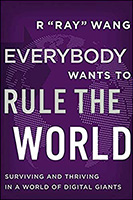 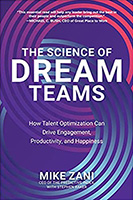 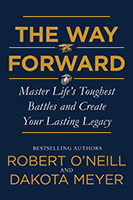
 Build your leadership library with these specials on over 28 titles. All titles are at least 40% off the list price and are available only in limited quantities. “Even when reading is impossible, the presence of books acquired produces such an ecstasy that the buying of more books than one can read is nothing less than the soul reaching towards infinity.” — A. Edward Newton
Posted by Michael McKinney at 02:40 PM
06.01.21

First Look: Leadership Books for June 2021Here's a look at some of the best leadership books to be released in June 2021. Don't miss out on other great new and future releases not listed here.
When we're moving at 115 MPH, we rarely see the wall coming. But it comes for all of us and when it does, we grasp for lessons, for meaning, for purpose. Each moment (good or bad) and each win or loss, provides us an opportunity to learn, and if we choose to take it, that opportunity can change our lives—and the world—for the better. The human spirit craves connection. Authenticity. Belonging. Touch. Gratitude. Purpose. We need to make our interactions count. Whether it's the death of a friend, loss of a job, a bad break-up, or the isolation of Covid-19, those who manage to be where their feet are will grow, stretch and emerge stronger, smarter, and more prepared as we find peace and gratitude in the pause. In Be Where Your Feet Are, this CEO of the Philadelphia 76ers and New Jersey Devils offers his own story of grief and healing, and shares his most valuable lessons in what keeps him present, grounded, and thriving as a father, husband, coach, mentor, and leader.
Transform your organization with speed and efficiency using this insightful new resource. Incremental improvement is no longer sufficient in helping organizations navigate the complexity, uncertainty and volatility of today’s world. In Change: How Organizations Achieve Hard-to-Imagine Results in Uncertain and Volatile Times, authors John P. Kotter, Vanessa Akhtar, and Gaurav Gupta explore how to create non-linear, dramatic change in your organization. You’ll discover the emerging science of change that teaches us about how to build organizations – from businesses to governments – that change and adapt rapidly.
In his career as an executive at IBM, Cisco, and now as CEO of Anaplan, Frank A. Calderoni discovered that character is just as vital for companies as it is for individuals. In Upstanding: How Company Character Catalyzes Loyalty, Agility, and Hypergrowth, the author explores the powerful link between corporate strategy, company culture, and individual character, and how activating this link is essential to realizing strong company character—and an essential ingredient for organizations to achieve hypergrowth, agility, and loyalty. This innovative resource features real-life examples of how today’s most successful companies are building upstanding character while increasing employee engagement, happiness, and performance.
In Japan it's called the "Ghosn Shock"—the stunning arrest of Carlos Ghosn, the jet-setting CEO who saved Nissan and made it part of a global automotive empire. Ghosn spent two decades building a colossal partnership between Nissan and Renault that looked like a new model for a global business, but the alliance's shiny image fronted an unsteady, tense operation. Culture clashes, infighting among executives and engineers, dueling corporate traditions, and government maneuvering constantly threatened the venture. Expertly reported, Collision Course explores the complex suspicions around what and who was really responsible for Ghosn's ouster. It explains how economics, history, national interests, cultural politics, and hubris collided, crumpling the legacy of arguably the most important foreign businessman ever to set foot in Japan.
For years, companies have been implementing programs that promote social responsibility and improve employee health, both of which benefit the financial bottom line. Now it’s time to focus on positive social interactions and relationships in the workplace. In Work Better Together, two experts from Deloitte explain how working remotely, over-relying on digital communication, and always being “on” is fast-increasing feelings of isolation and burnout―and how a work culture driven by quality relationships can reverse these trends. Work Better Together walks you through the process of implementing change and fueling a much-needed corporate movement towards humanity in the workplace.
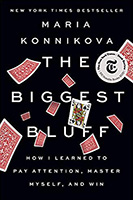 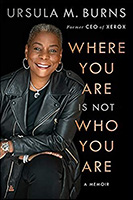 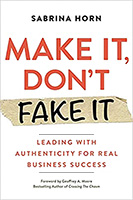
 Build your leadership library with these specials on over 28 titles. All titles are at least 40% off the list price and are available only in limited quantities. “Even when reading is impossible, the presence of books acquired produces such an ecstasy that the buying of more books than one can read is nothing less than the soul reaching towards infinity.” — A. Edward Newton
Posted by Michael McKinney at 08:22 AM
05.01.21

First Look: Leadership Books for May 2021Here's a look at some of the best leadership books to be released in May 2021. Don't miss out on other great new and future releases not listed here.
Have you ever dreaded Sunday night, got a pit in your stomach on the way to work, or had your heartbeat speed up at the sound of your boss’s voice? If so, you may have had anxiety at work. In this empathetic and wise guide, executive coaches and gurus of gratitude Adrian Gostick and Chester Elton explore the causes of workplace stress and anxiety and the management practices that have proven successful in reducing tension and cultivating calm. In today’s volatile, fast-paced, and ever-changing global climate, organizations and their employees are under more pressure than ever to perform. Anxiety at Work shows how everyone at all levels can work together to build an environment that fosters camaraderie, productivity, and calm.
What if the next global crisis is a mental health pandemic? It is here now. One-third of Americans have shown signs of clinical anxiety or depression, and the current state of suffering globally has risen significantly. The mental health pandemic manifests everywhere, not least in your workplace. As organizations around the world face health and social crises, as well as economic uncertainty, acknowledging and improving wellbeing in your workplace is more critical than ever. Increasingly, leaders and managers must support mental health and cultivate resilience in employees — not just increase engagement and performance. Based on more than 100 million Gallup global interviews, Wellbeing at Work shows you how to do just that.
Almost ten years ago, Bloomberg journalist Brad Stone captured the rise of Amazon in his bestseller The Everything Store. Since then, Amazon has expanded exponentially, inventing novel products like Alexa and disrupting countless industries, while its workforce has quintupled in size and its valuation has soared to well over a trillion dollars. Jeff Bezos’s empire, once housed in a garage, now spans the globe. Between services like Whole Foods, Prime Video, and Amazon’s cloud computing unit, AWS, plus Bezos’s ownership of The Washington Post, it’s impossible to go a day without encountering its impact. We live in a world run, supplied, and controlled by Amazon and its iconoclast founder. Definitive, timely, and revelatory, Stone has provided an unvarnished portrait of a man and company that we couldn’t imagine modern life without.
The definitive guide to communicating and connecting in a hybrid world. Humans rely on body language to connect and build trust, but with most of our communication happening from behind a screen, traditional body language signals are no longer visible -- or are they? In Digital Body Language, Erica Dhawan, a go-to thought leader on collaboration and a passionate communication junkie, combines cutting edge research with engaging storytelling to decode the new signals and cues that have replaced traditional body language across genders, generations, and culture. In real life, we lean in, uncross our arms, smile, nod and make eye contact to show we listen and care. Online, reading carefully is the new listening. Writing clearly is the new empathy. And a phone or video call is worth a thousand emails. Digital Body Language will turn your daily misunderstandings into a set of collectively understood laws that foster connection, no matter the distance. Dhawan investigates a wide array of exchanges―from large conferences and video meetings to daily emails, texts, IMs, and conference calls―and offers insights and solutions to build trust and clarity to anyone in our ever changing world.
An all-in-one resource for every working mother and father. Sure, there are plenty of parenting books out there. But as working moms and dads, we've never had a trusted, go-to guide all our own—one that coaches us on how to do well at work, be the loving and engaged parents we want to be, and remain true to ourselves in the process. Enter Workparent. Whether you're planning a family, pushing for promotion during your kids' teenage years, or at any phase in between, Workparent provides all the advice and assurance you'll need to combine children and career in your own, authentic way. Written by Daisy Dowling, a top executive coach, talent expert, and working mom, Workparent answers all of your questions and feels like a good talk with your favorite mentor.
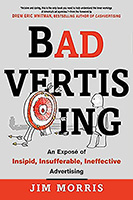 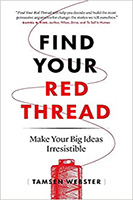 
 Build your leadership library with these specials on over 28 titles. All titles are at least 40% off the list price and are available only in limited quantities. “The great thing is to be always reading but never get bored—treat it not like work, more as a vice.” — C. S. Lewis
Posted by Michael McKinney at 07:12 AM
04.01.21

First Look: Leadership Books for April 2021Here's a look at some of the best leadership books to be released in April 2021. Don't miss out on other great new and future releases not listed here.
The old ways of creating competitive advantage for your business—such as building moats to ward off competitors—have become dangerous. Giants like Amazon and Alibaba are creating vast new market spaces through a deft combination of tools like machine learning and business savvy that reimagines customer experiences while generating immense shareholder value. A handful of traditional companies, including Fidelity Investments, Walmart, and B2W, have adopted these new approaches to reinvigorate their businesses. Most, however, are stalled—and the clock is running out. In this lively, accessible guide, Ram Charan, bestselling author and adviser to some of the world’s top CEOs and boards, redefines competitive advantage for the digital-first era, offering a set of new rules to get ahead.
Overthinking isn't a personality trait. It's the sneakiest form of fear. It steals time, creativity, and goals. It's the most expensive, least productive thing companies invest in without even knowing it. And it's an epidemic. When New York Times bestselling author Jon Acuff changed his life by transforming his overthinking, he wondered if other people might benefit from what he discovered. He commissioned a research study to ask 10,000 people if they struggle with overthinking too, and 99.5 percent said, "Yes!" The good news is that in Soundtracks, Acuff offers a proven plan to change overthinking from a super problem into a superpower.
When it comes to what we believe, humans see what they want to see. In other words, we have what Julia Galef calls a "soldier" mindset. From tribalism and wishful thinking, to rationalizing in our personal lives and everything in between, we are driven to defend the ideas we most want to believe--and shoot down those we don't. But if we want to get things right more often, argues Galef, we should train ourselves to have a "scout" mindset. Unlike the soldier, a scout's goal isn't to defend one side over the other. It's to go out, survey the territory, and come back with as accurate a map as possible. Regardless of what they hope to be the case, above all, the scout wants to know what's actually true.
As high achievers, we’ve been conditioned to believe that the path to success is paved with relentless work. That if we want to overachieve, we have to overexert, overthink, and overdo. That if we aren’t perpetually exhausted, we’re not doing enough. But lately, working hard is more exhausting than ever. And the more depleted we get, the more effort it takes to make progress. Stuck in an endless loop of “Zoom, eat, sleep, repeat,” we’re often working twice as hard to achieve half as much. Getting ahead doesn’t have to be as hard as we make it. No matter what challenges or obstacles we face, there is a better way: instead of pushing ourselves harder, we can find an easier path. Effortless offers actionable advice for making the most essential activities the easiest ones, so you can achieve the results you want, without burning out.
When we are baffled by the insanity of the “other side”—in our politics, at work, or at home—it’s because we aren’t seeing how the conflict itself has taken over. That’s what “high conflict” does. It’s the invisible hand of our time. And it’s different from the useful friction of healthy conflict. That’s good conflict, and it’s a necessary force that pushes us to be better people. High conflict, by contrast, is what happens when discord distills into a good-versus-evil kind of feud, the kind with an us and a them. In this state, the normal rules of engagement no longer apply. The brain behaves differently. We feel increasingly certain of our own superiority and, at the same time, more and more mystified by the other side. Ripley investigates how good people get captured by high conflict—and how they break free.
 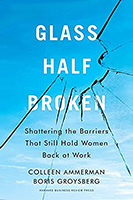 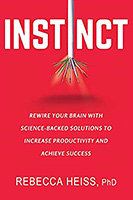
 Build your leadership library with these specials on over 28 titles. All titles are at least 40% off the list price and are available only in limited quantities. “The great thing is to be always reading but never get bored—treat it not like work, more as a vice.” — C. S. Lewis
Posted by Michael McKinney at 08:00 AM
03.01.21

First Look: Leadership Books for March 2021Here's a look at some of the best leadership books to be released in March 2021. Don't miss out on other great new and future releases not listed here.
Are you ready to lead? Will you pass the test? The CEO Test is the authoritative, no-nonsense insider's guide to navigating leadership's toughest challenges, brought to you by authors uniquely qualified to tell the stories. Adam Bryant has conducted in-depth interviews with more than 600 CEOs. Kevin Sharer spent more than two decades as president and then CEO of Amgen, where he led its expansion from $1 billion in annual revenues to nearly $16 billion. He has served on many boards and is a sought-after mentor for CEOs of global companies. Leadership is getting harder as the speed of disruption across all industries accelerates. The CEO Test will better prepare you to succeed, whether you're a CEO or just setting out to become one.
Modern knowledge workers communicate constantly. Their days are defined by a relentless barrage of incoming messages and back-and-forth digital conversations--a state of constant, anxious chatter in which nobody can disconnect, and so nobody has the cognitive bandwidth to perform substantive work. There was a time when tools like email felt cutting edge, but a thorough review of current evidence reveals that the "hyperactive hive mind" workflow they helped create has become a productivity disaster, reducing profitability and perhaps even slowing overall economic growth. Equally worrisome, it makes us miserable. Humans are simply not wired for constant digital communication. The question is not whether a world without email is coming (it is), but whether you'll be ahead of this trend. A World Without Email will convince you that the time has come for bold changes, and will walk you through exactly how to make them happen.
Burnout has become one of the most talked about workplace topics, and its impact is far-reaching. The 24/7 pace of work, constant demands, and scant resources can easily put busy professionals on a path to burnout, a cycle that has only accelerated during the COVID-19 pandemic. Burnout affects the health and well-being of the entire organization, yet most attempts to help focus on quick-fix strategies aimed at individuals. Something is missing. Davis’s research-driven, fast-reading, and actionable book is the first of its kind to explore a new solution to the burnout problem at work: a comprehensive approach focused on building the resilience of teams of all sizes.
Why do startups fail? That question caught Harvard Business School professor Tom Eisenmann by surprise when he realized he couldn’t answer it. So he launched a multiyear research project to find out. In Why Startups Fail, Eisenmann reveals his findings: six distinct patterns that account for the vast majority of startup failures. Drawing on fascinating stories of ventures that failed to fulfill their early promise—from a home-furnishings retailer to a concierge dog-walking service, from a dating app to the inventor of a sophisticated social robot, from a fashion brand to a startup deploying a vast network of charging stations for electric vehicles—Eisenmann offers frameworks for detecting when a venture is vulnerable to these patterns, along with a wealth of strategies and tactics for avoiding them.
The Eight Pillars of Trust (Clarity, Compassion, Character, Competency, Commitment, Connection, Contribution, and Consistency) are based on Horsager's original research and extensive experience working with Fortune 500 companies and top government agencies around the globe. In addition to the business parable, this book is rich in practical advice for implementing each of the Eight Pillars. You will learn strategies to increase alignment, overcome attrition, and get absolutely clear on executing your top priorities. Horsager offers a road map for how to become the most trusted expert in your industry.
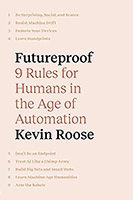 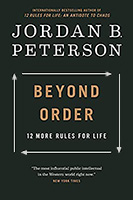 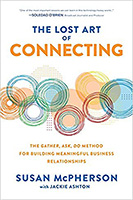
 Build your leadership library with these specials on over 28 titles. All titles are at least 40% off the list price and are available only in limited quantities. “The great thing is to be always reading but never get bored—treat it not like work, more as a vice.” — C. S. Lewis
Posted by Michael McKinney at 07:46 AM
02.01.21

First Look: Leadership Books for February 2021Here's a look at some of the best leadership books to be released in February 2021. Don't miss out on other great new and future releases not listed here.
Intelligence is usually seen as the ability to think and learn, but in a rapidly changing world, there's another set of cognitive skills that might matter more: the ability to rethink and unlearn. In our daily lives, too many of us favor the comfort of conviction over the discomfort of doubt. We listen to opinions that make us feel good, instead of ideas that make us think hard. We see disagreement as a threat to our egos, rather than an opportunity to learn. We surround ourselves with people who agree with our conclusions, when we should be gravitating toward those who challenge our thought process. Think Again reveals that we don't have to believe everything we think or internalize everything we feel. It's an invitation to let go of views that are no longer serving us well and prize mental flexibility over foolish consistency. If knowledge is power, knowing what we don't know is wisdom.
An inspiring and practical look inside the mind of Bill Novelli, one of the founders of social marketing, Good Business challenges all of us to change the world for the better and is a blueprint for tackling today's critical issues. Throughout the book, Novelli argues that you can make a positive social difference regardless of what business you are in or where you are in your career. Readers will come away with the message that anyone who wants to have a positive impact on the world can do it right now from where they are―or can be inspired by Novelli's story to make the leap to somewhere they can.
For the first time in American history, a significant number of mothers are heading major corporations, including General Motors, Ulta Beauty, and Best Buy. Over the past several decades, women have made gains throughout executive suites. Yet these “Power Moms” still struggle with balancing their management responsibilities with raising children. Joann S. Lublin draws on the experiences of the nation’s two generations of these successful women to measure how far we’ve come—and how far we still need to go.
For most people, conflict triggers a fight or flight response. Disagreeing productively is a hard skill for which neither evolution or society has equipped us. It’s a skill we urgently need to acquire; otherwise, our increasingly vociferous disagreements are destined to tear us apart. Productive disagreement is a way of thinking, perhaps the best one we have. It makes us smarter and more creative, and it can even bring us closer together. It’s critical to the success of any shared enterprise, from a marriage, to a business, to a democracy. Isn’t it time we gave more thought to how to do it well?
A memoir of successful leadership in times of crisis: the former CEO of General Electric, named one of the “World’s Best CEOs” three times by Barron’s, shares the hard-won lessons he learned from his experience leading GE immediately after 9/11, through the economic devastation of the 2008–09 financial crisis, and into an increasingly globalized world. In Hot Seat, Immelt offers a rigorous, candid interrogation of himself and his tenure, detailing for the first time his proudest moments and his biggest mistakes. The most crucial component of leadership, he writes, is the willingness to make decisions. But knowing what to do is a thousand times easier than knowing when to do it. Perseverance, combined with clear communication, can ensure progress, if not perfection, he says. As the business world continues to be rocked by stunning economic upheaval, Hot Seat is an urgently needed, and unusually raw, source of authoritative guidance for decisive leadership in uncertain times.
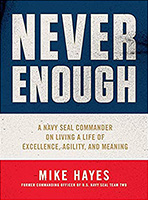 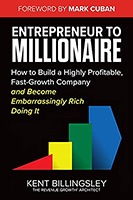 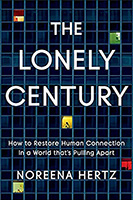
 Build your leadership library with these specials on over 28 titles. All titles are at least 40% off the list price and are available only in limited quantities. “Compare the difference between the life of a man who does no reading and that of a man who does. The man who has not the habit of reading is imprisoned in his immediate world, in respect to time and space. His life falls into a set routine; he is limited to contact and conversation with a few friends and acquaintances, and he sees only what happens in his immediate neighborhood. From this prison there is no escape.” — Lin Yutang, The Importance of Living
Posted by Michael McKinney at 08:49 AM
01.01.21

First Look: Leadership Books for January 2021Here's a look at some of the best leadership books to be released in January 2021. Don't miss out on other great new and future releases not listed here.
A global security expert draws on psychological insights to help you master the art of social engineering—human hacking. Make friends, influence people, and leave them feeling better for having met you by being more empathetic, generous, and kind. Christopher Hadnagy shows you how to use social engineering as a force for good—to help you regain your confidence and control. Human Hacking provides tools that will help you establish rapport with strangers, use body language and verbal cues to your advantage, steer conversations and influence other’s decisions, and protect yourself from manipulators. Ultimately, you’ll become far more self-aware about how you’re presenting yourself—and able to use it to improve your life.
In Rebel Ideas, Syed argues that our brainpower as individuals isn't enough. To tackle problems from climate change to economic decline, we'll need to employ the power of "cognitive diversity." Drawing on psychology, genetics, and beyond, Syed uses real-world scenarios including the failings of the CIA before 9/11 and a communication disaster at the peak of Mount Everest to introduce us to the true power of thinking differently. Rebel Ideas will strengthen any kind of team, while including advice on how, as individuals, we can embrace the potential of an "outsider mind-set" as our greatest asset.
It’s undeniable that we’re entering a new era of remote work. While many leaders seek to run business as usual, why settle for the usual when remote teams allow us to work even better? The research shows that employees are more productive and engaged when they have the freedom to work from anywhere. Which means leaders need the skills to lead from anywhere. In this meticulously researched, refreshingly practical book, top business thought leader David Burkus provides managers with the field guide to leading remotely, packed with everyday examples and illuminating insights.
Even before the coronavirus hit, remote work was growing at nearly 30 percent per year, and now it's just a fact of life. There are many millions of people who once worked at a central location every day who now find themselves facing an entirely new way of working. Written by the founders of the Remote Leadership Institute, this book is the most authoritative single resource for helping remote workers get work done effectively, build relationships that are both productive and satisfying, and maintain a career trajectory when they are not in constant close contact with their leader, coworkers, or the organization in general. The Long-Distance Teammate tackles three important issues: navigating the personal and interpersonal, growing the skills to be productive, and communicating effectively--all from a distance.
We see poverty, homelessness, violence, mental illness, corruption, and the breakdown of the family, and we think, Why doesn’t somebody do something? The institutions we’ve depended on aren’t making the world a better place the way we thought they could and should. So now it’s up to us. The good news is, YOU can change your world. In this book, John Maxwell and Rob Hoskins guide you through the entire process. These two leaders have been making a positive impact for decades, transforming millions of lives, communities, and businesses around the world with a sense of mission and regard for human dignity. And whether you influence only one other person or you’re the leader of a large organization, you too can bring about positive, lasting change.
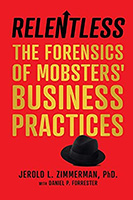 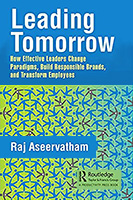 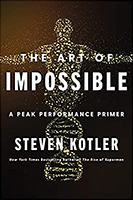
 Build your leadership library with these specials on over 28 titles. All titles are at least 40% off the list price and are available only in limited quantities. “Compare the difference between the life of a man who does no reading and that of a man who does. The man who has not the habit of reading is imprisoned in his immediate world, in respect to time and space. His life falls into a set routine; he is limited to contact and conversation with a few friends and acquaintances, and he sees only what happens in his immediate neighborhood. From this prison there is no escape.” — Lin Yutang, The Importance of Living
Posted by Michael McKinney at 12:02 AM
12.07.20

The Best Leadership Books of 2020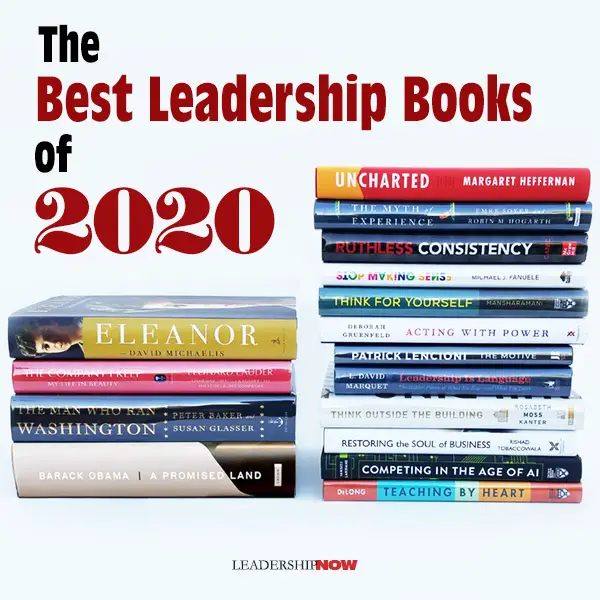
2020 has tested us. It has illuminated our strengths and exposed our vulnerabilities. It has called on us to reinvent and transform. It has called on us to learn to think better. In the list below, you will find resources to help you do just that—think better. Certainty is out. Complexity is in. We can’t repeat our experiences, but we can extract the lessons and principles and apply them to the changing circumstances of our non-linear world. The more we use technology and outsourced thinking, we diminish our ability to think for ourselves. Common sense no longer helps us connect the dots. Other people’s agenda becomes our narrative. Patrick Lencioni asks the most fundamental question of all: Why are you leading? Too many lead for the sake of position and power and what that entitles them to. Gruenfeld reminds us that we have more power than we think no matter where we are in life. All of the resources below are designed to help us think better and therefore perform better as leaders and guides.
(Harvard Business Review Press, 2020)
(Harvard Business School Press, 2020)
(HarperCollins Leadership, 2020)
(PublicAffairs, 2020)
(Portfolio, 2020)
(Jossey-Bass, 2020)
(Currency, 2020)
(Harvard Business School Press, 2020)
(Post Hill Press, 2020)
(Simon & Schuster, 2020)
(McGraw-Hill Education, 2020)
(PublicAffairs, 2020)
Biographies:
(Harper Business, 2020)
(Doubleday, 2020)
(Simon & Schuster, 2020)
Posted by Michael McKinney at 12:02 AM
12.01.20

First Look: Leadership Books for December 2020Here's a look at some of the best leadership books to be released in December 2020. Don't miss out on other great new and future releases not listed here.
Smart new technologies. Longer, healthier lives. Human progress has risen to great heights, but at the same time it has prompted anxiety about where we're heading. Are our jobs under threat? If we live to 100, will we ever really stop working? And how will this change the way we love, manage and learn from others? One thing is clear: advances in technology have not been matched by the necessary innovation to our social structures. In our era of unprecedented change, we haven't yet discovered new ways of living. Drawing from the fields of economics and psychology, Scott and Gratton offer a simple framework based on three fundamental principles (Narrate, Explore and Relate) to give you the tools to navigate the challenges ahead. Both a personal road-map and a primer for governments, corporations and colleges, The New Long Life is the essential guide to a longer, smarter, happier life.
Highly respected Silicon Valley turn-around expert Thomas L. Steding presents his proven leadership process for achieving peak performance by accessing the untapped/unseen intelligence of deep imagination as well as the superior creativity and intelligence of the connected team. Thomas Steding has seen first-hand that the leadership skills that can take an organization from poor to peak performance and outdistancing its competition were not taught in business schools or management seminars or even a part of the leadership conversation. Real Teams Win is the culmination of Steding's four decades of high-impact methods that offer real change from within the organization with real results that work really fast.
Triumph over adversity using proven Special Operations habits and mindsets with this inspiring guide from retired Navy SEAL and New York Times bestselling author Jason Redman. Adversity can often catch you by surprise and leave you struggling with what to do next. What if you could confront any adversity, from the biggest challenges—the loss of your job, divorce, health issues, bankruptcy—to normal daily challenges—a late flight, a disappointing phone call, a missed promotion, a bad day—and not just survive it, but thrive afterwards?
What is it about the top tech product companies such as Amazon, Apple, Google, Netflix and Tesla that enables their record of consistent innovation? Most people think it’s because these companies are somehow able to find and attract a level of talent that makes this innovation possible. But the real advantage these companies have is not so much who they hire, but rather how they enable their people to work together to solve hard problems and create extraordinary products.
During the brutal crucible of Navy SEAL training, instructors often tell students to "embrace the suck." This phrase conveys the one lesson that is vital for any SEAL hopeful to learn: lean into the suffering and get comfortable being very uncomfortable. In this powerful, no-nonsense guide, Navy SEAL combat veteran turned leadership expert Brent Gleeson teaches you how to transform every area of your life--the Navy SEAL way. Embrace the Suck provides an actionable roadmap that empowers you to expand your comfort zone to live a more fulfilling, purpose-driven life. Through candid storytelling, behavioral science research, and plenty of self-deprecating humor, Gleeson shows you how to use pain as a pathway, reassess your values, remove temptation, build discipline, suffer with purpose, fail successfully, transform your mind, and achieve more of the goals you set
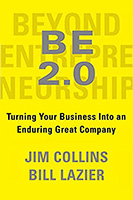 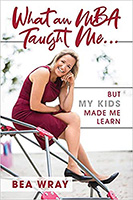 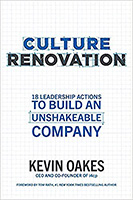
 Build your leadership library with these specials on over 28 titles. All titles are at least 40% off the list price and are available only in limited quantities. “Compare the difference between the life of a man who does no reading and that of a man who does. The man who has not the habit of reading is imprisoned in his immediate world, in respect to time and space. His life falls into a set routine; he is limited to contact and conversation with a few friends and acquaintances, and he sees only what happens in his immediate neighborhood. From this prison there is no escape.” — Lin Yutang, The Importance of Living
Posted by Michael McKinney at 12:10 AM
11.01.20

First Look: Leadership Books for November 2020Here's a look at some of the best leadership books to be released in November 2020. Don't miss out on other great new and future releases not listed here.
Align, part 1 of a 3-part series, shares four simple steps that transforms the way leaders lead and renew their self-confidence. Through the process Align offers, leaders develop the courage to connect with their team in a meaningful way and start winning together. Through Align, leaders will learn to create alignment within their organization and develop a culture built on employee fulfillment. It shows leaders exactly how to get there.
Creative work doesn't come with a guarantee. But there is a pattern to who succeeds and who doesn't. And engaging in the consistent practice of its pursuit is the best way forward. Based on the breakthrough Akimbo workshop pioneered by legendary author Seth Godin, The Practice will help you get unstuck and find the courage to make and share creative work. Godin insists that writer's block is a myth, that consistency is far more important than authenticity, and that experiencing the imposter syndrome is a sign that you're a well-adjusted human. Most of all, he shows you what it takes to turn your passion from a private distraction to a productive contribution, the one you've been seeking to share all along.
A guide to understanding and overcoming bias in the workplace, from the experts at FranklinCovey. Unconscious bias affects everyone. Ideal for every manager who wants to understand and move past their own preconceived ideas, The Leader’s Guide to Unconscious Bias explains that bias is the result of mental shortcuts, our likes and dislikes, and is a natural part of the human condition. And what we assume about each other and how we interact with one another has vast effects on our organizational success—especially in the workplace. Teaching you how to overcome unconscious bias, this book provides more than thirty unique tools, such as a prep worksheet and a list of ways to reframe your unconscious thoughts.
Civility Rules! offers an opportunity to learn about the history, substance, and significance of civility through the lens of George Washington’s “Rules of Civility.” Drawing on personal experience, real-life examples, and a foundational belief that civility is integral to a democratic society, author Shelby Scarbrough shares how we might work toward a more perfect union by building a personal practice of civility. Civility is not an archaic concept of manners and politeness but rather a crucial component of a functioning democracy. Shelby shows us how―with conscientious practice and patience―we can each contribute to the preservation of our democracy, one interaction at a time.
In Jeff Bezos's own words, the core principles and philosophy that have guided him in creating, building, and leading Amazon and Blue Origin. In this collection of Jeff Bezos's writings—his unique and strikingly original annual shareholder letters, plus numerous speeches and interviews that provide insight into his background, his work, and the evolution of his ideas—you'll gain an insider's view of the why and how of his success. Spanning a range of topics across business and public policy, from innovation and customer obsession to climate change and outer space, this book provides a rare glimpse into how Bezos thinks about the world and where the future might take us.
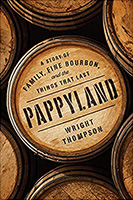 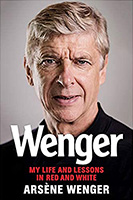 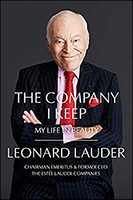
 Build your leadership library with these specials on over 32 titles. All titles are at least 40% off the list price and are available only in limited quantities. “Reading is the nourishment that lets you do interesting work.” — Jennifer Egan
Posted by Michael McKinney at 07:21 AM
10.01.20

First Look: Leadership Books for October 2020Here's a look at some of the best leadership books to be released in October 2020. Don't miss out on other great new and future releases not listed here.
In the modern workplace, employees collaborate. Managers are expected to be effective team leaders and employees are expected to be valued teammates. But many teams struggle. Being part of a struggling team can be unpleasant, but it can also hurt your career and waste company resources. In Teams That Work, Tannenbaum and Salas present the seven drivers of team effectiveness and the clearest recommendations on what really makes teams great. Applying the lessons they've learned from working with high-stakes, high-risk team situations to any kind of organization, they will dispel some of the most enduring myths (e.g., can you be both a star and a great team player?), feature the most useful psychological research, and share real-world illustrations of effective teams in action. Readers will find actionable, evidence-based tips for being an effective team leader, a great team member, a supportive senior leader, or an impactful consultant.
There's an 80 percent chance you're poor. Time poor, that is. Four out of five adults report feeling that they have too much to do and not enough time to do it. These time-poor people experience less joy each day. They laugh less. They are less healthy, less productive, and more likely to divorce. In one study, time stress produced a stronger negative effect on happiness than unemployment. How can we escape the time traps that make us feel this way and keep us from living our best lives? Time Smart is your playbook for taking back the time you lose to mindless tasks and unfulfilling chores. Author and Harvard Business School professor Ashley Whillans will give you proven strategies for improving your "time affluence."
What drives us to unleash our best work? And how do we tap into that drive to get superior results with our managers, coworkers, and direct reports? As Todd Henry reveals in this book, drawing on decades of research and interviews with over 100,000 people, the answer is not one size fits all: some people are energized by a race against the clock, while others put in extra effort only when they feel part of a team. For still others, nothing is as motivating as the possibility of public recognition. Henry shows, in fact, that there are twenty-seven "motivational themes”, each with its own unique DNA. The Motivation Code teaches us to decode our Core Motivation so that we can have conversations, make decisions, and even choose career paths that lead us to experience engagement and fulfillment.
Among the most successful leaders throughout history―from Abe Lincoln to Rosa Parks, Mahatma Gandhi to Susan B. Anthony, Martin Luther King, Jr. to Nelson Mandela―some were brilliant mathematicians and economists, others were creative visionaries, still others were masterful at strategic planning. Their mastery of their field wasn’t the secret to their highly effective leadership. All of their skill, grit, resilience, charisma, and courage emanated from one thing: their strength of character. In The Character Edge the authors leverage their perspectives to offer an empowering, story-driven argument―backed by the latest scientific research―that character is vital to success.
Leaders have experimented with open innovation programs, corporate accelerators, venture capital arms, skunkworks, and innovation contests. They've trekked to Silicon Valley, Shenzhen, and Tel Aviv to learn from today's hottest, most successful tech companies. Yet most would admit they've failed to create truly innovative cultures. There's a better way. And it all starts with the power of habit. In Eat, Sleep, Innovate, uses groundbreaking research in behavioral science to provide a first-of-its-kind playbook for empowering individuals and teams to be their most curious and creative—every single day. Throughout the book, the authors reveal a collection of BEANs—behavior enablers, artifacts, and nudges—they've collected from workplaces across the globe that will unleash the natural innovator inside everyone.
Among our greatest leaders are those driven by impulses they cannot completely control - by lust. Lust is not, however, an abstraction, it has definition. Definition that, given the impact of leaders who lust, is essential to extract. This book identifies six types of lust with which leaders are linked: 1. Power: the ceaseless craving to control. 2. Money: the limitless desire to accrue great wealth. 3. Sex: the constant hunt for sexual gratification. 4. Success: the unstoppable need to achieve. 5. Legitimacy: the tireless claim to identity and equity. 6. Legacy: the endless quest to leave a permanent imprint. Each of the core chapters focuses on different lusts and features a cast of characters who bring lust to life.
 Build your leadership library with these specials on over 32 titles. All titles are at least 40% off the list price and are available only in limited quantities. “Reading is the nourishment that lets you do interesting work.” — Jennifer Egan
Posted by Michael McKinney at 07:41 AM
09.01.20

First Look: Leadership Books for September 2020Here's a look at some of the best leadership books to be released in September 2020. Don't miss out on other great new and future releases not listed here.
The Digital Age will raise the question of how we humans will stay relevant in the workplace. To stay relevant, we have to be able to excel cognitively, behaviorally, and emotionally in ways that technology can't. Professor Ed Hess believes that requires us to become Hyper-Learners: continuously learning, unlearning, and relearning at the speed of change. To do that, we have to overcome our reflexive ways of being: seeking confirmation of what we believe, emotionally defending our beliefs and our ego, and seeking cohesiveness of our mental models. Hyper-Learning requires a new way of being and a radical new way of working.
Our personal experience is key to who we are and what we do. We judge others by their experience and are judged by ours. Society venerates experience. From doctors to teachers to managers to presidents, the more experience the better. It's not surprising then, that we often fall back on experience when making decisions, an easy way to make judgements about the future, a constant teacher that provides clear lessons. Yet, this intuitive reliance on experience is misplaced. In The Myth of Experience, behavioral scientists Emre Soyer and Robin Hogarth take a transformative look at experience and the many ways it deceives and misleads us. From distorting the past to limiting creativity to reducing happiness, experience can cause misperceptions and then reinforce them without our awareness. Instead, the authors argue for a nuanced approach, where a healthy skepticism toward the lessons of experience results in more reliable decisions and sustainable growth.
At age nineteen, Shannon Huffman Polson became the youngest woman ever to climb Denali, the highest mountain in North America. She went on to reach the summits of Mt. Rainier and Mt. Kilimanjaro and spent more than a decade traveling the world. Yet it was during her experience serving as one of the Army's first female attack helicopter pilots, and eventually leading an Apache flight platoon on deployment to Bosnia-Herzegovina, that she learned the lessons of leadership that forever changed her life. Where did these insights come from? From her own crucibles of experience—and from other women. In writing The Grit Factor, Polson made it her mission to connect with an elite pack of tough, impressive female iconoclasts who shared with her their candid stories of combat and career. With its gripping narrative and relatable takeaways, The Grit Factor is both inspiring and pragmatic, a book that will energize and enlighten current and aspiring leaders everywhere—whether male or female.
On the most fundamental level, leaders must bring divergent groups together and forge a consensus on a path forward. But what makes that possible? Humility—a deep regard for the dignity of others—is the key, says distinguished leadership educator Marilyn Gist. Leadership is a relationship, and humility is the foundation for all healthy relationships. Leader humility can increase engagement and retention. It inspires and motivates. Gist offers a model of leader humility derived from three questions people ask of their leaders: Who are you? Where are we going? Do you see me? She explores each of these questions in depth, as well as the six key qualities of leader humility: a balanced ego, integrity, a compelling vision, ethical strategies, generous inclusion, and a developmental focus.
Here for the first time, Hastings and Erin Meyer, bestselling author of The Culture Map and one of the world’s most influential business thinkers, dive deep into the controversial ideologies at the heart of the Netflix psyche, which have generated results that are the envy of the business world. Drawing on hundreds of interviews with current and past Netflix employees from around the globe and never-before-told stories of trial and error from Hastings’s own career, No Rules Rules is the fascinating and untold account of the philosophy behind one of the world’s most innovative, imaginative, and successful companies.
Whether you’re an employer, an employee, a freelancer, or part of a management team, it’s important to understand how—now, more than ever—highly skilled 10x talent who can deliver exponential value is radically shifting the dynamics of corporations large and small. Use this groundbreaking book to learn how to identify, attract, vet, employ, manage, and retain—or become—the game-changing talent that will make a difference in the work world of tomorrow. Individuals, companies and governments around the globe need to understand what tactics are required to survive and thrive in an increasingly global, automated, and post pandemic, distributed economy. The lessons presented in Game Changer reveal those tactics for any industry.
 Build your leadership library with these specials on over 32 titles. All titles are at least 40% off the list price and are available only in limited quantities. “Reading is the nourishment that lets you do interesting work.” — Jennifer Egan
Posted by Michael McKinney at 07:12 AM
08.01.20

First Look: Leadership Books for August 2020Here's a look at some of the best leadership books to be released in August 2020. Don't miss out on other great new and future releases not listed here.
Creativity isn’t a “nice to have” leadership trait. It’s the key to success in every workplace and all industries. Learn to access yours, now―even if you don’t think you’re a “creative” person. From B-school through the big leagues, the business world often places value on logic and analysis. But on creativity? Not so much. And this, according to Nir Bashan, is a recipe for disaster. What gets the ball rolling when we’re feeling stuck in our careers? Why is my company not growing or reaching higher levels of profitability? What’s the difference between a workable plan and a stroke of genius? The answer is creativity―and it’s the missing ingredient for far too many of us who feel we’re not reaching our creative potential (or doubt we have it in the first place).
Bullshit isn’t what it used to be. Now, two science professors give us the tools to dismantle misinformation and think clearly in a world of fake news and bad data. Misinformation, disinformation, and fake news abound and it’s increasingly difficult to know what’s true. Our media environment has become hyperpartisan. Science is conducted by press release. Startup culture elevates bullshit to high art. We are fairly well equipped to spot the sort of old-school bullshit that is based in fancy rhetoric and weasel words, but most of us don’t feel qualified to challenge the avalanche of new-school bullshit presented in the language of math, science, or statistics. In Calling Bullshit, Professors Carl Bergstrom and Jevin West give us a set of powerful tools to cut through the most intimidating data.
Why do so many organizations, teams, couples, families, and groups who should be working together end up wasting energy on unproductive conflict? Even when everyone has the same general goals, what’s often missing is a deeper alignment based on mutual trust, respect, and empathy. With Radical Alignment, top-level life and business coaches (and happily married couple) Alexandra Jamieson and Bob Gower share their potent method for helping groups to stop clashing and start working together―to jump from “we can’t” to an enthusiastic “hell yes!” The essential tool at the heart of Radical Alignment is the All-In Method: a four-step approach to communication designed to increase clarity, minimize miscommunication, honor each person’s individuality, and build a shared sense of trust and respect for long-term success.
A groundbreaking look at the science of learning—how it's transforming education and how we can use it to discover our true potential, as individuals and across society by a renowned MIT professor. As the head of Open Learning at MIT, Sanjay Sarma has a daunting job description: to fling open the doors of the MIT experience for the benefit of the wider world. But if you're going to undertake such an ambitious project, it behooves you to ask: How exactly does learning work? What conditions are most conducive? Are our traditional classroom methods—lecture, homework, test, repeat—actually effective? And if not, which techniques are? Along the way, Sarma debunks long-held views (such as the noxious idea of "learning styles"), while equipping readers with a set of practical tools for absorbing and retaining information across a lifetime. He presents a vision for learning that's more inclusive and democratic—revealing a world bursting with powerful learners, just waiting for the chance they deserve.
In Humanocracy, Gary Hamel and Michele Zanini make a passionate, data-driven argument for excising bureaucracy and replacing it with something better. Drawing on more than a decade of research and packed with practical examples, Humanocracy lays out a detailed blueprint for creating organizations that are as inspired and ingenious as the human beings inside them. Whatever your role or title, Humanocracy will show you how to launch an unstoppable movement to equip and empower everyone in your organization to be their best and to do their best. The ultimate prize: an organization that's fit for the future and fit for human beings.
The world is changing drastically before our eyes―will you be prepared for what comes next? A groundbreaking analysis from one of the world's foremost experts on global trends, including analysis on how COVID-19 will amplify and accelerate each of these changes. Once upon a time, the world was neatly divided into prosperous and backward economies. Babies were plentiful, workers outnumbered retirees, and people aspiring towards the middle class yearned to own homes and cars. Companies didn't need to see any further than Europe and the United States to do well. Printed money was legal tender for all debts, public and private. We grew up learning how to "play the game," and we expected the rules to remain the same as we took our first job, started a family, saw our children grow up, and went into retirement with our finances secure. That world―and those rules―are over.
 Build your leadership library with these specials on over 32 titles. All titles are at least 40% off the list price and are available only in limited quantities. “Reading is the nourishment that lets you do interesting work.” — Jennifer Egan
07.01.20

First Look: Leadership Books for July 2020Here's a look at some of the best leadership books to be released in July 2020. Don't miss out on other great new and future releases.
This book describes how 25 outstanding leaders used emotional intelligence to deal with critical challenges and opportunities. Featuring commentary from the leaders themselves describing how they handled each situation, it helps managers better understand not just what emotional intelligence is, or how to measure it, or how it is linked to bottom-line results: it also shows how real leaders used their emotional intelligence to deal with real situations. The book distills the leaders' experiences into nine strategies that can help any leader or potential leader to be more effective. Each chapter concludes with activities that help readers to apply immediately each of those strategies.
Before Silicon Valley disrupted the world with new technologies and business models, America’s industrial giants paved the way. Companies like General Electric, United Technologies, and Caterpillar were the Google and Amazon of their day, setting gold standards in innovation, growth, and profitability. Today’s leaders can learn a great deal from their successes, as well as their missteps. In this essential guide, three veteran Wall Street analysts reveal timeless lessons from the titans of industry―and offer battle-tested survival tactics for an ever-changing world.
These days, whenever anything spreads, whether it's a YouTube fad or a political rumor, we say it went viral. But how does virality actually work? In The Rules of Contagion, epidemiologist Adam Kucharski explores topics including gun violence, online manipulation, and, of course, outbreaks of disease to show how much we get wrong about contagion, and how astonishing the real science is. Whether you are an author seeking an audience, a defender of truth, or simply someone interested in human social behavior, The Rules of Contagion is an essential guide to modern life.
In this game-changing yet practical book, talent guru and bestselling author Bruce Tulgan reveals the secrets of the go-to person in our new world of work. Based on an intensive study of people at all levels, in all kinds of organizations, Tulgan shows how go-to people think and behave differently, building up their influence with others—not by trying to do everything for everybody but by doing the right things at the right times for the right reasons, regardless of whether they have the formal authority.
Becoming a courageous culture means building teams of microinnovators, problem solvers, and customer advocates working together. A microinnovator is the employee who consistently seeks out small, but powerful, ways to improve the business. A problem solver is the employee who cares about what’s not working and wants to make it better. They uncover and speak openly about what’s not working and think critically about how to fix it. A customer advocate is the employee who sees through your customers’ eyes and speaks up on their behalf. They actively look for ways to improve customers’ experience and minimize customer frustrations.
Extraordinary leaders share a passionate commitment to achieving their vision that borders and sometimes crosses the line into obsession. All In shows why obsession, if properly focused and managed, is both necessary and productive. Advances in any endeavor almost always depend on a small group of individuals who are completely consumed by the goal they're pursuing. When these leaders and teams are successful, everyone benefits from their obsessive nature. Shaw also provides insight into the dark side of obsession and its destructive potential. Appealing to any reader of entrepreneurial biographies, All In shows individuals, teams and organizations how to manage obsession's downsides while realizing the benefits of relentlessly seeking to create something that truly matters.
 Build your leadership library with these specials on over 32 titles. All titles are at least 40% off the list price and are available only in limited quantities. “Reading is the nourishment that lets you do interesting work.” — Jennifer Egan
Posted by Michael McKinney at 06:31 AM
06.01.20

First Look: Leadership Books for June 2020Here's a look at some of the best leadership books to be released in June 2020. Don't miss out on other great new and future releases.
Leadership isn't easy. It takes grit, courage, and vision, among other things, that can be hard to come by on your toughest days. When leaders and aspiring leaders seek out advice, they're often told to try harder. Dig deeper. Look in the mirror and own your natural-born strengths and fix any real or perceived career-limiting deficiencies. Frances Frei and Anne Morriss offer a different worldview. They argue that this popular leadership advice glosses over the most important thing you do as a leader: build others up. Leadership isn't about you. It's about how effective you are at empowering other people—and making sure this impact endures even in your absence. As Frei and Morriss show through inspiring stories from ancient Rome to present-day Silicon Valley, the origins of great leadership are found, paradoxically, not in worrying about your own status and advancement, but in the unrelenting focus on other people's potential.
Budding entrepreneurs face a challenging road. The path is not made any easier by all the clichés they hear about how to make a startup succeed―from platitudes and conventional wisdom to downright contradictions. This witty and wise guide to the dilemmas of entrepreneurship debunks widespread misconceptions about how the world of startups works and offers hard-earned advice for every step of the journey. Instead of startup myths―legends spun from a fantasy version of Silicon Valley―Rizwan Virk provides startup models―frameworks that help make thoughtful decisions about starting, growing, managing, and selling a business. Rather than dispensing simplistic rules, he mentors readers in the development of a mental toolkit for approaching challenges based on how startup markets evolve in real life.
Have you ever followed your GPS device to a deserted parking lot? Or unquestioningly followed the advice of an expert—perhaps a doctor or financial adviser—only to learn later that your own thoughts and doubts were correct? And what about the stories we've all heard over the years about sick patients—whether infected with Ebola or COVID-19—who were sent home or allowed to travel because busy staff people were following a protocol to the letter rather than using common sense? Why and how do these kinds of things happen? As Harvard lecturer and global trend watcher Vikram Mansharamani shows in this eye-opening and perspective-shifting book, our complex, data-flooded world has made us ever more reliant on experts, protocols, and technology. Too often, we've stopped thinking for ourselves. Mansharamani illustrates how in a very real sense we have outsourced our thinking to a troubling degree, relinquishing our autonomy.
In Strategy First, Brad Chase, the mind behind some of Microsoft’s largest and most successful initiatives, explains why building robust strategies is the imperative to business success. Chase leads readers through his easy-to-use strategy model, Strategy = E x mc2, which teaches readers the art of strategy—how to build and execute winning strategies relative to the competition. To supplement the model, Chase provides 5 key tips to strategy prosperity and over 50 examples from a broad range of businesses that help the reader think about how they can use his Strategy First toolkit. The author will inspire readers to examine the effectiveness of their current strategies, using the model that has served him in his distinguished career.
Accountable Leaders is the real-world guide to propelling your business to extraordinary levels of performance and achievement. Leadership accountability is a major issue in organizations around the globe. Research has shown that teams and individual employees are overwhelmingly dissatisfied with the degree of accountability demonstrated by their leaders. Effective teams need responsible and accountable leaders―the solution seems simple. Yet, thousands of businesses are struggling with mediocre performance and widening gaps in leadership. This essential resource provides practical and no-nonsense strategies to transform any organization into a cohesive, highly motivated culture of accountable leaders and fully committed teams.
Short-termism is rampant among executives and managers today, causing many companies to underperform and even go out of business. With competition intense and investors demanding strong quarterly gains now, leaders all too often feel obliged to sacrifice the investments so necessary for long-term growth. Dave Cote is intimately familiar with this problem. Upon becoming Honeywell’s CEO in 2002, he encountered an organization on the verge of failure, thanks to years of untrammeled short-termism. To turn the company around, he and his team adopted a series of bold operational reforms and counterintuitive leadership practices that enabled them to “do two conflicting things at the same time”--pursue strong short- and long-term results. The outcome was phenomenal.
 Build your leadership library with these specials on over 32 titles. All titles are at least 40% off the list price and are available only in limited quantities. “There is more treasure in books than in all the pirate’s loot on Treasure Island.” — Walt Disney
Posted by Michael McKinney at 06:09 PM
05.01.20

First Look: Leadership Books for May 2020Here's a look at some of the best leadership books to be released in May 2020. Don't miss out on other great new and future releases.
“Mindsets” is a word that is used quite frequently, however, many of those who use it are unaware that mindsets are foundational to and dictate one’s success in life, work, and leadership. They are also unable to identify specific mindsets that are necessary for success. Ryan Gottfredson has created a comprehensive and research-based guide, Success Mindsets, that is designed to awaken readers to: the power of mindsets, the four mindsets they need to have to be successful, and the mindsets they currently possess through personal mindset assessment
Jeff Bezos is the business story of the decade. Bezos, the richest man on the planet, has built one of the most efficient wealth-creation machines in history with 2% of US household income being spent on nearly 500 million products shipped from warehouses in seventeen countries. Amazon’s business model has not only turned the retail industry and cloud computing inside out, but now its tentacles are squeezing media and advertising, and disrupting the state of technology, the economy, job creation, and society at large. Amazon’s impact is so pervasive that business leaders in nearly every sector around the world need to understand how this force of nature operates. Based on unprecedented behind-the-scenes reporting from 150 sources inside and outside of Amazon, Bezonomics unveils the underlying principles Jeff Bezos uses to achieve his dominance—customer obsession, extreme innovation, and long-term management, all supported by artificial intelligence—and shows how these are being borrowed and replicated by companies across the United States, in China, and elsewhere. Brian Dumaine shares tips for Amazon-proofing your business. Most important, Bezonomics answers the fundamental question: How are Amazon and its imitators affecting the way we live, and what can we learn from them?
Decades of research demonstrates that we often have an over-inflated sense of self and are rarely as good as we believe. Perfectly Confident is the first book to bring together the best psychological and economic studies to explain exactly what confidence is, when it can be helpful, and when it can be destructive in our lives. Moore reminds us that the key to success is to avoid being both over- and under-confident. In this essential guide, he shows how to become perfectly confident—how to strive for and maintain the well-calibrated, adaptive confidence that can elevate all areas of our lives..
Matt Ridley argues in this book that we need to change the way we think about innovation, to see it as an incremental, bottom-up, fortuitous process that happens to society as a direct result of the human habit of exchange, rather than an orderly, top-down process developing according to a plan. Innovation is crucially different from invention, because it is the turning of inventions into things of practical and affordable use to people. It speeds up in some sectors and slows down in others. It is always a collective, collaborative phenomenon, not a matter of lonely genius. It is gradual, serendipitous, recombinant, inexorable, contagious, experimental and unpredictable. It happens mainly in just a few parts of the world at any one time. It still cannot be modelled properly by economists, but it can easily be discouraged by politicians. Far from there being too much innovation, we may be on the brink of an innovation famine.
When external pressures are mounting, and employees are working from far-flung locations across the globe, says bestselling author Keith Ferrazzi, we can no longer afford to waste time navigating the complex chains of command or bureaucratic bottlenecks present in most companies. But when we choose the bold new methodology of co-elevation as our operating model, we unlock the potential to boost productivity, deepen commitment and engagement, and create a level of trust, mutual accountability, and purpose that exceeds what could have been accomplished under the status quo. And you don’t need any formal authority to do it. You simply have to marshal a commitment to a shared mission and care about the success and development of others as much as you care about your own. Regardless of your title, position, or where or how you work, the ability to lead without authority is an essential workplace competency.
In this clear-eyed, indispensable book, Bain & Company thought leader Darrell Rigby and his colleagues Sarah Elk and Steve Berez provide a much-needed reality check. They dispel the myths and misconceptions that have accompanied agile's rise to prominence--the idea that it can reshape an organization all at once, for instance, or that it should be used in every function and for all types of work. They illustrate that agile teams can indeed be powerful, making people's jobs more rewarding and turbocharging innovation, but such results are possible only if the method is fully understood and implemented the right way.
 Build your leadership library with these specials on over 32 titles. All titles are at least 40% off the list price and are available only in limited quantities. “There is more treasure in books than in all the pirate’s loot on Treasure Island.” — Walt Disney
Posted by Michael McKinney at 07:16 AM
04.01.20

First Look: Leadership Books for April 2020Here's a look at some of the best leadership books to be released in April 2020. Don't miss out on other great new and future releases.
Many leaders see their roles as presiders/managers, with a primary focus on keeping results consistent with past performance and on budget. These kinds of leaders make important contributions but rarely leave a mark on the businesses they serve. For those wanting to make a lasting impact, new skills are required. They need to learn to launch new initiatives, inspire others, and champion innovative approaches. Joel Peterson calls these higher-level leaders “entrepreneurial leaders,” and they create durable enterprises that deliver on their promise. Peterson lays out a path to achieving this summit, with a series of leadership maps organized around the four essential basecamps on the path to Entrepreneurial Leadership:
A former rocket scientist reveals the habits, ideas, and strategies that will empower you to turn the seemingly impossible into the possible. Rocket science is often celebrated as the ultimate triumph of technology. But it's not. Rather, it's the apex of a certain thought process—a way to imagine the unimaginable and solve the unsolvable. It's the same thought process that enabled Neil Armstrong to take his giant leap for mankind, that allows spacecraft to travel millions of miles through outer space and land on a precise spot, and that brings us closer to colonizing other planets. Fortunately, you don't have to be a rocket scientist to think like one. In this accessible and practical book, Ozan Varol reveals nine simple strategies from rocket science that you can use to make your own giant leaps in work and life.
The definitive book on leadership in the digital era: why digital technologies call for leadership that emphasizes creativity, collaboration, and inclusivity. Certain ideas about business leadership are held to be timeless, and certain characteristics of leaders―often including a square jaw, a deep voice, and extroversion―are said to be universal. Amit Mukherjee argues that since digital technologies are changing everything else, how could they not change leadership ideologies and styles? As more people worldwide participate equally in business, those assumptions of a leader's ideal profile have become irrelevant. Offering a radical rethinking of leadership, Mukherjee shows why digital technologies call for a new kind of leader―one who emphasizes creativity, collaboration, and inclusivity.
Leading futurist Bob Johansen shows how a new way of thinking, enhanced by new technologies, will help leaders break free of limiting labels and see new gradients of possibility in a chaotic world. The future will get even more perplexing over the next decade, and we are not ready. The dilemma is that we're restricted by rigid categorical thinking that freezes people and organizations in neatly defined boxes that often are inaccurate or obsolete. Categories lead us toward certainty but away from clarity, and categorical thinking moves us away from understanding the bigger picture. Sticking with this old way of thinking and seeing isn't just foolish, it's dangerous. Full-spectrum thinking is the ability to seek patterns and clarity outside, across, beyond, or maybe even without any boxes or categories while resisting false certainty and simplistic binary choices. It reveals our commonalities that are hidden in plain view.
Innosight's Mark W. Johnson and Josh Suskewicz introduce a new way of thinking and managing, called "future-back," that enables any manager to become a practical visionary. Addressing the many barriers to change that exist in established organizations, they present a systematic approach to overcoming them that includes: The principles and mind-set that allow leadership teams to look beyond typical short-term planning horizons / A method for turning emerging challenges into the growth opportunities that can define an organization's future / A step-by-step approach for translating a vision into a strategic plan that teams can align around and commit to / Ways to ensure that visionary thinking becomes a repeatable organizational capability
We're often told that we're living amidst a startup boom. Typically, we think of apps built by college kids and funded by venture capital firms, which remake fortunes and economies overnight. But in reality, most new businesses are things like restaurants or hair salons. Entrepreneurs aren't all millennials—more often, it's their parents. And those small companies are the fabric of our economy. This book is the real story of entrepreneurship. It confronts both success and failure, and shows how they can change a human life. It captures the inherent freedom that entrepreneurship brings, and why it matters.
 Build your leadership library with these specials on over 32 titles. All titles are at least 40% off the list price and are available only in limited quantities. “There is more treasure in books than in all the pirate’s loot on Treasure Island.” — Walt Disney
Posted by Michael McKinney at 08:16 AM
03.01.20

First Look: Leadership Books for March 2020Here's a look at some of the best leadership books to be released in March 2020. Don't miss out on other great new and future releases.
Everyone has something they want to change. Marketers want to change their customers’ minds and leaders want to change organizations. Start-ups want to change industries and nonprofits want to change the world. But change is hard. Often, we persuade and pressure and push, but nothing moves. Could there be a better way? This book takes a different approach. Successful change agents know it’s not about pushing harder, or providing more information, it’s about being a catalyst. Catalysts remove roadblocks and reduce the barriers to change. Instead of asking, “How could I change someone’s mind?” they ask a different question: “Why haven’t they changed already? What’s stopping them?”
So often in life, we get stuck in a cycle of response. We put out fires. We deal with emergencies. We stay downstream, handling one problem after another, but we never make our way upstream to fix the systems that caused the problems. Cops chase robbers, doctors treat patients with chronic illnesses, and call-center reps address customer complaints. But many crimes, chronic illnesses, and customer complaints are preventable. So why do our efforts skew so heavily toward reaction rather than prevention? Upstream probes the psychological forces that push us downstream—including “problem blindness,” which can leave us oblivious to serious problems in our midst.
Workers want and need to know their work is appreciated. Showing gratitude to employees is the easiest, fastest, most inexpensive way to boost performance. New research shows that gratitude boosts employee engagement, reduces turnover, and leads team members to express more gratitude to one another—strengthening team bonds. Studies have also shown that gratitude is beneficial for those expressing it and is one of the most powerful variables in predicting a person’s overall well-being—above money, health, and optimism.
In 1984, Doug Conant was fired without warning and with barely an explanation. He felt hopeless and stuck but, surprisingly, this defeating turn of events turned out to be the best thing that ever happened to him. Doug began to consider what might be holding him back from realizing his potential, fulfilling his dreams, and making a bigger impact on the world around him. Embarking on a journey of self-reflection and discovery, he forged a path to revolutionize his leadership and transform his career trajectory. Ultimately, Doug was able to condense his remarkable leadership story into six practical steps. It wasn't until Doug worked through these six steps that he was able to lift his leadership to heights that ultimately brought him career success, joy, and fulfillment.
Parents in today's fast-paced, disorienting world can easily lose track of who they are and what really matters most. But it doesn't have to be this way. As a parent, you can harness the powerful science of leadership in order to thrive in all aspects of your life. Drawing on the principles of his book Total Leadership—a bestseller and popular leadership development program used in organizations worldwide--and on their experience as researchers, educators, consultants, coaches, and parents, Stew Friedman and coauthor Alyssa Westring offer a robust, proven method that will help you gain a greater sense of purpose and control.
What potential is so close within your grasp? What are you actually capable of? Create the Future teaches you how to think disruptively, providing specific steps to create real innovation and change. It combines Jeremy's high energy provocative thinking with tactics that have been battle tested through projects with leading innovators like Disney, Starbucks, Amex, IBM, Adidas, Google, and NASA. Better yet, this is a double-sided book. Create the Future is paired with a revised edition of Jeremy's award-winning innovation handbook, Exploiting Chaos.
 Build your leadership library with these specials on over 39 titles. All titles are at least 40% off the list price and are available only in limited quantities. “There is more treasure in books than in all the pirate’s loot on Treasure Island.” — Walt Disney
Posted by Michael McKinney at 11:37 AM
02.01.20

First Look: Leadership Books for February 2020Here's a look at some of the best leadership books to be released in February 2020. Don't miss out on other great new and future releases.
Life is not what you get out of it . . . it's what you put back in. Yet our current means for summarizing life's work, from resumes to salaries, are devoid of what matters most. This is why the work we do is often bad for our wellbeing, when it should be making us happier and healthier. What are the most meaningful contributions we can make? This is Life's Great Question. Life is about what you do that improves the world around you. It is about investing in the development of other people. And it is about efforts that will continue to grow when you are gone. Life's Great Question will show you how to make your work and life more meaningful, and greatly boost your wellbeing. In this remarkably quick read, author Tom Rath describes how finding your greatest contribution is far more effective than following talent or passion alone.
As the most trusted mental coach in the world of sports, Trevor Moawad has worked with many of the most dominant athletes and the savviest coaches. From Nick Saban and Kirby Smart to Russell Wilson, they all look to Moawad for help finding or keeping or regaining their competitive edge. (As do countless business leaders and members of special forces.) Moawad's motivational approach is elegant but refreshingly simple: He replaces hardwired negativity, the kind of defeatist mindset that's nearly everybody's default, with what he calls "neutral thinking." His own special innovation, it's a nonjudgmental, nonreactive way of coolly assessing problems and analyzing crises, a mode of attack that offers luminous clarity and supreme calm in the critical moments before taking decisive action. Not only can neutral thinking raise your performance level-it can transform your overall life.
When it comes to improving customer experiences, trying out new business models, or developing new products, even the most experienced managers often get it wrong. They discover that intuition, experience, and big data alone don't work. What does? Running disciplined business experiments. And what if companies roll out new products or introduce new customer experiences without running these experiments? They fly blind. That's what Harvard Business School professor Stefan Thomke shows in this rigorously researched and eye-opening book. It guides you through best practices in business experimentation, illustrates how these practices work at leading companies, and answers some fundamental questions: What makes a good experiment? How do you test in online and brick-and-mortar businesses? In B2B and B2C? How do you build an experimentation culture?
Most businesses identify six key digital technologies―artificial intelligence (AI), distributed ledgers and blockchain, the Internet of Things (IoT), autonomous machines, virtual and augmented reality, and 5G communication―as critical to their relevance and growth over the coming ten years. These new disruptive technologies present significant opportunity for businesses in every industry. The first businesses to understand automation and these transformative technologies will be the ones to reap the greatest rewards in the marketplace. The Innovation Ultimatum helps leaders understand the key technologies poised to reshape business in the next decade and prepare their organizations for technology-enabled change. Using straightforward, jargon-free language, this important resource provides a set of strategic questions every leader will need to ask and answer in order to prepare for the impending changes to the business landscape.
When it comes to setting and meeting goals, we may see—quite literally—our plans, our progress, and our potential in the wrong ways. We perceive ourselves as being closer to or further from the end than we may actually be depending on our frame of reference. We handicap ourselves by looking too often at the big picture and at other times too long at the fine detail. But as award-winning social psychologist Emily Balcetis explains, there is great power in these misperceptions. We can learn to leverage perceptual illusions if we know when and how to use them to our advantage. A mind-blowing and original tour of perception, Clearer, Closer, Better will help you see the possibilities in what you can’t see now. Inspiring, motivating, and always entertaining, it demonstrates that if we take advantage of our visual experiences, they can lead us to live happier, healthier, and more productive lives every day.
New York Times best-selling author Patrick Lencioni has written a dozen books that focus on how leaders can build teams and lead organizations. In The Motive, he shifts his attention toward helping them understand the importance of why they’re leading in the first place. In what may be his edgiest page-turner to date, Lencioni thrusts his readers into a day-long conversation between rival CEOs. Shay Davis is the CEO of Golden Gate Alarm, who, after just a year in his role, is beginning to worry about his job and is desperate to figure out how to turn things around. With nowhere else to turn, Shay receives some hard-to-swallow advice from the most unlikely and unwanted source―Liam Alcott, CEO of a more successful security company and his most hated opponent. Lencioni uses unexpected plot twists and crisp dialogue to take us on a journey that culminates in a resolution that is as unexpected as it is enlightening.
 Build your leadership library with these specials on over 39 titles. All titles are at least 40% off the list price and are available only in limited quantities. “The man who does not read good books is no better than the man who can’t.” — Mark Twain
Posted by Michael McKinney at 05:42 PM
01.01.20

First Look: Leadership Books for January 2020Here's a look at some of the best leadership books to be released in January 2020. Don't miss out on other great new and future releases.
Teaching by Heart summarizes the author's key insights gained from more than forty years of teaching and managing. It illustrates how teachers can both lift people up and let them down. It proposes that the best teachers are also leaders, and the best leaders are also teachers. In examining how to lead and teach, renowned Harvard Business School professor Thomas J. DeLong takes the reader inside his own head and heart. He notes that, as teachers, we often focus more on our inadequacies and missteps than on our strengths and unique talents. He explains why this is so by dissecting and analyzing his own experiences--using himself as a case study. The book's goal is to help readers learn about the intricacies of teaching and managing, and to impart lessons about how teachers can create a unique teaching atmosphere. To do this, the author analyzes the process of creating a curriculum, preparing for an eighty-minute class, managing the fifteen minutes before class begins, and evaluating the nature of the teaching experience after the session concludes.
A set of tools for mastering the one skill standing between us and success: the ability to ask for the things we need to succeed. Studies show that asking for help makes us better and less frustrated at our jobs. It helps us find new opportunities and new talent. It unlocks new ideas and solutions, and enhances team performance. And it helps us get the things we need outside the workplace as well. And yet, we rarely give ourselves permission to ask. Luckily, the research shows that asking—and getting—what we need is much easier than we tend to think.
One of the leading business thinkers in the world offers a bold, new theory of advanced leadership for tackling the world's complex, messy, and recalcitrant social and environmental problems. When traditional approaches are inadequate or resisted, advanced leadership skills are essential. In this book, Kanter shows how people everywhere can unleash their creativity and entrepreneurial adroitness to mobilize partners across challenging cultural, social, and political situations and innovate for a brighter future.
What is the greatest return on a leader’s time? After leaders have invested in their own leadership growth, what is the best way to accomplish their vision and grow their organizations? Develop leaders! The more leaders an organization has and the better equipped they are to lead, the more successful the organization and all of its leaders. In The Leader’s Greatest Return, Maxwell shares the most important lessons he’s learned about the leadership development process over the last quarter century.
Laura Huang, a preeminent Harvard Business School professor, shows that success is about gaining an edge: that elusive quality that gives you an upper hand and attracts attention and support. Some people seem to naturally have it. Now, Huang teaches the rest of us how to create our own from the challenges and biases we think hold us back, and turning them to work in our favor. In Edge, Huang offers a different approach. She argues that success is rarely just about the quality of our ideas, credentials, and skills, or our effort. Instead, achieving success hinges on how well we shape others' perceptions--of our strengths, certainly, but also our flaws. It's about creating our own edge by confronting the factors that seem like shortcomings and turning them into assets that make others take notice.
Are you a future-ready leader? Based on exclusive interviews with over 140 of the world's top CEOs and a survey of nearly 14,000 people. Do you have the right mindsets and skills to be able to lead effectively in the next ten years and beyond? Most individuals and organizations don’t even know what leadership will look like in the future. Until now. The majority of the world's top business leaders that Jacob interviewed believe that while some core aspects of leadership will remain the same, such as creating a vision and executing on strategy, leaders of the future will need a new arsenal of skills and mindsets to succeed.
 Build your leadership library with these specials on over 39 titles. All titles are at least 40% off the list price and are available only in limited quantities. “The more that you read, the more things you will know. The more you learn, the more places you’ll go.” — Theodore Geisel (aka Dr. Seuss)
Posted by Michael McKinney at 12:00 AM
12.13.19

The Best Leadership Books of 2019LEADERSHIP development is a lifelong process. It is made possible with a quality that we spend a lifetime acquiring: self-awareness. People don’t experience our intentions; they experience our behavior. It is a theme that runs through most of these titles. Books like Helping People Change and The Power of Bad, have the power to change forever how we work with others and address the things that hold us back. Grace is a tough concept to sell in today’s environment. Grace looks at the bigger picture. It is not primarily concerned for the self. It does not rejoice in the downfall of others. It does not seek its own way. It is outwardly focused. We marginalize others when we insist on our rightness. The need for an outward focus is the underlying conclusion of these titles. The biographies on this list are more than mere memoirs. They all provide insights into leading and how others have tried to make sense of the world. They all share their methods, their successes and failures, and the lessons they learned. Biographies provide, like no other genre, roadmaps and guardrails in a context that makes them relevant for our own lives. It’s like having a mentor guide your journey. When we get our thinking right, the success comes almost automatically.
(Page Two, 2019)
(Indigo River Publishing, 2019)
(Rodale Books, 2019)
(HarperCollins Leadership, 2019)
(Penguin Press, 2019)
(Portfolo, 2019)
(HarperCollins Leadership, 2019)
(Harvard Business Review Press, 2019)
(PublicAffairs, 2019)
(Riverhead Books, 2019)
(CenterPoint Publishing, 2019)
(Currency, 2019)
(TarcherPerigee, 2019) by Amy Jen Su (Harvard Business Review Press, 2019)
Biographies:
(Baker Books, 2019)
(Random House, 2019)
(Random House, 2019)
(Greenleaf Book Group Press, 2019)
(Simon & Schuster, 2019)
(Little, Brown and Company, 2019)
Posted by Michael McKinney at 06:57 AM
12.01.19

First Look: Leadership Books for December 2019Here's a look at some of the best leadership books to be released in December 2019. Don't miss out on other great new and future releases.
Mark Hannum reveals the evidence-based secrets that surfaced from vast data Linkage has collected on leadership effectiveness. He details the five commitments that the best leaders make to themselves and their organizations: Inspire others to join the pursuit of a common vision, Engage every team member to contribute their best abilities, Innovate key products or processes that lead to the goal, Achieve results by organizing people and aligning resources, Become more self-aware and courageous as a leader.
Both enlightening and entertaining, Dr Max Mckeown delivers concise advice on how to move from original insights to new ideas, and from new ideas to valuable real-world innovation. You’ll learn how to increase creativity, understand the psychology of thinking differently, encourage collaboration, co-create with customers, overcome indifference, create an idea-hungry culture, rid yourself of creativity zombies and get to innovation paradise.
Adversity can often catch you by surprise and leave you struggling with what to do next. What if you could confront any adversity, from the biggest challenges-the loss of your job, divorce, health issues, bankruptcy-to normal daily challenges-a late flight, a disappointing phone call, a missed promotion, a bad day-and not just survive it, but thrive afterwards? Redman was horrifically wounded in Iraq in 2007 when he was shot at close range through the face and arm. After 40 surgeries, including extensive facial reconstruction and skin grafts, he came back from this experience stronger than ever-despite carrying scars and injuries he will have for the rest of his life. Redman went on to launch two successful companies and speaks all over the country on how to build better leaders through his Overcome mindset.
Amazon’s trillion-dollar success is the envy of everyone, but achievable by anyone. What has propelled their record streak of growth? Their management system, and it can do the same for you no matter what business you are in or what level. Learning it is as simple as six building blocks: Customer-Obsessed Business Model, Continuous Bar-Raising Talent Pool, AI-Powered Data & Metrics System, Ground-Breaking Invention Machine, High-Velocity & High-Quality Decision-Making, A forever Day 1 culture. Whether you are an established CEO or a recent college grad, this concise and actionable book will help your business win in a new digital era that demands nonstop innovation.
The intent of this book—the author's goal for you—is to understand the baseless underpinnings of almost all our fears. We are far better at dealing with external, tangible fears than our own imagined ones. It’s time to realize there is no monster under the bed, never has been, and never will be without having to check nightly and without needing a weapon on the night table. Picture yourself freed of restraints that you could never properly articulate and were loath to discuss, but which you carried on your shoulders constantly, a dead weight, nonetheless. Essentially, this book is for entrepreneurs, business owners, and those who seek a better position for themselves and their talents, but who procrastinate, delay, and hang back.
Why are we devastated by a word of criticism even when it’s mixed with lavish praise? Because our brains are wired to focus on the bad. This negativity effect explains things great and small: why countries blunder into disastrous wars, why couples divorce, why people flub job interviews, how schools fail students, why football coaches stupidly punt on fourth down. All day long, the power of bad governs people’s moods, drives marketing campaigns, and dominates news and politics. But once we recognize our negativity bias, the rational brain can overcome the power of bad when it’s harmful and employ that power when it’s beneficial. In fact, bad breaks and bad feelings create the most powerful incentives to become smarter and stronger. Properly understood, bad can be put to perfectly good use.
 Build your leadership library with these specials on over 39 titles. All titles are at least 40% off the list price and are available only in limited quantities. “Reading is an honor and a gift from a warrior or historian who—a decade or a thousand decades ago—set aside time to write.” — Jim Mattis
Posted by Michael McKinney at 10:52 AM
11.21.19

James Mattis: My Favorite Books
GENERAL JAMES MATTIS credits his leadership success to his prodigious reading habits. He says, “You stay teachable most by reading books, by reading what other people went through.” Admiral James Stavridis is also an avid reader and believes that reading is central to leading. Reading lists are personal, but they do provide a guide as to what others have read to improve their leadership and their understanding of the human condition. In Call Sign Chaos, James Mattis writes: Reading is an honor and a gift from a warrior or historian who—a decade or a thousand decades ago—set aside time to write. Non-Fiction
Biographies
Fiction
This list is available as a PDF.
Posted by Michael McKinney at 06:49 AM
11.01.19

First Look: Leadership Books for November 2019Here's a look at some of the best leadership books to be released in November 2019. Don't miss out on other great new and future releases.
If we're not careful, loserthink would have us believe that every Trump supporter is a bigoted racist, addicts should be responsible for fixing the opioid epidemic, and that your relationship fell apart simply because you chewed with your mouth open. Even the smartest people can slip into loserthink's seductive grasp. This book will teach you how to spot and avoid it--and will give you scripts to respond when hollow arguments are being brandished against you, whether by well-intentioned friends, strangers on the internet, or political pundits. You'll also learn how to spot the underlying causes of loserthink, like the inability to get ego out of your decisions, thinking with words instead of reasons, failing to imagine alternative explanations, and making too much of coincidences.
For anyone who’s sought to create change, or felt sucked into the drama and chaos of a toxic work environment, this book will advance the notion that everyone at an organization is a leader – for good or for bad – and that leaders have tremendous power to influence those who follow their example. The quality of our leadership is based upon our intentions, energy, and presence. By emphasizing authorship, self-care, and response-ability (not responsibility) as leadership skills and therefore cultural amplifiers, Contagious You shows you how to walk the path of more effective leadership while navigating the road blocks in your way.
Organizational culture has undergone a seismic shift in the 21st century―and with it, the requirements of leadership. In Building the Best, LearnLoft CEO John Eades takes you on a journey of transformation that will equip you with the tools you need to become the kind of cutting-edge leader today’s workplace so urgently needs. “Leadership is about empowering, inspiring, and serving in order to elevate others over an extended period of time. You are the perfect person to live this out every day.” Eades’s powerful words form the backbone of this groundbreaking guide to cultivating leadership at its highest level.
Leaders today spend up to 90 percent of each day communicating to make good things happen in their organizations. They communicate with colleagues, customers, shareowners, creditors, regulators, advocates, and competitors. They influence culture, opportunity, risk-taking, and risk aversion. The stakes in this new communication environment are very high, driving home Winston Churchill’s statement: “The difference between mere management and leadership is communication.” Whether they recognize it or not, leaders are chief credibility officers, with organizational reputations often resting on their words and actions, especially in times of crisis. As a CEO quoted in the book said: “Communication shouldn’t be just another hat that a CEO wears. It should be at the core of everything you do.”
Despite the unprecedented connectivity enabled by modern technology, we are far less likely to trust and to invest the time needed to build strong relationships. How can we use technology to reverse this trend? A groundbreaking new branch of artificial intelligence―Personality AI―may be the answer. Combining traditional machine learning, data analytics, and behavioral psychology, Personality AI helps professional communicators tear down walls, establish trust with their audiences, and utilize data to build meaningful relationships, strengthen empathy, and win more customers.
The Age of Software is here, and another mass extinction event looms—this is a story about rebel developers and business leaders working together, racing against time to innovate, survive, and thrive in a time of unprecedented uncertainty...and opportunity. “My goal in writing The Unicorn Project was to explore and reveal the necessary but invisible structures required to make developers (and all engineers) productive, and reveal the devastating effects of technical debt and complexity. I hope this book can create common ground for technology and business leaders to leave the past behind, and co-create a better future together.” —Gene Kim
 Build your leadership library with these specials on over 39 titles. All titles are at least 40% off the list price and are available only in limited quantities. “It is a man’s duty to have books. A library is not a luxury, but one of the necessities of life.” — Henry Ward Beecher
Posted by Michael McKinney at 07:51 AM
10.01.19

First Look: Leadership Books for October 2019Here's a look at some of the best leadership books to be released in October 2019. Don't miss out on other great new and future releases.
Do you know how to play the game you’re in?
In Sailing True North, Admiral Stavridis offers a much more intimate, human accounting: the lessons of leadership and character contained in the lives and careers of history's most significant naval commanders. He brings a lifetime of reflection to bear on the subjects of his study—on naval history, on the vocation of the admiral with its special tests and challenges, and on the sweep of global geopolitics. Above all, this is a book that will help you navigate your own life's voyage: the voyage of leadership of course, but more important, the voyage of character. Sadly, evil men can be effective leaders sailing toward bad ends; ultimately, leadership without character is like a ship underway without a rudder. Sailing True North helps us find the right course to chart.
How can you be the leader you want to be, every day? The answer is more than a time-management system or a silver-bullet solution for changing your routines. Leadership expert and coach Amy Jen Su's powerful new book helps readers discover that the answer lies within. By focusing in specific ways on five key leadership elements—Purpose, Process, People, Presence, and Peace--you can increase your time, capacity, energy, and ultimately your impact, with less stress and more equanimity.
In The Intelligent Leader, Mattone lays out an accessible, practical, and compelling path that anyone can take to become the kind of leader that brings enrichment to the lives of others, enjoys a more fulfilling life, and leaves a lasting legacy. Each chapter uses a variety of real-world examples, tools, and assessments to explore one of Mattone’s 7 dimensions of Intelligent Leadership.
In this three-part book, Gino Wickman reveals the six essential traits that every entrepreneur needs in order to succeed, based on real-world startups that have reached incredible heights. If these traits ring true for you, you’ll get a glimpse of what your life would look like as an entrepreneur. What’s more, Wickman will help you determine what type of business best suits your unique skill set and provide a detailed roadmap, with tools, tips, and exercises, that will accelerate your path to startup success.
What You Do Is Who You Are is a journey through culture, from ancient to modern. Along the way, it answers a question fundamental to any organization: who are we? How do people talk about us when we’re not around? How do we treat our customers? Are we there for people in a pinch? Can we be trusted? Who you are is not the values you list on the wall. It’s not what you say in company-wide meeting. It’s not your marketing campaign. It’s not even what you believe. Who you are is what you do. This book aims to help you do the things you need to become the kind of leader you want to be—and others want to follow.
 Build your leadership library with these specials on over 39 titles. All titles are at least 40% off the list price and are available only in limited quantities. “It is a man’s duty to have books. A library is not a luxury, but one of the necessities of life.” — Henry Ward Beecher
Posted by Michael McKinney at 12:20 AM
09.01.19

First Look: Leadership Books for September 2019Here's a look at some of the best leadership books to be released in September 2019. Don't miss out on other great new and future releases. 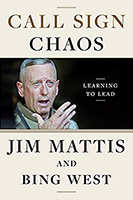 Call Sign Chaos: Learning to Lead by Jim Mattis and Bing West Call Sign Chaos: Learning to Lead by Jim Mattis and Bing West
Call Sign Chaos is the account of Jim Mattis’s storied career, from wide-ranging leadership roles in three wars to ultimately commanding a quarter of a million troops across the Middle East. Along the way, Mattis recounts his foundational experiences as a leader, extracting the lessons he has learned about the nature of warfighting and peacemaking, the importance of allies, and the strategic dilemmas—and short-sighted thinking—now facing our nation.
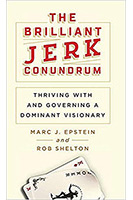 The Brilliant Jerk Conundrum: Thriving with and Governing a Dominant Visionary by Marc J. Epstein and Rob Shelton The Brilliant Jerk Conundrum: Thriving with and Governing a Dominant Visionary by Marc J. Epstein and Rob Shelton
With a strong leader at the helm, what can possibly go wrong? Betting on a dominant visionary is one of the biggest business gambles an investor, employee, or board member will ever make. If things go right, a visionary's wizardry changes entire industries and generates massive value for shareholders, employees, and society. But if things go wrong, millions (possibly billions) of dollars are lost--and sometimes people go to jail. The challenge for investors, employees, and board members is knowing the difference between an inspired visionary and an idealistic time bomb and if, when, and how to intervene.
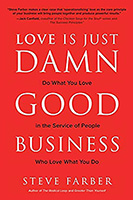 Love is Just Damn Good Business: Do What You Love in the Service of People Who Love What You Do by Steve Farber Love is Just Damn Good Business: Do What You Love in the Service of People Who Love What You Do by Steve Farber
It’s time to toss aside the touchy-feely notions of love in business and acknowledge the real power that it holds. Love is not only appropriate in the context of business, it’s the foundation of great leadership. To put it bluntly: love is just damn good business. It’s a refreshingly human way of doing business.
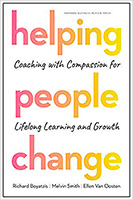 Helping People Change: Coaching with Compassion for Lifelong Learning and Growth by Richard Boyatzis, Melvin L. Smith and Ellen Van Oosten Helping People Change: Coaching with Compassion for Lifelong Learning and Growth by Richard Boyatzis, Melvin L. Smith and Ellen Van Oosten
Helping others is a good thing. Often, as a leader, manager, doctor, teacher, or coach, it's central to your job. But even the most well-intentioned efforts to help others can be undermined by a simple truth: We almost always focus on trying to "fix" people, correcting problems or filling the gaps between where they are and where we think they should be. Unfortunately, this doesn't work well, if at all, to inspire sustained learning or positive change. There's a better way.
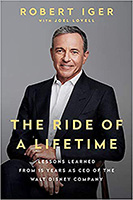 The Ride of a Lifetime: Lessons Learned from 15 Years as CEO of the Walt Disney Company by Robert Iger with Joel Lovell The Ride of a Lifetime: Lessons Learned from 15 Years as CEO of the Walt Disney Company by Robert Iger with Joel Lovell
This book is about the relentless curiosity that has driven Iger for forty-five years, since the day he started as the lowliest studio grunt at ABC. It’s also about thoughtfulness and respect, and a decency-over-dollars approach that has become the bedrock of every project and partnership Iger pursues, from a deep friendship with Steve Jobs in his final years to an abiding love of the Star Wars mythology.
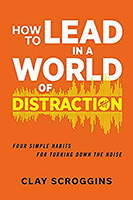 How to Lead in a World of Distraction: Four Simple Habits for Turning Down the Noise by Clay Scroggins How to Lead in a World of Distraction: Four Simple Habits for Turning Down the Noise by Clay Scroggins
While many leaders have learned to tune out distractions that keep them from being productive, they remain deaf to their inner desires and emotions. In How to Lead in a World of Distraction, Clay Scroggins teaches leaders four simple habits that create space for emotional evaluation and exploration. These helpful practices will empower leaders to replace the chaos of their busy days with emotional competence and awareness that leads to a calmer, more fulfilling life.
 Build your leadership library with these specials on over 39 titles. All titles are at least 40% off the list price and are available only in limited quantities. “If we encounter a man of rare intellect, we should ask him what books he reads.” — Ralph Waldo Emerson
Posted by Michael McKinney at 12:15 AM
08.01.19

First Look: Leadership Books for August 2019Here's a look at some of the best leadership books to be released in August 2019. Don't miss out on other great new and future releases.
Transforming Legacy Organizations provides real-world advice and research-based information on how to grow innovation by employing new technologies, improving processes, and establishing a culture of creativity and forward momentum. Conventional business wisdom views innovation as the biggest advantage startups have over large, established organizations, often referred to as legacy organizations. This belief is false, especially when considering that 70% of all startups fail within 20 months of their first venture round. The truth is innovation initiatives of legacy organizations have far better chances of succeeding.
In these tumultuous times of economic and technological change, staying ahead depends on continual self-education—a lifelong mastery of fresh ideas, subjects, and skills. If you want to accomplish more and stand apart from everyone else, you need to become an ultralearner. The challenge of learning new skills is that you think you already know how best to learn, as you did as a student, so you rerun old routines and old ways of solving problems. To counter that, Ultralearning offers powerful strategies to break you out of those mental ruts and introduces new training methods to help you push through to higher levels of retention.
Everyone has insecurities. Like with most insecurities–especially those that are not self-inflicted–we don’t tend to “fix” or “get over” them; they are always with us and a part of who we are. However, if we are honest with ourselves, we can recognize them, understand them, and seek to find a way to live our most authentic lives free from the chaos they often create.
Oren is throwing out the old playbook on persuasion. Instead, he'll show you a new approach that works on this simple insight: Everyone trusts their own ideas. If, rather than pushing your idea on your buyer, you can guide them to discover it on their own, they'll believe it, trust it, and get excited about it. Then they'll buy in and feel good about the chance to work with you. That might sound easier said than done, but Oren has taught thousands of people how to do it with a series of simple steps that anyone can follow in any situation. And Oren has been in a lot of different situations.
Instant gratification is the norm today—in our lives, our culture, our economy, and our politics. Many of us have forgotten (if we ever learned) how to make smart decisions for the long run. Whether it comes to our finances, our health, our communities, or our planet, it’s easy to avoid thinking ahead. The consequences of this immediacy are stark: Superbugs spawned by the overuse of antibiotics endanger our health. Companies that fail to invest stagnate and fall behind. Hurricanes and wildfires turn deadly for communities that could have taken more precaution. Today more than ever, all of us need to know how we can make better long-term decisions in our lives, businesses, and society. Bina Venkataraman sees the way forward.
 Build your leadership library with these specials on over 39 titles. All titles are at least 40% off the list price and are available only in limited quantities. “If we encounter a man of rare intellect, we should ask him what books he reads.” — Ralph Waldo Emerson
Posted by Michael McKinney at 09:11 AM
07.01.19

First Look: Leadership Books for July 2019Here's a look at some of the best leadership books to be released in July 2019. Don't miss out on other great new and future releases.
The Coffee Bean: an illustrated fable that teaches readers how to transform their environment, overcome challenges, and create positive change. Life is often difficult. It can be harsh, stressful, and feel like a pot of boiling hot water. The environments we find ourselves in can change, weaken, or harden us, and test who we truly are. We can be like the carrot that weakens in the pot or like the egg that hardens. Or, we can be like the coffee bean and discover the power inside us to transform our environment.
The true, behind-the-scenes history of the people who built Silicon Valley and shaped Big Tech in America. Now, after almost five years of pioneering research, O'Mara has produced the definitive history of Silicon Valley for our time, the story of mavericks and visionaries, but also of powerful institutions creating the framework for innovation, from the Pentagon to Stanford University. Deploying a wonderfully rich and diverse cast of protagonists, across four generations of explosive growth in the Valley, from the Forties to the present, O'Mara has wrestled into magnificent narrative form one of the most fateful developments in modern American history.
In Follow the Feeling, strategy advisor Kai D. Wright answers a critical question plaguing entrepreneurs, brand strategists, marketers, and leaders: how do you grow your brand in a noisy world? Analyzing 1,500 fast-growing companies from Alibaba to Zara, the Columbia University lecturer and Ogilvy global consulting partner unpacks five branding secrets. Follow the Feeling will show you how to best build and position your brand so you can stand out from competitors, build a tribe, and engineer a positive feeling across five important branding territories—lexicon, audio cues, visual stimuli, experience, and culture.
In an increasingly experience-driven economy, companies that deliver great experiences thrive, and those that do not die. The book presents interdisciplinary research underlying key concepts such as memory, intentionality, and dramatic structure in a down-to-earth style, drawing attention to both the macro and micro levels. It provides readers with the tools they need to design innovative and indelible experiences and to move their organizations into the experience economy.
A fascinating story about the power of networking, connection, and mentorship. Written as an engaging parable, Swim! How a Shark, a Suckerfish, and a Parasite Teach You Leadership, Mentoring, and Next Level Success brings to life real-world challenges (and their solutions) and presents them in simple, yet powerful terms. The book explores the vital importance of networking, explores the steps that lead to successful networking, and explains why we need it.
On August 9, 1974, Richard Nixon became the first and only U.S. president to resign from office—to avoid almost certain impeachment. Utterly disgraced, he was forced to flee the White House with a small cadre of advisors and family. Richard Nixon was a completely defeated man. Yet only a decade later, Nixon was a trusted advisor to presidents, dispensing wisdom on campaign strategy and foreign policy, shaping the course of U.S.-Soviet summit meetings, and representing the U.S. at state funerals—the very model of an elder statesman. How did he do it? Kasey S. Pipes, advisor to President George W. Bush, tells the fascinating story of Nixon’s comeback.
 Build your leadership library with these specials on over 39 titles. All titles are at least 40% off the list price and are available only in limited quantities. “You're the same today as you'll be in five years except for the people you meet and the books you read.” — Charlie "Tremendous" Jones
Posted by Michael McKinney at 12:38 AM
06.01.19

First Look: Leadership Books for June 2019Here's a look at some of the best leadership books to be released in June 2019. Don't miss out on other great new and future releases.
Jeffrey Hull shares the secrets, strategies, and science underlying his, and his clients', successes. Interweaving real-life stories with practical tips and the latest evidence-based research, he equips readers with the insights they need to thrive in today's world. Based on his popular classes with Harvard Medical School physicians and NYU business students, Hull has identified the six key elements that leaders in this new workplace need to succeed: Flexibility, Intentionality, Emotional Intelligence, Realness, Collaboration, and Engagement. 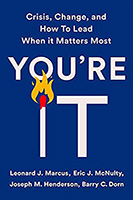 You're It: Crisis, Change, and How to Lead When It Matters Most by Leonard Marcus, Eric McNulty, Joseph M. Henderson and Barry C. Dorn You're It: Crisis, Change, and How to Lead When It Matters Most by Leonard Marcus, Eric McNulty, Joseph M. Henderson and Barry C. Dorn
Today, in an instant, leaders can find themselves face-to-face with crisis. An active shooter. A media controversy. A data breach. You're It takes you to the front lines of some of the toughest decisions facing our nation's leaders-from how to mobilize during a hurricane or in the aftermath of a bombing to halting a raging pandemic. The authors introduce readers to the pragmatic model and methods of Meta-Leadership. They show you how to understand what is happening during a moment of crisis and change, what to do about it, and how to hone these skills to lead high-performing teams. 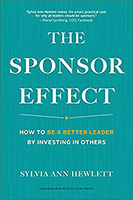 The Sponsor Effect: How to Be a Better Leader by Investing in Others by Sylvia Ann Hewlett The Sponsor Effect: How to Be a Better Leader by Investing in Others by Sylvia Ann Hewlett
Many people know the benefit of finding a sponsor--someone who goes beyond traditional mentorship to partner with a junior-level employee to help build their skills, advocate for them when opportunities arise, and open doors. But few realize that being a sponsor is just as important to career growth as finding one. According to new research, senior executives who sponsor rising talent are 53 percent more likely to be promoted than those who don't. Similarly, middle-level managers who have proteges are 167 percent more likely to be given stretch assignments. But how do you find standout proteges, let alone develop them so that they're able to come through for you and your organization? 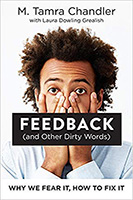 Feedback (and Other Dirty Words): Why We Fear It, How to Fix It by M. Tamra Chandler with Laura Grealish Feedback (and Other Dirty Words): Why We Fear It, How to Fix It by M. Tamra Chandler with Laura Grealish
Feedback: the mere mention of the word can make our blood pressure rise and our defenses go up. However, if we take a step back and think about its true intent, we realize that feedback needn't be a bad thing. After all, understanding how others experience us provides valuable opportunities to learn and grow. When it's done right, feedback has been proven to be the most effective means of improving communication and performance for you and your organization. 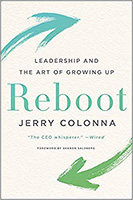 Reboot: Leadership and the Art of Growing Up by Jerry Colonna Reboot: Leadership and the Art of Growing Up by Jerry Colonna
One of the start-up world’s most in-demand executive coaches, Jerry Colonna helps start-up CEOs make peace with their demons, the psychological habits and behavioral patterns that have helped them to succeed—molding them into highly accomplished individuals—yet have been detrimental to their relationships and ultimate well-being. Reboot is a journey of radical self-inquiry, helping you to reset your life by sorting through the emotional baggage that is holding you back professionally, and even more important, in your relationships.
Build your leadership library with these specials on over 39 titles. All titles are at least 40% off the list price and are available only in limited quantities. “The habit of reading is the only enjoyment in which there is no alloy; it lasts when all other pleasures fade.” — Anthony Trollope
Posted by Michael McKinney at 08:22 AM
05.01.19

First Look: Leadership Books for May 2019Here's a look at some of the best leadership books to be released in May 2019. Don't miss out on other great new and future releases. Turn Enemies Into Allies: The Art of Peace in the Workplace (Conflict Resolution for Leaders, Managers, and Anyone Stuck in the Middle) by Judy Ringer Turn Enemies Into Allies: The Art of Peace in the Workplace (Conflict Resolution for Leaders, Managers, and Anyone Stuck in the Middle) by Judy Ringer
Leaders often believe they don’t have the time to help employees navigate conflict. It takes more time not to address conflict than to constructively intervene. But before you can successfully guide others in managing disagreements, you must be able to manage yourself—your mindset, presence, and behaviors. Turn Enemies into Allies offers a way of working with clashing employees that is deliberate and systematic. 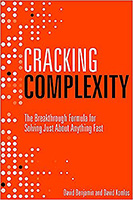 Cracking Complexity: The Breakthrough Formula for Solving Just About Anything Fast by David Komlos and David Benjamin Cracking Complexity: The Breakthrough Formula for Solving Just About Anything Fast by David Komlos and David Benjamin
Too many leaders approach complexity the wrong way—they push their people harder and harder and tackle problems one at a time over months, sometimes even years, and nearly always in a linear fashion. In this book, the authors share their proven formula for dramatically shortening the process and solving an organization's toughest challenges in mere days. 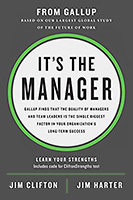 It's the Manager: Gallup finds the quality of managers and team leaders is the single biggest factor in your organization's long-term success by Jim Clifton and Jim Harter It's the Manager: Gallup finds the quality of managers and team leaders is the single biggest factor in your organization's long-term success by Jim Clifton and Jim Harter
Packed with 52 discoveries from Gallup’s largest study on the future of work, It’s the Manager shows leaders how to adapt their organizations to rapid change, ranging from new workplace demands to the challenges of managing remote employees, a diverse workforce, the rise of artificial intelligence, gig workers, and attracting—and keeping—today’s best employees. 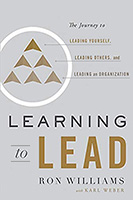 Learning to Lead: The Journey to Leading Yourself, Leading Others, and Leading an Organization by Ron Williams with Karl Weber Learning to Lead: The Journey to Leading Yourself, Leading Others, and Leading an Organization by Ron Williams with Karl Weber
This master class on leadership, written by one of America's most prominent and successful executives, will help you develop the professional leadership qualities that deliver personal, interpersonal, and organizational success. Ron Williams provides you with practical, tested leadership advice, whether you're searching for a new career, looking for proven management solutions, or seeking to transform your organization. 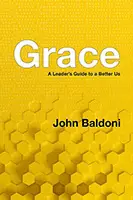 Grace: A Leader's Guide to a Better Us by John Baldoni Grace: A Leader's Guide to a Better Us by John Baldoni
GRACE: A Leader's Guide to a Better Us focuses on the role that grace plays as a catalyst in enabling us to create "the greater good" at work, at home and in our communities. GRACE tells the stories of women and men who are making a positive difference in our world by devoting themselves to serving as agents of positive change. GRACE is a clarion call for the goodness in the world around us as well as a practical guide for implementing grace in your own life. 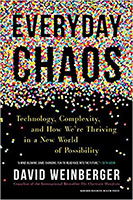 Everyday Chaos: Technology, Complexity, and How We’re Thriving in a New World of Possibility by David Weinberger Everyday Chaos: Technology, Complexity, and How We’re Thriving in a New World of Possibility by David Weinberger
Through stories from history, business, and technology, philosopher and technologist David Weinberger finds the unifying truths lying below the surface of the tools we take for granted--and a future in which our best strategy often requires holding back from anticipating and instead creating as many possibilities as we can.  Build your leadership library with these specials on over 39 titles. All titles are at least 40% off the list price and are available only in limited quantities. “No two persons ever read the same book.” — Edmund Wilson
 
Posted by Michael McKinney at 10:21 AM
04.01.19

First Look: Leadership Books for April 2019Here's a look at some of the best leadership books to be released in April 2019. Don't miss out on other great new and future releases.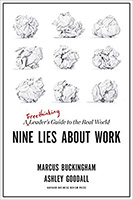 Nine Lies about Work: A Freethinking Leader’s Guide to the Real World Nine Lies about Work: A Freethinking Leader’s Guide to the Real WorldMarcus Buckingham and Ashley Goodall There are some big lies--distortions, faulty assumptions, wrong thinking--that we encounter every time we show up for work. Nine lies, to be exact. They cause dysfunction and frustration, ultimately resulting in workplaces that are a pale shadow of what they could be. But there are those who can get past the lies and discover what's real. These freethinking leaders recognize the power and beauty of our individual uniqueness. They know that emergent patterns are more valuable than received wisdom and that evidence is more powerful than dogma. 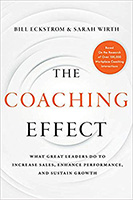 The Coaching Effect: What Great Leaders Do to Increase Sales, Enhance Performance, and Sustain Growth The Coaching Effect: What Great Leaders Do to Increase Sales, Enhance Performance, and Sustain GrowthBill Eckstrom and Sarah Wirth The authors share three critical performance drivers, along with the four high-growth activities that coaches must execute to build a team that is motivated to achieve at the highest levels. Through both hard data and rich stories, Eckstrom and Wirth demonstrate how leaders can measure and improve their coaching to lead their teams to better results. 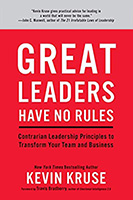 Great Leaders Have No Rules: Contrarian Leadership Principles to Transform Your Team and Business Great Leaders Have No Rules: Contrarian Leadership Principles to Transform Your Team and BusinessKevin Kruse Kevin Kruse debunks popular wisdom with ten contrarian principles for better, faster, easier leadership. Grounded in solid research and three decades of entrepreneurial experience, this book has one purpose: to teach you how to be both the boss everyone wants to work for and the high achiever every CEO wants to hire—all without drama, stress, or endless hours in the office 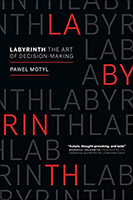 Labyrinth: The Art of Decision Making Labyrinth: The Art of Decision MakingPawel Motyl Every day, we make countless choices, yet we rarely stop to consider how we arrive at those decisions as we speed through our lives. In Labyrinth, leadership expert Pawel Motyl believes it’s time to take a closer look at how we make decisions―and learn how to decide better. Motyl digs into the series of decisions that led to some of the modern world’s most dramatic events: from the Cuban missile crisis to the 1996 Mount Everest climbing disaster; from the Apollo 13 rescue mission to the ill-fated Daimler–Chrysler merger. Along the way, he reveals 16 rules for effective decision-making that will challenge your pre-existing beliefs, and change your outlook forever. 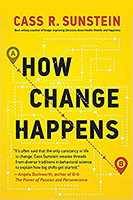 How Change Happens How Change HappensCass Sunstein Sunstein focuses on the crucial role of social norms―and on their frequent collapse. When norms lead people to silence themselves, even an unpopular status quo can persist. Sometimes change is more gradual, as “nudges” help produce new and different decisions. And finally, he considers social divisions, social cascades, and “partyism,” when identification with a political party creates a strong bias against all members of an opposing party―which can both fuel and block social change.  Build your leadership library with these specials on over 39 titles. All titles are at least 40% off the list price and are available only in limited quantities. “No two persons ever read the same book.” — Edmund Wilson
 
Posted by Michael McKinney at 08:08 AM
03.01.19

First Look: Leadership Books for March 2019Here's a look at some of the best leadership books to be released in March 2019. Don't miss out on other great new and future releases.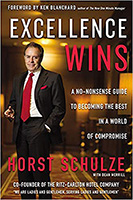 Excellence Wins: A No-Nonsense Guide to Becoming the Best in a World of Compromise Excellence Wins: A No-Nonsense Guide to Becoming the Best in a World of CompromiseHorst Schulze As the co-founder and former president of Ritz-Carlton Hotel Co., Schulze led the company to unprecedented multi-billion dollar growth, setting the business vision and people-focused standards that made the Ritz-Carlton brand globally elite. Schulze's principles are both versatile and utterly practical to leaders of every age, career stage, and industry. You don't need a powerful title or a line of direct reports—you have everything you need to use them right now. 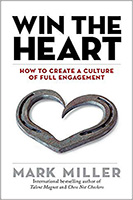 Win the Heart: How to Create a Culture of Full Engagement Win the Heart: How to Create a Culture of Full Engagement Mark Miller Employee engagement is shockingly low--but it's not an employee problem; it's a leadership problem. Bestselling author Mark Miller says it's up to leaders to create a workplace where their employees truly want to be—and he reveals four keys to doing it. 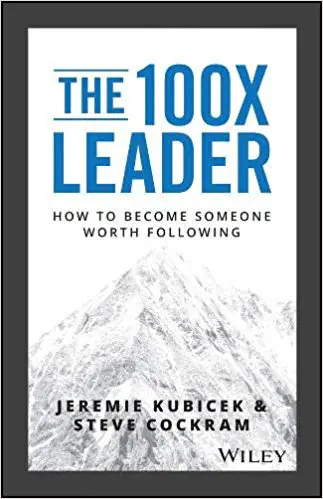 The 100X Leader: How to Become Someone Worth Following The 100X Leader: How to Become Someone Worth FollowingJeremie Kubicek and Steve Cockram The best leader you've ever had in your life was a liberator—someone willing to fight for your highest good, even at a personal cost. Inside, global leadership experts Jeremie Kubicek and Steve Cockram explain what made that leader so unique, how to become that person yourself, and how to share the same gift with others. The 100x Leader will help you become—and build—leaders worth following. 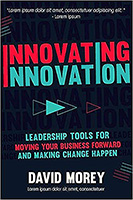 Innovating Innovation: Leadership Tools For Moving Your Business Forward and Making Change Happen Innovating Innovation: Leadership Tools For Moving Your Business Forward and Making Change HappenDavid Morey Innovation is broken. Business leaders struggle to find ways to crack through their own corporate politics or bureaucratic silos, to move from defense to offense, to nurture real breakthrough, to drive visionary creativity in ways that add new value to everything they do. Morey will guide you across 11 concrete and pragmatic steps that unlock and drive day-to-day innovation in your business and help you gain a long-term competitive advantage in your marketplace. 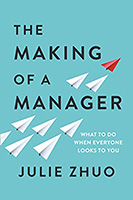 The Making of a Manager: What to Do When Everyone Looks to You The Making of a Manager: What to Do When Everyone Looks to YouJulie Zhuo Having managed dozens of teams spanning tens to hundreds of people, Julie Zhuo knows the most important lesson of all: great managers are made, not born. If you care enough to be reading this, then you care enough to be a great manager. Whether you're new to the job, a veteran leader, or looking to be promoted, this is the handbook you need to be the kind of manager you wish you had.  Build your leadership library with these specials on over 39 titles. All titles are at least 40% off the list price and are available only in limited quantities. “Books, because of the power they possess to exert intellectual influence, more so than any other form of serious communication, change the way readers — and even leaders — see the world and set the stage for them to change it.” — Peter J. Dougherty, editor-at-large at Princeton University Press
 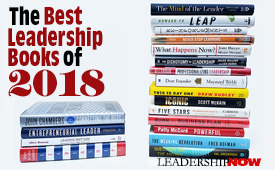
Posted by Michael McKinney at 12:28 AM
02.01.19

First Look: Leadership Books for February 2019Here's a look at some of the best leadership books to be released in February 2019. Don't miss out on other great new and future releases.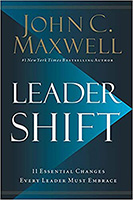 Leadershift: The 11 Essential Changes Every Leader Must Embrace Leadershift: The 11 Essential Changes Every Leader Must EmbraceJohn C. Maxwell In Leadershift, John C. Maxwell helps leaders gain the ability and willingness to make leadership changes that will positively enhance their organizational and personal growth. He does this by sharing the eleven shifts he made over the course of his long and successful leadership career. Each shift changed his trajectory and set him up for new and exciting achievements, ultimately strengthening and sustaining his leadership abilities. 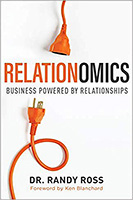 Relationomics: Business Powered by Relationships Relationomics: Business Powered by RelationshipsDr. Randy Ross with a Foreword by Ken Blanchard In Relationomics, Dr. Randy Ross lays out the principles and practices that will help readers develop and sustain the kind of relationships that can build their business and energize their team, including how to become a value creator, master the art of giving and receiving helpful feedback, dramatically decrease employee turnover, lead beyond self-interest, and much more. 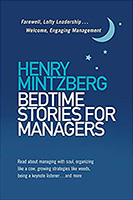 Bedtime Stories for Managers: Farewell, Lofty Leadership . . . Welcome, Engaging Management Bedtime Stories for Managers: Farewell, Lofty Leadership . . . Welcome, Engaging ManagementHenry Mintzberg If you're like most managers and things keep you up at night, now you can turn to a book that's designed especially for you! But you won't find talking rabbits or princesses here. (There is a cow, but it doesn't jump.) Henry Mintzberg has culled forty-two of the best posts from his widely read blog and turned them into a deceptively light, sneakily serious compendium of sometimes heretical reflections on management. 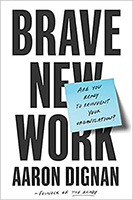 Brave New Work: Are You Ready to Reinvent Your Organization? Brave New Work: Are You Ready to Reinvent Your Organization?Aaron Dignan Dignan says you can’t fix a team, department, or organization by tinkering around the edges. Over the years, he has helped his clients completely reinvent their operating systems—the fundamental principles and practices that shape their culture—with extraordinary success. Seth Godin says, “This is the management book of the year. Clear, powerful and urgent, it's a must read for anyone who cares about where they work and how they work.” 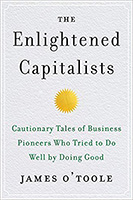 The Enlightened Capitalists: Cautionary Tales of Business Pioneers Who Tried to Do Well by Doing Good The Enlightened Capitalists: Cautionary Tales of Business Pioneers Who Tried to Do Well by Doing GoodJames O'Toole James O’Toole tells the largely forgotten stories of men and women who adopted forward-thinking business practices designed to serve the needs of their employees, customers, communities, and the natural environment. They wanted to prove that executives didn’t have to make trade-offs between profit and virtue.  Build your leadership library with these specials on over 39 titles. All titles are at least 40% off the list price and are available only in limited quantities. “Books, because of the power they possess to exert intellectual influence, more so than any other form of serious communication, change the way readers — and even leaders — see the world and set the stage for them to change it.” — Peter J. Dougherty, editor-at-large at Princeton University Press
 
Posted by Michael McKinney at 01:18 AM
01.01.19

First Look: Leadership Books for January 2019Here's a look at some of the best leadership books to be released in January 2019. Don't miss out on other great new and future releases.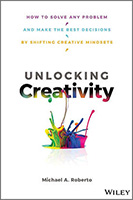 Unlocking Creativity: How to Solve Any Problem and Make the Best Decisions Unlocking Creativity: How to Solve Any Problem and Make the Best DecisionsMichael A. Roberto Leaders do not have to conceive innovative ideas, but rather open the path for curious and creative employees within their organization. Unlocking Creativity aids organizations in removing obstacles to the creative process and helps to form an atmosphere of imagination and innovation. 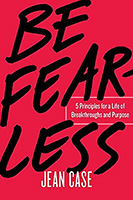 Be Fearless: 5 Principles for a Life of Breakthroughs and Purpose Be Fearless: 5 Principles for a Life of Breakthroughs and PurposeJean Case When National Geographic Chairman Jean Case set out to investigate the core qualities of great change makers, past and present, from inventors to revolutionaries, she found five surprising traits all had in common. They weren’t wealth, privilege, or even genius. It was that all of these exceptional men and women chose to make a “big bet,” take bold risks, learn from their failures, reach beyond their bubbles, and let urgency conquer fear. 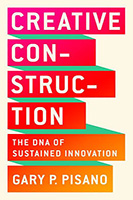 Creative Construction: The DNA of Sustained Innovation Creative Construction: The DNA of Sustained InnovationGary P. Pisano The conventional wisdom is that only disruptive, nimble startups can innovate; once a business gets bigger and more complex corporate arteriosclerosis sets in. Big organizations require a different set of management practices and approaches—a discipline focused on the strategies, systems and culture for taking their companies to the next level. 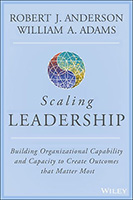 Scaling Leadership: Building Organizational Capability and Capacity to Create Outcomes that Matter Most Scaling Leadership: Building Organizational Capability and Capacity to Create Outcomes that Matter MostRobert J. Anderson and William A. Adams Is your leadership built for scale as you advance in today’s volatile and disruptive business environment? This context puts a premium on a very particular kind of leadership—High-Creative leadership capable of rapidly growing the organization while simultaneously transforming it into more agile, innovative, adaptive and engaging workplace. 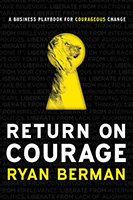 Return on Courage: A Business Playbook for Courageous Change Return on Courage: A Business Playbook for Courageous ChangeRyan Berman Return on Courage is the go-to courage instructional manual that helps readers attack and shrink business fears head-on. They will learn how to relentlessly play offense, drive change, and transform into a Courage Brand®. ROC can be the secret weapon to innovating new products and services, maximizing ROI, and revolutionizing their industry. 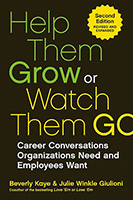 Help Them Grow or Watch Them Go: Career Conversations Organizations Need and Employees Want Help Them Grow or Watch Them Go: Career Conversations Organizations Need and Employees WantBeverly Kaye and Julie Winkle Giulioni Study after study confirms that career development is the single most powerful tool managers have for driving retention, engagement, productivity, and results. But most managers feel they just don't have time for it. This new edition offers a better way: frequent, short conversations with employees about themselves, their goals, and the business that can be integrated seamlessly into the normal course of business.  Build your leadership library with these specials on over 39 titles. All titles are at least 40% off the list price and are available only in limited quantities. “Books, because of the power they possess to exert intellectual influence, more so than any other form of serious communication, change the way readers — and even leaders — see the world and set the stage for them to change it.” — Peter J. Dougherty, editor-at-large at Princeton University Press
Posted by Michael McKinney at 02:05 AM
12.14.18

The Best Leadership Books of 2018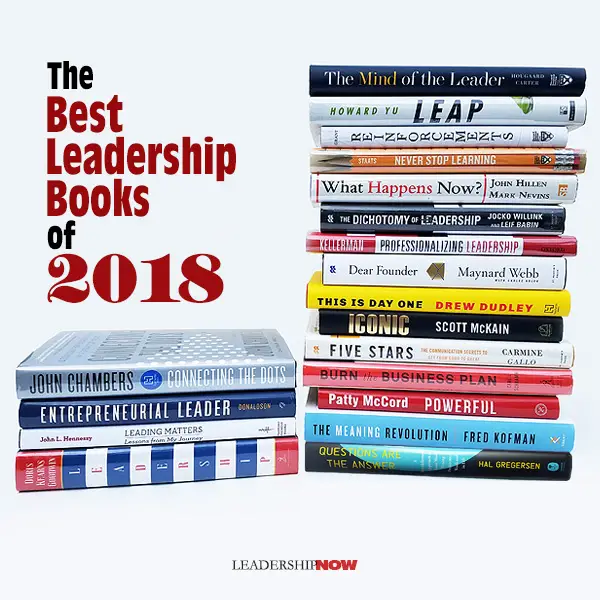
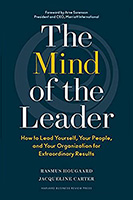 The Mind of the Leader: How to Lead Yourself, Your People, and Your Organization for Extraordinary Results The Mind of the Leader: How to Lead Yourself, Your People, and Your Organization for Extraordinary Resultsby Rasmus Hougaard and Jacqueline Carter (Harvard Business Review Press, 2018) 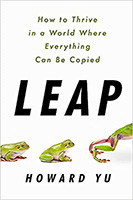 Leap: How to Thrive in a World Where Everything Can Be Copied Leap: How to Thrive in a World Where Everything Can Be Copiedby Howard Yu (PublicAffairs, 2018) 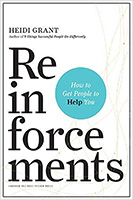 Reinforcements: How to Get People to Help You Reinforcements: How to Get People to Help Youby Heidi Grant (Harvard Business Review Press, 2018) 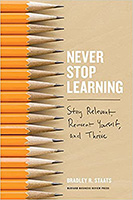 Never Stop Learning: Stay Relevant, Reinvent Yourself, and Thrive Never Stop Learning: Stay Relevant, Reinvent Yourself, and Thriveby Bradley R. Staats (Harvard Business Review Press, 2018) 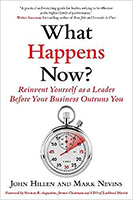 What Happens Now? Reinvent Yourself as a Leader Before Your Business Outruns You What Happens Now? Reinvent Yourself as a Leader Before Your Business Outruns Youby John Hillen and Mark D. Nevins (SelectBooks, Inc., 2018) 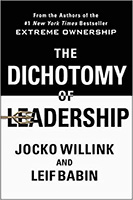 The Dichotomy of Leadership: Balancing the Challenges of Extreme Ownership to Lead and Win The Dichotomy of Leadership: Balancing the Challenges of Extreme Ownership to Lead and Winby Jocko Willink and Leif Babin (St. Martin's Press, 2018) 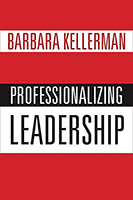 Professionalizing Leadership Professionalizing Leadershipby Barbara Kellerman (Oxford University Press, 2018) 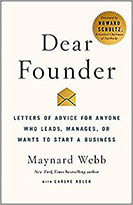 Dear Founder: Letters of Advice for Anyone Who Leads, Manages, or Wants to Start a Business Dear Founder: Letters of Advice for Anyone Who Leads, Manages, or Wants to Start a Businessby Maynard Webb with Carlye Adler (St. Martin's Press, 2018) 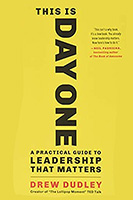 This Is Day One: A Practical Guide to Leadership That Matters This Is Day One: A Practical Guide to Leadership That Mattersby Drew Dudley (Hachette Books, 2018) 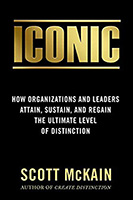 ICONIC: How Organizations and Leaders Attain, Sustain, and Regain the Highest Level of Distinction ICONIC: How Organizations and Leaders Attain, Sustain, and Regain the Highest Level of Distinctionby Scott McKain (Forefront Books/Simon & Schuster, 2018) 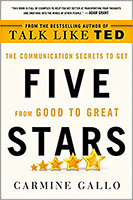 Five Stars: The Communication Secrets to Get from Good to Great Five Stars: The Communication Secrets to Get from Good to Greatby Carmine Gallo (St. Martin's Press, 2018) 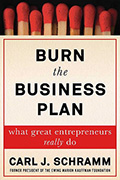 Burn the Business Plan: What Great Entrepreneurs Really Do Burn the Business Plan: What Great Entrepreneurs Really Doby Carl J. Schramm (Simon & Schuster, 2018) 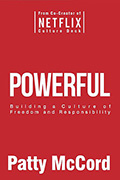 Powerful: Building a Culture of Freedom and Responsibility Powerful: Building a Culture of Freedom and Responsibilityby Patty McCord (Silicon Guild, 2018) 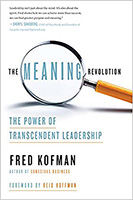 The Meaning Revolution: The Power of Transcendent Leadership The Meaning Revolution: The Power of Transcendent Leadershipby Fred Kofman (Currency, 2018) 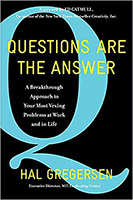 by Hal Gregersen (HarperBusiness, 2018) Biographies: 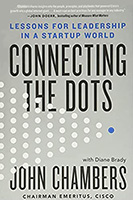 Connecting the Dots: Lessons for Leadership in a Startup World Connecting the Dots: Lessons for Leadership in a Startup Worldby John Chambers with Diane Brady (Hachette Books, 2018) 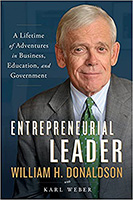 Entrepreneurial Leader: A Lifetime of Adventures in Business, Education, and Government Entrepreneurial Leader: A Lifetime of Adventures in Business, Education, and Governmentby William H. Donaldson with Karl Weber (Greenleaf Book Group, 2018) 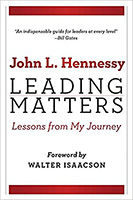 Leading Matters: Lessons from My Journey Leading Matters: Lessons from My Journeyby John L. Hennessy (Stanford University Press, 2018) 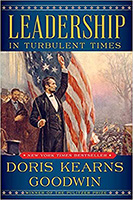 Leadership In Turbulent Times Leadership In Turbulent Timesby Doris Kearns Goodwin (Simon & Schuster, 2018) Related Interest:
Posted by Michael McKinney at 10:54 AM
12.01.18

First Look: Leadership Books for December 2018Here's a look at some of the best leadership books to be released in December 2018. Don't miss out on other great new and future releases.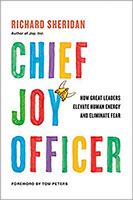
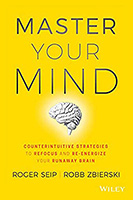
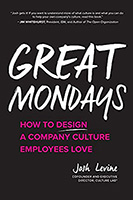
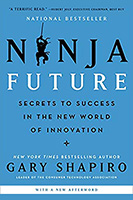
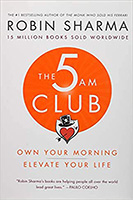
For bulk orders call 1-626-441-2024  Build your leadership library with these specials on over 39 titles. All titles are at least 40% off the list price and are available only in limited quantities. “Never trust anyone who has not brought a book with them.” — Lemony Snicket
Posted by Michael McKinney at 08:07 AM
11.01.18

First Look: Leadership Books for November 2018Here's a look at some of the best leadership books to be released in November 2018. Don't miss out on other great new and future releases.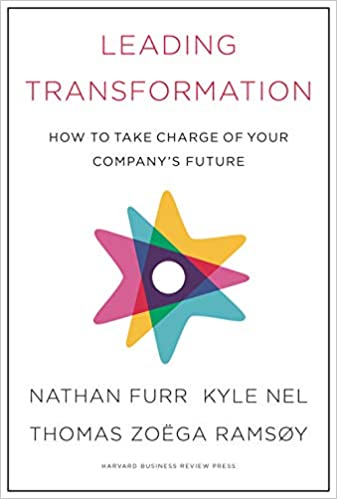 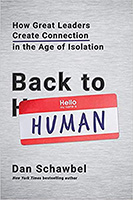  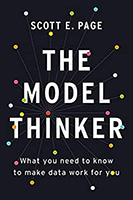 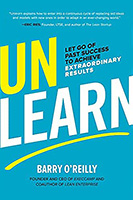
For bulk orders call 1-626-441-2024  Build your leadership library with these specials on over 39 titles. All titles are at least 40% off the list price and are available only in limited quantities. "Reading literature, more than informing us, shapes us." — Karen Swallow Prior, On Reading Well
Posted by Michael McKinney at 07:25 AM
10.28.18

Books About Theodore Roosevelt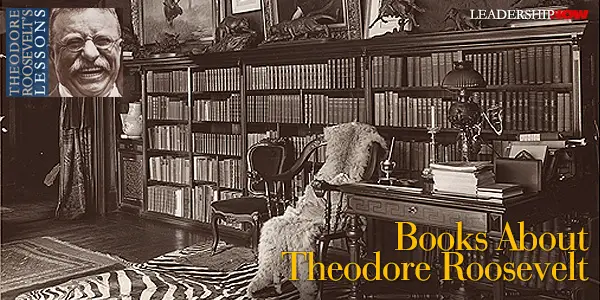
ON THE OCCASION of the anniversary of Theodore Roosevelt's birth on October 27, 1858, we have assembled a list of some of the better books about him:   
Posted by Michael McKinney at 05:20 AM
10.01.18

First Look: Leadership Books for October 2018Here's a look at some of the best leadership books to be released in October 2018. Don't miss out on other great new and future releases. 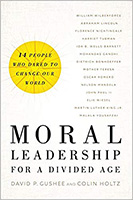 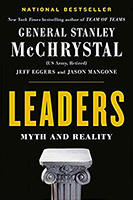 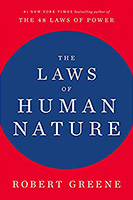 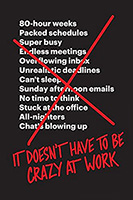
For bulk orders call 1-626-441-2024  Build your leadership library with these specials on over 39 titles. All titles are at least 40% off the list price and are available only in limited quantities. "Read deep! Read often! Out-READ the Competition!!!" — Tom Peters
Posted by Michael McKinney at 07:42 AM
09.01.18

First Look: Leadership Books for September 2018Here's a look at some of the best leadership books to be released in September 2018. Don't miss out on other great new and future releases.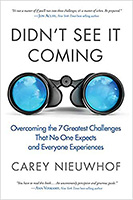    
For bulk orders call 1-626-441-2024  Build your leadership library with these specials on over 39 titles. All titles are at least 40% off the list price and are available only in limited quantities. "Read deep! Read often! Out-READ the Competition!!!" — Tom Peters
Posted by Michael McKinney at 07:11 AM
08.01.18

First Look: Leadership Books for August 2018Here's a look at some of the best leadership books to be released in August 2018. Don't miss out on other great new and future releases.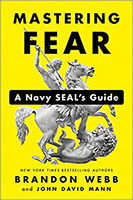 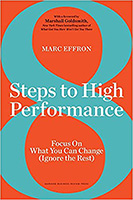 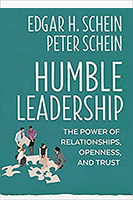 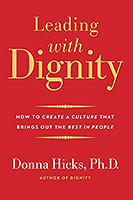 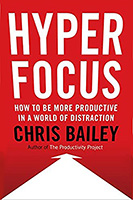
For bulk orders call 1-626-441-2024  Build your leadership library with these specials on over 39 titles. All titles are at least 40% off the list price and are available only in limited quantities. "A personal bookshelf is critical to developing the ability to inspire others in the pursuit of worthy goals." — Ret. U.S. Navy admiral James Stavridis, in Five Stars
Posted by Michael McKinney at 07:30 AM
07.01.18

First Look: Leadership Books for July 2018Here's a look at some of the best leadership books to be released in July 2018. Don't miss out on other great new and future releases.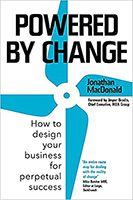 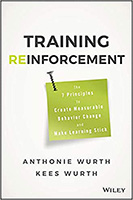 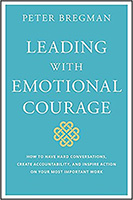 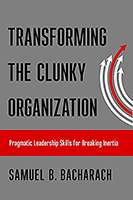 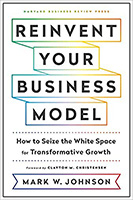
For bulk orders call 1-626-441-2024  Build your leadership library with these specials on over 39 titles. All titles are at least 40% off the list price and are available only in limited quantities. "To read is to fly: it is to soar to a point of vantage which gives a view over wide terrains of history, human variety, ideas, shared experience and the fruits of many inquiries." — A. C. Grayling, Financial Times
Posted by Michael McKinney at 12:47 AM
06.01.18

First Look: Leadership Books for June 2018Here's a look at some of the best leadership books to be released in June 2018. Don't miss out on other great new and future releases this month. 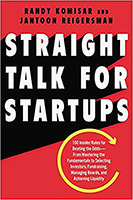   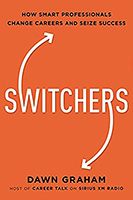
For bulk orders call 1-626-441-2024  Build your leadership library with these specials on over 39 titles. All titles are at least 40% off the list price and are available only in limited quantities. "He that loves a book will never want a faithful friend, a wholesome counselor, a cheerful companion, an effectual comforter. By study, by reading, by thinking, one may innocently divert and pleasantly entertain himself, as in all weathers, as in all fortunes." — Barrow
Posted by Michael McKinney at 08:37 AM
05.01.18

First Look: Leadership Books for May 2018Here's a look at some of the best leadership books to be released in May 2018. Don't miss out on other great new and future releases this month.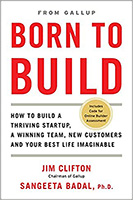   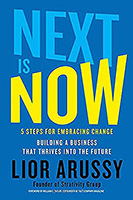 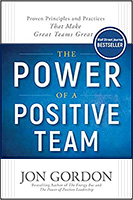
For bulk orders call 1-800-423-8273  Build your leadership library with these specials on over 39 titles. All titles are at least 40% off the list price and are available only in limited quantities. "Elon Musk has always been an introvert thinker...where a lot of people would go to a great party and have a great time and drink and talk about all sorts of things like rugby or sports, you would find Elon had found the person's library and was going through their books." — Errol Musk
Posted by Michael McKinney at 07:35 AM
04.01.18

First Look: Leadership Books for April 2018Here's a look at some of the best leadership books to be released in April 2018. Don't miss out on other great new and future releases this year.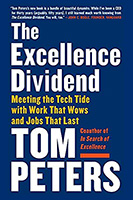 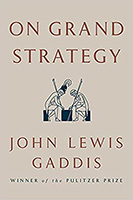 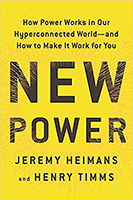 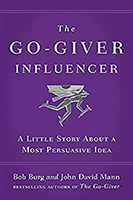 
For bulk orders call 1-800-423-8273  Build your leadership library with these specials on over 39 titles. All titles are at least 40% off the list price and are available only in limited quantities. "We read to know we are not alone." — C.S. Lewis
Posted by Michael McKinney at 01:07 PM
03.01.18

First Look: Leadership Books for March 2018Here's a look at some of the best leadership books to be released in March 2018. Don't miss out on other great new and future releases this year. 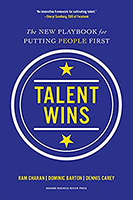  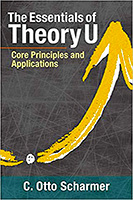 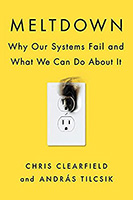
For bulk orders call 1-800-423-8273  Build your leadership library with these specials on over 39 titles. All titles are at least 40% off the list price and are available only in limited quantities. "Today a reader, tomorrow a leader." — Margaret Fuller
Posted by Michael McKinney at 08:31 AM
02.01.18

First Look: Leadership Books for February 2018Here's a look at some of the best leadership books to be released in February.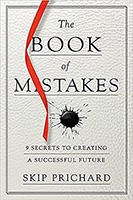 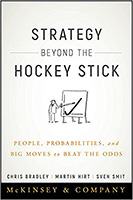 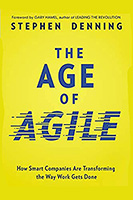 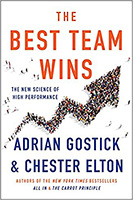 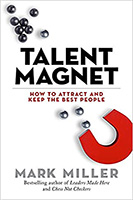
For bulk orders call 1-800-423-8273  Build your leadership library with these specials on over 39 titles. All titles are at least 40% off the list price and are available only in limited quantities. "I find television very educating. Every time somebody turns on the set, I go into the other room and read a book." — Groucho Marx
Posted by Michael McKinney at 09:52 AM
01.01.18

First Look: Leadership Books for January 2018Here's a look at some of the best leadership books to be released in January.    
For bulk orders call 1-800-423-8273  Build your leadership library with these specials on over 39 titles. All titles are at least 40% off the list price and are available only in limited quantities. "A capacity and taste for reading gives access to whatever has already been discovered by others." — Abraham Lincoln
Posted by Michael McKinney at 07:48 AM
12.25.17

The Best Leadership Books of 2017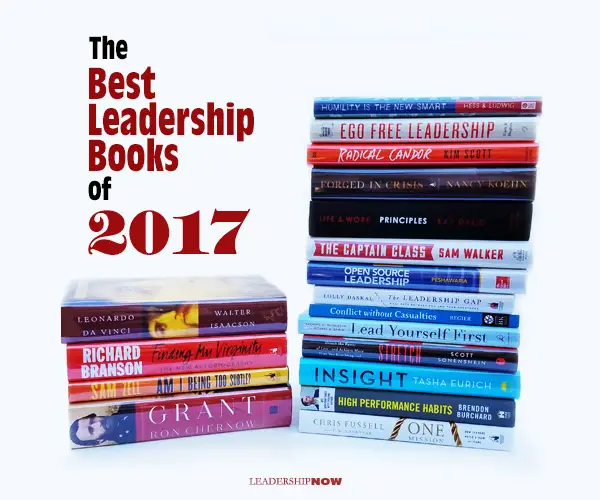 by Edward D. Hess and Katherine Ludwig Smart technologies will become ubiquitous, invading and changing many aspects of our professional and personal lives and in many ways challenging our fundamental beliefs about success, opportunity, and the American Dream. New skills will be needed. Uniquely human skills. Those skills, while uniquely human, are not what we are typically trained to do and require a deal of messy personal development. (Blog Post) by Brandon Black and Shayne Hughes “Anytime we know intellectually what to do, but our actual behavior is inconsistent or in contradiction, it is a sign we are being short-circuited by our egosystem. These behavioral derailers come in many forms: conflict avoidance, procrastination, defensiveness, people pleasing, shutting down, being argumentative, just to name a few.” (Blog Post) by Kim Scott Radical candor is a culture of guidance based on caring personally and challenging directly everyone you work with. The goal is to achieve collaboratively what you could never achieve individually, and to do that, you need to care about the people you’re working with. (Blog Post) by Nancy Koehn The crisis that can break one person can give birth to leadership in another. It’s a conscious choice to lead. Koehn brings out key lessons common to Ernest Shackleton, President Abraham Lincoln, legendary abolitionist Frederick Douglass, Nazi-resisting clergyman Dietrich Bonhoeffer, and environmental crusader Rachel Carson, as they struggled with their thoughts in what were do or die situations. (Blog Post) by Ray Dalio Ray Dalio, one of the world’s most successful investors and entrepreneurs, shares the unconventional principles that he’s developed, refined, and used over the past forty years to create unique results in both life and business—and which any person or organization can adopt to help achieve their goals. by Sam Walker The best leaders in sports history were not mesmerizing characters. They didn’t always make for great television. That’s what we’ve come to expect, however. So that’s what we continue to get. And so teams choose the wrong people to lead them. They promote people with the wrong characteristics. It’s typically not the player with the highest market value. What it takes to lead is not always what it seems. (Blog Post) by Rajeev Peshawaria Based on Peshawaria's research spanning 28 countries, he concludes that traditional industrial age thinking needs a massive upgrade to successfully navigating the brave new world of business. Open Source Leadership rewrites the rules of management, giving you a unique look at the most common misperceptions, illusions, and downright wrong information you’ve been getting about what works and what doesn’t. It provides a new, counterintuitive model for seizing competitive edge in any industry. by Lolly Daskal The gap in our leadership arises as a result of the disconnect between how we think people are experiencing our leadership and how they are actually experiencing our leadership. And where we find that disconnect we limit or even derail our leadership potential. (Blog Post) by Nate Regier The misuse of conflict energy is the biggest crisis facing our world, and that we haven’t even begun to harness the creative potential of conflict. When people embrace the fullest meaning of compassion as a process of “struggling with” others in creative conflict, they can transform lives, companies, and the world. (Blog Post) by Raymond M. Kethledge and Michael S. Erwin We live in an age of noise. Getting some time for yourself is a challenge. But if we are going to lead effectively, we need white space. We need solitude. You don’t have to go off to a mountaintop or sit at the seashore. It can be a closed room, the library, a park bench, and even a waiting room. We have a responsibility to seek out periods of solitude. We owe it to ourselves and those we lead. (Blog Post) by Scott Sonenshein Scott Sonenshein dispels the notion that having more resources = getting better results and replaces it with the conviction that a better use of resources = getting better results. Especially in uncertain times, “stretching equips us with the abilities to adapt and change when facing a less predictable set of circumstances.” (Blog Post) by Tasha Eurich Most people feel like they know themselves pretty well. But what if you could know yourself just a little bit better—and with this small improvement, get a big payoff…not just in your career, but in your life? by Brendon Burchard Based on one of the largest surveys ever conducted on high performers, it turns out that just six habits move the needle the most in helping you succeed. Adopt these six habits, and you win. Neglect them, and life is a never-ending struggle. by Chris Fussell with C. W. Goodyear In Team of Teams, retired four-star General Stanley McChrystal and former Navy SEAL Chris Fussell made the case for a new organizational model combining the agility, adaptability, and cohesion of a small team with the power and resources of a giant organization. Now, in One Mission, Fussell channels all his experiences, both military and corporate, into powerful strategies for unifying isolated and distrustful teams. Biographies: by Walter Isaacson Based on thousands of pages from Leonardo’s astonishing notebooks and new discoveries about his life and work, Walter Isaacson weaves a narrative that connects his art to his science. He shows how Leonardo’s genius was based on skills we can improve in ourselves, such as passionate curiosity, careful observation, and an imagination so playful that it flirted with fantasy. by Richard Branson Richard Branson titled his autobiography Finding My Virginity because “You can only lose your virginity once. But in every aspect of my life—building businesses, raising a family, embarking upon adventures—I try to do things for the first time every day.” He shares his ups and downs in his entertaining, candid style. “If your life is one long success story it won’t make for a good read. What's more, you’re most likely a liar. We all have ups and downs, trials and tribulations, failures and triumphs: we just hope to come out stronger on the other side.” (Blog Post) by Sam Zell Billionaire investor Sam Zell has put down on paper an account of the principles that guide how he does business in Am I Being Too Subtle? He advocates an owner/entrepreneurial mindset in business and life. “An owner is consumed with making the most out of what he already has. He’s all in. An entrepreneur is always looking for a new opportunity. He’s always reaching.” (Blog Post) by Ron Chernow “If there were many small things Grant didn’t know about the presidency, he knew one big thing: His main mission was to settle unfinished business from the war by preserving the Union and safeguarding the freed slaves.” Grants example is instructive for us today. Related Interest:
Posted by Michael McKinney at 12:07 AM
12.01.17

First Look: Leadership Books for December 2017Here's a look at some of the best leadership books to be released in December.    
For bulk orders call 1-800-423-8273  Build your leadership library with these specials on over 39 titles. All titles are at least 40% off the list price and are available only in limited quantities. "A capacity and taste for reading gives access to whatever has already been discovered by others." — Abraham Lincoln
Posted by Michael McKinney at 07:22 AM
11.08.17

Let’s Go Invent Tomorrow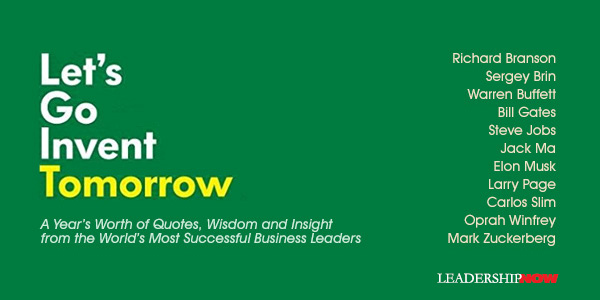
L Some are inspiring, and most are thought-provoking. You won’t agree with every opinion expressed, but you will gain a wider perspective to enhance your own. These successful business leaders share what worked and what didn’t work and more importantly how they approach their work. From Oprah Winfrey’s advice, “The key is not to worry about being successful but to instead work toward being significant—and the success will naturally follow. How can you serve your way to greatness?” to Warren Buffet’s advice on marriage, “Marry the right person. And I’m serious about that. It will make more difference in your life. It will change your aspiration, all kinds of things. It’s enormously important who you marry,” you will find insights to help you build a firmer foundation to grow from. 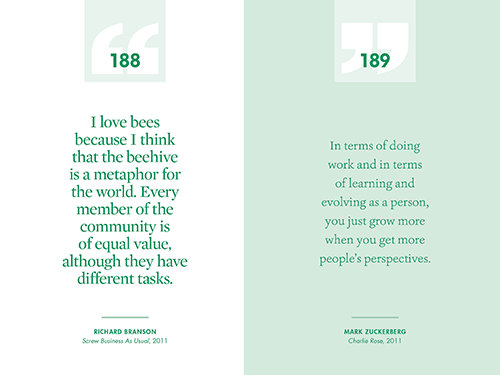 Gary Saul Morson wrote in The Words of Others: “Anatole France frankly advised, ‘When a thing has been said and said well, have no scruple. Take it and copy it.’ Yes, indeed, but do more. Copy many well-said things. Pierce them together. Assimilate them. Make the process of reading them a way to form the mind and shape the soul. As anthologies can never be complete, we will never exhaust the ways quotations can enrich our lives.” Let’s Go Invent Tomorrow will help “form the mind and shape the soul.” 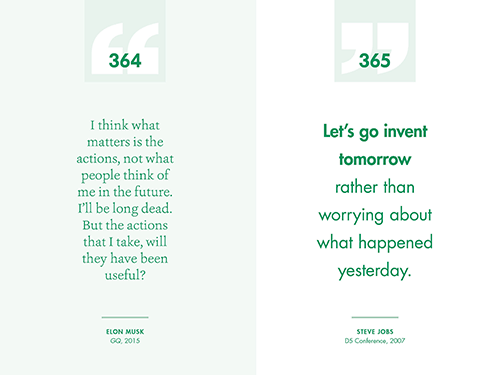 
Posted by Michael McKinney at 08:04 AM
11.01.17

First Look: Leadership Books for November 2017Here's a look at some of the best leadership books to be released in November.    
For bulk orders call 1-800-423-8273  Build your leadership library with these specials on over 39 titles. All titles are at least 40% off the list price and are available only in limited quantities. "Books are the quietest and most constant of friends; they are the most accessible and wisest of counselors, and the most patient of teachers." — Charles William Eliot
Posted by Michael McKinney at 07:37 AM
10.01.17

First Look: Leadership Books for October 2017Here's a look at some of the best leadership books to be released in October.    
For bulk orders call 1-800-423-8273  Build your leadership library with these specials on over 39 titles. All titles are at least 40% off the list price and are available only in limited quantities. "The habit of reading is the only enjoyment in which there is no alloy; it lasts when all other pleasures fade." — Anthony Trollope
Posted by Michael McKinney at 01:27 AM
09.01.17

First Look: Leadership Books for September 2017Here's a look at some of the best leadership books to be released in September.    
For bulk orders call 1-800-423-8273  Build your leadership library with these specials on over 39 titles. All titles are at least 40% off the list price and are available only in limited quantities. "Good friends, good books, and a sleepy conscience: this is the ideal life." — Mark Twain
Posted by Michael McKinney at 05:42 AM
08.01.17

First Look: Leadership Books for August 2017Here's a look at some of the best leadership books to be released in August.    
For bulk orders call 1-800-423-8273  Build your leadership library with these specials on over 39 titles. All titles are at least 40% off the list price and are available only in limited quantities. "A room without books is like a body without a soul." — Marcus Tullius Cicero
Posted by Michael McKinney at 08:27 AM
07.01.17

First Look: Leadership Books for July 2017Here's a look at some of the best leadership books to be released in July.    
For bulk orders call 1-800-423-8273  Build your leadership library with these specials on over 39 titles. All titles are at least 40% off the list price and are available only in limited quantities. "A room without books is like a body without a soul.” — Marcus Tullius Cicero
Posted by Michael McKinney at 03:15 PM
06.01.17

First Look: Leadership Books for June 2017Here's a look at some of the best leadership books to be released in June.    
For bulk orders call 1-800-423-8273  Build your leadership library with these specials on over 39 titles. All titles are at least 40% off the list price and are available only in limited quantities. "A room without books is like a body without a soul.” — Marcus Tullius Cicero
Posted by Michael McKinney at 08:50 AM
05.01.17

First Look: Leadership Books for May 2017Here's a look at some of the best leadership books to be released in May.    
For bulk orders call 1-800-423-8273
 Build your leadership library with these specials on over 39 titles. All titles are at least 40% off the list price and are available only in limited quantities. "Life-transforming ideas have always come to me through books.” — Bell Hooks
Posted by Michael McKinney at 07:58 AM
04.01.17

First Look: Leadership Books for April 2017Here's a look at some of the best leadership books to be released in April.    
For bulk orders call 1-800-423-8273  Build your leadership library with these specials on over 39 titles. All titles are at least 40% off the list price and are available only in limited quantities. "A book must be the axe for the frozen sea within us." — Franz Kafka
Posted by Michael McKinney at 07:58 AM
03.01.17

First Look: Leadership Books for March 2017Here's a look at some of the best leadership books to be released in March.    
For bulk orders call 1-800-423-8273
 Build your leadership library with these specials on over 39 titles. All titles are at least 40% off the list price and are available only in limited quantities. "A book must be the axe for the frozen sea within us." — Franz Kafka
Posted by Michael McKinney at 08:07 AM
02.01.17

First Look: Leadership Books for February 2017Here's a look at some of the best leadership books to be released in February.    
For bulk orders call 1-800-423-8273  Build your leadership library with these specials on over 100 titles. All titles are at least 40% off the list price and are available only in limited quantities. "It is what you read when you don't have to that determines who you will be when you can't help it." — Oscar Wilde
Posted by Michael McKinney at 09:32 AM
01.01.17

First Look: Leadership Books for January 2017Here's a look at some of the best leadership books to be released in January.    
For bulk orders call 1-800-423-8273  Build your leadership library with these specials on over 100 titles. All titles are at least 40% off the list price and are available only in limited quantities. "You stay teachable most by reading books. By reading what other people went through." — Retired Marine General James Mattis
Posted by Michael McKinney at 07:24 AM
12.25.16

The Best Leadership Books of 2016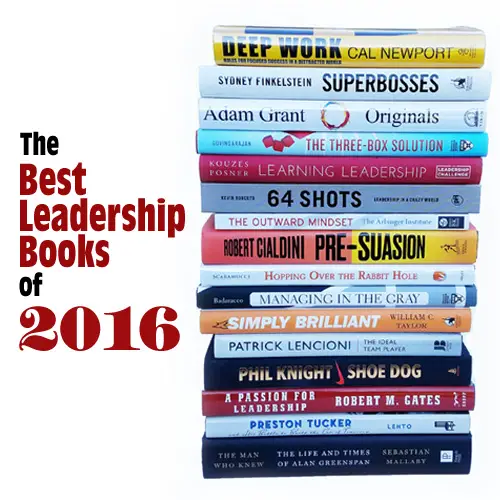
ONCE AGAIN we see that despite our rhetoric, what we are is reflected in our leaders and leadership. Actions have consequences and continuity of character matters. We need to be “urgently” reflective because too often by the time we find out it’s broken, it’s been broken for a very long time. As technology becomes more disruptive and we see more importance placed on big data and artificial intelligence, what will matter most are those things that make us human – the soft skills. Creating meaning, teaching, empathy, self control, creativity, emotional intelligence, and the ability to define consequences, will be indispensable skills to prosper in the future. In this uncertain environment, including the mounting global economic concerns, a humble mindset will be the only thing that will unlock the most promising business, social and economic innovations. An oversized ego inevitably leads to blindness and an inability to formulate good answers. by Cal Newport To thrive in the new economy—the current information economy—you need to master these two core abilities: 1. The ability to quickly master hard things. (If you can’t learn you can’t thrive.) and 2. The ability to produce at an elite level, in terms of both quality and speed. (To produce tangible results that people value.) These two abilities depend on your ability to perform deep work. “To succeed,” writes Newport, “you have to produce the absolute best stuff you’re capable of producing—a task that requires depth. A deep life is a good life.” (Blog Post) by Sydney Finkelstein Although Superbosses may differ in leadership styles, they share a playbook that leads to extraordinary success founded on making other people successful. Superbosses can be fierce or gentle, belligerent or self-depreciating, but whatever their style, they do a much better job inspiring and teaching because they get in their trenches with protégés, leading by example and giving them personalized attention they require to move up quickly. (Blog Post) by Adam Grant There are so few originals in life. “We find surface ways of appearing original—donning a bow tie, wearing bright red shoes—without taking the risk of actually being original. When it comes to the powerful ideas in our heads and the core values in our hearts, we censor ourselves.” Adam Grant demonstrates how originality, can and should be taught and nurtured. Anyone can innovate if given the opportunity and the support. He provides practical tools to “unleash” the hidden creativity in all of us. However, not just for ourselves but also to build cultures of originality both at home and at work. (Blog Post) by Vijay Govindarajan Ultimately our future is not in linear—incremental—improvements. It is in nonlinear—nonconforming, breakthrough—change. But the future is built in the now and that’s the problem. What should we be doing now to insure we have a future? Dartmouth professor Vijay Govindarajan writes, “As much as we might pay lip service to the fact that the future will differ dramatically from the past, we often behave as though it will be exactly the same.” There is a tension between and what we have to do now to continue on as an entity and what we need to be doing now to create our future along with the things that we are doing that get in our way of doing any of it. How do we create the future while managing the present? (Blog Post) by James M. Kouzes and Barry Z. Posner James M. Kouzes and Barry Z. Posner have written a new book that examines a fundamental question: How do people learn leadership? How do they learn to become leaders? Learning Leadership is a comprehensive guide to unleashing the inner-leader in us all and to building a solid foundation for a lifetime of leadership growth and mastery. The book offers a concrete framework to help individuals of all levels, functions, and backgrounds take charge of their own leadership development and become the best leaders they can be. (Blog Post) by Kevin Roberts In 64 Shots, Roberts draws on the biggest ideas, toughest experiences and greatest influences of his life to present 16X4 stripped down, straight-forward and instantly-absorbable insights on how to bring order to the chaos of business and life. The punchy insights into winning - hitting readers lightly jab after jab - are an array of one-liners, sound bites, tweets, charts, quotes and historical reference points. They are loaded with Roberts' experience, story, brio, provocation and direction. by The Arbinger Institute Unknowingly, too many of us operate from an inward mindset—a narrow-minded focus on self-centered goals and objectives. When faced with personal ineffectiveness or lagging organizational performance, most of us instinctively look for quick-fix behavioral band-aids, not recognizing the underlying mindset at the heart of our most persistent challenges. Through true stories and simple yet profound guidance and tools, The Outward Mindset enables individuals and organizations to make the one change that most dramatically improves performance, sparks collaboration, and accelerates innovation—a shift to an outward mindset. by Robert Cialdini The author of the legendary bestseller Influence, social psychologist Robert Cialdini shines a light on effective persuasion and reveals that the secret doesn’t lie in the message itself, but in the key moment before that message is delivered. What separates effective communicators from truly successful persuaders? Using the same combination of rigorous scientific research and accessibility that made his Influence an iconic bestseller, he explains how to capitalize on the essential window of time before you deliver an important message. This “privileged moment for change” prepares people to be receptive to a message before they experience it. Optimal persuasion is achieved only through optimal pre-suasion. In other words, to change “minds” a pre-suader must also change “states of mind.” by Anthony Scaramucci So much of successful entrepreneurship is learning to lead yourself. It requires some luck, but more than anything it means always pressing forward and a good dose of creativity especially when things don’t look good. It’s not surprising then that Anthony Scaramucci’s book, Hopping Over The Rabbit Hole is not just an important read for would-be entrepreneurs but anyone who looking move through life in a forward direction. (Blog Post) by Joseph L. Badaracco Jr. Joseph Badaracco offers five questions we should be asking to resolve the inevitable gray areas we will all face from time to time. Gray areas demand our best judgment. The five questions provide a way to get there. They are “a distinctive way of sizing up gray area issues, analyzing them carefully, grappling with their full, human complexity, and then—and only then—making final decisions.” (Blog Post) by William C. Taylor There's no such thing as an average or old-fashioned business, just average or old-fashioned ways to do business. In fact, the opportunity to reach for extraordinary may be most pronounced in settings that have been far too ordinary for far too long. The story of this book, its message for leaders who aim to do something important and build something great, is both simple and subversive: In a time of wrenching disruptions and exhilarating advances, of unrelenting turmoil and unlimited promise, the future is open to everybody. The thrill of breakthrough creativity and breakaway performance . . . can be summoned in all sorts of industries and all walks of life, if leaders can reimagine what’s possible in their fields. by Patrick M. Lencioni Beyond the fable, Lencioni presents a practical framework and actionable tools for identifying, hiring, and developing ideal team players. Whether you’re a leader trying to create a culture around teamwork, a staffing professional looking to hire real team players, or a team player wanting to improve yourself, this book will prove to be as useful as it is compelling. Biographies: by Phil Knight Nike founder and board chairman Phil Knight shares the inside story of the company’s early days as an intrepid start-up and its evolution into one of the world’s most iconic, game-changing, and profitable brands. Knight details the many terrifying risks he encountered along the way, the crushing setbacks, the ruthless competitors, the countless doubters and haters and hostile bankers—as well as his many thrilling triumphs and narrow escapes. Above all, he recalls the foundational relationships that formed the heart and soul of Nike. by Robert M Gates In a time when change is not just inevitable, but must be encouraged and led, Robert Gates’ A Passion for Leadership is a must read. Gates offers from experience, strategies, techniques, and principles for implementing change. He includes many examples from the organizations he has served. (Blog Post) by Steve Lehto Steve Lehto tackles the story of Tucker's amazing rise and tragic fall, relying on a huge trove of documents that has been used by no other writer to date. It is the first comprehensive, authoritative account of Tucker's magnificent car and his battles with the government. And in this book, Lehto finally answers the questions automobile aficionados have wondered about for decades: Exactly how and why was the production of such an innovative car killed? by Sebastian Mallaby This is definitive biography of the most important economic statesman of our time. It is the product of over five years of research based on untrammeled access to his subject and his closest professional and personal intimates, brings into vivid focus the mysterious point where the government and the economy meet. To understand Greenspan's story is to see the economic and political landscape of the last 30 years—and the presidency from Reagan to George W. Bush—in a whole new light. As the most influential economic statesman of his age, Greenspan spent a lifetime grappling with a momentous shift: the transformation of finance from the fixed and regulated system of the post-war era to the free-for-all of the past quarter century. The story of Greenspan is also the story of the making of modern finance, for good and for ill. Related Interest:
Posted by Michael McKinney at 09:32 AM
12.01.16

First Look: Leadership Books for December 2016Here's a look at some of the best leadership books to be released in December.    
For bulk orders call 1-800-423-8273  Build your leadership library with these specials on over 100 titles. All titles are at least 40% off the list price and are available only in limited quantities. "A capacity and taste for reading gives access to whatever has already been discovered by others." — Abraham Lincoln
Posted by Michael McKinney at 05:30 PM
11.01.16

First Look: Leadership Books for November 2016Here's a look at some of the best leadership books to be released in November.    
For bulk orders call 1-800-423-8273  Build your leadership library with these specials on over 100 titles. All titles are at least 40% off the list price and are available only in limited quantities. "It is better to read a little and ponder a lot than to read a lot and ponder a little." — Denis Parsons Burkitt
Posted by Michael McKinney at 02:02 PM
10.01.16

First Look: Leadership Books for October 2016Here's a look at some of the best leadership books to be released in October.    
For bulk orders call 1-800-423-8273  Build your leadership library with these specials on over 100 titles. All titles are at least 40% off the list price and are available only in limited quantities. "A room without books is like a body without a soul." — Marcus Tullius Cicero
Posted by Michael McKinney at 08:31 AM
09.01.16

First Look: Leadership Books for September 2016Here's a look at some of the best leadership books to be released in September.    
For bulk orders call 1-800-423-8273  Build your leadership library with these specials on over 100 titles. All titles are at least 40% off the list price and are available only in limited quantities. "You're the same today as you'll be in five years except for the people you meet and the books you read." — Charlie "Tremendous" Jones
Posted by Michael McKinney at 07:02 PM
08.01.16

First Look: Leadership Books for August 2016Here's a look at some of the best leadership books to be released in August.    
For bulk orders call 1-800-423-8273  Build your leadership library with these specials on over 100 titles. All titles are at least 40% off the list price and are available only in limited quantities. "The habit of reading is the only enjoyment in which there is no alloy; it lasts when all other pleasures fade." — Anthony Trollope
Posted by Michael McKinney at 11:13 AM
07.01.16

First Look: Leadership Books for July 2016Here's a look at some of the best leadership books to be released in July.    
For bulk orders call 1-800-423-8273  Build your leadership library with these specials on over 100 titles. All titles are at least 40% off the list price and are available only in limited quantities. "Wear the old coat and buy the new book." — Austin Phelps
Posted by Michael McKinney at 06:43 PM
06.01.16

First Look: Leadership Books for June 2016Here's a look at some of the best leadership books to be released in June.    
For bulk orders call 1-800-423-8273  Build your leadership library with these specials on over 100 titles. All titles are at least 40% off the list price and are available only in limited quantities. "The habit of reading is the only enjoyment in which there is no alloy; it lasts when all other pleasures fade." — Anthony Trollope
Posted by Michael McKinney at 08:56 AM
05.01.16

First Look: Leadership Books for May 2016Here's a look at some of the best leadership books to be released in May.




For bulk orders call 1-800-423-8273  Build your leadership library with these specials on over 100 titles. All titles are at least 40% off the list price and are available only in limited quantities. "Books serve to show a man that those original thoughts of his aren't very new after all." — Abraham Lincoln
Posted by Michael McKinney at 10:33 AM
04.01.16

First Look: Leadership Books for April 2016Here's a look at some of the best leadership books to be released in April.




For bulk orders call 1-800-423-8273  Build your leadership library with these specials on over 100 titles. All titles are at least 40% off the list price and are available only in limited quantities. “Books serve to show a man that those original thoughts of his aren’t very new after all.” — Abraham Lincoln
Posted by Michael McKinney at 05:29 AM
03.01.16

First Look: Leadership Books for March 2016Here's a look at some of the best leadership books to be released in March.




For bulk orders call 1-800-423-8273  Build your leadership library with these specials on over 100 titles. All titles are at least 40% off the list price and are available only in limited quantities. “A capacity and taste for reading gives access to whatever has already been discovered by others.” — Abraham Lincoln
Posted by Michael McKinney at 08:26 AM
02.01.16

First Look: Leadership Books for February 2016Here's a look at some of the best leadership books to be released in February.




For bulk orders call 1-800-423-8273  Build your leadership library with these specials on over 100 titles. All titles are at least 40% off the list price and are available only in limited quantities. “Seeing a book on my shelf reconnects me to the ideas inside. And that’s why I read.” — Michael Hyatt
Posted by Michael McKinney at 02:37 PM
01.01.16

First Look: Leadership Books for January 2016Here's a look at some of the best leadership books to be released in January.




For bulk orders call 1-800-423-8273  Build your leadership library with these specials on over 100 titles. All titles are at least 40% off the list price and are available only in limited quantities. “A house filled with books is a good place to live.” — Seth Godin
Posted by Michael McKinney at 10:23 AM
12.25.15

The Best Leadership Books of 2015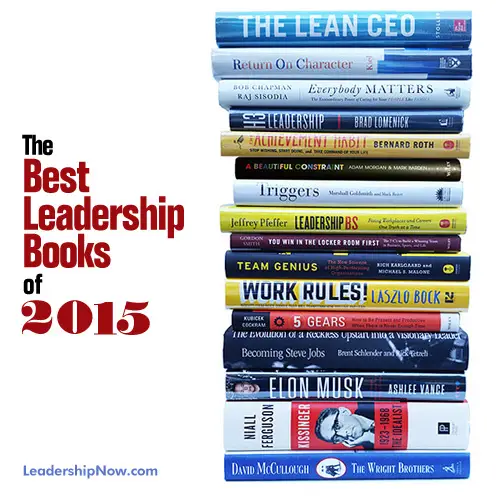
AS LEADERS it’s easy to get caught up in the moment. It’s hard to take the long-term view when we have to do the mundane. Learning to take the longer view is not easy. A long-term approach helps to take us out of our comfort zones because it connects us with a larger story. How in the midst of the mundane, the glut of information, and the tyranny of the now, can we remember that we are part of a larger—very human—story? From Everybody Matters which helps us to look at those we lead as family to Becoming Steve Jobs that looks at the development of a leader as a life-long process, the following books help us to do just that. Lead the larger story. by Jacob Stoller Lean is not just a manufacturing system. It is a way of thinking about people that applies to any organization. Lean is a culture. It’s not a directive. It’s a way of thinking. It is about being open and humble. It’s about diversity of thought and understanding that good ideas come from anywhere. The Lean CEO gets to the heart of what it means to lead from anywhere. (Blog Post) by Fred Kiel In Return on Character, Fred Kiel has put numbers to the notion that good leadership aimed at promoting the common good, not just individual, winner-take-all acquisition can be good business. (Blog Post) by Bob Chapman and Raj Sisodia Bob Chapman and Raj Sisodia tell how Barry-Wehmiller envisioned and implemented a new kind of business culture—a culture that puts people first and cares for employees like family—and turned it into years of highly profitable growth in a tough market. (Blog Post) by Brad Lomenick Brad Lomenick reflects on his leadership journey in H3 Leadership. Building on three H’s— Humble (Who am I?), Hungry (Where do I want to go?), and Hustle (How will I get there)—he gives us 20 habits to build our leadership on. The result is a very practical and challenging guidebook. (Blog Post) by Bernard Roth The Achievement Habit is a book about life. Bernard Roth has woven together wide variety of insights to help us to design our life and leadership. Using design thinking we can transform our behavior and relationships. Stop wishing, start doing, and take command of your life with the ideas presented here. (Blog Post) by Adam Morgan and Mark Barden Typically we look at a constraint as a negative. A problem to be solved. But what if a constraint was the gift that opened up previously unimagined possibilities? What if a constraint was the gift that took you to the next level? We can choose to use a constraint as an impetus to explore something new and arrive at a breakthrough. Not in spite of the constraint, but because of it. (Blog Post) by Marshall Goldsmith with Mark Reiter Marshall Goldsmith explains in Triggers the kinds of things in our environment that derail us from becoming the kind of leader, co-worker, parent, or spouse that we want to be. He illuminates an aspect of self-awareness that is so vital to a leader’s success. By creating an awareness of our environment and identifying our own triggers we can be a force for adding value in other people’s lives by triggering something good in others. (Blog Post) by Jeffrey Pfeffer Leadership BS is a compendium of human nature. It describes well the hypocrisy in all of us. We don’t always meet our own standards. We don’t always reward what we say we value. The real world doesn’t behave as it should. Leadership BS is an important book because it is a dose of reality. It is important for the questions it raises. (Blog Post) by Jon Gordon and Mike Smith Jon Gordon and NFL coach Mike Smith describe how to transform a mediocre team into a winning one. You Win in the Locker Room First provides leaders of all fields with a practical framework and real world examples to build a great culture, lead with the right mindset and approach, create strong relationships, improve teamwork, execute at a higher level, and avoid the pitfalls that sabotage far too many leaders and organizations. by Rich Karlgaard and Michael S. Malone “Teams are not strictly practical responses to immediate challenges and situations. Teams are at the heart of what it means to be human,” write Rich Karlgaard and Michael S. Malone. This book brings together both the best practices of today and the past, with the latest scientific research, to show leaders in every field how to build the dynamic, robust, and great teams they will need in order to compete in this new world. by Laszlo Bock Laszlo Bock shares how Google does it. Frequently unconventional, the ideas do resonate and beg to be tried in your organization. How does Google balance creativity and structure? If you’re comfortable with the amount of freedom you’ve given your employees, says Bock, you haven’t gone far enough. by Jeremie Kubicek and Steve Cockram “Every day, millions of people are negatively impacted by the inability of a person to connect appropriately and to be present.” So much drama is created when we don’t know how to shift gears and become present. 5 Gears offers an extremely valuable metaphor for identifying which gear you are in and finding the right gear at the right time in order to connect fully with others. The 5 Gears model gives you language to communicate which gear you are in to yourself and others, and to understand where others are at so that you can be more fully present. (Blog Post) Biographies: by Brent Schlender and Rick Tetzeli Becoming Steve Jobs looks at Jobs as a work in progress. “Steve is a great object lesson in someone who masterfully improved his ability to make better use of his strengths and to effectively mitigate those aspects of his personality that got in the way of those strengths.” And we can too. by Ashlee Vance Elon Musk is one of the most successful and important entrepreneurs in the world. Vance has written a fair portrait of Musk so far. That Musk is extremely persistent is clearly seen. At the same time he is very hard to work with. Comparisons with Steve Jobs are not off the mark. by Niall Ferguson Kissinger: 1923-1968 is the first volume in a two-volume biography. He was one of the most important foreign policy theorists and secretaries of state that America ever produced. Whether you agree with Kissinger or not, Ferguson provides interesting insights into the man and his thinking. by David McCullough The Wright brothers were more than just a couple of bicycle mechanics. They were convicted, determined and communicated well. They were a model of authenticity. They were basically self-taught with a well developed love of reading. Their character made their success very likely. Related Interest:
Posted by Michael McKinney at 02:54 AM
12.01.15

First Look: Leadership Books for December 2015Here's a look at some of the best leadership books to be released in December.




For bulk orders call 1-800-423-8273  Build your leadership library with these specials on over 100 titles. All titles are at least 40% off the list price and are available only in limited quantities. “A capacity and taste for reading gives access to whatever has already been discovered by others.” — Abraham Lincoln
Posted by Michael McKinney at 10:33 PM
11.01.15

First Look: Leadership Books for November 2015Here's a look at some of the best leadership books to be released in November.




For bulk orders call 1-800-423-8273  Build your leadership library with these specials on over 100 titles. All titles are at least 40% off the list price and are available only in limited quantities. “What is reading but silent conversation?” — Walter Savage Landor
Posted by Michael McKinney at 09:34 AM
10.01.15

First Look: Leadership Books for October 2015Here's a look at some of the best leadership books to be released in October.




For bulk orders call 1-800-423-8273  Build your leadership library with these specials on over 100 titles. All titles are at least 40% off the list price and are available only in limited quantities. “The reading of all good books is like conversation with the finest men of the past centuries.” — Descartes
Posted by Michael McKinney at 09:09 AM
09.01.15

First Look: Leadership Books for September 2015Here's a look at some of the best leadership books to be released in September.




For bulk orders call 1-800-423-8273  Build your leadership library with these specials on over 100 titles. All titles are at least 40% off the list price and are available only in limited quantities. “Reading without reflecting is like eating without digesting.” — Edmund Burke
Posted by Michael McKinney at 08:01 AM
08.01.15

First Look: Leadership Books for August 2015Here's a look at some of the best leadership books to be released in August.




For bulk orders call 1-800-423-8273  Build your leadership library with these specials on over 100 titles. All titles are at least 40% off the list price and are available only in limited quantities. “The reading of all good books is like conversation with the finest men of the past centuries.” — Descartes
Posted by Michael McKinney at 04:28 AM
07.01.15

First Look: Leadership Books for July 2015Here's a look at some of the best leadership books to be released in July.




For bulk orders call 1-800-423-8273  Build your leadership library with these specials on over 100 titles. All titles are at least 40% off the list price and are available only in limited quantities. “Wear the old coat and buy the new book.” — Austin Phelps
Posted by Michael McKinney at 09:16 AM
06.01.15

First Look: Leadership Books for June 2015Here's a look at some of the best leadership books to be released in June.




For bulk orders call 1-800-423-8273  Build your leadership library with these specials on over 100 titles. All titles are at least 40% off the list price and are available only in limited quantities. “Books are the quietest and most constant of friends; they are the most accessible and wisest of counselors, and the most patient of teachers.” — Charles William Eliot
Posted by Michael McKinney at 06:20 PM
05.01.15

First Look: Leadership Books for May 2015Here's a look at some of the best leadership books to be released in May.




For bulk orders call 1-800-423-8273  Build your leadership library with these specials on over 100 titles. All titles are at least 40% off the list price and are available only in limited quantities. “The things I want to know are in books; my best friend is the man who'll get me a book I ain't read.” — Abraham Lincoln
Posted by Michael McKinney at 08:28 AM
04.01.15

First Look: Leadership Books for April 2015Here's a look at some of the best leadership books to be released in April.




For bulk orders call 1-800-423-8273  Build your leadership library with these specials on over 100 titles. All titles are at least 40% off the list price and are available only in limited quantities.
Posted by Michael McKinney at 08:10 AM
03.01.15

First Look: Leadership Books for March 2015Here's a look at some of the best leadership books to be released in March.




For bulk orders call 1-800-423-8273  Build your leadership library with these specials on over 100 titles. All titles are at least 40% off the list price and are available only in limited quantities. “We read to know we are not alone.” — C.S. Lewis
Posted by Michael McKinney at 06:38 PM
02.01.15

First Look: Leadership Books for February 2015Here's a look at some of the best leadership books to be released in February.




For bulk orders call 1-800-423-8273  Build your leadership library with these specials on over 100 titles. All titles are at least 40% off the list price and are available only in limited quantities. “Wear the old coat and buy the new book.” — Austin Phelps
Posted by Michael McKinney at 08:16 AM
01.01.15

First Look: Leadership Books for January 2015Here's a look at some of the best leadership books to be released in January.



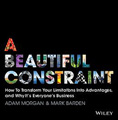
For bulk orders call 1-800-423-8273  Build your leadership library with these specials on over 100 titles. All titles are at least 40% off the list price and are available only in limited quantities. “Beware of the person of one book.” — Thomas Aquinas
Posted by Michael McKinney at 12:20 AM
12.25.14

The Best Leadership Books of 2014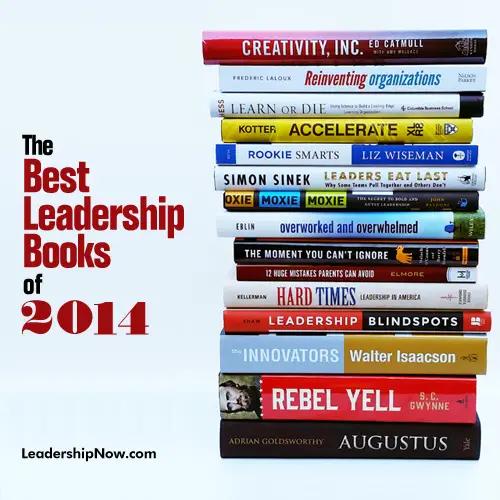
AS LEADERS we must learn and grow. We must be creative and innovative in our organizations but perhaps more importantly, in working on ourselves. The context we lead in requires nothing short of radical personal development. All of the following titles cover an aspect of this need. An environment of rapid change demands more and better questions from us. It means we step out of our comfort zones and take strategic and intentional steps even before the path comes into full view. We can’t see around every corner, but we can listen more purposefully, think more critically, and see more clearly. Respond to a random world with an intentional life. by Ed Catmull and Amy Wallace Creativity, Inc. is an excellent resource full of the practical application of principles and insights. Catmull’s Bottom-line: “Unleashing creativity requires that we loosen controls, accept risk, trust our colleagues, work to clear the path for them, and pay attention to anything that creates fear.” (Blog Post) by Frederic Laloux Based on three years of research, Reinventing Organizations describes the emergence of a new management paradigm, a radically more soulful, purposeful and powerful ways to structure and run any organization. by Edward D. Hess Learn or Die is a book everyone who is serious about learning and growth—personally or organizationally—should read. If you thought you were serious about it, Learn or Die will take you to a whole new level with tools, case studies, and insights that will challenge your commitment to learning. (Blog Post) by John P. Kotter For most companies, the hierarchy is the singular operating system at the heart of the firm. But the reality is, this system simply is not built for an environment where change has become the norm. John Kotter advocates a new system—a second, more agile, network-like structure that operates in concert with the hierarchy to create what he calls a “dual operating system”—one that allows companies to capitalize on rapid-fire strategic challenges and still make their numbers. (Blog Post) by Liz Wiseman Experience has its upside but its downside may hold us back more than we think. What we know will likely impede our ability to learn and therefore perform. We need get off the career ladder and get onto a learning curve. Wiseman says, “We do our best work when we are new to something, striving up that steep ascent.” We need to be a perpetual rookie. (Blog Post) by Simon Sinek The title of the book—Leaders Eat Last—comes from a conversation with a Marine Corps general. He said, “Officers eat last.” Sinek watched as the most junior Marines ate first while the most senior Marines took their place at the back of the line. What’s symbolic in the chow hall is deadly serious on the battlefield: great leaders sacrifice their own comfort—even their own survival—for the good of those in their care. In a world where far too many leaders are looking out for themselves, Sinek offers numerous insights about the kind of sacrifice required to be a great leader. (Blog Post) by John Baldoni Moxie is full of great stories and examples making it immediately relatable and practical. It is structured so that you can thoughtfully and tactically look at each of these areas to see where you can better prepare yourself. Baldoni also provides an appendix that works as a handbook to guide you in this. Questions, examples, additional thoughts and action steps help you access where you are at and what you might need to do next. (Blog Post) by Scott Eblin Solving the Overworked and Overwhelmed problem does not have a one-size-fits-all solution. What Scott Eblin does is guide you in learning to work differently — mindfully — so you are more clear about the results that most merit your time and attention and how you need to show up to offer your highest and best contributions as a professional and as a person. The answer for you is at the intersection of awareness and intention. (Blog Post) by Malachi O'Connor and Barry Dornfeld The Moment You Can’t Ignore helps us to look at those things we often don’t want to address if organizational success is our primary focus. O’Connor and Dornfield note that “Culture is not the solution to every challenge, but it is the source material from which solutions can be drawn.” (Blog Post) by Tim Elmore Tim Elmore understands the development of young people like few others do. He highlights the consequences of the well-intentioned but damaging approaches we sometimes take to prepare our kids for success in life. We must be nurturers and trainers and understand what hinders their growth and what equips them to be great adults. by Barbara Kellerman Barbara Kellerman turns her attention to the often overlooked context in which we lead. Leaders followers, and context form a system of leadership. “More than ever,” writes Kellerman, “it is better—better in practice and better in theory—to focus less on the leader and more on the leadership system.” It is difficult to navigate or change systems without understanding the underlying context they exist in. (Blog Post) by Robert Bruce Shaw Blindspots are not just the result of not viewing ourselves accurately, they can be the result of the way we view he world. Leadership Blindspots helps you to see the various ways we fail to see ourselves and our actions accurately and how we can put mechanisms in place to prevent the filtering and distortion of information for ourselves and our organizations. (Blog Post) Biographies: by Walter Isaacson The Innovators is a biography of more than 60 individuals, partnerships and teams that created the digital revolution. Isaacson makes the point that innovation happens in the real world by teams and not lone geniuses. Our emphasis on heroes exaggerates the contributions of individuals and vastly underestimates incremental improvements over time. Isaacson examines too the role of the organizational forms within which innovation takes place—like Bell Labs. by S. C. Gwynne Rebel Yell is a very well written biography of Stonewall Jackson—a name that still creates controversy. While his best qualities were seen on the field of battle, you will find much you can learn from his leadership—both good and bad. What he might have contributed after the war, we'll never know as he died of complications from pneumonia on May 10, 1863 after being shot by a Confederate sentry during the Battle of Chancellorsville. by Adrian Goldsworthy Goldsworthy’s biography of Augustus is about the man and the social and political climate in which he maneuvered. The author writes, “I place his story in his times and describe the events and personalities that affected him. Shipwrecks, human sacrifice, hairbreadth escapes, unbridled sex, battles on land and at sea, ambushes, family scandals, and above all the unforgiving pursuit of absolute power. Augustus lived out an extraordinary and often terrifying drama.” There are interesting parallels to our own times. Related Interest:
Posted by Michael McKinney at 03:50 PM
12.01.14

First Look: Leadership Books for December 2014Here's a look at some of the best leadership books to be released in December.




For bulk orders call 1-800-423-8273  Build your leadership library with these specials on over 100 titles. All titles are at least 40% off the list price and are available only in limited quantities. “ I think of life as a good book. The further you get into it, the more it begins to make sense.” — Harold Kushner
Posted by Michael McKinney at 08:46 AM
11.01.14

First Look: Leadership Books for November 2014Here's a look at some of the best leadership books to be released in November.




For bulk orders call 1-800-423-8273  Build your leadership library with these specials on over 100 titles. All titles are at least 40% off the list price and are available only in limited quantities. “I find television very educating. Every time somebody turns on the set, I go into the other room and read a book.” — Groucho Marx
Posted by Michael McKinney at 08:33 AM
10.01.14

First Look: Leadership Books for October 2014Here's a look at some of the best leadership books to be released in October.




For bulk orders call 1-800-423-8273  Build your leadership library with these specials on over 100 titles. All titles are at least 40% off the list price and are available only in limited quantities. “No two persons ever read the same book.” — Edmund Wilson
Posted by Michael McKinney at 03:25 PM
09.01.14

First Look: Leadership Books for September 2014Here's a look at some of the best leadership books to be released in September.




For bulk orders call 1-800-423-8273  Build your leadership library with these specials on over 100 titles. All titles are at least 40% off the list price and are available only in limited quantities. “No two persons ever read the same book.” — Edmund Wilson
Posted by Michael McKinney at 10:19 AM
08.01.14

First Look: Leadership Books for August 2014Here's a look at some of the best leadership books to be released in August.




For bulk orders call 1-800-423-8273  Build your leadership library with these specials on over 118 titles. All titles are at least 40% off the list price and are available only in limited quantities.
Posted by Michael McKinney at 07:33 AM
07.01.14

First Look: Leadership Books for July 2014Here's a look at some of the best leadership books to be released in July.




For bulk orders call 1-800-423-8273  Build your leadership library with these specials on over 118 titles. All titles are at least 40% off the list price and are available only in limited quantities.
Posted by Michael McKinney at 08:56 AM
06.01.14

First Look: Leadership Books for June 2014Here's a look at some of the best leadership books to be released in June.




For bulk orders call 1-800-423-8273  Build your leadership library with these specials on over 118 titles. All titles are at least 40% off the list price and are available only in limited quantities. “If we find a man of rare intellect,we should ask him what books he reads.” — Ralph Waldo Emerson
Posted by Michael McKinney at 12:29 PM
05.01.14

First Look: Leadership Books for May 2014Here's a look at some of the best leadership books to be released in May.




For bulk orders call 1-800-423-8273  Build your leadership library with these specials on over 118 titles. All titles are at least 40% off the list price and are available only in limited quantities. “A room without books is like a body without a soul.” — Cicero
Posted by Michael McKinney at 12:17 PM
04.01.14

First Look: Leadership Books for April 2014Here's a look at some of the best leadership books to be released in April.




For bulk orders call 1-800-423-8273  Build your leadership library with these specials on over 120 titles. All titles are at least 40% off the list price and are available only in limited quantities.
Posted by Michael McKinney at 01:01 AM
03.01.14

First Look: Leadership Books for March 2014Here's a look at some of the best leadership books to be released in March.




For bulk orders call 1-800-423-8273  Build your leadership library with these specials on over 120 titles. All titles are at least 40% off the list price and are available only in limited quantities. “The reading of all good books is like conversation with the finest men of the past centuries.” — Descartes
Posted by Michael McKinney at 07:23 AM
02.01.14

First Look: Leadership Books for February 2014Here's a look at some of the best leadership books to be released in February.




For bulk orders call 1-800-423-8273  Build your leadership library with these specials on over 120 titles. All titles are at least 40% off the list price and are available only in limited quantities. “Don't use words too big for the subject. Don't say infinitely when you mean very; otherwise you'll have no word left when you want to talk about something really infinite.” — C.S. Lewis
Posted by Michael McKinney at 07:08 AM
01.01.14

First Look: Leadership Books for January 2014Here's a look at some of the best leadership books to be released in January.




For bulk orders call 1-800-423-8273  Build your leadership library with these specials on over 120 titles. All titles are at least 40% off the list price and are available only in limited quantities.
Posted by Michael McKinney at 12:55 AM
12.25.13

Best Leadership Books of 2013
LEADERSHIP IS is an inside job. All of these titles help us to look at ourselves more deeply by asking the right questions. Sustainable leadership is a direct result of leaders that encourage feedback, listen and act positively on the information they receive to take their leadership effectiveness to the next level. Leadership is about relationships. Building your leadership legacy is about building others. You will be remembered through the growth of the people you leveraged your leadership power for. Are the people around you flourishing? The list below represents my picks for the best leadership books of 2013. by Steven Snyder Struggles are an inevitable part of the leadership journey. With every episode of struggle, there is a learning opportunity. Steven Snyder offers insights as how we should accept and reconcile the struggles we experience. (Blog Post) by Tom Asacker In The Business of Belief, Tom Asacker describes the job of leadership from the perspective of beliefs—yours and theirs. Understanding people’s beliefs is the first step in leading them. It's a critical message that every leader should read. (Blog Post) by Phil Jackson and Hugh Delehanty Phil Jackson offers 11 insights that transform ordinary leadership into great leadership. His 11 Principle's of Mindful Leadership are about leading with outgoing concern for others and good character. These principles should be a part of your personal leadership development plan. (Blog Post) by Todd Henry Todd Henry asks, “Are we willing to spend ourselves on behalf of something we care about?” Be purposeful about how you spend your time. As many people become more and more successful, comfort becomes their objective. We cannot pursue comfort as an objective. That’s the path to mediocrity. You cannot pursue comfort and great works simultaneously. Your work should represent what you care about. Will you die full of unexecuted ideas or will you die empty? (Blog Post) by Joseph L. Badaracco Jr. Underlying your leadership are certain values and assumptions. Leading responsibly and successfully is a struggle. Badaracco poses five questions leaders need to answer. The answers will guide and ground your choices in a world of widely divergent forces. (Blog Post) by Mike Myatt We all have gaps in our leadership. Hacking Leadership is for leaders who feel that their performance falls short of their potential and who want to know why. Myatt addresses 11 gaps from hacking perfection to hacking the future. He asks, “Do you want to be a leader who simply does what’s expected, or do you want to be a leader who makes what if a reality?” As a leader, you need to be focused on stretching yourself—hacking your leadership gaps. by David Burkus Creativity is not as divinely-inspired, unpredictable and random a gift as we tend to think it is. These persistent myths hinder our creativity and limit our ability to produce real creative thinking. Burkus debunks ten of these myths like the Eureka Myth, the Lone Creator Myth, and the Brainstorming Myth, to help us understand how to ignite what is already inside of us. by Nassim Nicholas Taleb Just as human bones get stronger when subjected to stress and tension, and rumors or riots intensify when someone tries to repress them, many things in life benefit from stress, disorder, volatility, and turmoil. What Taleb has identified and calls “antifragile” is that category of things that not only gain from chaos but need it in order to survive and flourish. Overly protective leadership can lead to more fragile followers. Very practical insights here. (Blog Post) by Bob Lutz Bob Lutz offer practical insights into leaders and leadership. Great leaders do not possess all of the ingredients we might think they must. It’s always a blend of good and bad. But, in Lutz’s words, the value they bring to the table consistently and heavily outweighs the negative baggage. Very encouraging for us mere mortals. by Adam M. Grant Every time we interact with another person at work, we have a choice to make: do we try to claim as much value as we can, or contribute value without worrying about what we receive in return? In the workplace, says Adam Grant, givers are a relatively rare breed. Are You a Giver or a Taker? (Blog Post) by August Turak Business Secrets of the Trappist Monks is about service and selflessness—two foundational ideas of good leadership. A reflective reading of this book will cause you to look more deeply into your own motivations and behaviors, live authentically and lead from who you are. Service and selflessness have the moral force to transcend market forces. by Gary Klein Gary Klein says that organizations stifle insights because we value predictability and crave perfection more than we value the disruption they bring. A better understanding of the nature of insights will help us to welcome them and make better use of them rather than suppressing them before they see the light of day. (Blog Post) Biographies: by Doris Kearns Goodwin Goodwin explores in detail the communication styles of William Howard Taft and Theodore Roosevelt. Taft’s failure as a public leader underscores the pivotal importance of the bully pulpit—that “wonderful platform” from which the presidency shapes public sentiment and mobilize action —in presidential leadership. It’s an engaging story of the relationship between Roosevelt, Taft and the muckraking press. by Brad Stone The Everything Store is an interesting account of the rise of Amazon and one of the world's leading entrepreneurs, Jeff Bezos. We learn about Bezos’ values and vision as well as his blind spots. There are lessons to be learned in all of it. by Richard Snow This is a well told story of Henry Ford’s rise from farm boy to one of America’s greatest industrialists. Snow portrays Ford with all of his strengths and weaknesses and the consequences of each. A study of Ford’s life provides insights into the world we live in today. Related Interest:
Posted by Michael McKinney at 02:38 PM
12.01.13

First Look: Leadership Books for December 2013Here's a look at some of the best leadership books to be released in December.




For bulk orders call 1-800-423-8273 From Independent Publishers:  Thoughts Spoken from the Heart by Lolly Daskal Thoughts Spoken from the Heart by Lolly DaskalDaskal has put together over 500 thoughts that bring meaning to your life. Her hope is that “each thought will provide you with a meaningful perspective of yourself and the word around you.”  Build your leadership library with these specials on over 120 titles. All titles are at least 40% off the list price and are available only in limited quantities.
Posted by Michael McKinney at 06:02 PM
11.01.13

First Look: Leadership Books for November 2013Here's a look at some of the best leadership books to be released in November.




For bulk orders call 1-800-423-8273  Build your leadership library with these specials on over 120 titles. All titles are at least 40% off the list price and are available only in limited quantities. “He that loves a book will never want a faithful friend, a wholesome counselor, a cheerful companion, an effectual comforter.” — Isaac Barrow (1630–1677)
Posted by Michael McKinney at 09:40 AM
10.01.13

First Look: Leadership Books for October 2013Here's a look at some of the best leadership books to be released in October.




For bulk orders call 1-800-423-8273  Build your leadership library with these specials on over 120 titles. All titles are at least 40% off the list price and are available only in limited quantities. “A capacity and taste for reading gives access to whatever has already been discovered by others.” — Abraham Lincoln
Posted by Michael McKinney at 12:11 AM
09.01.13

First Look: Leadership Books for September 2013Here's a look at some of the best leadership books to be released in September.




For bulk orders call 1-800-423-8273  Build your leadership library with these specials on over 120 titles. All titles are at least 40% off the list price and are available only in limited quantities. “To read is to fly: it is to soar to a point of vantage which gives a view over wide terrains of history, human variety, ideas, shared experience and the fruits of many inquiries.” — A C Grayling
Posted by Michael McKinney at 10:41 AM
08.01.13

First Look: Leadership Books for August 2013Here's a look at some of the best leadership books to be released in August.




For bulk orders call 1-800-423-8273  Build your leadership library with these specials on over 120 titles. All titles are at least 40% off the list price and are available only in limited quantities. “There are worse crimes than burning books. One of them is not reading them.” — Joseph Brodsky
Posted by Michael McKinney at 12:21 AM
07.01.13

First Look: Leadership Books for July 2013Here's a look at some of the best leadership books to be released in July.




For bulk orders call 1-800-423-8273  Build your leadership library with these specials on over 120 titles. All titles are at least 40% off the list price and are available only in limited quantities.
Posted by Michael McKinney at 12:30 AM
06.01.13

First Look: Leadership Books for June 2013Here's a look at some of the best leadership books to be released in June.




For bulk orders call 1-800-423-8273  Build your leadership library with these specials on over 120 titles. All titles are at least 40% off the list price and are available only in limited quantities. “What is reading but silent conversation?” — Walter Savage Landor
Posted by Michael McKinney at 10:05 AM
05.01.13

First Look: Leadership Books for May 2013Here's a look at some of the best leadership books to be released in May.




For bulk orders call 1-800-423-8273  Build your leadership library with these specials on over 120 titles. All titles are at least 40% off the list price and are available only in limited quantities. “You cannot open a book without learning something.” — Confucius
Posted by Michael McKinney at 01:01 AM
04.01.13

First Look: Leadership Books for March 2013Here's a look at some of the best leadership books to be released in March.




For bulk orders call 1-800-423-8273  Build your leadership library with these specials on over 120 titles. All titles are at least 40% off the list price and are available only in limited quantities.
Posted by Michael McKinney at 07:09 AM
03.01.13

First Look: Leadership Books for March 2013Here's a look at some of the best leadership books to be released in March.




For bulk orders call 1-800-423-8273  Build your leadership library with these specials on over 120 titles. All titles are at least 40% off the list price and are available only in limited quantities.
Posted by Michael McKinney at 07:19 AM
02.01.13

First Look: Leadership Books for February 2013Here's a look at some of the best leadership books to be released in February.




For bulk orders call 1-800-423-8273  Build your leadership library with these specials on over 120 titles. All titles are at least 40% off the list price and are available only in limited quantities.
Posted by Michael McKinney at 12:59 AM
01.01.13

First Look: Leadership Books for January 2013Here's a look at some of the best leadership books to be released in January.




For bulk orders call 1-800-423-8273  Build your leadership library with these specials on over 120 titles. All titles are at least 40% off the list price and are available only in limited quantities. “Today a reader, tomorrow a leader.” — Margaret Fuller
Posted by Michael McKinney at 12:00 AM
12.25.12

Best Leadership Books of 2012
THE WAYS we have thought about leadership have not always served us well. We have tended to think of leadership as something outside and above the rest. If leadership isn’t among, it will let us down. Hierarchies are still important, but they must allow for freedom to act, think, and experiment in a way that encourages individual growth. Moving ahead we need more clarity. We need to look at what we do with fresh eyes. As Andy Grove said to Gordon Moore, after a year of aimless wandering, “If we got kicked out and the board brought in a new CEO, what do you think he would do? … Why shouldn’t you and I walk out the door, come back, and do it ourselves?” We need to step back and take another look. We have become mired in the organizational processes that are no longer relevant to the world we live in. It requires taking a fearless inventory of all that we do. And that takes courage. Looking beyond the immediate result we seek or problem we are trying to solve or skirt, we need to continually ask, “What message are we sending?” What is your approach to leadership? How is that helping or hindering others? How has your leadership style changed? Are we sending the right message? The list below represents my picks for the best leadership books of 2012. All of these books have helped us to look at the what and ask why? Biographies: Related Interest:
Posted by Michael McKinney at 05:54 PM
12.01.12

First Look: Leadership Books for December 2012Here's a look at some of the best leadership books to be released in December.




For bulk orders call 1-800-423-8273  Build your leadership library with these specials on over 120 titles. All titles are at least 40% off the list price and are available only in limited quantities. “When you sell a man a book you don't sell him just 12 ounces of paper and ink and glue - you sell him a whole new life.” — Christopher Morley
Posted by Michael McKinney at 06:49 PM
11.01.12

First Look: Leadership Books for November 2012Here's a look at some of the best leadership books to be released in November.




For bulk orders call 1-800-423-8273  Build your leadership library with these specials on over 120 titles. All titles are at least 40% off the list price and are available only in limited quantities. “No two persons ever read the same book.” — Edmund Wilson
Posted by Michael McKinney at 01:03 AM
10.01.12

First Look: Leadership Books for October 2012Here's a look at some of the best leadership books to be released in October.




For bulk orders call 1-800-423-8273  Build your leadership library with these specials on over 120 titles. All titles are at least 40% off the list price and are available only in limited quantities. “If we encounter a man of rare intellect, we should ask him what books he reads.” — Ralph Waldo Emerson
Posted by Michael McKinney at 12:00 AM
09.01.12

First Look: Leadership Books for September 2012Here's a look at some of the best leadership books to be released in September.




For bulk orders call 1-800-423-8273  Build your leadership library with these specials on over 120 titles. All titles are at least 40% off the list price and are available only in limited quantities.
Posted by Michael McKinney at 10:24 PM
08.01.12

First Look: Leadership Books for August 2012Here's a look at some of the best leadership books to be released in August.




For bulk orders call 1-800-423-8273  Build your leadership library with these specials on over 120 titles. All titles are at least 40% off the list price and are available only in limited quantities. “I find television very educating. Every time somebody turns on the set, I go into the other room and read a book.” — Groucho Marx
Posted by Michael McKinney at 07:00 AM
07.01.12

First Look: Leadership Books for July 2012Here's a look at some of the best leadership books to be released in July.




For bulk orders call 1-800-423-8273  Build your leadership library with these specials on over 120 titles. All titles are at least 40% off the list price and are available only in limited quantities.
Posted by Michael McKinney at 10:56 AM
06.01.12

First Look: Leadership Books for June 2012Here's a look at some of the best leadership books to be released in June.




For bulk orders call 1-800-423-8273  Build your leadership library with these specials on over 120 titles. All titles are at least 40% off the list price and are available only in limited quantities.
Posted by Michael McKinney at 12:08 AM
05.01.12

First Look: Leadership Books for May 2012Here's a look at some of the best leadership books to be released in May.




For bulk orders call 1-800-423-8273  Build your leadership library with these specials on over 120 titles. All titles are at least 40% off the list price and are available only in limited quantities. “You are the same today you’ll be five years from now except for the books you read and the people you meet.” — Charlie Tremendous Jones
Posted by Michael McKinney at 08:01 AM
04.01.12

First Look: Leadership Books for April 2012Here's a look at some of the best leadership books to be released in April.




For bulk orders call 1-800-423-8273  Build your leadership library with these specials on over 120 titles. All titles are at least 40% off the list price and are available only in limited quantities. “To learn to read is to light a fire; every syllable that is spelled out is a spark.” — Victor Hugo
Posted by Michael McKinney at 09:00 AM
03.01.12

First Look: Leadership Books for March 2012Here's a look at some of the best leadership books to be released in March.




For bulk orders call 1-800-423-8273  Build your leadership library with these specials on over 120 titles. All titles are at least 40% off the list price and are available only in limited quantities. “Have given up reading books; I find it takes my mind off myself.” — Oscar Levant
Posted by Michael McKinney at 12:03 AM
02.01.12

First Look: Leadership Books for February 2012Here's a look at some of the best leadership books to be released in February.




For bulk orders call 1-800-423-8273  Build your leadership library with these specials on over 120 titles. All titles are at least 40% off the list price and are available only in limited quantities. “Every reader finds himself. The writer's work is merely a kind of optical instrument that makes it possible for the reader to discern what, without this book, he would perhaps never have seen in himself.” — Marcel Proust
Posted by Michael McKinney at 12:02 AM
01.01.12

First Look: Leadership Books for January 2012Here's a look at some of the best leadership books to be released in January.




For bulk orders call 1-800-423-8273  Build your leadership library with these specials on over 120 titles. All titles are at least 40% off the list price and are available only in limited quantities. "He that loves a book will never want a faithful friend, a wholesome counselor, a cheerful companion, an effectual comforter. By study, by reading, by thinking, one may innocently divert and pleasantly entertain himself, as in all weathers, as in all fortunes." — Isaac Barrow
Posted by Michael McKinney at 02:26 PM
12.25.11

Best Leadership Books of 2011
WE HAVE more recorded information about leadership now than at any other time in history. Most of it deals with the surface turbulence, which is important but not complete. In all of this information there is the sense too, that perhaps we have lost the wisdom we need and that maybe some new thing will help us to avoid what we already know and don’t want to do. For the most part, it’s still business-as-usual within the same framework—control. It’s hard to give up fundamental beliefs even though they really aren’t working for us anymore. These books speak to our need to rethink our core thinking, beliefs and motivations—to do the uncomfortable. We could all benefit from daily reflection. Reflecting on what we believe, who we are in relation to those we serve, and what it means to do what we do. It’s time to rediscover true leadership—to rethink our fundamental assumptions. Leadership matters now more than ever. Biographies: Related Interest: 
Posted by Michael McKinney at 03:28 PM
12.01.11

First Look: Leadership Books for December 2011Here's a look at some of the best leadership books to be released in December.




For bulk orders call 1-800-423-8273  Build your leadership library with these specials on over 120 titles. All titles are at least 40% off the list price and are available only in limited quantities.
Posted by Michael McKinney at 12:09 AM
11.01.11

First Look: Leadership Books for November 2011Here's a look at some of the best leadership books to be released in November.




For bulk orders call 1-800-423-8273  Build your leadership library with these specials on over 120 titles. All titles are at least 40% off the list price and are available only in limited quantities. Jacqueline Kennedy on JFK: "He’d read walking, he’d read at the table, at meals, he’d read after dinner, he’d read in the bathtub, he’d read—prop open a book on his desk—on his bureau—while he was doing his tie. You know, he’d just read a little, he’d open some book I’d be reading, you know, just devour it. He’d really read all the times you don’t think you have time to read."
Posted by Michael McKinney at 11:30 AM
10.06.11

Stimulus Package 4 - Free Book: Up, Down, or Sideways Here’s a stimulus package to get you thinking. It’s a package designed to serve as a catalyst to help you to find ways to make things work and get things done. While you might think of it as a piece of good fortune, don’t think of it as a bailout. You’ve still got to do the inside work. Here’s a stimulus package to get you thinking. It’s a package designed to serve as a catalyst to help you to find ways to make things work and get things done. While you might think of it as a piece of good fortune, don’t think of it as a bailout. You’ve still got to do the inside work.
In partnership with Mark Sanborn, we are giving away three autographed copies of Up, Down, or Sideways: How to Succeed When Times are Good, Bad, or In Between. Up, Down, or Sideways answers the question: What should we consistently do to ensure present and future success? For a chance to receive a free copy, you must do two things. First, leave a comment by midnight, Monday, October 10th, on this post about what methods and mindsets you have practiced when times were Up or Sideways that are paying dividends now that times are Down or what interests you about this book. Secondly, Tweet a link to this post or if you don’t have a Twitter account, you can use Facebook. On Tuesday, October 11, 2011 we will randomly select three recipients to receive a free copy. We will contact you by e-mail for your address. Related Interest:
Posted by Michael McKinney at 08:27 AM
10.02.11

First Look: Leadership Books for October 2011Here's a look at some of the best leadership books to be released in October.




For bulk orders call 1-800-423-8273  Build your leadership library with these specials on over 120 titles. All titles are at least 40% off the list price and are available only in limited quantities.
Posted by Michael McKinney at 09:05 AM
09.01.11

First Look: Leadership Books for September 2011Here's a look at some of the best leadership books to be released in September.




For bulk orders call 1-800-423-8273  Build your leadership library with these specials on over 120 titles. All titles are at least 40% off the list price and are available only in limited quantities.
Posted by Michael McKinney at 07:50 AM
08.01.11

First Look: Leadership Books for August 2011Here's a look at some of the best leadership books to be released in August.




For bulk orders call 1-800-423-8273  Build your leadership library with these specials on over 120 titles. All titles are at least 40% off the list price and are available only in limited quantities. “The first law of skillful reading is merely an application of the Law of Relative Importance. You must perceive, first of all, the total offerings of the printed matter; then you must appraise these.” — Walter Pitkin, The Art of Rapid Reading
Posted by Michael McKinney at 07:50 AM
07.01.11

First Look: Leadership Books for July 2011Here's a look at some of the best leadership books to be released in July.




For bulk orders call 1-800-423-8273  Build your leadership library with these specials on over 120 titles. All titles are at least 40% off the list price and are available only in limited quantities. “Today a reader, tomorrow a leader.” — W. Fusselman
Posted by Michael McKinney at 09:54 AM
06.01.11

First Look: Leadership Books for June 2011Here's a look at some of the best leadership books to be released in June.




For bulk orders call 1-800-423-8273  Build your leadership library with these specials on over 120 titles. All titles are at least 40% off the list price and are available only in limited quantities. “We read to know we are not alone.” —C.S. Lewis
Posted by Michael McKinney at 08:16 AM
05.01.11

First Look: Leadership Books for May 2011Here's a look at some of the best leadership books to be released in May.




For bulk orders call 1-800-423-8273  Build your leadership library with these specials on over 155 titles. All titles are at least 40% off the list price and are available only in limited quantities. “To read is to fly: it is to soar to a point of vantage which gives a view over wide terrains of history, human variety, ideas, shared experience and the fruits of many inquiries.” —A C Grayling, Financial Times
Posted by Michael McKinney at 08:24 PM
04.01.11

First Look: Leadership Books for April 2011Here's a look at some of the best leadership books to be released in April.




For bulk orders call 1-800-423-8273  Build your leadership library with these specials on over 155 titles. All titles are at least 40% off the list price and are available only in limited quantities.
Posted by Michael McKinney at 06:56 AM
03.01.11

First Look: Leadership Books for March 2011Here's a look at some of the best leadership books to be released in March.




For bulk orders call 1-800-423-8273  Build your leadership library with these specials on over 155 titles. All titles are at least 40% off the list price and are available only in limited quantities. The Reagan leadership classic, Reagan on Leadership by James Strock, is once again available in a revised and updated edition. Tom Peters, the legendary leadership authority, has penned an insightful, delightful, highly personal foreword, putting Reagan's historical standing into context. As Mr. Peters points out, the Reagan leadership approach holds down-to-earth, actionable lessons for anyone in their work and life. Reagan on Leadership also includes a new readers' note. Strock surveys recent scholarship and histories of Mr. Reagan's career. Newly released information confirms much of what was already apparent to those who would look; what is evolving is our understanding and appreciation of his leadership legacy. Also available on Amazon. “My early and invincible love of reading, I would not exchange for the treasures of India.” —Edward Gibbon, Memoirs of My Life and Writings
Posted by Michael McKinney at 12:08 AM
02.01.11

First Look: Leadership Books for February 2011Here's a look at some of the best leadership books to be released in February.




For bulk orders call 1-800-423-8273  Build your leadership library with these specials on over 155 titles. All titles are at least 40% off the list price and are available only in limited quantities. NEW EDITIONS: Rubies in the Orchard: The POM Queen's Secrets to Marketing Just About Anything by Lynda Resnick and Francis Wilkinson is now in paperback. The excellent Fierce Leadership: A Bold Alternative to the Worst "Best" Practices of Business Today by Susan Scott is also available in paperback. Read the Leading Blog review. "“When you reread a classic, you do not see more in the book than you did before; you see more in you than there was before.” —Cliff Fadiman
Posted by Michael McKinney at 08:50 AM
01.01.11

First Look: Leadership Books for January 2011Here's a look at some of the best leadership books to be released in January.




For bulk orders call 1-800-423-8273  Build your leadership library with these specials on over 160 titles. All titles are at least 40% off the list price and are available only in limited quantities. "The first thing naturally when one enters a scholar's study or library, is to look at his books. One gets the notion very speedily of his tastes and the range of his pursuits by a glance round his book-shelves." —Oliver Wendell Holmes (1809-1894), The Poet at the Breakfast Table. VIII.
Posted by Michael McKinney at 10:45 PM
12.25.10

Best Leadership Books of 2010
A crisis exposes character or the lack of it. Our reaction is important. Our recent history requires a response; a correction; a change in the status quo. If we are thinking more-of-the-same or merely upping our game then we are destined to fail again. On the other hand if we are looking to change our games or approach, then we have a way forward. The way forward will mean reviewing a lot of overly familiar ideas like, “self-awareness is critical to a good leader” because those are the things we forgot or were maybe never taught. While books about these ideas can seem boring they can, if we let them, take us to a higher level. But they require introspection and often more attention than we may think we have time for. But what is the alternative? As reading goes, the books listed here may not be as exciting as how-can-I-leverage-other-people’s-money nor are they going to be paradigm-shifting as in why-hasn’t-somebody-thought-of-this-before. However, while many of the ideas are not new, they can be life-changing. Some of the books listed below help to reacquaint us with ideas that we might have consciously or unconsciously decided that we would get back to when we had the time. Others help us to better understand the connected world we live in. One helps to explain the artistry of leadership. Some, while exploring the lives of others, help to provide a context for all of it. The big lesson for all of us: nothing—leadership, capitalism, society—can be sustained forever in a culture of get—with a mindset of always more. But that’s a tough lesson to act on. When faced with the daily business of life, the ideas of give and service seem so vapid—intangible—naive. Give. Easy to say. Much harder to live. 
Biographies: Related Interest:
Posted by Michael McKinney at 06:03 PM
12.01.10

First Look: Leadership Books for December 2010Here's a look at some of the best leadership books to be released in December.




For bulk orders call 1-800-423-8273  Build your leadership library with these specials on over 160 titles. All titles are at least 40% off the list price and are available only in limited quantities. "If you want people to read a book, tell them it is overrated." —Nassim Nicholas Taleb
Posted by Michael McKinney at 12:11 AM
11.01.10

First Look: Leadership Books for November 2010Here's a look at some of the best leadership books to be released in November.




For bulk orders call 1-800-423-8273  Build your leadership library with these specials on over 160 titles. All titles are at least 40% off the list price and are available only in limited quantities.
Posted by Michael McKinney at 02:24 PM
10.01.10

First Look: Leadership Books for October 2010Here's a look at some of the best leadership books to be released in October.




For bulk orders call 1-800-423-8273 NEW EDITIONS: Scott Eblin's The Next Level is now available in a second edition and contains a lot of new content such as new executive interviews, Coachable Moments, Data Points, an expanded Situations Solutions Guide and more to equip new and existing executive leaders.  Build your leadership library with these specials on over 160 titles. All titles are at least 40% off the list price and are available only in limited quantities.
Posted by Michael McKinney at 08:44 AM
09.01.10

First Look: Leadership Books for September 2010Here's a look at some of the best leadership books to be released in September.




For bulk orders call 1-800-423-8273 "An ordinary man can … surround himself with two thousand books … and thenceforward have at least one place in the world in which it is possible to be happy." —Augustine Birrell (1850-1933)
 Build your leadership library with these specials on over 160 titles. All titles are at least 40% off the list price and are available only in limited quantities.
Posted by Michael McKinney at 07:58 AM
08.01.10

First Look: Leadership Books for August 2010Here's a look at some of the best leadership books to be released in August.




For bulk orders call 1-800-423-8273 "A bookstore is one of the only pieces of evidence we have that people are still thinking." — Jerry Seinfeld, Comedian
 Build your leadership library with these specials on over 160 titles. All titles are at least 40% off the list price and are available only in limited quantities.
Posted by Michael McKinney at 08:03 AM
07.01.10

First Look: Leadership Books for July 2010Here's a look at some of the best leadership books to be released in July.




For bulk orders call 1-800-423-8273  Build your leadership library with these specials on over 160 titles. All titles are at least 40% off the list price and are available only in limited quantities.
Posted by Michael McKinney at 08:18 AM
06.14.10

Stimulus Package 3 - Free Book: Everyone Communicates, Few Connect Here’s a stimulus package to get you thinking. It’s a package designed to serve as a catalyst to help you to find ways to make things work and get things done. While you might think of it as a piece of good fortune, don’t think of it as a bailout. You’ve still got to do the inside work. Here’s a stimulus package to get you thinking. It’s a package designed to serve as a catalyst to help you to find ways to make things work and get things done. While you might think of it as a piece of good fortune, don’t think of it as a bailout. You’ve still got to do the inside work.
In partnership with Thomas Nelson Publishers, we are giving away five copies of Everyone Communicates, Few Connect by John Maxwell. Everyone Communicates, Few Connect asks are you just talking or are you connecting. Connecting is the ability to identify with people and relate to them in a way that increases your influence with them. To be successful, Maxwell says, you must work with others. To do that at your absolute best, you must learn to connect. For a chance to receive a free copy, leave a comment by midnight, Sunday, June 20th, on this post about how you approach the need to connect. How has your ability to connect or not connect affected your ability to influence those around you either at work or in your personal life? On Monday, June 21, 2010 we will randomly select five recipients to receive a free copy.
Posted by Michael McKinney at 11:43 AM
06.01.10

First Look: Leadership Books for June 2010Here's a look at some of the best leadership books to be released in June.




For bulk orders call 1-800-423-8273  Build your leadership library with these specials on over 160 titles. All titles are at least 40% off the list price and are available only in limited quantities.
Posted by Michael McKinney at 08:52 AM
05.02.10

First Look: Leadership Books for May 2010Here's a look at some of the best leadership books to be released in May.




For bulk orders call 1-800-423-8273 Francis Bacon offered this advice on reading: "Read not to contradict and confute; nor to believe and take for granted; nor to find talk and discourse; but to weigh and consider. Some books are to be tasted, others to be swallowed, and some few to be chewed and digested: that is, some books are to be read only in parts, others to be read, but not curiously, and some few to be read wholly, and with diligence and attention."  Build your leadership library with these specials on over 160 titles. All titles are at least 40% off the list price and are available only in limited quantities.
Posted by Michael McKinney at 04:26 AM
04.01.10

First Look: Leadership Books for April 2010Here's a look at some of the best leadership books to be released in April.




For bulk orders call 1-800-423-8273 Someone once wrote, “A person who has not disciplined themselves to read has narrowed their freedom to choose between ideas. They are confined to what they hear. They are at the mercy of the propagandist. They have limited their freedom to think.”  Build your leadership library with these specials on over 160 titles. All titles are at least 40% off the list price and are available only in limited quantities.
Posted by Michael McKinney at 12:02 AM
03.01.10

First Look: Leadership Books for March 2010Here's a look at some of the best leadership books to be released in March.




For bulk orders call 1-800-423-8273
Posted by Michael McKinney at 09:07 AM

Build Your Leadership Library Build your leadership library with these specials on over 180 titles. All titles are at least 40% off the list price and are available only in limited quantities.
Posted by Michael McKinney at 09:06 AM
02.01.10

First Look: Leadership Books for February 2010Here's a look at some of the best leadership books to be released in February.




For bulk orders call 1-800-423-8273
Posted by Michael McKinney at 08:52 AM
01.01.10

First Look: Leadership Books for January 2010Here's a look at some of the best leadership books to be released in January.




For bulk orders call 1-800-423-8273
Posted by Michael McKinney at 12:00 AM
12.25.09

Best Leadership Books of 2009
As we reflect on the year 2009 – the financial crisis and the accompanying recession – we know that out of the chaos, we must relearn some basics and not return to business as usual. Shortcuts are out. The Harvard Center for Public Leadership's 2009 National Leadership Index reveals that 69% of Americans think we have a leadership crisis in the country. Another 67% believe that "unless we get better leaders, the United States will decline as a nation." Over half (52%), believe that business leaders generally work to benefit themselves. Only 25% of Americans agree or strongly agree that business leaders or news media leaders share their values. And this isn’t just an American phenomenon. As Pogo Possum observed, “We have met the enemy and he is us.” The tendency is to catch our breath and just work harder. But we have to hit reset and work differently—to incorporate the larger picture; to not be so insular in our behavior. The Financial Times management columnist Stefan Stern remarked, “The reason why so many people want to get back to ‘business as usual’ is that that is what they do best. In fact, it may be all that they can do.” Overcoming inertia is going to be the challenge. Back to basics. This doesn’t mean safe and boring or watered-down. These are bedrock principles that work. It’s when we try to take shortcuts that we get derailed. Consultant icon Tom Peters who has a reputation for being cutting-edge, has been relentlessly preaching the simple basics that work. And work globally. Basics are the new cutting-edge. The present environment reminds us that leadership must exist at all levels. Everyone has a part to play. Sound principles take you through good times and bad. Business (and individuals) will have to focus more on training both on the job and off so that sound values and principles become everyday practice. The books selected for the best leadership books published in 2009 help us to think differently; to incorporate lasting values; to answer the question, “How do we best lead?” The biographies selected here more than just life stories; they are great histories as well. Vanderbilt was a man of enormous accomplishments. At the time of his death he owned five percent of America's wealth. And while there are lessons to be learned from the life of Vanderbilt, he is in many respects, not a model to follow. Still, The First Tycoon is a page-turner that captures well the people he worked with and the culture he operated within, making it a worthwhile history of the rise of American corporate capitalism. Cooper’s biography of one of the nation's most controversial leaders, Woodrow Wilson, is an authoritative, in-depth look at a complicated and fascinating man. It also serves as a great political history that is still relevant today. The bicentennial year of Lincoln’s birth saw the release of many books about the 16th president. A. Lincoln is an engaging narrative and one of the best. Lincoln, says White, continues to fascinate us "because he eludes simple definitions and final judgments."
Posted by Michael McKinney at 12:01 AM
12.01.09

First Look: Leadership Books for December 2009Here's a look at some of the best leadership books to be released in December.




For bulk orders call 1-800-423-8273 NEW EDITIONS: Ira Chaleff's classic, The Courageous Follower is now available in a third edition. It has been updated and includes a new chapter, “The Courage to Speak to the Hierarchy.” The Secret: What Great Leaders Know—And Do by Ken Blanchard and Mark Miller has been released in a new revised and updated second edition. The popular Leadership and Self-Deception has been revised throughout to make the story more readable and compelling and is available next month.
Posted by Michael McKinney at 12:00 AM
11.01.09

First Look: Leadership Books for November 2009Here's a look at some of the best leadership books to be released in November.




For bulk orders call 1-800-423-8273
Posted by Michael McKinney at 10:57 PM
10.01.09

First Look: Leadership Books for October 2009Here's a look at some of the best leadership books to be released in October.




For bulk orders call 1-800-423-8273
Posted by Michael McKinney at 06:59 AM
09.01.09

First Look: Leadership Books for September 2009Here's a look at some of the best leadership books to be released in September.




For bulk orders call 1-800-423-8273
Posted by Michael McKinney at 12:11 AM
08.02.09

First Look: Leadership Books for August 2009Here's a look at some of the best leadership books to be released in August.




For bulk orders call 1-800-423-8273
Posted by Michael McKinney at 10:45 AM
07.01.09

First Look: Leadership Books for July 2009Here's a look at some of the best leadership books to be released in July.




For bulk orders call 1-800-423-8273
Posted by Michael McKinney at 01:02 AM
06.01.09

First Look: Leadership Books for June 2009Here's a look at some of the best leadership books to be released in June.




For bulk orders call 1-800-423-8273
Posted by Michael McKinney at 12:36 AM
05.01.09

First Look: Leadership Books for May 2009Here's a look at some of the best leadership books to be released in May.




For bulk orders call 1-800-423-8273
Posted by Michael McKinney at 01:46 AM
04.01.09

First Look: Leadership Books for April 2009Here's a look at some of the best leadership books to be released in April.




For bulk orders call 1-800-423-8273
Posted by Michael McKinney at 05:54 AM
03.16.09

Stimulus Package 2 - Free Book: Greater Than Yourself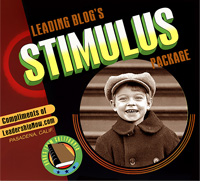 Here’s a stimulus package to get you thinking. It’s a package designed to serve as a catalyst to help you to find ways to make things work and get things done. While you might think of it as a piece of good fortune, don’t think of it as a bailout. You’ve still got to do the inside work. Here’s a stimulus package to get you thinking. It’s a package designed to serve as a catalyst to help you to find ways to make things work and get things done. While you might think of it as a piece of good fortune, don’t think of it as a bailout. You’ve still got to do the inside work.
We are giving away five copies of Greater Than Yourself by Steve Farber. Greater Than Yourself is based on the premise that great leaders become great because they cause others to be greater than they are. GTY is a one-on-one development process where you choose to help someone become more capable, competent, and accomplished than you are. For a chance to get a copy, leave a comment on this post telling us who you have selected for your Greater Than Yourself project and we will randomly select five recipients on Monday, March 23, 2009. The opportunity to participate in this Stimulus Package will close on Friday, March 20, 2009. Related Interest: UPDATE: Five respondents have been chosen at random. Thanks for participating.
Posted by Michael McKinney at 07:44 PM
03.02.09

First Look: Leadership Books for March 2009Here's a look at some of the best leadership books to be released in March.




For bulk orders call 1-800-423-8273
Posted by Michael McKinney at 01:28 AM
02.16.09

The 100 Best Business Books of All TimeIt’s a jungle out there! With over 40 business books published each day, you can’t possibly keep up. Fortunately, Jack Covert and Todd Sattersten have written a guidebook to help you navigate your way through the thousands of business books that have been published, talked about, referred to and in some cases, largely forgotten. The 100 Best Business Books of All Time takes you on a journey through the pages of books that have made a difference. It will help you to reacquaint yourself – in some cases – and to explore uncharted territory in others, in your search for useful ideas and choices to help you in your work.The books were chosen based on three general criteria:
The resulting list is wide-ranging. You’ll find included on the list, books from Peter Drucker to the fictional work of Dr. Seuss, Oh, the Places You'll Go. All of the books included have been thoughtfully considered. Of course, no list of books is without detractors. You won’t agree with every book on the list. But that’s really the value of a book. It is a personal thing that can speak to each one of us in a different way depending on where we are at and what we are faced with. I often find that the value of a book can be the books that it leads you to. Through a book's bibliography you can both dissect the author’s thinking and build on it. A book like The 100 Best Business Books of All Time can help you find a gem of an idea in unexpected places. Some books are so poorly titled they don’t draw you in or seem so off-point. Some have a great single point that is hopelessly shrouded in fluff that you never see it. Covert and Sattersten have done a lot of the initial leg-work for you. The short reviews are organized into twelve categories. They are well written and try to flush out the benefit of the book being reviewed. They are followed by links to books of similar thought to help you find additional advice on a relevant topic. They say that reading about work, business, or leadership can change you – change the way you relate to other people, can change the way you see the world, can change the way you think about your career and the story-line of your life. This book can certainly help you to achieve your goals by helping you to navigate through the jungle of ideas available to locate that specific piece of the puzzle needed to complete your picture.
Posted by Michael McKinney at 10:35 AM
02.09.09

Books About Abraham LincolnOn the occassion of 200th Anniversary of Abraham Lincoln's birth on February 12, we have assembled a list of some of the better books about Lincoln:





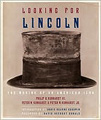
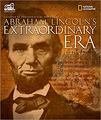

Posted by Michael McKinney at 01:19 AM
02.02.09

First Look: Leadership Books February 2009Here's a look at some of the best leadership books to be released in February.




Posted by Michael McKinney at 09:22 AM
01.01.09

First Look: Leadership Books January 2009Here's a look at some of the best leadership books to be released in January.




Posted by Michael McKinney at 12:03 AM
12.25.08

Best Leadership Books of 2008 Our selections for the best leadership books published in 2008 are listed below. The are more books every year written than one can possibly make use of. Here at LeadershipNow we try to help you find those books that will resonate with you and thus be the most useful to you. Anne Lamott wrote in her classic, Bird by Bird: Some Instructions on Writing and Life, a wonderful statement on the importance of reading. "For some of us, books are important as almost anything else on earth. What a miracle it is that out of these small, flat, rigid squares of paper unfolds world after world after world, worlds that sing to you, comfort and quiet or excite you. Books help us understand who we are and how we are to behave. They show us what community and friendship mean; they show us how to live and die. They are full of all the things that you don’t get in real life—wonderful, lyrical language, for instance, right off the bat. And quality of attention: we may notice amazing details during the course of a day but we rarely let ourselves stop and pay attention. An author makes you notice, makes you pay attention, and this is a great gift. My gratitude for good writing is unbounded." Here are a few biographies that we found had the power to correct, inspire and motivate.
Posted by Michael McKinney at 12:22 AM
12.01.08

First Look: Leadership Books December 2008Here's a look at some of the best leadership books to be released in December.




Posted by Michael McKinney at 03:47 AM
11.28.08

Stimulus Package 1 - Free Book: The Truth About You Here’s a stimulus package to get you thinking. It’s a package designed to serve as a catalyst to help you to find ways to make things work and get things done. While you might think of it as a piece of good fortune, don’t think of it as a bailout. You’ve still got to do the inside work. Here’s a stimulus package to get you thinking. It’s a package designed to serve as a catalyst to help you to find ways to make things work and get things done. While you might think of it as a piece of good fortune, don’t think of it as a bailout. You’ve still got to do the inside work.
In partnership with Thomas Nelson Publishers, we are giving away five copies of The Truth About You by Marcus Buckingham. The Truth About You focuses on how you set your career up right—how do you start in such a way that you can push the world toward the best of you; learning to express the best of who you are. It incorporates a candid 20-minute enhanced DVD (a reworking of the effective Trombone Player Wanted film); an interactive book, which takes up where the film leaves off; and a reMemo Pad, a way of using the raw material of your week to clearly identify your strengths and weaknesses. It’s a great gift for any young person to help clarify their direction and find meaning in life. For a chance to get a copy, leave a comment on this post and we will randomly select five recipients on Friday, December 5, 2008. Related Interest: UPDATE: Five respondents have been chosen at random. Thanks for participating.
Posted by Michael McKinney at 08:05 AM
11.11.08

The Wisdom of the Flying Pig FREE Download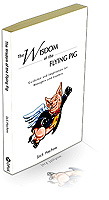 Following our review of Jack Hayhow's The Wisdom of the Flying Pig, he is graciously making a copy of the eBook available free to readers of this blog for a limited time. To take advantage of this free offer: Following our review of Jack Hayhow's The Wisdom of the Flying Pig, he is graciously making a copy of the eBook available free to readers of this blog for a limited time. To take advantage of this free offer:
1. Go to Jack Hayhow’s website 2. Click “Add to Cart” button at the top of the page 3. Enter Discount Code: L8N1B 4. Fill out a short informational form and then the eBook will be emailed to you. This offer is now over, but copies are available in paperback and on Kindle.
Posted by Michael McKinney at 09:11 AM
11.02.08

Leadership Books: November 2008Here's a look at some of the best leadership books to be released in November.




Posted by Michael McKinney at 12:39 PM
10.01.08

Leadership Books: October 2008Here's a look at some of the best leadership books to be released in October.




Posted by Michael McKinney at 01:29 AM
09.26.08

Richard Branson: There Is No Reverse Gear On This Thing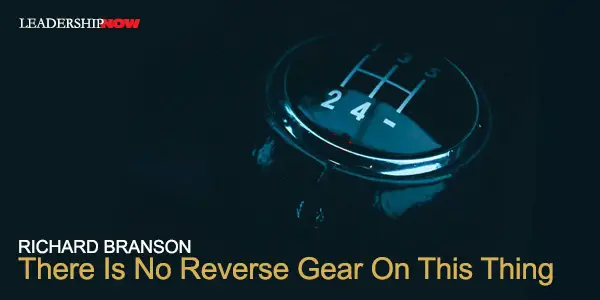
RICHARD BRANSON is the quintessential entrepreneur. Business Striped Bare is his candid account of what the Virgin companies are all about—what they hoped to do, what they actually did, how they got where they are, and why it matters. He shares the experiences and key principles that have brought him success (or not, and what he has learned from it). He explains: There are many ways to run a successful company. What works once may never work again. What everyone tells you never to do may just work, once. There are no rules. You don’t learn to walk by following rules. You learn by doing, and by falling over, and it’s because you fall over that you learn to save yourself from falling over. It’s the greatest thrill in the world and it runs away screaming at the first sight of bullet points….So all I can do for you now is map the territory I’ve seen. The good news is, I’ve covered a lot of territory.And he has. You will find great stories in here about how things came to be and almost didn’t. He covers a wide range of interrelated topics: people, getting the brand right, delivering on the brand, learning from mistakes, innovation, the value of entrepreneurs and leadership, the wider responsibility of business and his thoughts on success. Here are a few excerpts with common themes that can be applied in any context: A manager should basically be a considerate person who is as interested in the switchboard operator and the person who cleans the lavatories as he or she is in the fellow managers. In my view, a boss who is willing to party with all of their people—and pay attention to their personal concerns—has the makings of a great leader.Branson says the stakes have never been higher. No one in business can unmake anything. The first law of entrepreneurial business is “there is no reverse gear on this thing.” He shows how Virgin is trying to get it right and hopes you find inspiration in it. His book will definitely get your mind moving in new directions. 
Posted by Michael McKinney at 03:14 PM
09.08.08

Our Performances Matter: The Encore Effect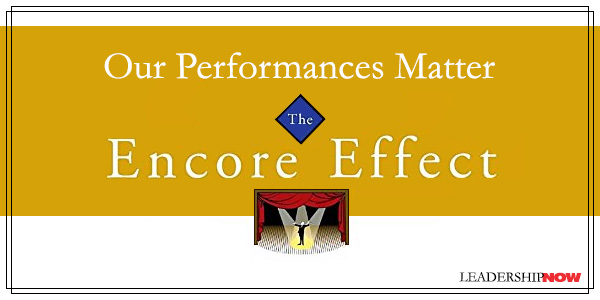
WHAT IS the encore effect? It is delivering what you do so well that you are asked to do it again and again. It’s people wanting more of what you do best. No matter what we do, we are showcasing who we are and what we care about. As we go through our day we can either deliver an average performance or a remarkable one. A remarkable performance keeps them coming back for more. Mark Sanborn, author of The Encore Effect, believes “Our performances matter. They can have a powerful impact on those around us. As parents, our performance shapes and influences our children. As employees and managers, our performance can make our company better, move a project forward, spark ideas among colleagues, and influence customers.” Of course, a remarkable performance can only come from someone who knows what they do best, and is passionate enough about it to have invested the time to develop expertise in it and to live it authentically. It’s who they are, and it’s infectious.How can each of us make our own performance bigger, better, and bolder? How can we make what we do consistently remarkable and thereby make a difference in our sphere of influence? Mark Sanborn offers five steps for making your performance remarkable; for bringing your best self to whatever you are doing: Passion: Passion is the fuel that drives our life’s purpose. Our passion for what we do pulls others along. “Nobody likes to be driven by someone else; it feels like being pushed. But when someone can show us how to be bigger on the inside—in our attitude and mindset—that can help attract or pull us toward what we can become. Prepare: How remarkable performance begins. “Each of us is creating our future right now. Whether the future is five minutes from now or five years, it is determined by our preparation—or lack of it.” Be a remarkable performance waiting to happen. Practice: “There are no perfect violinists—or salespeople, executives, teachers, or parents for that matter. But deliberate practice is what distinguishes those who excel from those who get by.” Perform: Be the performance. “One hallmark of a remarkable performance is authenticity.” Be yourself. Engage your audience by giving them your attention. “To create the Encore Effect, you shouldn’t be focused on your own happiness or success, but on the happiness and success of others.” Polish: The difference is in the details. “There are lots of details that matter when it comes to creating a remarkable performance.” Keep polishing what you do. Sanborn is no stranger to remarkable performances, and he continues to polish his life’s work. He also highlights some pitfalls that we need to avoid along the way, like arrogance, fear, and impatience. Most importantly, Sanborn points to the real goal of remarkable performances—helping others to achieve their own remarkable performances. “Remarkable performers see in others what they have discovered in themselves—the ability to reach unexplored and unanticipated levels of performance. They inspire others through their own performances, instruct others through their teaching, and help others improve through their encouragement." Pass this title along to others—young and old. It contains a simple idea that, taken to heart, can make a big difference. 
Posted by Michael McKinney at 02:33 PM
09.01.08

Leadership Books: September 2008Here's a look at some of the best leadership books to be released in September.




Posted by Michael McKinney at 12:04 AM
08.27.08

5 Leadership Lessons: Axiom: Powerful Leadership Proverbs
Posted by Michael McKinney at 06:24 AM
08.01.08

Leadership Books: August 2008Here's a look at some of the best leadership books to be released in August.




Posted by Michael McKinney at 07:29 AM
07.28.08

What Is Your Plan For Personal Growth?
YOU WON'T GROW to your potential without a plan. You’ll get older, but not better. Experience guarantees nothing. Growth is intentional. If you are not growing you’re just putting in time. Waiting. Crucibles of Leadership by Robert Thomas, is an important book that asks, “What is your personal learning strategy?” A PLS is “a highly individualized plan for leveraging hard-won insights about learning from adversity and using practice to improve performance.” We all have crucibles, but it’s what we do with them that is important. Thomas writes that crucibles “are like trials or tests that corner individuals and force them to answer questions about who they are and what is really important to them.” Crucibles become valuable when we intentionally mine them for lessons that make us more effective, aware and integrated. Warren Bennis points out in the foreword that the self-awareness we should gain is “the kind of deeper understanding of self that then turns outward rather than inward and results in better understanding of others and the organizations that matter to us.” Thomas says that we have to change our approach to learning. We shouldn’t wait for just the right moment to arrive, but learn in the moment—in real time—to, as he writes, “learn while doing.” Preparation is essential to learning. In order to take advantage of our crucibles, we must develop a Personal Learning Strategy (PLS). Thomas introduces a framework for crafting a PLS complete with exercises to help you properly move through each step. It begins with a little introspection—understanding why you want to lead, what motivates you to do so and understanding how you learn. Then you need to access your capability in three core areas: adaptive capacity, engaging others through shared meaning, and integrity. From here you can see areas where you need to improve and strengthen in order to reach your leadership goals. Now you can assign behaviors to each of these areas that you can consciously practice at work and at home. He suggests that you “scan your landscape at work and at home, and identify those instances and roles out of your comfort zone that will allow you to stretch into new behaviors, perspectives, and leadership capabilities.” Organizations too, can tap into the power of a PLS by adopting an experience-based approach to their leadership development program. Organizations need to recognize the importance of crucible experiences and provide the resources people need to extract insight from them in addition to the regular technical and skills training people should be receiving. Most often those resources involve creating a process that links the two learning opportunities together. One important note on a trap that people and organizations sometimes fall into in their zeal to develop character and leadership, Thomas writes, “We create enough pressures to perform that we don’t need to invent new ones just so that we can accelerate leader development. The trick is to harness the crucibles that life sets in motion so the opportunity for learning is not squandered.” Life gives us enough opportunities to learn, but often, we just need help getting the lesson we should be getting from it. Accomplished leaders say that experience is their best teacher. They learned their most meaningful and important leadership lessons—lessons that they’ve integrated into their own leadership style—through crucibles. These were critical events and experiences, times of testing and trial, failure more often than grand success, that grabbed them by the lapels and demanded to know “What do you stand for?” and “What are you going to do?” A situation arose that did not respect age, gender, generation, nationality, talent, or charisma; all it asked was that the person step up and be someone or do something they’d never been or done before. Having a Personal Learning Strategy is a way of thinking about and looking at life that allows you to proactively grow from what life throws at you, rather than being knocked out by it. You need a Personal Learning Strategy. 
Posted by Michael McKinney at 02:06 PM
07.01.08

Leadership Books: July 2008Here's a look at some of the best leadership books to be released in July.




Posted by Michael McKinney at 06:00 AM
06.27.08

The Offsite: A Fable to InternalizeThe Offsite is a business fable based on the principles and practices set forth in the classic leadership book, The Leadership Challenge. And it works. Using memorable characters, author Robert Thompson, has created a story that is a great introduction not only to James Kouzes’ and Barry Posner’s work, but to the practice of leadership itself.With our birds-eye view of the offsite and its main participants, we can see the mental struggles and the ah-ha experiences of the personalities as they begin to view leadership as a way of thinking and a choice that each individual must make. They begin by facing their reality and then learn to see a new way to get from where they are to where they want to be. They begin to see real leadership as helping people to discover what matters to them and helping them to connect to it. “Leadership is about people. Leadership is how you get management done. Leaders stretch others, not stress others.” Through the offsite seminar leader Charlie, Thompson presents the Five Practices of Exemplary Leaders this way: Your credibility matters so … Model the Way. How? Clarify values by finding your voice and affirming shared ideals. Set the example by aligning actions with shared values. Your voice matters so … Inspire a Shared Vision. How? Envision the future by imagining exciting and ennobling possibilities. Enlist others in a common vision by appealing to shared aspirations. Your action matters so … Challenge the Process. How? Search for opportunities by seizing the initiative and by looking outward for innovative ways to improve. Experiment and take risks by constantly generating small wins and learning from experience. Your gift matters so … Enable Others to Act. How? Foster collaboration by building trust and facilitating relationships. Strengthen others by increasing self-determination and developing competence. Your gratitude matters so … Encourage the Heart. How? Recognize contributions by showing appreciation for individual excellence. Celebrate the values and victories by creating a spirit of community. This is the kind of book you need to give to everyone on your team and to those your team interacts with. If you’ve read The Leadership Challenge (the new 4th edition will be out in paperback in August), then it’s a good reminder, if you haven’t, then it’s a great introduction. Either way, you’ll find Thompson’s story a quick read, but packed full of thoughts and concepts you’ll want to reflect on and internalize. Leadership is a way of life that takes a conscious choice to build-in to everything you do, from wherever you sit. This is a great place to begin. 
Posted by Michael McKinney at 02:35 PM
06.02.08

To Engineer Is Human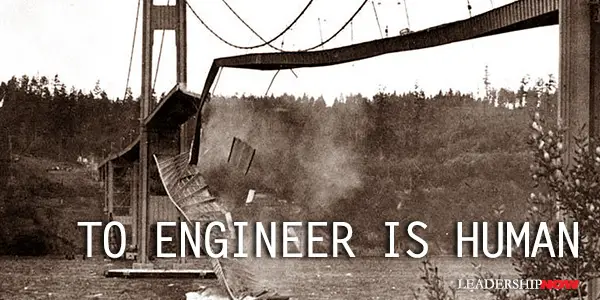
AT Book Expo America held in Los Angeles this last weekend, Todd Sattersten gave me an excerpt containing two reviews from the book he wrote with Jack Covert entitled, The 100 Best Business Books of All Time. Todd’s review of To Engineer Is Human was a book I had never read. It was such a well-crafted synopsis that I quickly went out and got the book. He extracted the following idea from the book that caught my attention: Much lip service is given to accepting failure in business as natural phase in the learning process, yet internalizing the idea seems a little more difficult. Shareholders don’t show sympathy for failed products. Customers expect their product to arrive when promised and in pristine condition. Most of the other books featured in these pages detail the workings of successful companies, while Petroski’s book tells a more complicated tale of failure, one in which business practitioners can find wisdom. The most important lesson has to be appreciating failure as a learning opportunity. Failure is common. Not learning from failure forces companies to repeat the same mistakes again. In engineering, that repetition can cost lives; in business, our livelihood. Henry Petrosky wrote that “no one wants to learn by mistakes, but we cannot learn enough from successes to go beyond the state of the art.” The core of the problem would seem to be the stakeholder's failure – or certainly their reluctance – to take the long view. If the rest of the reviews are anything like Todd’s review, the book should be a good read and a valuable reference tool. 
Posted by Michael McKinney at 03:35 PM
06.01.08

Leadership Books: June 2008Here's a look at some of the best leadership books to be released in June.




Posted by Michael McKinney at 09:50 AM
05.29.08

Change the Way You See YourselfThe authors that brought you Change the Way You See Everything have taken the principles of asset-based thinking and applied them more specifically to you – the individual – in Change the Way You See Yourself. Like its predecessor, this book too is a feast for the eyes. I enjoy the graphics, but the message they convey is vital to your personal development.Asset-based thinking is a way of looking at yourself that emphasizes what is working in your life and the strengths you possess. It is a way of freeing yourself from negative and unproductive thinking. It allows you to focus on what you can do and not what you can’t do (as often seems to be our default mode of thinking). They write that with asset-based thinking, “you use surprise, serendipity, and even setbacks to make the journey more interesting and more worthwhile. You are more confident in who you are, where you are going, and how to get there.” In the section on power they invite us to look at it in a new way. Authors Kathryn Cramer and Hank Wasiak write: When it comes to power, most people think of accumulating material wealth, status, authority, knowledge, and expertise. These are potent external sources of power. AS such, they provide you with control over a vast array of resources – from money, to land, to market share, to intellectual property. While building large reservoirs of external power may be useful, it is not enough for getting results. There is another source of power equally important and often more vital to your leadership and success. 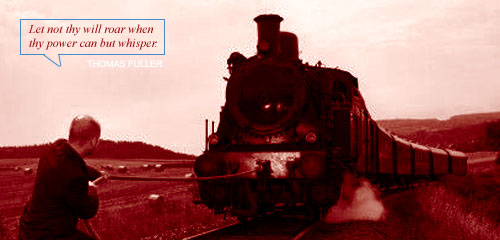 Leadership sage Warren Bennis once said, “A point of view is worth 50 IQ points.” He knew That when you live by the power of your convictions you stand taller, sit straighter, and speak more confidently. You raise the level of your game. Others know you as a “force of nature” – someone who will not be deterred and who doesn’t give up. Related Reading:
Posted by Michael McKinney at 10:40 AM
05.02.08

Leadership Books: May 2008Here's a look at some of the best leadership books to be released in May.




Posted by Michael McKinney at 10:58 AM
04.23.08

How To Have Just Enough Anxiety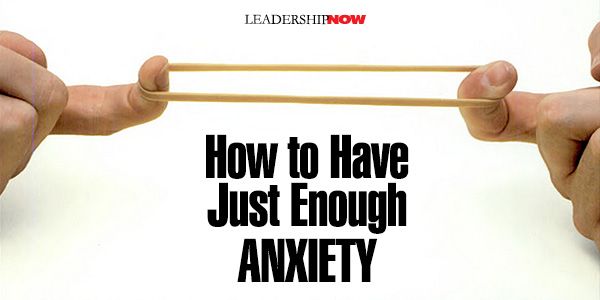
 Balance comes from a right attitude and a proper perspective. Dealing with anxiety is no different. The success of great leaders is all about creating the right level of anxiety for growth and performance. It is their uncommon ability to create just enough tension—within themselves and their organizations—that unleashes the human energy that drives powerful leadership, accelerated growth, and winning companies.What’s wrong with having too much or too little anxiety? RR: Too much anxiety comes from negative thinking. When we feel too much anxiety, we attack change. We become combative or controlling as we try to ease the pain we feel. Too little anxiety is grounded in contentment. When we feel too little anxiety, we avoid change. We value the status quo and believe everything will be okay as long as everything stays the same. If your company is going through tough times like a bad economy or a merger, you definitely don’t want too little anxiety. What exactly is “just enough anxiety”? RR: The right level of anxiety gives individuals and organizations an emotional charge that helps us thrive in an uncertain world. As we allow ourselves to experience anxiety as our natural response to change, and learn to modulate it, we’re able to live in the world as it is instead of struggling to make it what we want it to be. And as we get better at living with just enough anxiety, it becomes the energy that drives us forward, stretches us, and challenges us to be better tomorrow than we are today. How can leaders manage anxiety instead of letting it manage them? RR: It starts with self awareness. Leaders who understand what makes them anxious are better able to increase or decrease their anxiety, as needed to create just enough. But, more than that, it has to do with how they relate to change and uncertainty. By admitting what they can and can’t control, they’re able to take charge of their lives while remaining open to the unexpected. They’re at home in uncharted territory. Instead of seeing anxiety as the enemy, they recognize it as their natural companion on the path of change. 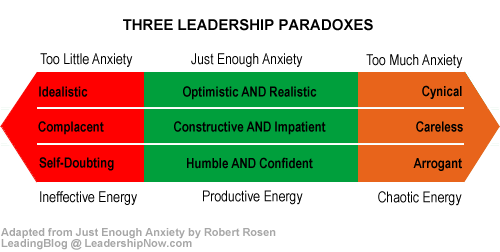  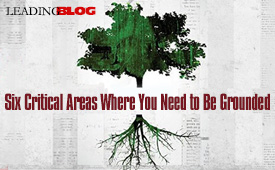 
Posted by Michael McKinney at 10:30 AM
04.21.08

Maxwell’s Gold: Lessons Learned From a Lifetime of Leading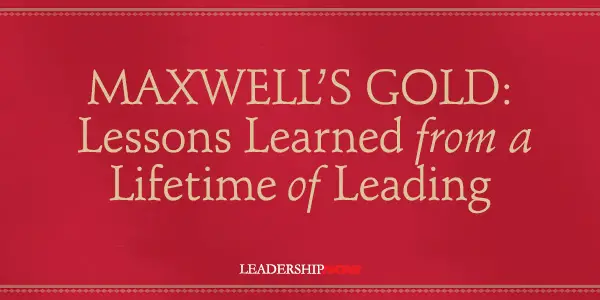
IN Leadership Gold, John Maxwell looks back on 60 years and distills what he has learned about leadership to date. And he stresses that he is still learning. It contains 26 important lessons about leadership and human relationships that are well worth reviewing. It’s a mentoring-style book. He says that leadership can be learned by anyone, but it’s not easy. Leadership is demanding and complex. He writes:

Posted by Michael McKinney at 10:35 AM
04.01.08

Leadership Books: April 2008




Posted by Michael McKinney at 12:04 AM
03.26.08

Making the Impossible Possible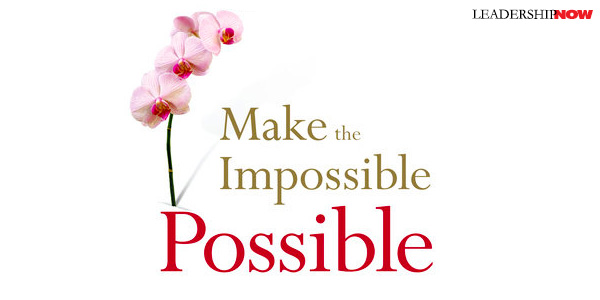
SAMUEL JOHNSON once wrote, “The natural flights of the human mind are not from pleasure to pleasure, but from hope to hope.” This statement seems to define Bill Strickland’s life. Make the Impossible Possible is an engaging, inspirational book written with humility and passion. Bill Strickland’s life changed when as a boy in a Pittsburgh ghetto, a teacher took the time to show him that he mattered and allowed him to see himself in a new way. (An integral part of any leader’s job.) As a result, he became open to opportunities and created at 19 what became the Manchester-Bidwell Center, the now famous arts-education and job-training center for disadvantaged kids and adults. This extraordinary school was built on Strickland’s belief that “all of us have the potential to make our dreams come true, and that one of the greatest obstacles blocking us from realizing that potential is that we believe, or are told, that things we want most passionately are impractical, unrealistic, or somehow beyond our reach.” He convincingly demonstrates his belief that: Each one of us, no matter who our parents are, where we live, how much education we have, or what kinds of connections, abilities, and opportunities life may have offered us, has the potential to shape our lives in ways that will bring us the meaning, purpose, and success we long for….I want everyone who comes to this book, no matter what their age or accomplishments or the circumstances of their lives, to rethink their assumptions about what is and isn’t possible in their lives, and to convince themselves that they have not only the right but also the responsibility, and the capacity, to dream big and to make those dreams come true. Strickland narrates his successes and failures, obstacles and opportunities, his thinking and rethinking, as he went about to create the success he has achieved. It’s a fascinating story. While he has dedicated his life to helping other people, he denies the do-gooder label. He writes, “I didn’t do any of it out of selflessness. I did it to be myself. I did it to enrich my own life, to deepen the quality and meaning of my own experience. I did it because it was a part of what I had to do if I genuinely wanted to be me.” How often have we been burdened by self-defeating assumptions? Strickland writes that “once we accept the idea that poverty is, essentially, the acceptance of meager possibility, we can’t deny that all of us are in some fashion poor. We all suffer some form of poverty—poverty of imagination, or courage, or vision, or will. We allow ourselves to be limited by our fears—fear of failure, fear of change, fear of being criticized or of looking like a fool.” This isn’t another see-what-I-did self-help book. It’s a book that invites introspection. Read it and learn from his experience and thinking. 
Posted by Michael McKinney at 02:41 PM
03.17.08

In Leadership, Context Is EverythingIn leadership, context is everything. As we have said before, leadership hasn’t changed—the context we operate in has changed. Russell Palmer’s book Ultimate Leadership is on target. He believes that “the principles of leadership can be effective in a wide variety of situations, but often they need to be applied in a very different manner depending on the circumstances and the constituent groups involved.”This of course, makes perfect sense, but what makes no sense is how often it isn’t applied. We tend to plow along the way we have always done things without regard to our current situation. Palmer writes, “Success or failure can often depend on modifying leadership styles to suit a different context.” While there is no single style of leadership that works in every situation, there are basic principles of leadership that apply universally. Palmer explains some of those principles such as integrity, execution, good judgment, innovation, communication and people skills among others. The core of the book provides practical, well-heeled advice on applying basic leadership principles in a variety of contexts. He discusses execution and the pros and cons of specific contexts such as top down, crisis leadership, partnership of peers, academic, entrepreneurial organizations, non-profits, government, and the military. He includes a great deal of his personal experience and interviews with thoughtful people in each of these areas. When leading “partners and peers who have relatively narrow specializations,” Palmer points out, “leaders need a broad view. In other words, they must be generalists who know a good deal about many things. One of the problems in today’s society is that we develop more and more people with narrowly specialized knowledge…. The best subject from an educational standpoint for a leader is the study of history. Reading biographies is also particularly helpful…. The best education, for instance, for a businessperson is a strong liberal arts undergraduate program and then a graduate business program.” In the end, he concludes, it’s all about people.
Posted by Michael McKinney at 12:12 PM
03.14.08

Good Followers Make the Best Leaders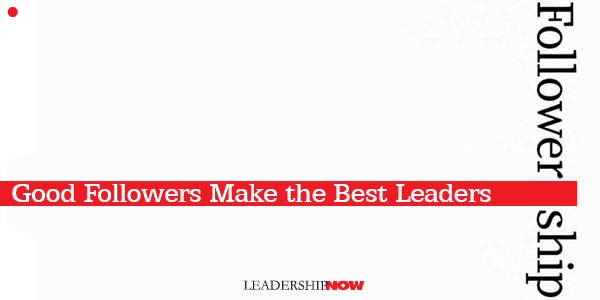 IN CASE you didn’t know it by now, let me just say, followership is the crucible of leadership. There is no better way to learn leadership than by being under someone else—leading from the second chair. As ironic as that may sound, it’s true. Learning to lead under someone else provides you with the opportunity (the necessity) to learn to lead without coercion. You learn to let your leadership speak for itself—authentically.
IN CASE you didn’t know it by now, let me just say, followership is the crucible of leadership. There is no better way to learn leadership than by being under someone else—leading from the second chair. As ironic as that may sound, it’s true. Learning to lead under someone else provides you with the opportunity (the necessity) to learn to lead without coercion. You learn to let your leadership speak for itself—authentically.
Yet we still, as Barbara Kellerman states in her important new book, Followership, overestimate the importance of leadership and underestimate the importance of followership. She argues that “thinking leadership without thinking followership is not merely misleading, it is mistaken.” Why? The context of leadership has changed. First, leaders have been demystified, in part by modern media, which demands grist for its mill 24/7; and in part by the modern culture, in which figures of authority are no longer exalted or even so much respected. Second, because the line between the leader and the led has been blurred, the led have been emboldened. She points out that much of this is cyclical. I would agree. It’s hard for human beings to find balance. Consequently, we continually find ourselves reacting to someone else’s excessive behavior. While we have spent a great deal of time distinguishing between types of leaders, we have not done the same with followers. Kellerman spends a good portion of the book explaining followers. She describes four types: Bystanders, Participants, Activists, and Diehards. She writes: “Followers are us. This does not, of course, mean that all of us follow all of the time—sometimes we lead. But all of us follow some of the time. It’s the human condition.” She advocates that followers not try to become something else, but more importantly that they change their response to their rank, their response to their superiors and to the situation at hand. She emphasizes:
What we need now is a Followership Part 2, where it is explained to followers just how one should follow. We do a disservice to followers – as we have with leaders – by requiring no character development and self-discipline. When we learn to develop better followers, we will get better leaders. 
Posted by Michael McKinney at 10:06 AM
03.02.08

Leadership Books: March 2008Here's a look at some of the best leadership books to be released in March.




Posted by Michael McKinney at 10:57 PM
02.01.08

Leadership Books: February 2008Here's a look at some of the best leadership books to be released in February.




Posted by Michael McKinney at 08:05 AM
01.01.08

Leadership Books: January 2008Here's a look at some of the best leadership books to be released in January.




Posted by Michael McKinney at 07:22 AM
12.25.07

Best Leadership Books of 2007 Our selection for the best leadership books published in 2007 are listed below. Learning for the successful person, is a lifelong journey. No book or conference is an end in itself. They should encourage you to dig deeper and more often. These titles do not necessarily represent popularity in terms of numbers of books sold. In a few cases they did not get the recognition they deserved. But all of the titles selected will contain ideas relevant and compelling to leaders at all levels and contexts. The authors all addressed the question, “How can I create the environment and perform in a way that leads to consistently successful outcomes?” But more than that, they deal with the real success of a leader: the creating of a leadership economy if you will—a place where leaders are developed at all levels and in all areas of life. These books will help you on your journey. Again, we have selected a few biographies. As a category, they shape minds and ideas in ways that no other type of business book can. It's a good idea to always be working through a biography of some kind. It gives motivation for much needed self-reflection. To learn vicariously, is perhaps the best way to learn most things.
Posted by Michael McKinney at 09:19 AM
12.12.07

Paul Johnson’s Heroes: Lessons for Today's LeadersPaul Johnson’s Heroes is a pleasure to read. With his knack for illuminative details and command of the language, he has produced a series of short biographical essays that draw you through the book and leave you with a lot to think about. He notes that heroes have not always been appreciated and the status accorded them can be fleeting and arbitrary. By way of example he writes:In the troubled times which followed the end of the Napoleonic Wars, caused by lower wages, unemployment and higher food prices, the term became abusive. When ever the Duke of Wellington made his appearance, a certain kind of London mob (there were many different kinds) would shout: “No heroes! We want no heroes!” For the self-conscious proletariat, the “Man on Horseback” was a political enemy. They threw stones through the windows of Apsley House, the duke’s London residence. He had the windows boarded up but refused to replace the glass, as a reminder to people of how volatile was popularity an dhow fickle the crowd, applauding him as a hero one moment, detesting him the next.Consider too, Genghis Khan was “reviled for nearly a millennium as the archetypal mass murderer and rapist, despoiler, arsonist and ravager” yet “since the collapse of the Soviet empire in Central Asia, has become there a state-sponsored hero, especially in Azerbaijan and Mongolia.” “No people in history were more in need of heroes than the Hebrews.” And so Johnson begins his examples with the judges Deborah, Judith and Sampson leading to their greatest hero, King David. Continuing on, his survey of heroes spans almost 3000 years of Western history and ranges from, Alexander and Julius Caesar, to the unlikely Mae West and Marilyn Monroe, to Lincoln and Churchill, to Ronald Reagan, Margaret Thatcher and Pope John Paul II. Here are some of his comments from the book:
First, an absolute independence of mind, which springs from the ability to think everything through for yourself, and to treat whatever is the current consensus on any issue with skepticism. Second, having made up your mind independently, the ability to act resolutely and consistently. Third, to be able to ignore or reject everything the media throws at you, provided you remain convinced you are doing right. And finally, to act with personal courage at all times, regardless of the consequences to yourself. Who are your heroes?
Posted by Michael McKinney at 08:36 AM
12.10.07

5 Leadership Lessons: Great Advice from Accidental CEO, David Novak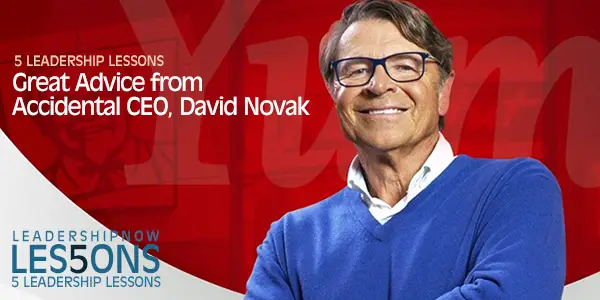
WHILE Yum Brands chairman and CEO David Novak calls himself an accidental CEO, his rise to the top, while perhaps not planned, was no accident. His advancement speaks to the power of right choices made throughout life based on the knowledge gained from cultivating lessons from life and seeking out advice. His memoir, The Education of an Accidental CEO, is written in the first person and full of advice that we can all gain from reading. Nothing here is earth-shaking or new, but it is helpful to see the successful working of these principles in the life of someone who took them to heart. Here are a few of the lessons we can take away:

Posted by Michael McKinney at 10:55 AM
12.02.07

Leadership Books: December 2007Here's a look at some of the best leadership books to be released in December.




Posted by Michael McKinney at 12:01 AM
11.28.07

Integrative Thinking: The Opposable Mind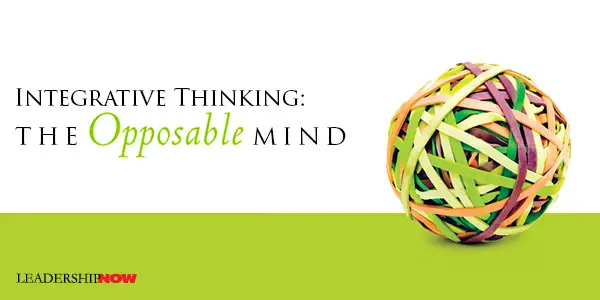 NOT ONE to put the cart before the horse, Roger Martin understands the importance of doing but he prefers “to swim upstream to the antecedent of doing: thinking.” He writes in The Opposable Mind, “My critical question is not what various leaders did, but how their cognitive processes produced their actions.”
NOT ONE to put the cart before the horse, Roger Martin understands the importance of doing but he prefers “to swim upstream to the antecedent of doing: thinking.” He writes in The Opposable Mind, “My critical question is not what various leaders did, but how their cognitive processes produced their actions.”
In examining how exemplary leaders think, he found an approach that was common to many, that he has termed integrative thinking. Integrative thinking is: The ability to face constructively the tension of opposing ideas and, instead of choosing one at the expense of the other, generate a creative resolution of the tension in the form of a new idea that contains elements of the opposing ideas but is superior to each. In other words, integrative thinking examines problems as a whole, taking note of the complexities that exist and embrace the tension between opposing ideas to create new alternatives that take advantage of many possible solutions.
It’s easy to get into the destructive rut of thinking that money is the solution to most problems. School boards are notorious for claiming that their hands are tied because they lack the money they want. They cripple themselves. What they really need are creative solutions. Education is a complex issue and has for too long been subject to tunnel-vision problem-solving. They need integrative thinking. Einstein opined that we should make everything as simple as possible, but no simpler. Too often we try to make complex issues too simple and leave ourselves with too few options based on our limited point-of-view. If we instead embrace complexity and learn to deal with it, we might find more and better solutions. Martin writes, “More salient features make for a messier problem. But integrative thinkers don’t mind the mess. In fact, they welcome it because the mess assures them that they haven’t edited out features necessary to the contemplation of the problem as a whole. They welcome complexity because they know the best answers arise from complexity.” In The Opposable Mind, Martin clearly illustrates this thinking process in action by dissecting varied examples from both business and interpersonal situations. Martin claims that we are all born with an opposable mind—the ability to hold two conflicting ideas or models in constructive tension. “We can use that tension to think our way through to a new and superior idea….Opposing models, in fact, are the richest source of new insight into a problem. We learn nothing from someone who sees the problem exactly as we do.” 
Posted by Michael McKinney at 09:45 AM
11.21.07

How to Change Anything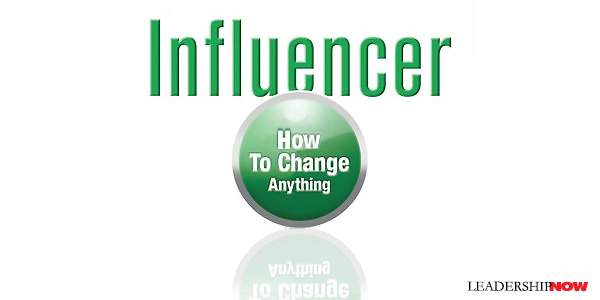
God grant me the serenity to accept the things I cannot change; courage to change the things I can; and wisdom to know the difference. THE authors of Influencer: The Power to Change Anything claim that they can show you how to change anything. Well, nearly everything. They suggest that most of the time we cop out. We comfort ourselves with the Serenity Prayer and move on. Maybe it’s not the courage we lack but the skills to change the things we can. The authors set about to do just that. “If you want to change the world, you eventually have to change how people behave. And if you want to change how they behave, you have to first change how they think.” The key idea is this: “A few behaviors change drive a lot of change.”What that means is, if you want to effect change, then while casting a vision is important (that is, what you want people to achieve), what you need to focus on is behaviors—what you specifically want people to do. If you determine the foundational behaviors upon which everything you want changed stands, and change those things, then everything else changes with it.
There is more than one way to influence and if you are only using one of them as a matter of habit, it may explain why you are having difficulty bringing complex and resistant problems to a solution. There are six sources of influence that drive our behavior divided between two domains—motivation and ability. They reason, “Virtually all forces that have impact on human behavior work on only two mental maps—not two thousand, just two. At the end of the day a person asks, ‘Can I do what’s required?’ and ‘Will it be worth it?’ Influencer presents a model that organizes influence in to 6 general strategies and clearly explains how to make use of these strategies in your own change issues.
Influencer is brought to you by the same group that produced such great books as Crucial Confrontations and Crucial Conversations: Tools for Talking When Stakes Are High. 
Posted by Michael McKinney at 11:53 AM
11.19.07

Reframing Conflict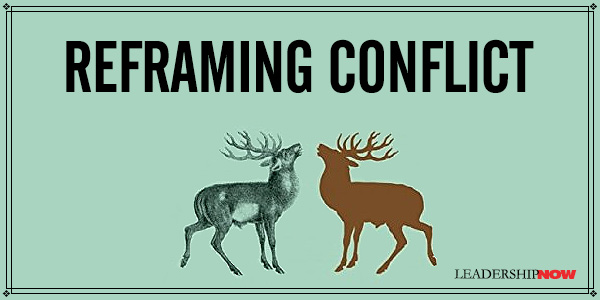
NEGOTIATION expert and Harvard Law School professor, Roger Fisher talks about how we communicate through conflict in Managing Conflict. Reframing the situation we find ourselves in to reflect a concern for he other person’s point of view can move us through a perceived impasse. Fisher’s rethinking process excerpted here, is helpful in this regard: “So I come and try to put myself in your shoes: How do you see it? How can I help you see it in a way that will be helpful to you, where you can go forward? I’m not telling you what to do; I’m not fighting with you.” “I have to get on your side, understand what you’re thinking about; what you’re worried about—your concerns, your interests—and how I can help you deal with your side.” Fisher adds: “Negotiation is recognizing that it’s not just the other side that has the problem but that we have a problem together. When you negotiate, you want to understand each other’s perceptions. How do you see it? How do I see it? How do we change it from adversarial to side by side, so that we’re both working on this?” 
Posted by Michael McKinney at 05:03 PM
11.14.07

Optimizing LuckIn a world of rapidly changing conditions, luck often seems to be the determining factor in the success of the best organizations. According to authors Thomas Meylan and Terry Teays, luck is something that can be optimized and built into your culture. While the chapter on leadership could have benefited from some more rigorous thought, they do outline six behaviors and procedures you can implement to amplify your natural abilities to succeed in any environment. First, and most importantly, they stress the importance of hiring the right people. Look for people with sufficient skills and experience to do the job, aptitudes that will contribute positively to the organization and people with a passion for the kind of work you are hiring them for. (Seek staff reaction to the new person.) “If you don’t have the time to work through a hiring process that gets you the right people, how are you possibly going to have time to deal with all the misfits you end up with?” Secondly, multiply your strengths through the power of delegation – or just let people do their job. If you have hired the right people with the right skill set, then you should be able to trust them to accomplish the task. “Without trust, delegation doesn’t happen. What you get instead is the making of assignments that you either micromanage or snatch back to do yourself.” Third, become adaptable through the “master process of continuous habit management.” This consists of being alert to changes, continuously trying new things until you get the results you want, converting successful behaviors into personal habits and organizational procedures, and discarding obsolete habits when you realize it’s time to create new ones. Fourth, know how to operate in a lean environment before it is forced upon you. “If you have hired self-renewing employees, and you have given them the opportunity and resources to learn new skills, then they are well prepared to adapt to changes in your enterprise’s needs….Don’t think in terms of malnourished drudges. Think of slender gymnasts, flexible and agile and capable of an entire repertoire of tricks.” Fifth, promote prompt and accessible communication to all who need it. Knowledge is the raw material you use to drive a business, it must reach everyone, whether it is good or bad news. “Without good communication habits, your organization may be too slow to take advantage of a surprise opportunity and end up not getting there first.” Finally, build a system for recognizing and rewarding people that perform beyond their job description. “Your method of rewarding employees should encourage the behavior you want your employees to show.” The key passage is this: Differences in levels of success often come down to differences in personal habits. People employ decades-old systems of habits to get through the day. However, most people put no special thought into developing these systems. They pick up a few tricks from mom and dad and a few teachers and a lot from their peers, while growing up and going through school. And that’s where their habit-developing effort stops.
Posted by Michael McKinney at 12:10 AM
11.12.07

Finding the Difference Makers in Your Organization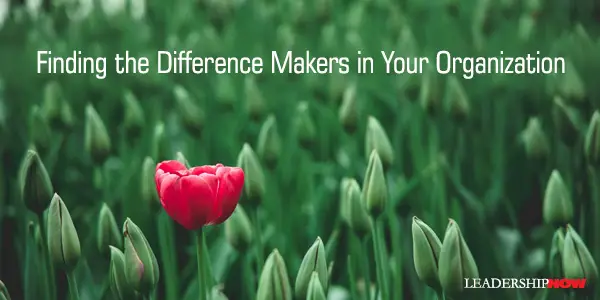
STORIES about people who have gone above and beyond inspire us to be better than we are now. These stories of people who make a difference can help others to see themselves and their work in new ways. Stories help people to disconnect from the moment and project themselves in to a new place where things are possible. Quint Studer writes in Results that Last, “I think difference makers are the world’s real heroes, the people working to make things better. You know who they are: those men and women who give extra effort without thinking of themselves. They may not get a lot of glory, but they are deeply appreciated by the people whose lives they touch.”He suggests that we make a conscious effort to look for and collect the stories of those people that go above and beyond and know when to break the rules in order to make a difference. Then retell them over and over to make them a part of the organization’s culture. The stories should have a behavior-oriented point and help people to connect their situation to that of the heroes in the story. “Finding your heroes and recognizing their behavior is key because recognized and rewarded behavior is repeated.” Here are several ways he suggests we go about finding heroes in our organizations:

Posted by Michael McKinney at 10:43 AM
11.09.07

You Are There: Peter Drucker's Classroom"Everything you see here was as it happened that day, except, You Are There…. What sort of day was it? A day like all days, filled with those events that alter and illuminate our times—and you were there."Reminiscent of Walter Cronkite’s CBS program You Are There, Bill Cohen takes us back into the classroom of Peter Drucker. In A Class With Drucker, he brings to life the energy and humor of one of the best thinker’s of our time. He illuminates some of Drucker’s most profound ideas live, in real time as it were. Subtitled as “the lost lessons of the world’s greatest management thinker,” it is, more to the point, “the lost context of the world’s greatest management thinker.” While many of the ideas are not new to those familiar with Drucker’s teachings, you will find Cohen’s presentation of Drucker’s thinking and classroom elaboration of his ideas, to be enlightening. Drucker taught at Claremont University just a few miles from where I am here. I have had the opportunity to hear him talk and Cohen’s recollections bring back my own experiences. A Class With Drucker is an enjoyable read that shows a side of Drucker that you don’t get from his writings alone. Cohen was the first graduate of the world’s first executive Ph.D. program in management at Claremont University. He reconstructs the lectures that made the strongest impact on him when he was a student, in chapters devoted to 17 key lessons from the Drucker curriculum. In one such chapter entitled, People Have No Limits, Even After Failure, he records Drucker’s problem with Lawrence Peter’s infamous Peter Principle from the 1968 book of the same name: "In a hierarchy every employee tends to rise to his level of incompetence." Cohen writes: Peter [Drucker] said, We have no right to ask people to take on jobs that will defeat them, no right to break good people. We don’t have enough good young people to practice human sacrifice.” The selection of the right person for the right job was the manager’s responsibility. But even more importantly, the notion that people rise to their levels of incompetence was dangerous to the organization.Cohen ends each chapter with a useful Drucker Lesson Summary. Even Drucker aficionados will gain something new here.
Posted by Michael McKinney at 01:19 PM
11.01.07

Leadership Books: November 2007Here's a look at some of the best leadership books to be released in November.




Posted by Michael McKinney at 12:17 AM
10.29.07

How To Get Great Ideas: Lessons for Brainstorming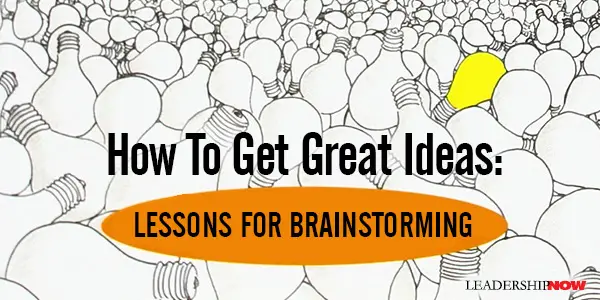
IN 1941, advertising man Alex Osborn (BBDO) came up with the idea of “Thinking Up” which was later changed to brainstorming by his “thinking-up” colleagues. In an excellent book about innovative and productive thinking simply titled, Think Better, author Tim Hurson reviews Osborn’s list of four essential rules for effective brainstorming:
Hurson notes that studies have shown that the last third of a brainstorming session usually results in the best ideas. He calls it the miracle of the third third. “You’ll have a greater chance of coming up with that one brilliant idea if you get all the way to the third third than you will if you stop at the first “right” idea.” He writes: The first third of the session tends to produce mundane, every-one-has-thought-of-them-before ideas. These are the early thoughts that lie very close to the surface of our consciousness. They tend not to be new ideas at all but recollections of old ideas we’ve heard elsewhere. They are essentially reproductive thoughts. He says, “Brainstorming is like cholesterol—there’s good and bad, and most people have only experienced the bad.” We have all experienced brainstorming like this: There’s no separation of the different ideas of thinking going on. Creative, idea-generating thinking is being stopped cold by critical, judgmental think. Ideas are being killed before they’re fully articulated. He adds, that “Bad brainstorming is binary; ideas are either good or bad. Good brainstorming is full of maybes." The biggest issue we face in creative thinking is our own patterns of thought that keep us on the straight and narrow. We hold ourselves back because of personal notions of what is right and wrong and what will and won’t work. There’s no magic pill to conquer this. It takes a conscious effort. He suggests though that “Generating long lists of ideas flushes those early ideas out of your head so you can make room for new ones.” Tim Hurson is a founding partner of thinkx intellectual capital. It is a global consultancy for productive thinking and innovation. 
Posted by Michael McKinney at 10:53 AM
10.24.07

Making Leadership Development Part of Organizational StrategyMichael Maccoby states in his book The Leaders We Need, that “In any business, good leadership may be the most essential competitive advantage a company can have.” Linking leadership and strategy then, would seem to be an organizational imperative.According to a recent study outlined in The Leadership Advantage by Robert Fulmer and Jared Bleak, leadership is the essential element in the success of any strategic change effort. “Indeed, no strategy is good enough to succeed without strong leadership.” They found that successful organizations built a strong link between business strategy and leadership-development strategy. The link between business strategy and leadership-development strategy is not haphazard, but specific and deliberate and omnipresent. The link is part of the philosophy of the organization that “permeates all organizational levels and is applicable to all employees.” In this way, an organization can keep the leadership-development strategy relevant to each business unit and to the overall business strategy in general. For example: PepsiCo’s leadership-development strategy is grounded in the belief that strong leaders are needed to be successful in the marketplace.Using senior executive to teach emerging leaders is an effective two-way street where both benefit. One of the surprising findings of this project was the degree to which senior executives practice the concept of leading by teaching. At PepsiCo, Paul Russell, vice president of executive learning & development, speaks of “the magic of leaders developing leaders.” According to Russell, the missing adult-learning principle is that “people learn best when they get to learn from someone they really want to learn from.” Russell notes that “at PepsiCo, the ‘teachers’ our executives want to learn from are our own senior leaders. They are world class, widely respected, and have proven that they can do it here!”
Posted by Michael McKinney at 08:26 AM
10.19.07

The Impending Leadership Vacuum The study reports that the most vulnerable companies are those in the industrial sector and those operating in the Asia Pacific region. Yet the impending leadership crisis is a worldwide issue. Driving the problem is the retirement of baby boomers and rapid growth in Asia. Baby boomers will drain companies of valuable knowledge when they retire, while multinational firms need to find people to lead their businesses in booming markets such as India and China. The crisis doesn’t end there. “Not only are companies concerned with their current leadership capacity,” the study says, “they are confronted by their inability to develop future leadership talent. Over 75 percent of companies indicate building leadership talent is a significant challenge.” Fifty-two percent of the human resources executives interviewed said their organizations may be unable to rapidly develop skills to meet current or future business needs. The report concludes: Creating an adaptable workforce requires more than a series of HR programs….It requires the ability to identify experts and foster an environment where knowledge and experience travel beyond traditional organizational boundaries. It calls for a talent model that can help companies recruit, develop and retain valued segments of the employee population….The human resources organization, by itself, cannot be expected to shoulder this entire effort. True, the HR function needs to take a lead role in providing strategic guidance on workforce issues and designing human capital programs that can enhance workforce effectiveness. However, the entire executive suite needs to play a role in improving workforce performance. This may involve providing functional expertise, taking joint responsibility for executing human capital programs or simply setting a positive example for employees within their organizations. Without this unified commitment, all bets are off….The key to building that kind of workforce lies with the leadership of the organization, facilitated in large part by HR.The ideas in Ram Charan’s upcoming book, Leaders At All Levels, while focused more at developing CEOs specifically, addresses this looming issue and leadership development in general. He has developed a new approach to leadership development that moves it from just an HR function to “an everyday activity that is fully integrated into the fabric of the business and in which line leaders play a central role.” He calls it the Apprenticeship Model. It is essentially learning by doing. In this timely and valuable book, he states that we focus on the wrong people for the wrong reasons and thus we fail to recognize and develop emerging leaders. He constructed a guide to correctly identify leadership talent early-on, called the CEO Nucleus. We’ll take a closer look at what Charan has to say on this important issue as we approach the book’s December 21 release date.
Posted by Michael McKinney at 12:12 AM
10.12.07

Leading When Things Aren’t Going Your WayIn Bo’s Lasting Lessons, authors Bo Schembechler and John Bacon relate a story from Bo’s early days coaching. He learned a lesson about leading when the heat is on from his boss from his boss and mentor Ara Paraseghian that he carried with him the rest of his life. Here's that excerpt:The following season, 1956, I left Doyt [Perry] 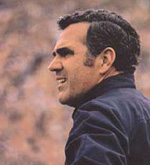 and Bowling Green—with his blessings—to become an assistant for Ara Parseghian at Northwestern University.
and Bowling Green—with his blessings—to become an assistant for Ara Parseghian at Northwestern University.
Ara was not a big ego guy, he was great with players, he was a wonderful motivator, and he understood the game so well he could come up with things no one else had thought of. He was probably the most imaginative coach I’d ever seen, always adapting his plays to his players instead of the other way around like most coaches do. Heck, we used to call his practice field “The Laboratory,” because that’s where he’d try every trick in the book on Mondays, testing this and experimenting with that, just to see what might work that Saturday. Before Ara arrived, Northwestern hadn’t had a winning season in five years, but in his first year Northwestern went 4-4-1, and everyone was encouraged. But in Ara’s second season, 1957, everything went to hell. We lost nine games—every single game we played! For a coach, that’s just about the most difficult situation you have to face. We could keep our opponents down to one or two touchdowns, but we couldn’t score for our lives. And I was working with the offense! Losing creates all kinds of other problems too—poor morale, nagging injuries, lackluster effort. The players were spending more time in the PR office than in the weight room. It was just a mess. I never experienced anything like that in all my years of coaching—and thank God for that. I learned an awful lot from Ara in my first year at Northwestern, but I learned a heckuva lot more from him that second season, when he lost ‘em all. And what I learned was how a real leader leads when things aren’t going his way. Ara treated the staff as though we were winning every game. He never gave the slightest inclination that we were the problem. He not once blamed any assistant or any player fro any loss we suffered that year. NOT ONCE. “Stick with it, guys, and we’ll get through this,” he’d tell us. “We’re going to be okay.” We all kept busting our butts for Ara, working past midnight, doing everything we could to get that guy a victory. I’m not saying there wasn’t some bitching among the players. When you’re losing every game, every player thinks he deserves more playing time. But I promise you this: There was a whole lot less bitching on that team than I’ve heard on teams that won half their games—and there was absolutely no, but no, bickering among the coaches. And that wasn’t even the most impressive thing Ara did that year. Stu Holcomb was Northwestern’s athletic director, and his son Chip was a backup quarterback on the varsity. In the middle of this losing streak, Stu kept cranking up the pressure for Ara to start his son. At one of our staff meetings, Ara laid the situation on the table. Then he asked us point-blank: “What do you think?” The thing is, there wasn’t anybody on the staff pounding on the table to make a quarterback change just because we were losing. We knew there had to be a ton of pressure on Ara to put Stu’s son in, but our quarterback wasn’t the problem. And that’s exactly what we told him when he asked us. He just nodded. Another coach—maybe most coaches—would have caved in to their boss just to save their hides. But Ara held firm. He didn’t change quarterbacks, or even consider doing it. And every one of us who walked out of the coaches room that day felt the same way I did: Ara Parseghian is a stand-up guy. He’s a leader. I want to work for this guy! And that’s why that losing season didn’t break Ara’s back: Because he’s a confident guy, and he knew he could coach. His staff remained dedicated to him and his program the entire season. You’d think my two years at Northwestern would have been a horrible experience, but it wasn’t. It was a great experience, because Ara had put together a stellar staff—they’re all still good friends of mine, especially Alex Agase—but mostly, it was because Ara was there. The result? Put this down: Ara Parseghian lost every game that year, but the next year his team went 5-4—Northwestern’s first winning season in eight years. When Ara took the Notre Dame job five years later, in 1963, he left Evanston as one of only three coaches in the last century of Northwestern football to post a winning record. And of course, from there he won two national titles and Coach of the Year at Notre Dame. Don’t tell me he didn’t deserve it. But that 0-9 year? He didn’t get any rewards for that, but let me tell you: THAT was the most impressive year of his coaching career.
Posted by Michael McKinney at 11:02 AM
10.08.07

5 Leadership Lessons: Bo's Lasting Lessons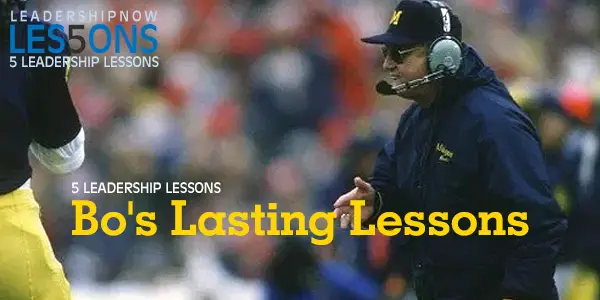
Bo Schembechler's book, Bo’s Lasting Lessons, written with John Bacon is an engaging, hands-on, first-person account of the winningest head coach in Michigan football history and fifth on the all-time list, only behind coaching legends Paul 'Bear' Bryant, Amos Alonzo Stagg, Glen 'Pop' Warner, and Woody Hayes. The lessons found here are easily applied anywhere.

Posted by Michael McKinney at 06:01 PM
10.05.07

When is it Time to Move On?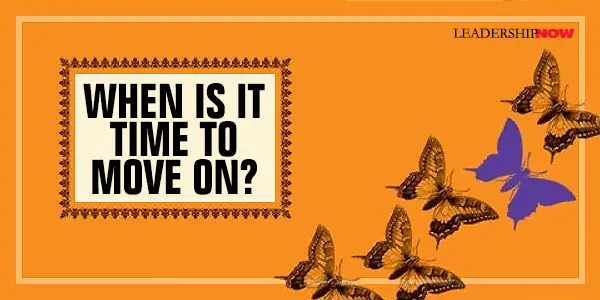 Managing Change is a one in a series of books from the Harvard Business School Press, that presents interviews with top leaders from various fields. In chapter 12 is one such interview with CEO of GenSpring Family Offices (formerly Asset Management Advisors), Maria E. "Mel" Lagomasino.
Managing Change is a one in a series of books from the Harvard Business School Press, that presents interviews with top leaders from various fields. In chapter 12 is one such interview with CEO of GenSpring Family Offices (formerly Asset Management Advisors), Maria E. "Mel" Lagomasino.
Faced with a new merger that would change the culture of the organization, Lagomasino, then chairman and CEO of JP Morgan Private Bank, had to make a tough decision to step down at the top of her game and move on. Here are some of her thoughts on the process: This is the toughest lesson, I think; after you devote yourself to a company and to a lifelong career, and you’ve been very successful—as I have been lucky enough to be—to be able to say, “We’ve come to the point where you need to step down.” This is the time when you have to know when to fold them. 
Posted by Michael McKinney at 12:04 AM
10.01.07

Leadership Books: October 2007Here's a look at some of the best leadership books to be released in October.




Posted by Michael McKinney at 08:54 AM
09.16.07

Alan Greenspan: The Age of TurbulenceAlan Greenspan begins The Age of Turbulence on the morning of September 11th, 2007, but then leaps back to his childhood, and follows the arc of his remarkable life’s journey through to his more than 18-year tenure as Chairman of the Federal Reserve Board, from 1987 to 2006, during a time of irrational exuberance. It’s a good read, written in clear language on the workings of the economic world (and then some). Here are some of the informed opinions he presents in the book:“For the five years we overlapped, President Bush honored his commitment to the autonomy of the Fed….The administration also took the Fed’s advice on policies we thought were essential for the health of the financial markets. Most important was the effort that began in 2003 to curb excesses at Fannie Mae and Freddie Mac….President Bush had very little to gain politically by supporting a crackdown. Yet he backed the Fed through a two-year struggle that resulted in crucial reforms. My biggest frustration remained the president’s unwillingness to wield his veto against out-of-control spending.” “After the Republicans lost control of Congress in the November 2006 election, former House Republican majority leader Dick Armey published a perceptive op-ed piece in the Wall Street Journal….Armey had it exactly right. The Republicans in Congress lost their way. They swapped principle for power. They ended up with neither. They deserved to lose.” “[Wealth Creation] requires people to take risks. We can’t be sure our actions to acquire food, clothing, and shelter, for example, will succeed. But the greater our trust in the people with whom we trade, the greater the accumulation of wealth.…Reputation and the trust it fosters have always appeared to me to be core required attributes of market capitalism. Laws at best can prescribe only a small fraction of the day-to-day activities in the marketplace. When trust is lost, a nation’s ability to transact business is palpably undermined. In the marketplace, uncertainties created by not always truthful counterparties raise credit risk and thereby increase real interest rates.” Looking toward the U.S. economic future, a 4 to 5 percent inflation rate “is probably not a bad first approximation of what we will face.” He continues, “Yet to keep the inflation rate down to a gold standard level of under 1 percent, or even a less draconian 1 to 2 percent range, the Fed, given my scenario, would have to constrain monetary expansion so drastically that it could temporarily drive up interest rates into the double-digit range not seen since the days of Paul Volker.“ “A simple test for any retirement system is whether it can assure the availability of promised real resources to retirees without overly burdening the working-age population. By that measure, America may be on a collision course with reality….[W]e likely won’t have enough people working, nor will we likely have a sufficient increase in the amount each worker in average can produce, to cover the enormous shortfall from entitlements under current law. It may not even come close.” “The notion of enlisting representatives of a corporation’s various stakeholders on the board—unions, community representatives, customers, suppliers, and so forth—has a nice democratic ring to it. But it is ill-advised and I strongly suspect it will not work. Today’s highly competitive world needs each corporation to execute plans from a single coach, as it were. A vote by the whole team on each big play is a recipe for defeat. I assume that eventually some of the more abrasive edges of Sarbanes-Oxley, especially Section 404, will be honed down.” "The shift of manufacturing jobs in steel, autos and textiles, for example, to their more modern equivalents in computers, telecommunications and information technology is a plus, not a minus, to the American standard of living," “However we get to 2030, the U.S. economy should end up much larger, absent unexpectedly long crises—three-fourths larger in real terms than that in which we operate today.” “We should focus on addressing and assuaging the fears induced by the dark side of creative destruction rather than imposing limits on the economic edifice on which worldwide prosperity depends.” “Venice, I realized, is the antithesis of creative destruction. It exists to conserve and appreciate the past, not create a future. But that, I realized, is exactly the point. The city caters to a deep human need for stability and permanence as well as beauty and romance. Venice’s popularity represents one pole of a conflict in human nature: the struggle between the desire to increase material well-being and the desire to ward off change and its attendant stress.”
Posted by Michael McKinney at 08:08 AM
09.10.07

Four Warning Signs That Our Ego is Getting the Best Of UsA managed ego is an important trait of the effective person. Authors David Marcum and Steven Smith state in their compelling book egonomics: What Makes Ego Our Greatest Asset (or Most Expensive Liability), that “surprising as it may sound, many people don’t have enough ego, and that leads to insecurity and apathy that paralyze cultures and leaders.” This is an important addition to our thinking about ego and worth examining in more depth. It does sound odd as no doubt, most of us have been told that ego is a bad thing. But an unbalanced ego—either overconfident or lacking in confidence—can trap people in bad thinking resulting in poor or damaging interactions with others.egonomics offers four warning signs that our ego is getting the best of us:
Humility isn’t the opposite of ego, but it plays a vital role in keeping it in balance. Marcum and Smith created the following diagram to help us to understand the equilibrium concept of humility.  The diagram graphically illustrates the two poles of ego and the grounding effect that humility plays to pull us back into a proper perspective. The authors define humility as the “intelligent self respect which keeps us from thinking too highly or too little of ourselves. It reminds us how far we have come while at the same time helping us see how far short we are of what we can be.” Ego doesn’t suddenly pull us to the extremes and twist us overnight into egomaniacs, or lead us to believe we’re above the law. But once we’re in the habit of being off-center, we do slowly start to believe we’re above other things: reproach, being wrong, being questioned, the need to prove we’re right, having a bad idea, following the lead of others, and so on. Being consistently off-center leads us gradually toward the extremes.When we lose control of ego, we lose “trust, respect, relationships, influence, talent, careers, clients, and market share. Each of us has occasionally, perhaps unknowingly, let ego weaken our talents despite our qualifications, expertise, charisma, track record, or remarkable ability.” This is an important book that will be helpful to anyone trying to get a handle on their ego and understand it manifestations in themselves and others. egonomics is a book that every leader should read and one that we will return to again on this blog.
Posted by Michael McKinney at 12:32 AM
09.03.07

Why Aren’t We Learning?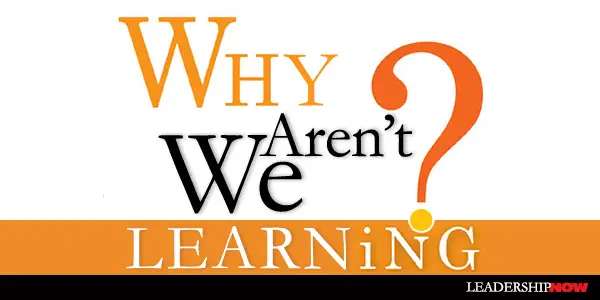 JEFFREY PFEFFER observes in What Were They Thinking? that while “learning organization” and “continuous improvement” have become cliché, few companies actually do those things that need to be done to make them smarter. He writes, “That’s because some of the things they need to do to learn are counterintuitive.” And we might add, are frowned upon socially. We would rather say, “We rarely (never) make mistakes,” instead of “We make mistakes, but we’re learning.” The latter just doesn’t have that ring to it. Culturally, mistakes have no glamour to them. To be free of them is everything. We are attracted to the person who seems to be on top of it all. The fact is, we all make mistakes. But are we learning?
JEFFREY PFEFFER observes in What Were They Thinking? that while “learning organization” and “continuous improvement” have become cliché, few companies actually do those things that need to be done to make them smarter. He writes, “That’s because some of the things they need to do to learn are counterintuitive.” And we might add, are frowned upon socially. We would rather say, “We rarely (never) make mistakes,” instead of “We make mistakes, but we’re learning.” The latter just doesn’t have that ring to it. Culturally, mistakes have no glamour to them. To be free of them is everything. We are attracted to the person who seems to be on top of it all. The fact is, we all make mistakes. But are we learning?
It may seem counterintuitive, but the most successful people are making many if not more mistakes than most people. The difference is that they don’t try to cover them up. They acknowledge them, learn from them and move on. At IDEO, they believe that it’s better to make many smaller mistakes than one big one. Pfeffer writes, “But that ethos requires accepting that novelty and innovation are invariably accompanied by setbacks and failures. And embracing such a way of operating requires letting people fail—maybe even encouraging them to fail. After all, if nothing ever goes wrong, it must be because the capabilities of the system and its people have not been truly tested.” This applies on a personal level as well. Are you testing your capabilities? Pfeffer proposes that organizational learning requires three things: 1. A clear understanding of reoccurring problems. “If the root causes of problems are not discovered and remedied, the problems will almost certainly recur . . . . Organizational learning thus requires people to direct others’ attention to problems so they can be noticed, diagnosed, and fundamentally fixed once and for all.” 2. The willingness to allocate resources to address the root causes of those problems. Research on health care organizations “found that those that learned best generally had a higher proportion of managers. . . . They were helping their employees learn, moving information across organizational boundaries, and essentially scanning the environment for common trends and themes, and then bringing that information to their people, who could collectively use it to enhance performance.” 3. Cultural values that foster learning—which means “encouraging employees to find, fix, and report mistakes rather than heroically patch things up.” Fundamental to this issue, is that we—businesses, churches, families, friendships—all too often punish (exclude, at least frown upon) those making mistakes and reward (promote, speak well of, hang-out with) those who don’t seem to be making any. Who would dare try to learn in that environment? Who would ask for help? 
Posted by Michael McKinney at 10:54 AM
09.02.07

Leadership Books: September 2007Here's a look at some of the best leadership books to be released in September.




Posted by Michael McKinney at 01:27 PM
08.27.07

5 Leadership Lessons: Measure of a Leader Aubrey and James Daniels wrote a comprehensive and thoughtful book on leadership entitled, Measure of a Leader. It is a book that deserves far more attention. The premise is a new model of leadership that focuses on the behavior of followers. By becoming a better observer of human behavior we can become better leaders. They say that “most leadership writers limit their premises to the success of the leader at his or her particular venture.” There’s more to it than that. How you accomplish something is as important (if not more important) than what you accomplish. Here are a few lessons from their book:
Posted by Michael McKinney at 10:48 AM
08.22.07

Fast versus Busy in the Age of SpeedSpeed aficionado Vince Poscente says we are looking at speed from the wrong perspective. While living in a more-faster-now culture can be a little daunting, it also has the power to enrich our lives by making room for more significant things. In The Age of Speed he writes, “When we harness the power of speed, we not only get more and get it faster, but our lives and work become less stressful, less busy, and more balanced.” Crazy idea you say?We like speed when we’re demanding it. We are not so fond of it when it is being demanded of us. You can’t have it both ways. If we want speed, we also have to deliver it. Poscente says though, that it doesn’t necessarily mean that we have to be buried under more work, more responsibilities and more demands. We actually can do more in a given time than we could even five years ago. Therefore, the expectations we face to produce faster are often valid. But we don’t have to work harder or work longer hours to accomplish more.“So,” Poscente asks, “why do people become irritated and rail against the expectation to speed up?” Here’s the key: Perhaps it’s because we don’t often use the extra time for more rewarding experiences. Frequently, when we reduce the time it takes to do something insignificant, we end up using the saved time on yet another insignificant activity. If you figure out a way to save time at the bank and the grocery store, for example, do you earmark that time for something more rewarding, or do you just fill that time passively with other responsibilities that pop up? The latter scenario would leave anyone feeling exhausted, burnt out.I think we have all been guilty of that. He explains: Speed is a great solution for increasing income and productivity, but those benefits are only one piece of the picture. The bigger reason we should speed up is to make time for meaningful experiences. Speed is not just the way to get more work done—speed is the secret to having time to do what we want.Poscente say we can speed up and still have the time to smell the roses. We need to know when speed will and will not benefit us. Are there ways you can approach what you do in a different way that would allow you to spend more time with your priorities, strengths, talents, and passions?
Posted by Michael McKinney at 10:46 AM
08.20.07

The Power of Thinking TwiceHuman freedom involves our capacity to pause, to choose the one response toward which we wish to throw our weight.Les Parrott claims that “three seconds separate those who ‘give it their all’ from those who ‘don’t give it a thought’ — literally. Three seconds. This brief buffer is all that stands between those who settle for ‘whatever’ and those who settle for nothing less than ‘whatever it takes.’” In his book, 3 Seconds: The Power of Thinking Twice, he presents six impulses that never pay off. The impulse to … Give up before trying . . . because we feel helpless. Shun a challenge . . . because it seems daunting. Settle for the status quo . . . because we lack vision. Shirk responsibility . . . because it’s easier to shift blame. Do the mere minimum . . . because that’s all that’s expected. Avoid taking action . . . because we fear failure. If we routinely don’t give any one of these a second thought, they can lead us to lives of mediocrity. From Parrott’s perspective, it comes down to taking a moment to leverage the three seconds it takes to decide whether to behave in a manner consistent with what you really want or to give in to one of these self-sabotaging impulses. Fundamental to all of this is taking personal responsibility. “And many times, you have to shoulder the blame, not because you personally did anything wrong, but on behalf of the company. The best way to do this us to focus not on who’s wrong, but on what’s wrong.” Taking ownership for something often involves an apology. But a simple “I’m sorry” will sound hollow unless you’ve taken the three elements of an apology into account. First, you’ve got to understand what’s wrong. Get what’s wrong right. Second, you then have to admit to it. “Don’t make anyone drag an admission of what’s wrong out of you.” Finally, you need to rectify the situation. You need to do something to try to make the situation better. I would add that not all wrongs can be righted. Nor should we expect them to be. It is a very inward-directed individual that always demands their pound-of-flesh.
Posted by Michael McKinney at 09:08 AM
08.15.07

It's Not About Me?!?In The Ring in the Rubble, Gary Brandt brings up something that can hold us back from defining our problem, immobilize us, and block us from finding solutions. We tend to think that what we see is reality, and to forget that there is a much bigger world out there that, if we considered it, would put our situation into perspective. When we forget this, we tend to take our own perspective a little too seriously, and in the process, we take ourselves too seriously as well.Brandt suggests that a well-developed sense of humor makes a good antidote.
Posted by Michael McKinney at 08:25 AM
08.13.07

Dilenschneider: Power and Influence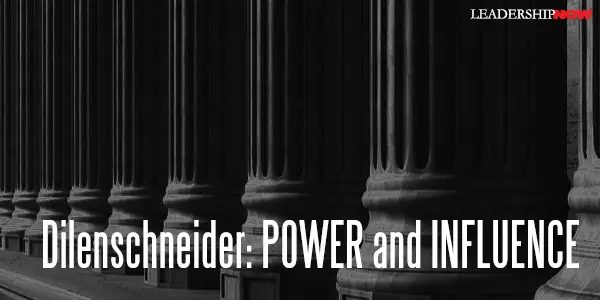
PUBLIC RELATIONS guru Robert Dilenschneider’s excellent new book, Power and Influence: The Rules Have Changed, is worth your time because it is filled with a lifetime of wisdom about how to get along with others—a skill that is at the heart of leadership. He presents ten rules to think about and apply variously to your own situation. I think the most important ideas coming from these rules revolve around how to adapt to your changing world and situation, the importance of knowing how to be relentless, and the need for civility and humility. Rule Four is Seize the Opportunity in Every Crisis. All of us experience some crisis of one form or another, at any given moment in our lives. The big question is how we handle it. Dilenschneider writes, “The ability to survive in an uncertain time is critical…. [A] big part of power lies in knowing the moment to move. It’s not being all over the place all the time; it’s knowing that one critical instant to move, taking action, and getting the result.” He asked his friend, power player Alan Goodman how he viewed power players and their ability to respond to a crisis: They are not impressed with power, and they are not concerned with power. They are concerned with ideas and impact. To me, that’s the biggest lesson I’ve learned from the people I’ve met. Their focus, and the focus of any of us that are lucky enough to lead an institution, has got to be what you do with it. How you make the world less dangerous, how you make your community a better place, how you energize people to get their ideas, because you don’t have all the ideas yourself. The best leaders focus on getting the best ideas and then doing something with them. Here are a few other lessons from Dilenschneider: LESSON: For a power player, it’s important to reach out to the shoeshine boy as well as the CEO. In fact, sometimes it’s more important to reach out to the shoeshine boy so that the CEO sees that you’re a person of the people, a person who’s generous, who’s humble, who’s willing to do outreach. LESSON: What is it like to be with these men and women of power? With the best of them, it is terrific because they are essentially humble people who understand their own shortcomings. LESSON: Keep your friendships, nurture them, and don’t expect anything in return. At the same time, when someone else has a problem, help that person instead of shying away from him or her. Most people tend to look at people with problems and say, “I want to avoid those people.” The time to go to people is when they’re down and out. They are unlikely ever to forget your goodwill. 
Posted by Michael McKinney at 10:58 AM
08.01.07

Leadership Books: August 2007Here's a look at some of the best leadership books to be released in August.




Posted by Michael McKinney at 09:10 AM
07.30.07

In A World Of Accelerating Change, It Takes Bold Leadership What does he mean by bold leadership? In terms of a government's leadership style, Bush noted that it is critical for an administration to rethink what they are doing. “A lot of times, the way we do things is because we have been doing it that way before, not because it is rational, not because it improves the human condition or creates the chance for people to pursue their dreams, but because we have been doing it that way. So in a world where change is happening a lot, whether the government is changing or not, it is important for leadership to have a healthy disrespect for the status quo. You won't change everything but the things that don't work need to be changed and without leadership, this won't happen." This thought is echoed in Jim Tompkins’ book, Bold Leadership for Organizational Acceleration. In it, he addresses three important aspects of bold leadership—the inspirational leadership that drives an organization, outsourcing those areas outside your core competencies, and the importance of a Plan B. Tompkins states. "Leaders must not only be bold if they want to thrive today, but they must also develop bold companies—encouraging boldness in all aspects of the organization." To do this, “Leaders must, therefore, teach others how to be leaders. Their strategies must be flexible and innovative. They must challenge the established view of a leader as someone who leads and demonstrate that leadership means inspiring others to lead. They must have the courage and spirit to move from wherever they are to further their abilities to lead others into getting extraordinary things done. In other words, these leaders must practice Inspirational Leadership."To make this happen Tompkins suggests that leaders look at the big picture to locate and deal with those “parts of the picture that are just filling up canvas and not adding value to the subject.” Tompkins adds something that I think underscores the importance of this point. “Actually, it is not enough just to look at the big picture. If your picture is in a frame, you need to look at the frame too. Is it possible that the frame is the important part and the picture inside it needs to be changed or removed? ... Or is the frame that holds the picture rotting or overpowering the picture so that it is totally lost?” Perhaps it’s time to look at what we are doing and ask if we need to be doing it differently or if we need to be doing it at all.
Posted by Michael McKinney at 04:00 AM
07.25.07

Remarkable Leadership: The Kevin Eikenberry Interview Part 2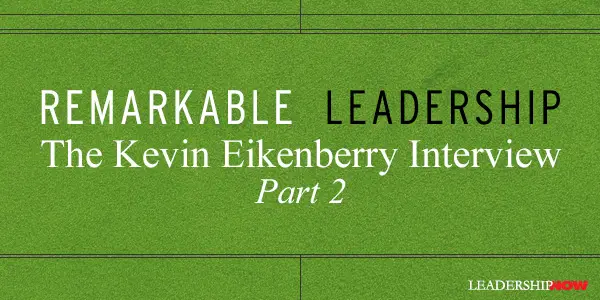
OUR interview with Kevin Eikenberry author of the book Remarkable Leadership continues. The final part will be posted on Friday. LeadingBlog: In your book, Remarkable Leadership, you divide teams into two types — basketball teams and track and field teams. Could you explain that? Kevin Eikenberry: You obviously read the book. LB: I did.  LB: So what we're trying to do really, is force track and field participants or teams into basketball teams? KE: I think that happens far too often. I've been on teams like that and I have been in situations like that and I have seen it many times. I've tried to help individual teams and organizations think about it. Most organizations have both kinds of teams and the problem is that leaders try to treat both the same because they've never thought about the differences. LB: You wrote in your book that “remarkable leaders don't delegate, they share responsibility.” What do you mean by that? KE: Well, you know I asked a lot of people about the “delegate” word. The interesting thing that I got was, there’s not a lot of positive feelings around the word delegate. I think that maybe it’s a bit of a play on words but I think that when leaders are thinking about delegating at least in my experience—anytime I think about any book I've read about being a more effective leader or manager and it talks about delegation, it’s talking about handing things off so you can do something else—and when you think about delegating from the perspective of handing things off to others so I can do something else, you're not doing it in support of the other person. You're just doing it in a somewhat selfish way to give me time to do something different, however valuable that might be. I think that the difference is in the focus. The focus of thinking is about sharing responsibility—it's not “I'm sharing this with you, yet I'm going to be free to do something else” but “I'm sharing this with you to help you grow, to help you to get to the point where you can do my job, or that we collectively can be more productive or whatever that looks like.” But really I think its as much about what’s the underlying reason for the activity. Remarkable leaders think about it from the perspective of how’s that going to impact positively the other person and the organization. I know that if I'm thinking about it that way Michael, I'm going to do a better job of handing-off that task—whatever we're going to use to call it. If my intent is about helping the other person be more successful, building their skills, increasing their accountability, whatever that looks like, if my intent is to help them, then I'm going to be much more successful at doing it whatever I call it. So the difference is not so much about the semantics, but the intent. I'm using different words to try to help describe that intent. I may have just done a better job of describing it here than I did in the book. I don't know. LB: That caught my eye in the book because everything you read says delegate. KE: Everybody that I talked to—and that’s one of the chapters that as I was writing that I spent a lot of time calling people, calling colleagues, calling friends, (and the next book I'd be calling you—you're one of those people that I'd ask) everyone had this whole thing about delegating—both as being delegated to and delegating—not a positive thing. I'm thinking, you know, wait a minute, these are opportunities for learning and development and growth, why is it that they don't feel that way. And I tried to back into this whole idea of intent and I think that’s where the difference is. LB: Well, that makes good sense. I was wonder about delegating those tasks where we know we are weak … if you're doing it in the sense of a shared responsibility then that would make sense wouldn't it? KE: That’s exactly right. And I think remarkable leaders do recognize their strengths verses the strengths of the other people on their team. And hopefully, we are self-aware enough to know what it is that we want to be sharing based on what our strengths are. And we're aware enough of the strengths of our team members to be sharing things with them that matches their styles or strengths better. I think as remarkable leaders we recognize that we're better off when we put the right work in the hands of the people that have the strengths to handle it. It doesn't necessarily mean the experience or knowledge as much as the strengths. I think that remarkable leaders figure that out well enough and try to share the work in a way that makes the most sense. 
Posted by Michael McKinney at 07:24 AM
07.23.07

Remarkable Leadership: The Kevin Eikenberry Interview Part 1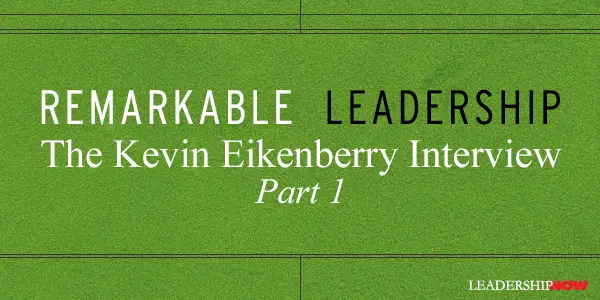 THIS WEEK—Monday, Wednesday and Friday—we will feature an interview with Kevin Eikenberry author of the book Remarkable Leadership. Kevin is the Chief Potential Officer of The Kevin Eikenberry Group, a learning consulting company that provides a wide range of services, including training delivery and design, facilitation, performance coaching, organizational consulting, and speaking services. Kevin believes that remarkable leaders are developed. Remarkable Leadership identifies the 13 competencies of remarkable leadership and offers a proven method for applying those competencies at any level of leadership. The book is thought-provoking and easily applied. In this interview, Kevin will share his thoughts on leadership development, lifelong learning, teamwork, delegating, followership and the biggest factor that could prevent you from becoming a remarkable leader.
THIS WEEK—Monday, Wednesday and Friday—we will feature an interview with Kevin Eikenberry author of the book Remarkable Leadership. Kevin is the Chief Potential Officer of The Kevin Eikenberry Group, a learning consulting company that provides a wide range of services, including training delivery and design, facilitation, performance coaching, organizational consulting, and speaking services. Kevin believes that remarkable leaders are developed. Remarkable Leadership identifies the 13 competencies of remarkable leadership and offers a proven method for applying those competencies at any level of leadership. The book is thought-provoking and easily applied. In this interview, Kevin will share his thoughts on leadership development, lifelong learning, teamwork, delegating, followership and the biggest factor that could prevent you from becoming a remarkable leader.
LeadingBlog: How do you define a Remarkable Leader?  LB: What is wrong with how most organizations do leadership development today? KE: The main thing that is wrong with what most organizations are doing is that they think of leadership development as being about events. We always say, “training is an event, learning is a process.” And it’s the same thing for leadership development. Organizations are looking for the magic pill, they've identified people as high performance or their next leader or “they've been a supervisor for three years so we'd better give them some training.” So leadership development looks like this event, this workshop, this seminar, this whatever, and when they've done that they've checked that box and that’s their leadership development process. I think the smartest organizations are looking at it differently. They're looking at leadership development much more holistically. They're thinking about a wider variety of activities, and experiences and processes. Anything from different sorts of assignments, different sorts of projects to application projects, to the chance to be coached or coach others, mentoring programs and a whole host of other things, put together specifically to work best for that organization. So in short, what’s wrong is that people are thinking about leadership development like they do most training and that is as events as opposed to thinking about a process in terms of what really makes learning work. LB: So more of a long term thing? KE: A long term thing, but an integrated thing. Integrated with the work. You could have training that is long term right? You could have a class this week and next month and four months from now and 21 years from now and all that sort of thing, but the real challenge is, I think, integrating it back into the work so that people can go back and really apply what they're learning. LB: You place a lot of emphasis on learning? Would you say that the ability or the desire to learn is the most fundamental skill of the remarkable leader? KE: That’s like the big softball for me. One of the early chapters in the book talks about that very thing. I do believe that the number one skill of a leader—the underlying core skill of a leader—is their ability to learn. Because, if we want all of these kinds of things in our employees or those we lead—we want flexibility and collaboration, and we want them to continually grow and we want them to develop and we want those things for them—then number one, we had better be doing those things ourselves. And secondly, if we want to continue to build our skills—as I said a remarkable leader is someone who does continue to build their skills—that means by definition, that we have to be ongoing, or as I say in the book, continual learners. To me, it is the fundamental underlying skill. And Michael, when I work with groups, I'll ask them when they think of the best leaders they've ever experienced, make me a list of their characteristics, and people will come up with a long list of great attributes, but they won't come up with the word learning. But without learning most of those other things aren't going to happen. LB: So you don't think leaders are born? KE: I don't. I don't think leaders are born. I think that all of us have a unique bundle of gifts and talents that are a part of our DNA and although there are some people that may have some innate skills that help them become some parts of the leadership process more easily—just like there are some people that innate skills that make them better mathematicians or musicians right? But I think just like those things that challenge us as a leader, is to play on our greatest strengths—to utilize our greatest strengths—to become more effective leaders. Because in the end, being a highly effective leader is about being a highly effective human. There are many different ways to lead and the challenge is finding the voice that we best lead with and build on those strengths first. LB: Good. How would you improve your learning ability? Or make the time for it? Sometimes we get so busy that we put “learning” off because we don't have time for it. KE: Absolutely. That’s why, when I started to write the book the learning competency was that remarkable leaders are continuous learners. And I don't think that that’s really true. We're not continuous learners. We're doing all sorts of things and although as human beings we are learning beings, we are not necessarily continuously, consciously learning. The kind of learning we are talking about here is conscious right? And so, I think it’s much more about being continual. On an ongoing basis as opposed to continuous—in every moment being a learner. I think that’s too high a bar to set for ourselves. I think the challenge for us all is that first of all we have to figure out how to make the time for it and the way to do that is to find opportunities. I think if I could encourage people to do just one thing that would make them a more effective continual learner—and it doesn't necessarily take a lot of time, it takes change of a couple of habits—that is that we would just take time to reflect more on our day; thinking about what worked and what didn't, what we want to repeat and what we don't want to repeat, and what we learned that we want to do differently the next time. If we would take 20 minutes every day to do that we would improve so rapidly I think it would be quite amazing. And the way we do that is to, first of all, make a conscious effort to do it. You say, “Well I don't have 20 minutes.” but yeah you do. Because you drive home from work and you listen to the radio or you take your walk and you listen to your I-pod or watch television in the evening, I think there are lots of times we can steal 15-20-30 minutes a day to do these kinds of things. It’s not like reading … having a book in hand or any of those other things. It’s just closing our mind down enough from other things to give ourselves a chance to reflect. And in the end, a learning process has to include a reflection process or we can't learn from our own experiences. I think that that is too often left out. And we're in such a rush to move from one thing to the next—from doing one tele-seminar to another interview, to do another phone call, right?—that we don't take the time to just stop take a mental deep breath and really think about what worked and what didn't. So if I'm going to do a better job in my next interview, I'd better stop and spend a little time thinking Michael, about what went well on this one or not. And I think that is the key for us to become continual learners. If I could say one thing, it would be take the time, make the time to reflect and ask those reflective questions. 
Posted by Michael McKinney at 03:23 AM
07.10.07

Six Disciplines for Excellence: Decide What's ImportantNow in its new and improved second edition, Six Disciplines for Excellence by Gary Harpst is still one of the best field guides to business. It lays out a practical methodology to help you stay aligned with your mission using sound foundational principles. Through a series of repeatable annual, quarterly, weekly and daily cycles, this methodology will help you to successfully guide your business and quite frankly, your personal life as well. Not surprisingly, you will find that these disciplines are applicable to your personal life, because we are all subject to some of the same pressures that are present in any other system.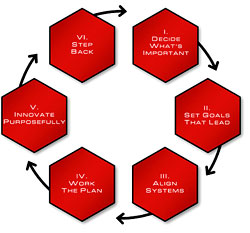 I find that the most vital principle presented here begins with step one: Decide What's Important. Its importance is underscored in the fact that it is woven throughout the process and culminates in step six. The practice of repeatedly stepping back and asking how did we get here? and why are we doing what we are doing? is vital to sustaining any system. While this is probably one of the most intellectually understood behaviors, it is in practical terms, likely the most overlooked discipline he presents here. It is overlooked because the pressures of the present lead us into directions and practices that we never intended and are often counter-productive. So we put it off, intending to address it later. Unfortunately, later rarely comes and the inconsistencies we create only breed more inconsistencies. Unnecessary actions and behaviors hang on long after their usefulness is gone. In business and life, we need to continually step back and reconsider what we are doing. Sometimes life happens – things happen we can’t plan on - and in the swirl of it all, we find ourselves doing that which we otherwise would not. His methodology helps to you to become more proactive and eliminate the tangents that distract you from what you should be doing. Harpst writes: Businesses are “systems” and they’re subject to forces similar to entropy. Once a small business makes plans, the chaos of everything changing around it gradually erodes those plans, like the warm water melts the ice. An organization must have a systematic and ongoing way to offset those forces, or it will eventually become ineffective to the point that its survival will be at stake. Or, using a different analogy, Stephen Covey once said, “We are too busy driving to get gas.”
Posted by Michael McKinney at 08:49 AM
07.03.07

Leadership Books: July 2007Here's a look at some of the best leadership books to be released in July.




Posted by Michael McKinney at 08:17 AM
06.15.07

Growth: The Key to Leading for a Lifetime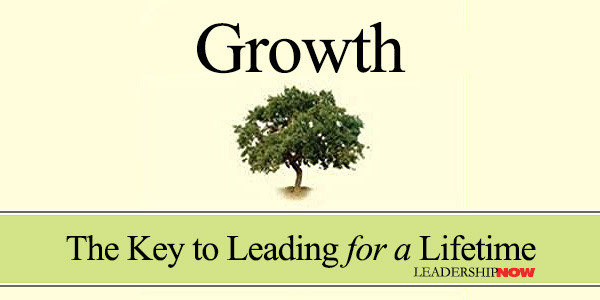 HARVARD Business School Press has thankfully reissued Geeks and Geezers by Warren Bennis and Robert Thomas, as a paperback titled, Leading for a Lifetime: How Defining Moments Shape Leaders of Today and Tomorrow. The focal point here is growth. The kind of growth that comes from working through and finding meaning in what they term the crucibles of our life—places or experiences from which one extracts meaning, meaning that leads to new definitions of self and new competencies that better prepare one for the next crucible.
HARVARD Business School Press has thankfully reissued Geeks and Geezers by Warren Bennis and Robert Thomas, as a paperback titled, Leading for a Lifetime: How Defining Moments Shape Leaders of Today and Tomorrow. The focal point here is growth. The kind of growth that comes from working through and finding meaning in what they term the crucibles of our life—places or experiences from which one extracts meaning, meaning that leads to new definitions of self and new competencies that better prepare one for the next crucible.
The ability to learn is a defining characteristic of being human; the ability to continue learning is an essential skill of leadership. When leaders lose that ability, they inevitably falter. When any of us lose that ability, we no longer grow. This book is about the importance of learning and how to keep learning. They write, “The ability to process new experiences, to find their meaning and to integrate them into one’s life, is the signature skill of leaders and, indeed, of anyone who finds ways to live fully and well.” In a nutshell, the ability to find context in your life experiences is key to success. They talk throughout the book about the importance that crucibles play in the transformational learning that is essential to leadership. They ask if your company incorporates opportunities for learning into the daily life of the organization. Do they provide leaders with the tools and the coaching required to make the most of their formative, and transforming, experiences? Companies need to encourage employees to reflect on what they are learning even as they face new challenges. Companies have to learn that quiet thoughtfulness may be more productive than frantic bustle. Employees need to be rewarded for the way they approach crises as well as for outcomes. Organizations have to distinguish between occasional good failure and habitual, unproductive failure. Employees need to be rewarded for their creativity, which inevitably means taking risks. They cite Edith Wharton from The Age of Innocence: “In spite of illness, in spite of the arch-enemy, one can remain alive long past the usual date of disintegration if one is unafraid of change, insatiable in intellectual curiosity, interested in big things, and happy in small ways.” Words to live and grow by, whatever your age. 
Posted by Michael McKinney at 12:35 AM
06.08.07

The Key to Presidential Courage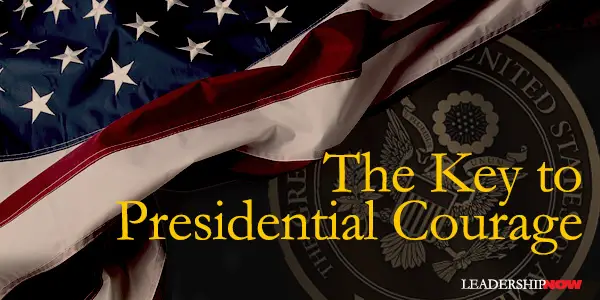
HISTORIAN Michael Beschloss, gave an engaging and entertaining talk to the Los Angeles World Affairs Council a couple of nights ago about his book, Presidential Courage. 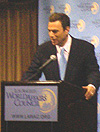 Beschloss said that in effect, Adams said, “I wanted more than anything to get a second term so that I had a chance in history to be the equal of General Washington. Now that’s gone. But, I can go back to Massachusetts and I can feel that my sacrifice was for something important. And I still have my wife Abigail (to whom he was so close) and my children and my farm and my books and my old veteran friends from the revolution.” Adams lived on for 26 more years; long enough to see his son John Quincy elected to be the sixth President. Bescholoss found his attitude a significant key to courage. Adams had a life beyond the Presidency. “We’ve got to look at candidates for President this year and next, and if you want someone who is capable of presidential courage, I would say one thing to look for is: Is this someone who is desperate to be President and hang-on almost at all costs or is this someone who if there is a moment requiring presidential courage—where they have to give it all up—has something else in his or her life—a family or other interests or even better yet, convictions (they can feel that they gave it up for doing the right thing)? The question was raised concerning the difference between courage and betrayal. We speak of courage on the one hand, but what is going on when a President betrays people by doing something that people do not like or different from what they said they would do. Beschloss responded, “In these stories, you will see where Presidents do tell American’s that it’s a good thing to do things that they may not first approve of, but it is not something that is wildly different from something they said in the campaign. They’re moving public opinion just somewhat beyond where it’s willing to go at the moment.” For example: Of the nine presidents I write about, only one had to pay the price of losing reelection and that was John Adams. Everyone else was a good enough politician or a good enough educator that they were able to continue. For instance, FDR, in trying to get a third term could say to Americans, “Well, you may be disturbed by my building up our defense, but think of it this way. Maybe it’s the best way to scare off Hitler if we’re really strong with 50,000 airplanes and so on.” Or in Abraham Lincoln’s case, he stuck to the Emancipation [Proclamation]. But rather than just say, “Well, I’m going to be a courageous guy, and I’ll just go down in flames,” he was such a good educator that he said to Americans, “You may not like the idea of fighting the Civil War also to free the slaves, but since I’ve declared the Emancipation, 200,000 African-Americans have come across enemy lines from the South and they’re all working hard in our Union War effort. If I now dispense with the Emancipation, they’d sit on their hands and we’d lose the war.” 
Posted by Michael McKinney at 02:34 AM
06.06.07

10 Rules to Fuel Your Life, Work, and Team with Positive Energy
JON GORDON writes in The Energy Bus, “No one goes through life untested, and the answer to these tests is positive energy.” Fortunately he is not referring to the kind of rah-rah positive energy that makes you roll your eyes and close the book as the title might suggest. Instead he refers to “the kind of positive energy consisting of vision, trust, optimism, enthusiasm, purpose, and spirit that defines great leaders and their teams.” The Energy Bus is a well-executed fable that reveals 10 secrets for approaching life and work with the kind of positive, forward thinking that leads to true accomplishment - at work and at home. The story will resonate with anyone with any life experience at all. The 10 rules are:
Jon Gordon's take on these rules is good and worth a look at. He has created a web site to support the book. 
Posted by Michael McKinney at 09:24 AM
06.04.07

Up the OrganizationJossey-Bass has released a commemorative edition of Robert Townsend’s (1920-1998) leadership classic, Up the Organization: How to Stop the Corporation from Stifling People and Strangling Profits. Originally published in 1970, this candid and provocative book deserves to be re-read every year. Here's a sample of Townsend's straightforward and practical advice:On People: Why spend all that money and time on the selection of people when the people you’ve got are breaking down from under-use. Get to know your people. What they do well, what they enjoy doing, what their weaknesses and strengths are, and what they want and need to get from their job. And then try to create an organization around your people, not jam your people into those organization-chart rectangles. On Delegation: Many people give lip service, but few delegate authority in important matters. And that means all they delegate is dog-work. A real leader does as much dog-work for his people as he can: he can do it, or see a way to do without it, ten times as fast. And he delegates as many important matters as he can because that creates a climate in which people grow. On Leadership: True leadership must be for the benefit of the followers, not the enrichment of the leaders. In combat, officers eat last. Most people in big companies today are administered, not led. They are treated as personnel, not people. On Rewards: Rewarding outstanding performance is important. Much more neglected is the equally important need to make sure that the underachievers don’t get rewarded. This is more painful, so it doesn’t get done very often.  On Compromise:Compromise is usually bad. It should be a last resort. If two departments or divisions have a problem they can’t solve and it comes up to you, listen to both sides and then, unlike Solomon, pick one or the other. This places solid accountability on the winner to make it work. On Compromise:Compromise is usually bad. It should be a last resort. If two departments or divisions have a problem they can’t solve and it comes up to you, listen to both sides and then, unlike Solomon, pick one or the other. This places solid accountability on the winner to make it work.
Robert Townsend served as the president and chairman of Avis Rent-a-Car from 1962 to 1965 during its celebrated turnaround. You may remember the infamous the "We Try Harder" advertisign campaign that helped to tranform it into a world-class organization.
Posted by Michael McKinney at 08:33 AM
06.01.07

Leadership Books: June 2007Here's a look at some of the best leadership books to be released in June.




The LeaderShop specializes in providing books and resources to businesses—for training, conferences and gifts—in large quantities at substantial discounts. On orders of 100 or more copies of a title, we can usually obtain additional discounts and/or free shipping. If you need an order expedited or are looking for a title you can't find on our title index, just call 800-423-8273 and ask about it. If it's out there we can generally get it for you. And thanks for your support.
Posted by Michael McKinney at 12:02 AM
05.25.07

Developing a Respectful MindHoward Gardner writes in Five Minds for the Future, "Adolescents have potentials for leadership, or for enterprise, that can be marshaled for diverse ends; it is up to their elders—parents, educators, community leaders, slightly older and more mature peers—to influence how these potentials are mobilized." This is a significant thought worthy of repeated reflection. It describes the process of character development throughout our lives. We might consider what functions we occupy and the influence we are having on others.In any event, Gardner believes that the mobilization of these potentials should progress in five directions that can be manifested in five minds. They are: the disciplined mind (a mind trained on a specific scholarly discipline, craft or profession), the synthesizing mind (a mind that can create value from information), the creating mind (a mind that can break new ground), the ethical mind (a mind that contemplates meaning in work and life and then acts on it) and the respectful mind (a mind that welcomes differences between group and individuals). Looking specifically at the respectful mind, he writes that “rather than ignoring differences, being inflamed by them, or seeking to annihilate them through love or hate, [he] would call on human beings to accept the differences, learn to live with them, and value those who belong to other cohorts.” The respectful mind, like the other four qualities of mind, Gardner believes is a kind of thinking or attitude we will need to have to thrive during the eras to come. He says “eras to come” because while we have always needed this quality of mind, it has been a kind of option. Meaning I assume, that the repercussions of not having it were better contained in times past. However, today we are so interconnected that our very survival depends on it. In a global sense he is right. While all of these minds interact with each other, the respectful mind, I believe, would seem to be the cornerstone.  Without it we limit our input—distance ourselves from reality—and virtually assure that we are not effective with others. Consequently, the respectful mind is the first mind we should seek to develop in children and demand from ourselves. Without it we limit our input—distance ourselves from reality—and virtually assure that we are not effective with others. Consequently, the respectful mind is the first mind we should seek to develop in children and demand from ourselves.
Posted by Michael McKinney at 12:22 AM
05.10.07

Embracing The Dip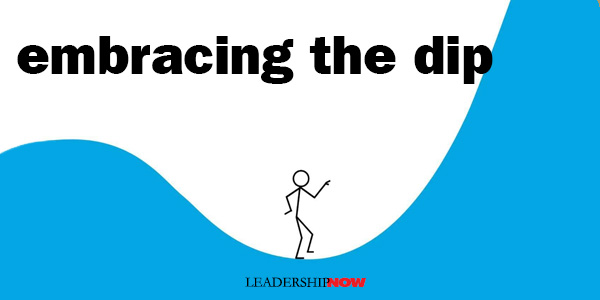
Seth Godin is a perennial favorite because he is among other things, what Saul Bellow called, a first class noticer. He gathers information and makes valuable and practical meaning from it. He doesn't skip the hard questions. His book The Dip: A Little Book That Teaches You When to Quit (and When to Stick) is no exception. What is The Dip you ask? Seth defines it as “the long slog between starting and mastery. It's any rough patch you have to get through before achieving your big goal . . . if in fact you're chasing the right goal.” This short read – 86 pages – is really about understanding what needs to be done to make the move from mediocrity to greatness. It's about quitting what gets in the way of you being the best. As Seth points out, it takes a lot more than saying, "I want to be the best." It also means letting go of those things that for you are dead-ends. Quitting those things where you are wasting your time and energy and refocusing your resources in The Dip – that place where you can achieve the greatest accomplishment. This isn’t a new idea, but it is the best, most memorable presentation I have ever seen of it. Strategic quitting is the secret of successful organizations. Reactive quitting and serial quitting are the bane of those that strive (and fail) to get what they want. And most people do just that. They quit when it’s painful and stick when they can’t be bothered to quit.Finding and successfully moving through your Dip is really a matter of counting the cost. Consider first, if you have the resources to carry on and then, if you succeed, is it worth the effort? The Dip is why everyone is not doing what you're doing. It is also why you are not the “best in the world” at what it is you do. It’s where most people get stuck. Anything worth doing has a Dip. The Dip is actually a good place to be Seth says because if you can get through it, you can win where most others quit. So, you want to find your Dip. It’s the incredibly difficult challenges (the Dips) that give you the opportunity to pull ahead.If you’re looking for some inspiration you might try reading New Ideas from Dead CEOs by Todd Buchholz. He writes: “Each of these CEOs failed at some point. Faced with bankruptcy and defections, they could have succumbed to psychological depression or the siren call of politicians offering class warfare. He each heard nos, the tsk-tsks of friends, and a schadenfreude chorus scoffing at their failure. But they pushed on, energized by passion, ego, money, and the promise of glory. You cannot build a successful business or economy on the kindness of strangers. These CEOs relied on more dependable, more human drives. Drives that took them on fascinating rides.” In short, they embraced the Dip. Here’s a tip. If you can’t measure your progress, if you feel like you are working harder and harder to get nowhere, then you’re probably putting your efforts into a dead-end initiative. You have the wrong strategy. You need to let go and find your Dip. With a little introspection, this has the potential to be a life changing book. Take the time to read it and apply it. You can read it in one sitting but you’ll think about it for days. A few people will choose to do the brave thing and end up the best in the world. Informed people will probably choose to do the mature thing and save their resources for a project they’re truly passionate about. Both are fine choices. It’s the last choice, the common choice, the choice to give it a shot and then quit that you must avoid if you want to succeed. 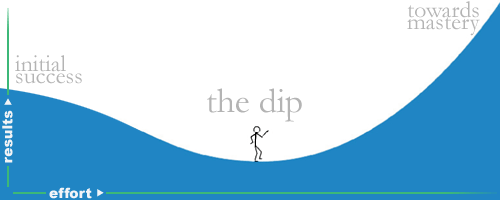  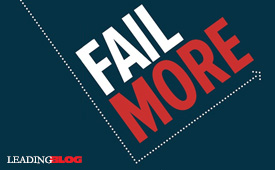 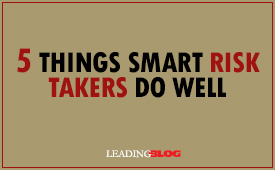
Posted by Michael McKinney at 12:15 AM
05.07.07

What It Takes to Lead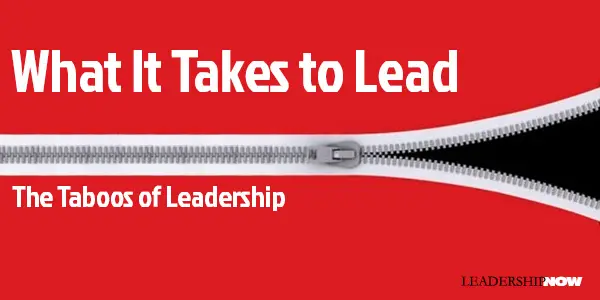
TONY SMITH believes that much of the leadership literature today dances around what it really takes to lead because there are some areas that are politically incorrect or just too difficult to talk about. As a result we have created a “sanitized, air-brushed, or glorified picture of leadership that masks or disguises reality” and we never really get at what leaders do and why they do it. Through his frame of reference, that of executive coach and advocate, he adds great value to our understanding of the realities of leadership even if at times, his conclusions derail when trying to understand leadership at any other level that that of the CEO. In his new book, The Taboos of Leadership his observation that “leaders who are successful never quite fit the theories we apply to them and are always messier and more complex than we would predict” is quite true. It is an aspect that is missing from or far too understated in most leadership literature. Perhaps that explains why international leadership expert Manfred Kets De Vries, wants to put the leader on the couch.Smith writes: There is nothing tidy or clean about leadership. It’s messy, but so is the rest of life. He asks ten taboo-braking questions: What does it take to lead? Does charisma matter? Is being political a bad thing? Do women make better leaders? What about the trappings of power? Should the leader play favorites? Do leader’s really want to groom a successor? Should a leader’s work be their life? Should leaders put aside their own motivations and interests and serve only the motivations and interests of their people? Do leaders cultivate loneliness deliberately? He left out a direct discussion of followers and authority. These are two areas that are misunderstood as often as they are poorly executed. The proliferation of “leaderless organization” literature will attest to that fact. Instead of sugar-coating or dismissing these topics, we should seek a better understanding of these vital and necessary issues. Smith suggests: “Perhaps we should know, or at least recognize, the risk-reward ratio of leadership a little better before we judge our leaders, or decide to become one ourselves.” That point can’t be emphasized enough. 
Posted by Michael McKinney at 12:28 AM
05.04.07

Presidential Courage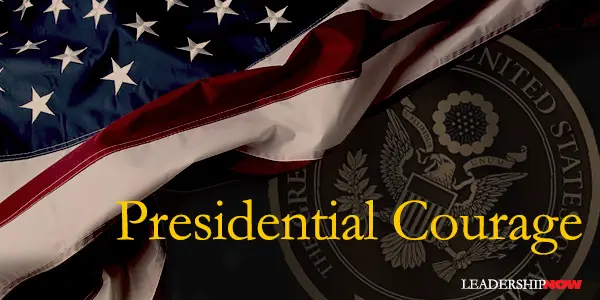
MICHAEL BESCHLOSS has written a series of stories inPresidential Courage about how nine American Presidents have, at crucial moments, made courageous decisions for the national interest even when they knew they might be jeopardizing their careers. The stories are brief overviews of trying times but are both poignant and encouraging. In his epilogue he writes: From his own reading of history, John Kennedy feared that the changing political environment was making it more difficult fro Americans to practice the kind of leadership that had shaped our past. Beschloss continues with this prescription: The ancient Romans surrounded their young leaders with paintings and sculpture to encourage qualities of greatness. Surround yourself with these stories. 
Posted by Michael McKinney at 10:58 AM
05.02.07

Ignition PointsHow do you lead in a situation where you are not in control? Vince Thompson asks in his book Ignited, “Can the principles [CEOs] use to run their companies really work for managers in The Middle like us—managers without the ability to reshape businesses, redirect strategies, or even (in many cases) to hire, fire, and reward employees as we see fit? The answer is a qualified no.”Working from where you are with a foundation of authenticity and self-discipline, you can help to make the necessary changes in your organization and create more purpose in your leadership role. Thompson defines seven ignition points—functions or tools you can develop and use to create unique value to your organization.  The first of these is the power of the Process Master. “One of the most powerful ways for a manager in The Middle to add value is by knowing the processes his company engages in … and knowing them cold.” In addition to specific steps in the process, “It also means knowing the individuals who handle the processes, along with their quirks, strengths, shortcomings, needs, and vulnerabilities.” A big picture thinker. Second, is the power of the Linkmaker. “Great managing is largely about Linkmaking—knowing the people around you, understanding what makes them tick, And connecting their knowledge and skills in ways that will make powerful things happen for the organization.” Third, is the power of the Translator. The translator helps people in the organization to see each others viewpoints and values to help unite them behind shared organizational goals. It’s the ability to translate organizational goals “into actionable ideas that our diverse workforces can ll relate to, buy into, and support.” Fourth, is the power of the Scout. The Scout understands the landscape—the environment, the customers and vendors—the organization is functioning in and communicates that throughout the organization. The Scout tracks people’s changing attitudes, interests and ideas and works to develop its full potential for the benefit of the organization. Fifth, is the power of the Pilot. In the role of Pilot, you need to be “looking for threatening shoals and promising open sea lanes, and working to steer your company away from the former and toward the later.” Sixth, is the power of the Bard. “The Bard is an ignited manager with the ability to record and pass on organizational history … and the evocation of relevant facts and comparisons from past events when current decisions are being weighed.” Why is this so important? Because you can “help others understand where they fit into that story.” That’s vital. Finally, he describes the power of the Healer. “Rather than treating people like cogs in a machine, smart managers empathize with the struggles and aspirations of their team members. They realize that each one is an individual with strengths, weaknesses, and emotions that must be understood fully.” The ignited manager “knows that motivating people is, in part, about nurturing their hearts and minds. The ignited manager “knows that motivating people is, in part, about nurturing their hearts and minds. Thompson begins with a short quiz to help you identify your mindset in relation to the ideas he presents in this book. He finishes with steps you can take for “getting your idea sold and ensuring that you achieve the success and recognition you’re earned.”
Posted by Michael McKinney at 12:51 AM
05.01.07

Leadership Books: May 2007Here's a look at some of the best leadership books to be released in May.
Posted by Michael McKinney at 08:50 AM
04.08.07

Lee Iacocca’s 9 C's of Leadership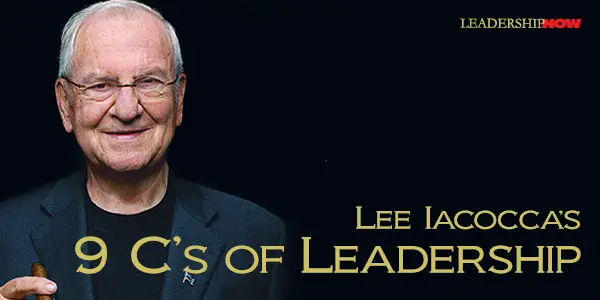 LEE IACOCCA'S polemic,Where Have All the Leaders Gone?, will be released on April 17th. In the meantime you can read chapter one Had Enough? in our Reading Room. Included in chapter one he presents his 9 C's of Leadership you will find briefly illuminated below:
LEE IACOCCA'S polemic,Where Have All the Leaders Gone?, will be released on April 17th. In the meantime you can read chapter one Had Enough? in our Reading Room. Included in chapter one he presents his 9 C's of Leadership you will find briefly illuminated below:
1. A leader has to show CURIOSITY. He has to listen to people outside of the "Yes, sir" crowd in his inner circle. He has to read voraciously because the world is a big, complicated place. If a leader never steps outside his comfort zone to hear different ideas, he grows stale. If he doesn't put his beliefs to the test, how does he know he's right? The inability to listen is a form of arrogance. It means either you think you already know it all, or you just don't care. 2. A leader has to be CREATIVE, go out on a limb, be willing to try something different. You know, think outside the box. Leadership is all about managing change -- whether you're leading a company or leading a country. Things change, and you get creative. You adapt. 3. A leader has to COMMUNICATE. I'm not talking about running off at the mouth or spouting sound bites. I'm talking about facing reality and telling the truth. 4. A leader has to be a person of CHARACTER. That means knowing the difference between right and wrong and having the guts to do the right thing. Abraham Lincoln once said, "If you want to test a man's character, give him power." 5. A leader must have COURAGE. I'm talking about balls. (That even goes for female leaders.) Swagger isn't courage. Tough talk isn't courage. Courage is a commitment to sit down at the negotiating table and talk. 6. To be a leader you've got to have CONVICTION -- a fire in your belly. You've got to have passion. You've got to really want to get something done. 7. A leader should have CHARISMA. I'm not talking about being flashy. Charisma is the quality that makes people want to follow you. It's the ability to inspire. People follow a leader because they trust him. That's my definition of charisma. 8. A leader has to be COMPETENT. That seems obvious, doesn't it? You've got to know what you're doing. More important than that, you've got to surround yourself with people who know what they're doing. 9. You can't be a leader if you don't have COMMON SENSE. THE BIGGEST C IS CRISIS. Leaders are made, not born. Leadership is forged in times of crisis. 
Posted by Michael McKinney at 01:46 PM
04.02.07

Talent is Never Enough“Talent is cheaper than table salt. What separates the talented individual from the successful one is a lot of hard work.”In John Maxwell’s valuable new book, Talent is Never Enough, he cites Peter Drucker on effectiveness, "There seems to be little correlation between a man's effectiveness and his intelligence, his imagination, or his knowledge...Intelligence, imagination, and knowledge are essential resources, but only effectiveness converts them into results. By themselves, they only set limits to what can be contained." "If talent were enough," Maxwell writes, "then the most effective and influential people would always be the most talented ones. But that is often not the case." Talent might get you noticed but it won’t keep you there. Success requires hard work. To achieve the effectiveness that Drucker is talking about and to turn talent into results is matter of choice. Maxwell writes, “The key choices you make—apart from the natural talent you already have—will set you apart from others who have talent alone.” He has identified 13 choices you can make to maximize your talent. These choices form the framework of his book: • Belief lifts your talent: Lack of belief in yourself can act as a ceiling on talent. • Passion energizes your talent: A passionate person with limited talent will outperform a passive person who possesses greater talent. • Initiative activates your talent: Socrates said, “To move the world we must first move ourselves.” • Focus directs your talent: Attempting everything, like attempting nothing will suck the life out of you. • Preparation positions your talent: Becoming more intentional. You can claim to be surprised once; after that, you’re unprepared. • Practice sharpens your talent: Practice demands discipline and embracing change. • Perseverance sustains your talent: People who display perseverance keep a larger vision in mind as they toil away at their craft or profession. • Courage tests your talent: As we develop our talent and grow to our potential we will be tested continually. Courage is an everyday virtue. • Teachability expands your talent: Teachability is not so much about competence and mental capacity as it is about attitude. It is the desire to listen, learn, and apply. Talented people can be the toughest to teach because they often think they know it all. It’s a problem of pride. • Character protects your talent: People cannot climb beyond the limitations of their character. Talented people are sometimes tempted to take shortcuts. Character prevents that. • Relationships influence your talent: Life is too short to spend it with people who pull you in the wrong direction. And it’s too short not to invest in others. Your relationships will define you. • Responsibility strengthens your talent: Responsibility not only improves your life, but also will improve the life of those around you. • Teamwork multiplies your talent: Teamwork divides the effort and multiples the effect. “Make these choices,” Maxwell encourages, “and you can become a talent-plus person. If you have talent, you stand alone. If you have talent plus, you stand out.”
Posted by Michael McKinney at 09:54 AM
04.01.07

Leadership Books: April 2007Here's a look at some of the best leadership books to be released in April.    
Posted by Michael McKinney at 12:44 AM
03.28.07

Blind Spots: The Strategies for Clear SightWhat are blind spots? Claudia Shelton, author of Blind Spots: Achieve Success by Seeing What You Can't See, explains that they “are patterns of thinking, feeling and behaving we often do unconsciously that can negatively influence our relationships with other people. They often show up when we are under stress and overuse our greatest strengths. So why are blind spots a big deal? Blind Spots can become possible problems in our working processes and relationship and if left unchecked, they can become serious obstacles to our progress.Shelton has developed a plan to help us develop what she terms Clear Sight by first recognizing our blind spots and then turning them into strengths. This book is an excellent tool to help you to see yourself differently and thereby increase your self-awareness. What you don’t see is holding you back. She presents five strategies for turning each of the five most common blind spots into strengths. Here is an overview: Identify Your Strengths Not being clear about your strengths is a major blind spot. It can undercut your confidence and reduce your energy and vitality. Your strengths are the anchor of your self-confidence. Check Old Habits Old habit blind spots are often developed in adolescence when they prove successful in helping us reach our adolescent goals. Blind spots may keep us from realizing that these old habits are not part of who we are; they are just habits that do not serve today’s goal. They block us from developing a clear sense of who we are. Old habits are hard to recognize because they are so familiar to us and so comfortable. Address Stress We may be experiencing stress that we believe others can’t see. They do see it and it interferes with our goals and relationships. Importantly she cautions, “Constant unchecked stress can make us inflexible, overusing our strengths, increasing our blind spots, and undercutting our relationship every day.” We most often negatively express the stress we feel by criticism, anger and mood swings. Tune Your Radar We need to be aware of the nonverbal cues we send out, as well as recognize the non-verbal cues others are sending. When we communicate conflicting non-verbal signals, we lose influence. “When our radar is tuned, we synchronize what we say with how we say it in a way that has positive impact.” Connect With Others Our integrity and trustworthiness are often perceived by our ability to connect with other people effectively. “Connection is more than just information sharing….To connect, we need to be able to bring ourselves into the present moment.” Shelton provides techniques to help you with the principles outlined here. She suggests however, that you focus on only one or two at a time as more than that can become a bit overwhelming. A Blind Spots Profile and a Blind Spots 360° questionnaire and Workbook are available for purchase on the WhatsMyBlindSpot web site. The tool helps individuals to recognize their strengths—and the potential blind spots that can appear when those strengths are overused. in advance so they can stay working from their strengths. It can be done free (short version) or for $34.99 (long version with early warning signs for blind spots and plans of attack to turn them into strengths) by going to the WhatsMyBlindSpot web site.
Posted by Michael McKinney at 12:58 AM
03.26.07

5 Leadership Lessons: Getting Unstuck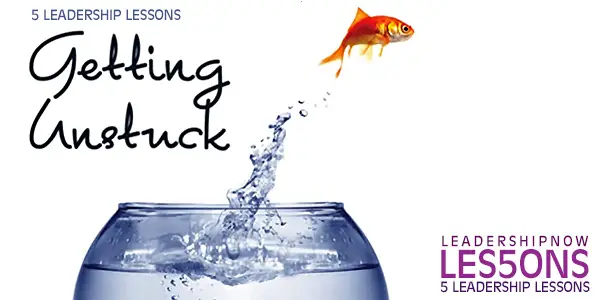
Getting Unstuck: How Dead Ends Become New Paths by Timothy Butler is an interesting look at a chronic human problem: not being able to see the forest for the trees. There are times when we get stuck and find ourselves stewing in our own juices. Our stuck feeling comes from our inability to get our thinking moving again. Sometimes, we get hit so hard that it is hard to get our mind off of the point of impact and instead focus on our response. The decision to get on with it frees us to rally our resources and broaden our repertoire of responses. We will, with the proper outlook, grow to a higher capacity to handle the next crisis that life throws at us. Bulter offers these thoughts:

Posted by Michael McKinney at 09:06 AM
03.23.07

The Well-Differentiated Leader: Managing Reactivity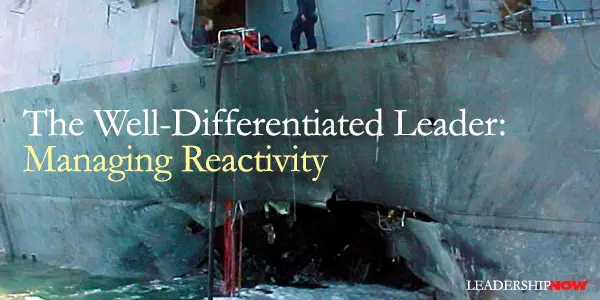
R ECENTLY U.S. Navy Cdr. Kirk S. Lippold spoke about leadership at Highland School in Virginia. You may remember that he was the commander of the USS Cole when it was attacked in Yemen in October of 2000. Lippold said, "When you talk about leadership, for a lot of people, it boils down to one word, and that is integrity. If you have the integrity to do what's right regardless of the circumstances and the situation, you are a leader in your own right, because so many people today fail or waiver on that one key trait. "As commander, you provide the crew with the command philosophy, then you give them goals and guidelines to get there. By that philosophy, you start with the foundation of integrity, but it is also good work ethic, taking care of your fellow sailors, making sure that you look out for each other, not just for the time you are there on the ship, but when you are on liberty.” What he is referring to is similar to an idea Edwin Friedman presents in A Failure of Nerve. It’s what Friedman has termed the well-differentiated leader. It is similar to what is most commonly termed authentic leadership, but I like the way it is articulated here. The well-differentiated leader is not “an autocrat who tells others what to do or orders them around, although any leader who defines himself or herself clearly may be perceived that way by those who are not taking responsibility for their own emotional being and destiny.” By the well-differentiated leader “I mean someone who has clarity about his or her own life goals, and, therefore, someone who is less likely to become lost in the anxious emotional processes swirling about. I mean someone who can separate while still remaining connected, and therefore can maintain a modifying, non-anxious, and sometimes challenging presence. I mean someone who can manage his or her own reactivity to the automatic reactivity of others, and therefore be able to take stands at the risk of displeasing. It is not as though some leaders can do this and some cannot. No one does this easily, and most leaders, I have learned, can improve their capacity.”Two key concepts here are self-knowledge and self-control. What Friedman spurns is a highly anxious risk-avoided, someone who is more concerned with good feelings than with progress, someone whose life revolves around the axis of consensus. He calls this a failure of nerve. Friedman writes, “It is the integrity of the leader that promotes the integrity or prevents the dis-integr-ation of the system he or she is leading.” It was Lippold’s understanding that “you have the integrity to do what's right regardless of the circumstances and the situation” that enabled he and his men to get through the attack. It points again to the fact that leadership is really a character process and not an intellectual one. 
Posted by Michael McKinney at 10:02 AM
03.19.07

Looking for Leaders in All the Wrong Places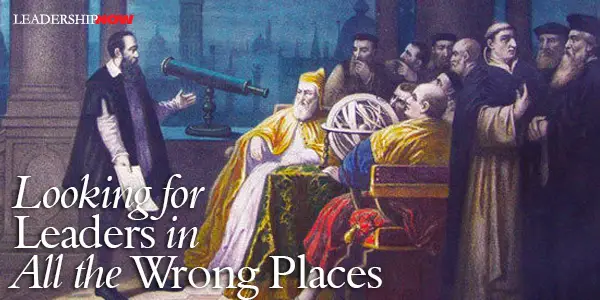
RECENTLY SOMEONE WAS LAMENTING to me the lack of new leaders in their organization. I replied that perhaps they weren’t really looking for leaders. Maybe they were looking for leaders in all the wrong places. We commonly look for what looks like leadership. We look for people who stand out (self-promoters). We look for clones (people who are just like us). We look for the smartest person in the room (technically competent). We look for people who did a good job for us (promote as a reward). Sometimes we get lucky—often we don’t. Ram Charan begins his book, Know-How, with, “What gets in the way of finding people who can perform is the appearance of leadership. All too often I see people being chosen for leadership jobs on the basis of superficial personal traits and characteristics.” He lists some of the trappings that are often mistaken for leadership: • The seduction of raw intelligence: “He’s extremely bright, incisive, and very analytical. I just feel in my gut he can do the job.”As Charan points out, these attributes are just a small piece of the leadership pie. We need to look deeper. While there may be a shortage of leaders, “there is no shortage of people with the capacity for leadership” as Bill George points out in True North. “The problem is that we have a wrongheaded notion of what constitutes a leader, driven by an obsession with leaders at the top. That misguided standard often results in the wrong people attaining critical leadership roles. … We frequently choose leaders for their charisma instead of their character, their style rather than substance, and their image instead of integrity.” He adds, “There are leaders throughout organizations, just waiting for opportunities to lead. In too many organizations, however, people do not feel empowered to lead, nor are they rewarded for doing so.” There is obviously a problem in the way that we approach leadership development. We are taking the path of least resistance. To put the right people in the right jobs and encourage their leadership potential, we must get to know them to see those things that really count. Our preconceived ideas of what a leader is, is just the thing that is getting in our way of finding great leaders. Our beliefs can set us up for selecting leaders that are dysfunctional. Lists of leadership traits and characteristics can help to educate us, but leadership radiates from who we are. Leadership traits and characteristics are just part of the mix that defines who we really are—our character and attitudes. What else could we be doing to find true leaders?
Posted by Michael McKinney at 10:01 AM
03.12.07

The Strategy ParadoxThe Strategy Paradox is about managing risk. It provides a vocabulary and set of frameworks to help us begin to embrace our ignorance about the future and deal with it.The strategy paradox lies in the fact that the characteristics that we typically associate with success are also systematically associated with total failure. That is, the strategies with the greatest possibility of success also have the greatest possibility of failure. Author Michael Raynor, says that resolving this paradox requires a new way of thinking about strategy and uncertainty. In his research he found that strategies normally associated with success look very much the same as strategies that in fact lead to failure as well. What was interesting is that while successful and failed strategies look the same, strategies that lead to mediocre financial performance look very different from strategies associated with both successful and failed strategies. This leads us to the conclusion that the opposite of success is not failure, but mediocrity. So to assume that we are safe with a compelling vision, commitment and a clear focus—all defining elements of successful strategies—is misguided as these elements are also systematically connected with some of the greatest strategic disasters. The real issue is that these elements must be based on an accurate view of the future, and not surprisingly even the best minds often get this wrong. Naturally, the further out you go the greater the degree of strategic uncertainty. One of the reasons the future is difficult to predict is because it is random. In other words, the past isn’t always a good indicator of the future. Randomness enters in your analysis because at some point you have to confine it. You have to leave some data out, thus reducing your accuracy. To avoid this “we find ourselves compelled to build a theory of everything in order to predict anything.” Not practical—analysis paralysis. Another issue is cause and effect. Accurately determining why something happened before—initial conditions—is a judgment call. Even if we are correct, recreating those conditions exactly is not generally doable. (See The Halo Effect.) What are we to do? Raynor suggests implementing what he calls strategic flexibility and using what he calls requisite uncertainty to allocate responsibility for managing uncertainty vertically through an organization. That is, calibrating the focus of each level of the hierarchy to the uncertainties it faces. For instance, Board members should be looking ten or more years out and asking, “What is the appropriate level of strategic risk for a firm to take? What resources should be devoted to mitigating risk? What sacrifices in performance are acceptable in exchange for lower strategic risk?” CEOs looking out five to ten years, should ask, “What strategic uncertainties does the company face? What strategic options are needed to cope with those uncertainties? In other words, it falls to the CEO, and the rest of the senior team, to find ways to create the strategic risk profile the board has mandated for the firm. Moving down the hierarchy, operational divisions dealing a time horizon of two to five years should ask, “What commitments should we make in order to achieve our performance targets? For these folks, it’s no longer about mitigating strategic risks, but making strategic commitments. And then managers with a short term time of horizon of 3 months to a year should ask, “How can we best execute the commitments that have been made in order to achieve our performance targets? There are no strategic choices to make at this level, because the time horizons are too short. What is useful about this book is that it is not just for CEOs. As just shown, people at all levels in an organization deal with a certain amount of uncertainty. Regardless of the timeframe they are dealing with or looking at, the tools outlined here are valuable for managing that risk.
Posted by Michael McKinney at 12:16 AM
03.09.07

Our Strengths Are Not to Be Indulged, But Managed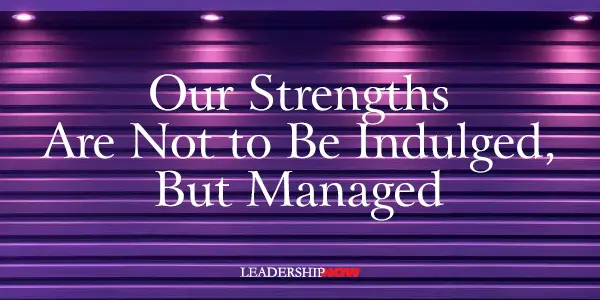
IN Marcus Buckingham’s book, Go Put Your Strengths to Work, he presents three myths that we need to deal with in order to make the most of our strengths. The first myth is, “As you grow, your personality changes.” The truth Buckingham says is, “As you grow, you become more of who you already are.” As it is presented, there could be some confusion. There are a few issues that need to be considered. 
 There is personality, there is behavior and there are attitudes. Although they are dependent on each other and intertwined, they are not all the same thing. In any discussion about any one of them, we have to be careful about what we are talking about. We all have traits that become more apparent as we grow and develop. These traits and talents—strengths—do not change over our lifetime. On the other hand, our behavior and attitudes can be altered, overhauled, modified, transformed or ignored. A scrooge can become generous. An approach that says, “Hey, that’s just the way I am” is a recipe for self-destruction. Buckingham contends that "as you grow, you don't change into somebody else .... Personality tests confirm this. Much as we would like to believe that we change as we grow, if we take a personality test twice separated by many years, the results from the two tests are almost exactly the same." This is true. However, what we are, how we are perceived, how we relate to others, is determined by and large by how we see ourselves and our world, how we see or filter our experiences—our attitude—and how we act based on what we think—our behavior. We may be competitive by nature—our personality—but we need not behave in such as way as to be obnoxious, rude, inconsiderate or demanding. We need not see everything as an opportunity to conquer. We can develop that trait or strength into an asset or we can let it rule our lives by letting it run amok to the point where we become the jerk that Bob Sutton describes in his book, The No Asshole Rule. If we allow it, our strength sabotages us and ends up holding us back from achieving our potential and from functioning well with others. Strengths must be managed, not indulged. The character we develop functions to monitor our strengths so that they serve us and don’t become a liability that holds us back. With that in mind, Buckingham’s point is well taken. It is imperative that we know ourselves—our personality, our strengths—and not try to be something we are not. If we don’t, we diminish our effectiveness. Too often we head in a direction or a career path that does not compliment our innate strengths. These don’t change over our lifetime, and when we work with them rather than against them we can have more effective and fulfilling lives and be of greater service in any area that we chose to make our contribution.
Posted by Michael McKinney at 12:31 AM
03.05.07

Go Put Your Strengths to Work: 6 Powerful Steps to Achieve Outstanding PerformanceMarcus Buckingham’s latest work, Go Put Your Strengths to Work begins by speculating on the source of the strengths movement. He speculates that perhaps for many it may have begun with Peters Drucker’s 1966 comment in The Effective Executive: “The effective executive builds on strengths—their own strengths, the strengths of superiors, colleagues, subordinates; and on the strengths of the situation.” For me, it began in the early seventies when Jack McKinney—my Dad—began presenting his Know Yourself seminars in English-speaking countries around the world. A big part of his seminar was identifying and building on strengths and learning to manage them as the excessive use of strength becomes a weakness. Whatever your introduction was to the strengths movement, Go Put Your Strengths to Work is an attempt build on the shoulders of giants to advance the current strengths movement from just identifying and labeling our strengths to learning how to actually put our strengths to work. This is the real point of the whole process. His practical system is very useful in helping you to do just that. The system is based on 6 steps: 1: Bust the Myths—So, What’s stopping you? The process involves the careful observation of your work habits—using a guided questioning procedure—to turn the best of your job into the most of your job. Simply put, Buckingham defines your strengths as “those activities that make you feel strong.” Conversely, the best definition of weakness is any “activity that makes you feel weak.” Of course, the system is backed by a web site—SimplyStrengths.com—accessed by using the now familiar code given with the purchase of the book. The release of the book is also backed by a nationwide tour by Marcus Buckingham beginning today. This event will also include a private showing of his short feature film entitled Trombone Player Wanted. Related Interest: 
Posted by Michael McKinney at 10:02 AM
03.02.07

Ego Check: Self Check
THERE'S A FINE LINE between being confident and having an out-of-control ego and it has to be managed carefully. No of us is immune to overconfidence and that line is all too easy to cross. Here are four questions Mathew Hayward recommends to ask yourself as a sort of self ego check: Why am I doing this? We need to understand where our pride is coming from. Our pride needs to be based on real achievements and emotions. “We all receive pleasure and pain from how others perceive and respond to us. When taken too far, however, that tendency gives others control over our pride. Playing to others’ aspirations and expectations make us characters in their play. Before long we become inauthentic, rudderless, and self-destructive.” Am I getting the right input into this decision? “Finding and working effectively with the right foils is a critical way of managing one’s pride and, therefore, of curbing false confidence and hubris. The right foils know when to tell us when we are wrong, and they enable us to step back, step in, and step aside.” He adds, “…the key to real and lasting success is to have the right relationships with a number of trusted managers.” Am I seeing, seeking, using, and sharing material feedback? Are we kidding ourselves about our situation? The key here is to get and use the best available feedback. Have I clarified the conditions in which I could be wrong? It is wise to face the potential consequences of our decisions and actions today before they have occurred. By managing what could go wrong, we can factor in the possibility that our actions are driven by false confidence, even if we don’t know it at the time. This is probably a lot like preaching to the choir. If your ego is out of control, you’re no doubt certain that you’re already doing these things.   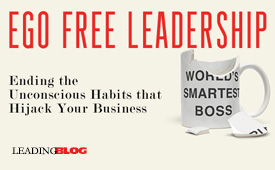
Posted by Michael McKinney at 12:05 AM
03.01.07

Leadership Books: March 2007Here's a look at some of the best leadership books to be released in March.    
Posted by Michael McKinney at 12:11 AM
02.28.07

Firing Back: Coming Back After a Fall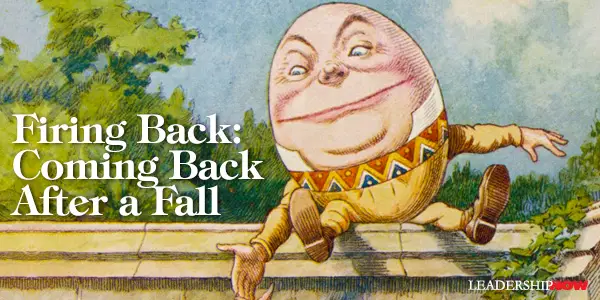
HAVE YOU EVER had a major setback? No. I didn’t think so. Me neither. But in the unlikely event you do or in the more likely event that you know someone who has or will, Jeffrey Sonnenfeld and Andrew Ward have created a well-researched guidebook. Firing Back: How Great Leaders Rebounded After Career Disasters strives to help us through the approaches that have worked for some and those that have backfired on others. Leaders should not be measured by how they bask in the gratification of their accomplishments. Rather, they should be measured by how they respond when fate deflates the joys of hard-earned triumphs. How well do they pick themselves up and get back in the race. The most important thing is to put your defeat into the proper context. This is often difficult to do in a culture that sees failure as a very bad thing and finds it difficult to even discuss. They write, “It is, in fact, wrong to consider adversity a diversion off one’s path toward greatness. The subsequent resilience from calamities has been revealed as vital to the character formation and differentiation of heroic figures…. It is the ability to bounce back from adversity—to prove your mettle once more by getting back into the game—that separates the lasting great from the fleeting greats.” They have developed a five-step strategy for rescuing and restoring your career and reputation—a leader’s most valuable asset—after a devastating professional setback. 1. Fight not Flight. This doesn’t mean to come out swinging, but to face the reality of the situation. “To stand up to the reality of the situation and not to flee from it or shirk the battles that lie ahead in restoring the reputation and career of the leader." Being able to pick your battles is an important component here. In the Wall Street Journal, Peggy Noonan opined in an article entitled, Ford Without Tears these comments about the comeback and legacy of Gerald Ford. He seemed lacking in vanity. There is no evidence that he was obsessed with his legacy. He didn't worry and fret about whether history would fully capture and proclaim his excellence, and because of this, he didn't always have to run around proving he was right. He just did his best and kept walking. What a grown-up thing to do. Former, current and future presidents would do well to ponder this approach. History would treat them more kindly. The legacy of a man who spends his time worrying about his legacy is always: He worried about his legacy.2. Recruit Others into Battle. This assumes you haven’t burnt your bridges. Build strong relationships now. You need to take responsibility for innocent close colleagues who suffer collateral damage with you and then leverage your support networks to reaffirm your credibility through the voices of others. Support from friends and family “can be very influential in reducing the levels of stress felt by the individual suffering from career setback and in encouraging coping behaviors. 3. Rebuild Heroic Stature. Explain the true nature of the adversity. Provide a rational explanation of the context behind any injustice or provide authentic contrition over any missteps you made. 4. Prove Your Heroic Mettle. Regain trust by demonstrating that the setback has not destroyed your professional expertise and character strength. Actions speak louder than words. 5. Discover a New Heroic Mission. Don’t merely define yourself by your past success or failure. Rather, define a new leadership vision and a new path for personal meaning in your work. You may find that you transcend past triumphs. In all of this they caution: Indeed, for many people, the failure to come back successfully is caused by an exclusive focus on the immediate problems of dealing with downfall—often practical and financial constraints that consume the person’s energy and will. 
Posted by Michael McKinney at 12:06 AM
02.21.07

Keeping Your Ego in Check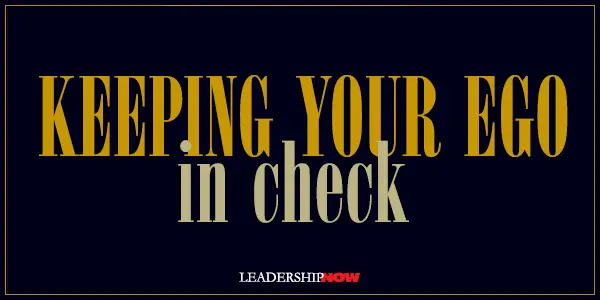
IF A LITTLE EGO is a good thing, too much can be a very bad thing. Managing one’s ego is the subject of Mathew Hayward’s book, Ego Check. “Checking one’s ego at the door is entirely the wrong way to think about managing overconfidence and hubris because it drives a wedge between who we are and how we are supposed to act. Instead, the key is to check our decisions and actions, ahead of time to determine whether they reflect authentic or false confidence.” He suggests that authentic pride is good—even necessary—as it helps us to “appreciate who we are and what we have done” without constantly seeking approval from others. He warns that “the danger is that authentic pride—based on real achievements and emotions—can quickly degenerate into excessive pride. We easily slip into becoming too full of ourselves and operate with clouded judgment. I believe it was Dirty Harry who said, “A man’s got to know his limitations.” He breaks excessive pride—which arises when we develop an inflated view of ourselves based on our need for certain outcomes and approval—into three forms: Dependent Pride: Pride based on what we hope to accomplish—future outcomes—rather than what we have done or are currently doing 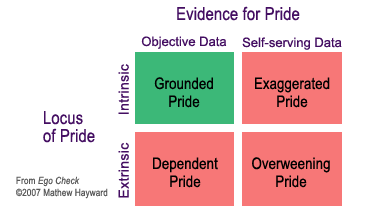 Authentic Pride or Grounded Pride arises when we intrinsically appreciate ourselves based on candid and factual feedback. This type of pride can be a positive force in our lives.   
Posted by Michael McKinney at 10:30 PM
02.16.07

In Difference Lies the Potential to Contribute WE tend to think that if we get the smartest people all together in one room, we will get the best solutions. In a very readable book, The Difference, Scott Page shows that in fact diversity in thinking and perspective produces more and better solutions and contributes to overall productivity. He maintains that “when confronted with a difficult task, be it solving a problem, predicting the future, or making a choice, we benefit by including diverse people.” Value can be added just by virtue of its being different. How many disciplines have benefited from interdisciplinary approaches? Diversity doesn’t necessarily mean black/white or men/women, but diversity in thinking and perspective. He notes that “cognitive diversity increases innovation. Preference diversity leads to squabbles.” So we’re looking for relevant diversity and informed intelligence. 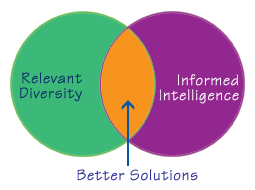 The trap we fall into is that we prefer to continue to work with and consult people who think like us—people with the same general background and types of experiences. The familiarity is more comfortable and seems right to us. In the end, we get the same way of looking at things and we bring the same kinds of tools to the table to tackle our problems. We miss important clues. If one of us gets stuck, then we all get stuck. “People who think alike get stuck.” We also create barriers to innovation and radically new ideas. A preference for working with people who bring the same formal perspectives to bear on a problem leads to segregation by function in firms and by discipline in the academy. In each case, the tendency to interact only with people like us creates the same micro-level dynamic. Each culture in a society, each identity group in a city, each department in a university, and each functional area of a firm ends up building walls around itself. As these walls become higher, the members of each group—be they Evangelicals, African Americans, chemists, or accountants—find themselves inside silos of their own creation. He suggests that we should not only get more kinds of people involved in tackling the issues, we should also encourage our people to think differently by giving them time to pursue individual projects that interest them (varied experience) and by creating skunk works type groups within the organization. He observes, “as individuals, we can accomplish only so much. We’re limited in our abilities. Our heads contain only so many neurons and axons. Collectively, we face no such constraint. We possess an incredible capacity to think differently. These differences can provide the seeds of innovation, progress, and understanding.” 
Posted by Michael McKinney at 08:56 AM
02.15.07

StrengthsFinder 2.0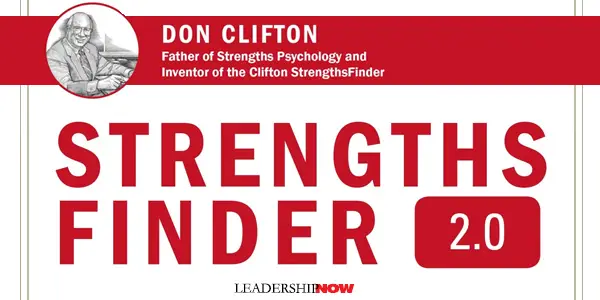
“Most people think they know what they are good at. They are usually wrong . . . . And yet, a person can perform only from strength.” GALLUP PRESS has just released StrengthsFinder 2.0. It’s a handy and improved follow-up to Now, Discover Your Strengths. What’s so new? Gallup has this to say: Our research and knowledge base on the topic of human strengths have expanded dramatically over the past decade. StrengthsFinder 2.0 picks up where the first version left off, and it is designed to provide you with the latest discoveries and strategies for application. The language of 34 themes remains the same, but the assessment is faster and even more reliable. And, the results yield a much more in-depth analysis of your strengths — featuring a look at the nuances of what makes you unique, using more than 5,000 personalized Strengths Insights that we have discovered in recent years. Going far beyond StrengthsFinder 1.0's shared theme descriptions, which can be found in Part II of StrengthsFinder 2.0, these highly customized Strengths Insights will help you understand how each of your top five themes plays out in your life on a much more personal level. For example, even though you and a friend may both have the same theme in your top five, the way this theme is manifested will not be the same. Therefore, each of you would receive entirely different, personalized descriptions of how that theme operates in your lives. These new Strengths Insights describe what makes you stand out when compared to the millions of people we have studied. Once you have completed the online assessment, you will receive a comprehensive Strengths Discovery and Action-Planning Guide that is based on your StrengthsFinder 2.0 results. This guide includes:

Posted by Michael McKinney at 09:51 AM
02.14.07

Simplicity: Focused and On Track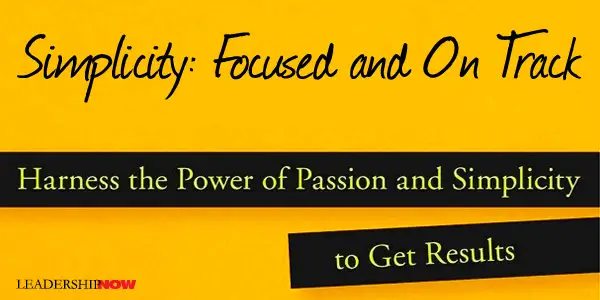 Simple Solutions is directed toward getting things done. It’s about being able to “boil things down to their essence” and thereby bring complex issues down to a simple problem statement. To do this you must learn what is important to all stakeholders. Simplified problems are ones that can be acted one through effective, focused communication. Authors, Tom Schmitt and Arnold Perl provide some practical steps to build this skill. They define a continuum of leadership as: clarity of thought leads to simplicity, which leads to focus and powerful communication—the essence of leadership. Here are a few of the ideas found in this book:
Simple Solutions is directed toward getting things done. It’s about being able to “boil things down to their essence” and thereby bring complex issues down to a simple problem statement. To do this you must learn what is important to all stakeholders. Simplified problems are ones that can be acted one through effective, focused communication. Authors, Tom Schmitt and Arnold Perl provide some practical steps to build this skill. They define a continuum of leadership as: clarity of thought leads to simplicity, which leads to focus and powerful communication—the essence of leadership. Here are a few of the ideas found in this book:
Focus on the Amazing Goal, Not the Incremental. The deadly enemy of innovation is incrementalism. By just trying to make problems better a little bit at a time you can lose sight of the possibility of making a quantum leap. A useful question to help you look for amazing goals is, “What would have to be true in order to/for…?” The answer to the question helps you to think differently and make breakthroughs. Be Directionally Correct. “The fact is there will never be enough time or information to help you arrive at the perfect answer. The right answer can be one that is directionally correct. In other words, the solution may not be perfect, but it’s in the ballpark. This paves the way for more action but at least you’re already working with the customer and aren’t stuck back at the starting gate, still refining the model in the search for the non-existent perfect solution.” Determination versus Distractions. Determination is the willingness and ability to overcome obstacles and to avoid distractions. “Determination requires continued focus and commitment to a project. It requires the business savvy to separate the core of an issue from ancillary matters and then to continue plugging away at the core.” It is important to note though, “determination is an art. It requires walking a fine line between passionate focus and blind stubbornness. Use your judgment to determine if the goal needs to be simplified, changed, or even abandoned altogether. Don’t confuse sheer stubbornness with determination. 
Posted by Michael McKinney at 12:26 AM
02.08.07

Are We Hardwired For Success?Are we hardwired for success? Well yes, if we are working in sync with the way we are hardwired. It probably goes without saying that a person’s skill set helps to determine why they succeed or fail. Obviously, leveraging your particular skills will get you the most return on your effort and thus greater success.In Smarts, authors Chuck Martin, Peg Dawson and Richard Guare have identified 12 brain-based Executive Skills that are developed by young adulthood and are critical for decision making and regulation of behavior. They report that “Executive Skills are grounded in brain functions that have been demonstrated through research in the neurosciences to reside in specific brain locations and to become activated under predictable conditions.” The skills are:
The idea here, of course, is to understand your particular strengths and use that knowledge to match your skills to the type of work that requires or values your skill set. As Marcus Buckingham and others have pointed out, this is not easily or accurately done by introspection or guessing. The book does include the Executive Skills Profile to help you determine this. They explain, “People typically have two or three strengths and two or three weaknesses, with the remaining Executive Skills falling somewhere between. Those that are in between are not generally likely to get you into trouble, but those at the extremes can help you position yourself for greater successes and fewer failures.”
Posted by Michael McKinney at 11:10 AM
02.02.07

Not All Leaders Are the Same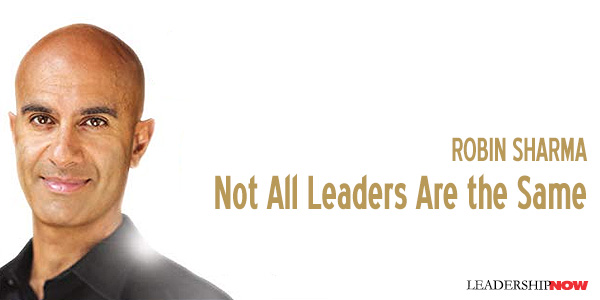
IN The Greatness Guide, Robin Sharma clarifies the mantra that leadership is everybody’s business. While everyone is a leader, not everyone does the same thing. Obviously, not everyone should be running the company. He explains: Know your role. Everyone needs to behave like a leader—no matter what they do. Everyone needs to demonstrate leadership traits—regardless of their position. That means everyone needs to take responsibility for getting results that they generate. Everyone needs to do their part to shape culture. Everyone needs to be positive and inspirational. Everyone needs to keep customers happy and protect the brand. Everyone is a leader. But not everyone is the same. 
Posted by Michael McKinney at 12:10 AM
02.01.07

Leadership Books: February 2007Here's a look at some of the best leadership books to be released in February.    
Posted by Michael McKinney at 01:29 AM
01.26.07

Connections: It’s a Lego World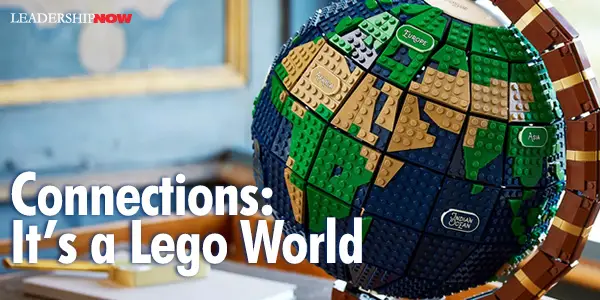
“…The management world is only flat if you take an industrial perspective. If you just want the lowest cost, the capabilities exist virtually everyplace in the world to get the lowest cost. But if cost is not your only concern and you recognize that the industrial world has given way to an information and knowledge driven world, you will see that Indiana and India are not interchangeable. “In the twenty-first century, businesses exist in a Lego world. Companies are built out of Legos: People Legos, Product Legos, Idea Legos, and Real Estate Legos. And these aren't just ordinary Legos; they pass through walls and geographic boundaries, and they are transparent. Everything is visible to everyone all the time. Designing and connecting the pieces is at least as important as providing them. It's crucial to remember that these aren't simply pieces of plastic or metal—they are not just factories or warehouses. They are also humans who program computers, train newcomers, and think about innovation as they prowl malls, libraries, and parks, coming up with new products. These pieces are constantly being put together, pulled apart, and re-assembled. >“My company's Legos—manufacturing, distribution, skills, and services—cannot be unique unto themselves; they have to connect with your company's Legos. I can build my company, but in a year or two, my CEO and I might have to tear down and rebuild part of it in a totally different configuration, perhaps with fewer American People Legos and more of your company's People Legos in Sweden or South Africa. Leading visionaries in business are expressing the same notion. Ray Ozzie, Microsoft's chief software architect, recently explained: 'What's more important than any one individual Lego is that you know how to build with all the Legos. With everything out there, all those programs and applications and accessories, what's important is the ability to find a way to connect fragmented software pieces “…There are no competitors. Let me repeat that, because it's something that Peter Drucker loved to say: 'There are no longer competitors, just better solutions and more choices that can be put together in more ways.'” 
Posted by Michael McKinney at 07:23 AM
01.19.07

Six Sigma Leadership Six Sigma expert Peter Pande writes in his book, The Six Sigma Leader, “Studies have repeatedly shown that the high failure rate of many promising leaders is largely due to an over-reliance on a limited set of capabilities. Many times leaders are promoted because of a strong record of achievement, only to derail later because of their inability to adapt. For example, an individual may be good at demanding high performance from his or her followers, or have strong technical ability. However, those strengths are not sufficient when, for example, big-picture thinking or relationship building are also essential to success. To prepare yourself and others for growing challenges, you need the clarity of thought and flexibility to understand your own weaknesses and develop new talents.” Six Sigma expert Peter Pande writes in his book, The Six Sigma Leader, “Studies have repeatedly shown that the high failure rate of many promising leaders is largely due to an over-reliance on a limited set of capabilities. Many times leaders are promoted because of a strong record of achievement, only to derail later because of their inability to adapt. For example, an individual may be good at demanding high performance from his or her followers, or have strong technical ability. However, those strengths are not sufficient when, for example, big-picture thinking or relationship building are also essential to success. To prepare yourself and others for growing challenges, you need the clarity of thought and flexibility to understand your own weaknesses and develop new talents.”
Posted by Michael McKinney at 12:42 AM
01.05.07

Caught in a Dilemma: Hard Choices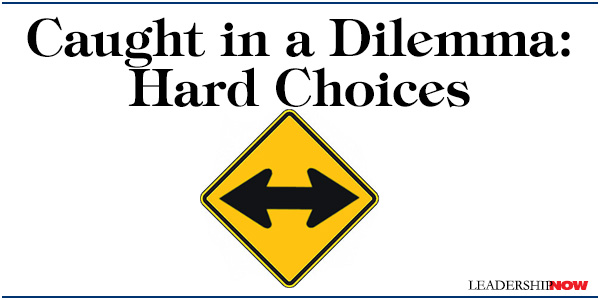 The Book of Hard Choices is a book about integrity. We are reminded that integrity is one of those words that doesn’t mean a thing until it becomes behavior. And it’s all the more important in difficult and challenging circumstances. Eventually, your integrity will be put to the test.
The Book of Hard Choices is a book about integrity. We are reminded that integrity is one of those words that doesn’t mean a thing until it becomes behavior. And it’s all the more important in difficult and challenging circumstances. Eventually, your integrity will be put to the test.
The authors James Autry and Peter Roy have found that the really tough choices are not about money but relationships. And the little everyday stuff is just as important as the big dilemmas. They write, “Once you recognize that your integrity is on the line every day, then your work life takes on a different meaning.” As organizations have pressured their workers to work harder and work longer, they have helped create an atmosphere in which the concepts of civility and cooperation are lost in the hurry-scurry of a high-pressure workplace. Using a series of 23 stories the authors offer up hard choices that we any one of us could face. For example, do you go for the quick fix or teach values first? When the pressure is on to turn things around, the temptation is to skip over a lot of the “pleasantries.” In their example, the CEO said that first, you need to lay out the ground rules and be consistent. “It always starts with respect, and that means respect even under pressure. It takes more time to treat people with respect, and when you are under pressure, it seems counterintuitive to insist on something that takes more time. But without the value of respect, nothing else works. He continues, “Of course you can always try the quick fix, but most of these companies didn’t get into a mess overnight. You can apply the Band-Aid if you’re just planning to flip the business, but I’m not looking to do that. I’m looking to provide a foundation for growth. So if you’re planning to really turn the business around you’ve got to start with basics. No turnaround will be lasting unless you start with the basics. And I think there has got to be leadership by example.” This is great advice. And of course, it applies in all kinds of relationships. It is a foundation of all relationships—both work and personal— of counseling and of creating a learning environment. Most problems we face weren’t created overnight and require to time to bring about a long-term fix. We can’t afford to overlook this first crucial step. 
Posted by Michael McKinney at 08:35 AM
01.01.07

Leadership Books: January 2007Here's a look at some of the best leadership books to be released in January.    
Posted by Michael McKinney at 12:05 AM
12.25.06

Best Leadership Books of 2006 Our selection for the best leadership books of 2006 are listed below. The books listed below—in no particular order—we believe, have added something unique or a useful restating of important insights that we all need to be reminded of as we develop our leadership skills. It's true, as Michael Silverblatt wrote, "The art (as opposed to the technology) of reading requires that you develop a beautiful tolerance for incomprehension. The greatest books are the books that you come to understand more deeply with time, with age, with rereading." Because we only see what we believe, it's through time, experience and personal growth, that we are able to draw insight and connections we didn't see before. In 2006 at least three biographies were released that are worthy of mention:
Posted by Michael McKinney at 10:00 AM
12.18.06

5 Things Leadership is NotGreg Morris, asks us in his book, In Pursuit of Leadership, to consider five things leadership is not:
He adds, “The reality of true leadership is that your rights actually DECREASE as you rise in the organization, while your responsibilities INCREASE. This suggests that leadership involves not power or prestige but servanthood.” In Pursuit of Leadership is an interesting analysis of the life of Moses—a man nearly all of us are familiar with—in terms of his leadership and the path he took to get there. He points out that the accomplishments that Moses is known for “materialized in the final third of his life…. The first eighty years of Moses’ life molded him into a man that God could trust and use. There is no shortcut to spiritual preparation and leadership training. Only through the crucible of life can patience, discipline, character and maturity be developed.”
Posted by Michael McKinney at 08:21 AM
12.15.06

Walt Disney: The Triumph of the American Imagination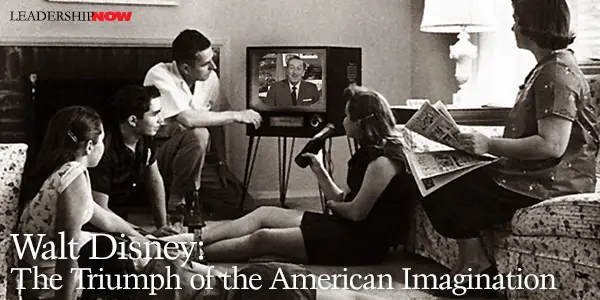
WALT DISNEY is arguably one of the most influential Americans of the twentieth-century. (The Atlantic listed him at number 26 in their recent listing of influential Americans.) He died 40 years ago today at age 65 in Los Angeles. Steven Watts writes in The Magic Kingdom, "Walt Disney operated not only as an entertainer but as a historical mediator. His creations helped Americans come to terms with the unsettling transformations of the twentieth century. This role was unintentional but decisive. Disney entertainment projects were consistently nourished by connections to mainstream American culture — its aesthetics, political ideology, social structures, economic framework, moral principles — as it took shape from the late 1920s through the late 1960s.” The biography of Disney by Neal Gabler is the best portrait of Disney to date. With unprecedented access to Disney family achieves, Gabler tells a story of a man that would not be deterred from his many disappointments and failures to fulfill his dreams and in the end, decidedly alter the American consciousness. Unfortunately for Disney, his dreams didn’t always bring him personal happiness.Disney once remarked, "All the adversity I've had in my life, all my troubles and obstacles, have strengthened me... You may not realize it when it happens, but a kick in the teeth may be the best thing in the world for you." Gabler concludes that of all Disney’s contributions, his greatest is that “he demonstrated how one could assert one’s will on the world at the very time when everything seemed to be growing beyond control and beyond comprehension. In sum, Walt Disney had been not so much a master of fun or irreverence or innocence or even wholesomeness. He had been a master of order.”
Posted by Michael McKinney at 12:06 AM
12.04.06

Leadership Agility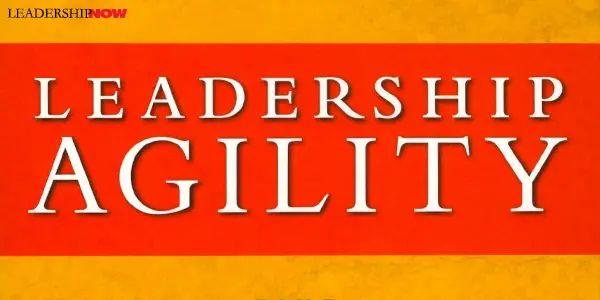
WHAT IS leadership agility? Like agile organizations—organizations that anticipate and respond to rapidly changing conditions by leveraging highly effective internal and external relationships—leadership agility is the ability to take wise and effective action amid complex, rapidly changing conditions. Leadership Agility is an interesting, thorough, and well-written book and one of the best on the topic. Authors Bill Joiner and Stephen Josephs encouragingly tell us that their research “reveals a significant set of findings about the relationship between personal development and leadership effectiveness: As adults grow toward realizing their potential, they develop a constellation of mental and emotional capacities that happen to be the very capacities needed for agile leadership.”Building on the pioneering work of Piaget and Erickson in mapping the stages of human development from infants to adulthood—the pre-conventional stages—the authors identify three more stages they call the conventional stages: Conformer, Expert and Achiever. And finally, there are the post-conventional stages they call: Catalyst, Co-Creator, and Synergist. 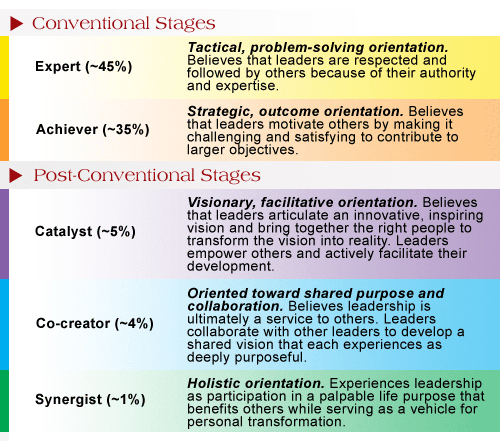 Some people, of course, may never move through all of the stages. Of the 600 managers they studied, most never move beyond the Achiever stage. They write, "Most top executives and administrators, state and national politicians, influential scientists, and other highly successful professionals have stabilized their development at [the Achiever] stage." Only about 10 percent of today’s managers operate at the post-conventional stages of adult development. What does it mean to be at one of the post-conventional stages? Research has shown that people at these post-conventional stages are more deeply purposeful, more visionary in their thinking, and more resilient in responding to change and uncertainty. They’re more welcoming of diverse perspectives and have a greater capacity for resolving differences with other people. They’re also more self-aware, more attuned to their experience, more interested in feedback from others, and better at working through inner conflicts. These stages are sequential and are not personality dependent. In other words, any one can be at any stage but you can move to another stage until you have mastered the one you are at. The question is, “How can we begin to move through these stages of development?” Simply put, you get there by practice—by putting the capacities and traits to work and learning to apply them in various situations. Each stage represents the maturation to a certain point of four competencies and their respective mental and emotional capacities. They state that highly agile leaders orchestrate the four competencies so that they work in concert. They have developed the Leadership Agility Compass to graphically represent these competencies. All eight of the capacities contribute directly to your effectiveness as a leader. 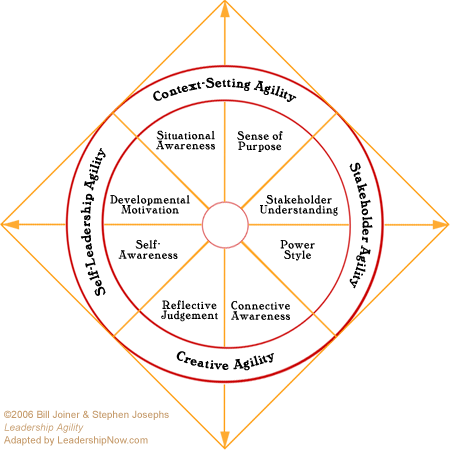 The outer circle on this graphic represents the tasks carried out using the four leadership agility competencies. The middle circle represents the four pairs of capacities that support these competencies. The four mutually reinforcing competencies are: Context-setting agility improves your ability to scan your environment, frame the initiatives you need to take, and clarify the outcomes you need to achieve. It entails stepping back and determining the best initiatives to take, given the changes taking place in your larger environment. Stakeholder agility increases your ability to engage with key stakeholders in ways that build support for your initiative. It requires you to step back from your own views and objectives to consider the needs and perspectives of those who have a stake in your initiatives. Creative agility enables you to transform the problems you encounter into the results you need. It involves stepping back from your habitual assumptions and developing optimal solutions to the often novel and complex issues you face. Self-leadership agility is the ability to use your initiatives as opportunities to develop into the kind of leader you want to be. It entails stepping back; becoming more aware of your thoughts, feelings, and behaviors; and experimenting with new and more effective approaches. After laying this groundwork in far more detail, Leadership Agility provides real life stories to demonstrate what leadership looks like at that level and then clarifies what it takes to move to the next level. You will also learn how to become more effective in your current level of agility. 
Posted by Michael McKinney at 09:02 AM
12.01.06

Leadership Books: December 2006Here's a look at some of the best leadership books being released in December. For a look a little further out see the Upcoming 2007 releases.    
Posted by Michael McKinney at 07:53 AM
11.23.06

Denzel Washington: A Hand to Guide MeThankful for what others have done to guide his life, Denzel Washington put together a valuable book that underscores the lesson: “If you want to change the world, start by changing the life of a child.”A Hand to Guide Me focuses on some important concepts for and value of laying a firm foundation for children by providing examples from the lives of over 70 people like Presidents Jimmy Carter and Bill Clinton, Whoopi Goldberg, Phil Jackson, Hank Aaron, Muhammad Ali, John Antioco, Yogi Berra, Jimmy Carter, Wesley Clark, Jackie Joyner-Kersee, Fr. Monk Malloy, Joe Morgan, Toni Morrison, Colin Powell, Bonnie Raitt, Cal Ripken Jr., Bernard Shaw, George Streinbrenner, Ruben Studdard, John Wooden. Here are a few thoughts by Denzel Washington from the book: • “Train up a child in the way he should go, and when he is old he will not depart from it.” Powerful words don’t you think? It’s a simple sentiment too, and yet I’m amazed how many people lose site of it these days. • Show me a successful individual and I’ll show you someone who didn’t want for positive influences in his or her life. I don’t care who you are or what you do for a living—if you do it well I’m betting there was someone cheering you on and showing you the way. I’ll lay even odds. • This is book is about that certain push, that helping hand we’ve all had to reach for in order to get where we’re going. Train up a child in the way he should go, and he might get to where he’s meant to be headed all along. • I didn’t always make the best choices or put myself in the best situations, and yet at they same time I have to think I made better choices because of the extra efforts of my parents and teachers and coaches, and I put myself in better situations that I might have if I’d been going about it on my own. I had a better chance to find my way because I was open to so many positive outside influences. • The good people you’ve heard from here have all benefited from a guiding hand or two or three. They’ve been on the receiving end of some profound words of wisdom, or they’ve patterned their lives after men and women or principle. They’ve seen one good turn and helped it blossom into another. Or they’ve made a mistake and managed to learn from it and move on. And that’s the greatest lesson we can all take with us as we set this book aside and return to our lives. Keep open—to possibility, to opportunity, to wonder—or remain forever shut off to the encouraging outcomes that await us all. Change happens. The key is to keep reaching for that guiding hand and to keep extending our own. An early influence in Denzel Washington's life was the Boys Club. Some of the proceeds from the sale of this book are earmarked for the 100 year old Boys & Girls Clubs of America. This book is a good reminder to honor those whose shoulders you stand on and redouble your efforts with others.
Posted by Michael McKinney at 08:32 AM
11.10.06

7 Ways Leaders Handicap Themselves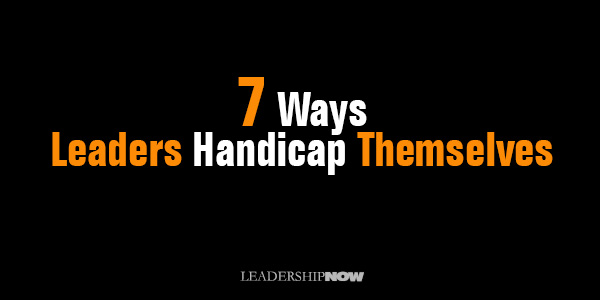
IN A BOOK that captures the essence of leadership—Great Leadership—author Anthony Bell writes, "For all the importance of great leadership, it doesn’t happen by itself. Without a framework, leaders often handicap themselves in a number of significant ways." He outlines these issues:
Bell writes, "To overcome these obstacles, leaders need some guidelines; they need a framework for understanding and exercising great leadership. Leaders stand or fall not so much by their talent or lack of it as by their understanding or misunderstanding of what great leadership is." In his book he discusses a well presented framework that consists of three dimensions of leadership—organizational, operational, and people leadership. He demonstrates how these three dimensions, when properly integrated and applied, will greatly enhance the quality of your leadership. 
Posted by Michael McKinney at 12:12 AM
11.08.06

Crunch Point: Test Your ExcusesBrian Tracy explains in his new book that when you are at a crunch point—that point where problems, difficulties, unexpected reversals,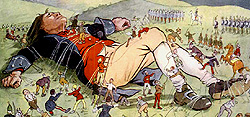 There is a way that you can test your excuses to see if they are valid. It is simply to ask yourself, ”Is there anyone else who has my same excuse but who is moving ahead and succeeding nonetheless?”He suggests once you have identified your main constraint, focus on it until it is eliminated. Don’t let minor issues sidetrack you from alleviating that one constraint. Always bear in mind that your own resolution to succeed is more important than any other one thing. —Abraham LincolnRelated Post: Challenge Assumed Constraints
Posted by Michael McKinney at 12:17 AM
11.01.06

Leadership Books: November 2006Here's a look at some of the best leadership books being released in November. For a look a little further out see the Winter 2006 releases.    
Posted by Michael McKinney at 12:01 AM
10.23.06

The Nature of Leadership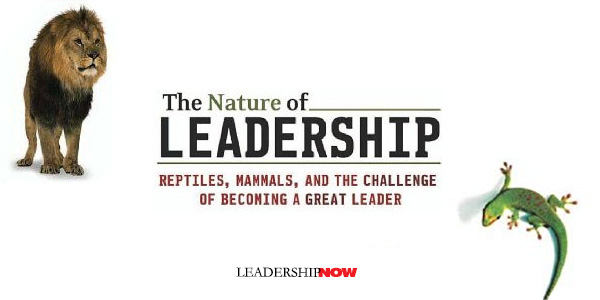
A SURPRISE in this month’s crop of books is The Nature of Leadership by B. Joseph White. Essentially, it is a blueprint for leadership development. He has created a leadership pyramid founded on basics such as a desire to be in charge, and the corresponding ability, strength, and character that all leaders—especially the great ones—must possess.
White cautions, “I make no judgment about the inherent value of Reptiles and Mammals in the workplace. Both are vital and most people are, of course a complex mix of the two. We need task-oriented, no-nonsense Reptiles to ensure the work gets done and done well. We need people-oriented, nurturing Mammals to maintain the human community through which work gets done.” He adds, “I believe organizations falter, fail, or don’t reach their potential both because of leadership that is inadequately Reptilian and because of leadership that is inadequately Mammalian.”
You can read Chapter 1 online: Become a Leader, a Better Leader, a Great Leader 
Posted by Michael McKinney at 05:51 AM
10.09.06

Carly Fiorina On Leading Change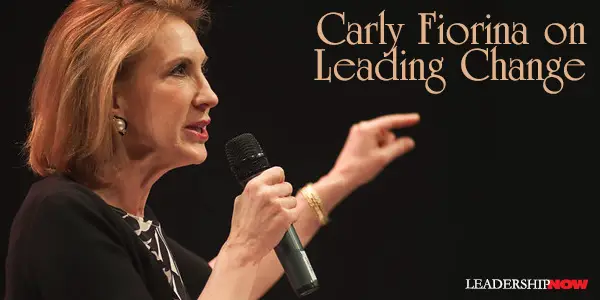
RECOUNTING her days at Lucent, Carly Fiorina writes in Tough Choices about the challenge of bringing about organizational change:  As is true whenever a new leader issues a challenge, a critical mass of the old-timers must rise to that challenge. If this fails to happen, the new leader is simply ignored. People who’ve never operated in large, complex companies are often surprised to learn that even a change agent with title and position can be effectively rendered powerless by people’s collective decision to maintain the status quo. A boss can hire and fire. A boss can reallocate people and money. A boss can measure and reward. A boss can threaten or inspire. Each of these actions and decisions will be analyzed and interpreted by an organization. Some interpretations will motivate change. But no boss, even a president or a CEO, can order people to change. No boss can force people to behave differently. People operate based on their own free will. They will make their own decisions, and in big companies, those decisions are easy to hide. 
Posted by Michael McKinney at 08:18 AM
10.08.06

Carly Fiorina: Hewlett-Packard Leaks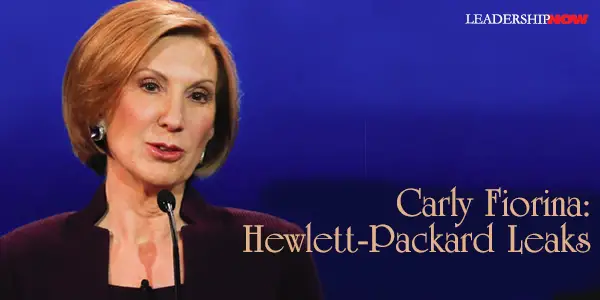
THE New York Times reported Thursday (October 5) that according to former Hewlett-Packard chief executive Carly Fiorina, she “ordered the first of a series of leak investigations into contacts by board members with journalists in January 2005.” In her new book, Tough Choices, she writes that it began with the leak of a January 2005 meeting to the Wall Street Journal. After a suggestion by Larry Babbio that every Board member should resign, she wrote, “I suggested instead that we ask the Nominating and Governance Committee to launch an investigation to be conducted by outside counsel. On rare other occasions when we’d had an ethical issue arise in the company that warranted the Board’s attention, the Audit Committee had conducted an investigation with outside counsel. Because this was a matter internal to the Board, I felt the Nominating and Governance Committee should handle this one. No one argued.” Fiornia continues: Bob Knowling convened the committee by telephone ten minutes later. The members agreed that Larry Sonsini would interview each Board member. Bob requested that Larry use the interviews to conduct not only an investigation but also an objective assessment of the Board. Beyond the leak, there was much about the Board’s dynamics that was disturbing. The committee agreed. Each Board member should be asked their views of the effectiveness of the Board, the qualifications of each Board member, and how we could improve our meetings and deliberations. I thought it was a great idea. We needed to know what had happened to ensure that it never happened again, but perhaps we could also accomplish something more positive and productive. I thought we could weather this storm; we had weathered so many. I didn’t expect anyone to resign over this, nor did I intend to ask. I thought this could be a useful wake-up call to several board members who were not as smart as they thought they were. 
Posted by Michael McKinney at 06:15 PM
10.01.06

Leadership Books: October 2006Here's a look at some of the best leadership books being released in October. For a look a little further out see the Winter 2006 releases.    
Posted by Michael McKinney at 12:11 AM
09.29.06

Danny Meyer: Enlightened Hospitality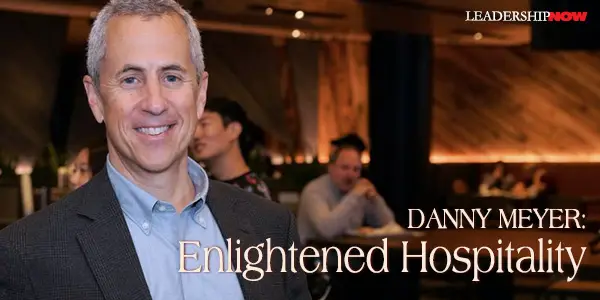
 He told the New York Times in a recent interview, “Show me three world-class art museums with equally good art and one of them will always have friendlier guards than the other two. That’s the one I’m the most likely to return to."

Posted by Michael McKinney at 12:01 AM
09.27.06

Challenge Assumed Constraints Indicators that an assumed constraint may be holding you hostage are negative internal dialogue, excuses, and blaming statements. At one time or another, most of us have assumed that because we did not have direct authority or position power, we could not be leaders or influence outcomes. This is one of the most common constraints in the workplace. Chris Barez Brown put it well in How to Have Kick-Ass Ideas, "Stuck is a feeling—never a reality."
Posted by Michael McKinney at 12:17 AM
09.18.06

You Don't Need A Title to Be A Leader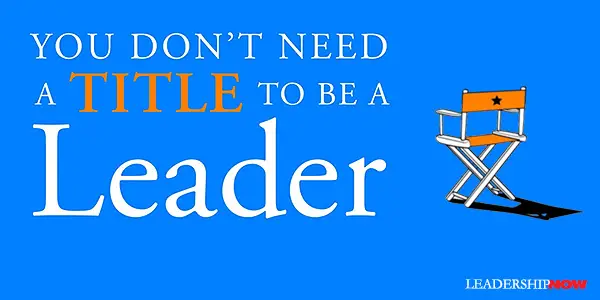
RECENTLY I was talking to a Postal employee about her job. She said that she really saw herself as only a follower. She couldn’t be a leader. She just did her job. After we talked a bit she began to see that by the “little” things she did everyday, she made profound contributions not only to the Post Office but to the people she worked with. I gave her a copy of this book. It will help her to see even more clearly, the important contributions she makes—her leadership role.The fact is, no matter whether we have a title or not, we are at one time or another both leaders and followers. This gem of a book will help you and those you come into contact with, not only understand how they lead in various ways, but how they can step up and make more of a contribution—expand their influence. Mark Sanborn, author of the Fred Factor, has assembled a collection of excellent examples pulled from everyday life to illustrate the important impact we can and do make on those around us. Here is a short excerpt: [A] title is not a job description. There are some things that a title can suggest, like having responsibility for others and getting results. It can’t, however, specifically define what a person does. Titles are broad brushstrokes. Get this book into the hands of those in your organization. Seeing their role in the greater context will give them meaning and quicken their step. 
Posted by Michael McKinney at 09:07 AM
09.14.06

Case Dismissed The root of the word “forgive” is actually to send away—to dismiss.My mother used to say, “You don’t forgive to let the other person off the hook, you forgive to let yourself off the hook.” Good advice.
Posted by Michael McKinney at 12:53 AM
09.07.06

Leading Change: Our Iceberg is Melting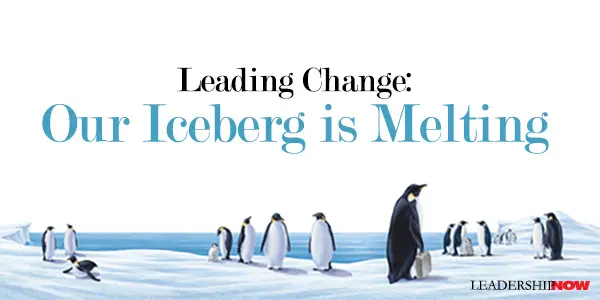
H There is really no organization that is not faced with a changing situation. Technology and globalization are perhaps the biggest issues impacting most organizations today. The difficulties that loom for creating that change can be intimidating. Kotter weaves an eight-step process for successful change through the story. These steps can help you get your mind around the change process. SET THE STAGE: 1. Create a sense of urgency. (not panic) “Problem. What Problem?” Take the issue to the right people. DECIDE WHAT TO DO: 3. Develop the vision and change strategy. Change to what? Too many change initiatives might indicate that you haven’t done this step well. You’ll get change burnout and more resistance. MAKE IT HAPPEN: 4. Communicate for understanding and buy-in. The book helps you to see change differently. The importance of emotions in the change process is emphasized. As recent discoveries about the brain have affirmed, the emotional side of how change happens can have a great impact on a successful change initiative. This is a great story and sure to generate discussion ... and change! Check it out.
> 
Posted by Michael McKinney at 12:48 AM
09.03.06

Leadership Books: September 2006Here's a roundup of some of the best leadership books being released in September. For a look a little further out see the Fall/Winter 2006 releases.    
Posted by Michael McKinney at 10:38 AM
08.25.06

Vital Friends: Who Expects You to Be Somebody? TOM RATH provides an excellent book with Vital Friends. His analysis of the problem is good and the need to focus more on developing the right kind of relationships between people is right on. He rightly states that “friendships are among the most fundamental of human needs. The energy between two people is what creates great marriages, families, teams, and organizations.”
TOM RATH provides an excellent book with Vital Friends. His analysis of the problem is good and the need to focus more on developing the right kind of relationships between people is right on. He rightly states that “friendships are among the most fundamental of human needs. The energy between two people is what creates great marriages, families, teams, and organizations.”
I liked his question, “Who expects you to be somebody?” If you can’t think of anyone, there is something—or perhaps someone—seriously lacking in your life. Rath gets a little tangled up in trying to understand how, with all of the personal development programs available to us, we fail in our relationships. He at times seems to blame self-improvement programs and throws the baby out with the bathwater. Improving yourself is the key to better relationships. But the key to good self-improvement is the focus—the what, why and how of it. Certainly, the I-gotta-be-me self-indulgent inner journey to self-understanding is worthless. I-gotta-be-me is what got us where we are in the first place. The point of personal development is to change me from what I am to a more principled and presentable me. An inward focus on personal development will only have a marginal effect on your relationships. Personal development needs to have an other-directed focus to it for it to be meaningful. Self-understanding helps you to understand others. And that understanding should give you a basis for creating relationships built on outgoing concern for and patience with other people. Improving yourself just to be improving yourself is selfish and of little value. In the end, it will give you little satisfaction and few friends. Selfishness kills relationships. Rath suggests that maybe we need to take a course on friendship. He asks, “Could a second-grade student, a high-school junior, a college freshman, your boss, or even you benefit from time dedicated to this pursuit?” Resoundingly yes! To this end, Jeffrey Gitomer’s Little Black Book of Connections is full of sound principles that can be applied here. I know you’re thinking that this is "another sales tomb," but this is much more and applies to all relationships. Rath also provides ample evidence that friendships at work should be encouraged. Although most companies don't encourage, and some outright forbid, Gallup research shows that close relationships between workers boosts employee satisfaction by almost 50%. Even though spending time with the boss was rated as the least pleasurable time of the day, they found that when employees do have close friendships with their boss, they are more than twice as likely to be satisfied with their jobs. Do the people you influence know you expect them to be somebody? With the purchase of Vital Friends you get access to the web site where you can not only take the Vital Friends Assessment, you can begin to catalog your vital friendships and employ tools to develop stronger relationships with those people. 
Posted by Michael McKinney at 08:45 AM
08.16.06

Thoughts from Lou Holtz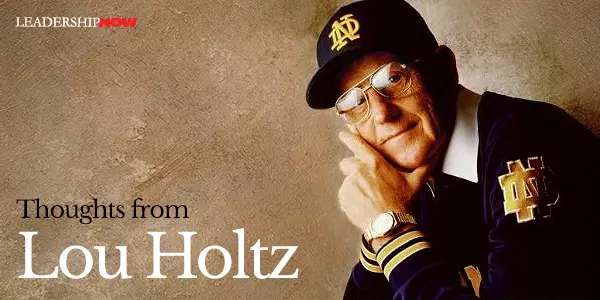
 Choices Count: “When you accept the fact that you are in your present condition, good or bad, because of the choices you have made, you will then find yourself capable of changing your situation by making better choices.” Respect: “What I didn't realize was that authority comes with the job: respect was what I needed to earn, and you earn respect only by proving yourself as a leader.” Faith: “Before joining the Notre Dame family, I heard a lot about the spirit of Notre Dame, but I wasn't sure what that meant. The people were spiritual, and the leaders of the university were driven by the Holy Spirit, of that I had no doubt. But I wasn't convinced the campus itself held anything spiritual. Then, in my first year, I made an interesting observation. I realized that if you don't believe in the omnipresent spirit of Notre Dame, you never feel it. I made up my mind that I was going to believe in this spirit. The moment I started believing, I started feeling it. And the feeling never left.”Staffing: “I expected us to recruit attitude over athleticism, and an aptitude for hard work over natural ability.” Personal Responsibility: “Before you start blaming others, look at yourself. You will find you must look no further for the cause of the problem.” 
Posted by Michael McKinney at 08:34 AM
08.09.06

The Tripping Point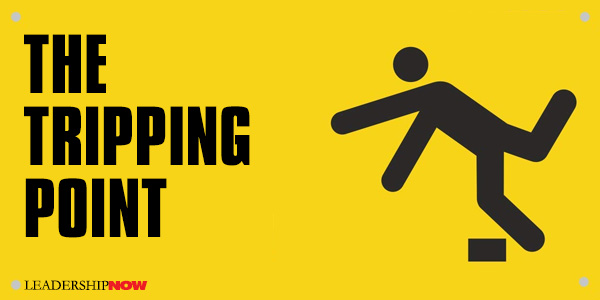
SUCCESSFUL PEOPLE lose more than the average person because they keep trying. Yet it often only takes one success to outweigh the many failures. A successful person takes smart risks. Persistence and the ability to deal with disappointment and often rejection are key characteristics for the successful person. In Success Built to Last by authors Jerry Porras, Stewart Emery and Mark Thompson, they call the inevitable stumbles or failures on the way to success, tripping points. It is these tripping points that successful people “harvest.” Successful people “think of both success and failure as feedback. The question is not whether they won or lost this round, but what they will do with the feedback.” They explain, “The bad news is that even when you’re doing your best, if you fail at any point, you’ll get harsh reviews. Think of the last time you got good press for bad news. … For much of the journey, innovation is hard work rewarded by bad headlines. “This is just one more reason why people hide out from pursuing their full potential to follow their dreams and serve the world. Enduringly successful people aren’t immune. They just tolerate risks, feel the fear, take the brickbats, learn from failure, and do what matters to them anyway.” Failures are inevitable. After you deal with them you must refocus your vision, learn from the failure and make new mistakes. The important thing is to keep moving forward. Successful people “become more resolute after losing a battle they believe in because they learn from the loss—it gives them a better idea of what matters, what works, and what doesn’t." They interviewed, among hundreds of others, retired Stanford professor James G. March who added this, “Short-term reality is an insult to the vision. You have to be self-delusional to create change—it’s a useful craziness guided or founded on your clear identity and knowing what you must do.”The book is an excellent survey of how enduringly successful people have made success happen. There are a lot of great nuggets in here worth taking a look at. We’ll look at a few more of them in the days ahead. 
Posted by Michael McKinney at 12:06 AM
06.22.06

Whole Leadership They have found that many business leaders today are “searching for the key personal quality that will somehow make them successful or whole.” Yet, “quite often, what they need already exists within them but is unrecognized or underdeveloped.” They suggest that mature leaders “often display head, heart, and guts naturally.” Based on years of experience they have developed the wisdom that comes with maturity. They have learned to be flexible and apply the right capacity as the context demands. They note: Maturity doesn’t mean becoming one-third head, one-third heart, and one-third guts. Everyone has a natural leadership style, and a natural tendency to lean on intellect, emotion, or courage doesn’t change with maturity. What does change is a willingness to consider options that don’t fit in with one’s natural style.Unfortunately, companies can’t wait for all of their leaders to become mature so they must learn to develop leadership maturity. While there is no one-size-fits-all formula, this process begins by determining the dominate head, heart or gut orientation of the company. From there, the focus should be on “helping the leadership population increase their capacity in the less dominate areas.… [O]ne goal in developing leadership maturity is to help leaders to recognize how over-reliance on their dominate style prevents them from being successful.” This is not always easy as most leaders think they are more adept at moving from one to the other than they really are. The authors suggest ways to help leaders develop their capacity in all three areas. In today’s environment where the context is constantly shifting, understanding the situation is crucial to success. It is helpful to consider these ideas from a context-versus-content perspective. Content leaders are classic head types, feeling compelled to draw on their knowledge to add value when they meet with others. Context leaders, on the other hand, add value by recognizing other resources when they enter a room and use them effectively. Operating with a context requires heart and guts; these leaders need to take the risk of depending on others to add value, and they must connect with other people so that they are willing to help them accomplish their objectives…. It is less important to them to be seen as the cleverest person around, than to be able to use their head, heart, and guts as the situation requires.
Posted by Michael McKinney at 11:00 AM
06.16.06

The Fred Factor for Kids ... Too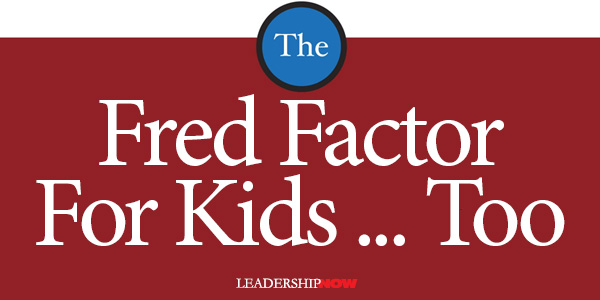
I thought I'd pass this along for the Father's Day weekend. This is a timely piece from Mark Sanborn author of The Fred Factor one of our picks for Best Leadership Books of 2004. Mark writes: Proverbs 22:6 says, Train a child in the way he should go, and when he is old he will not turn from it. Check out the Fred Factor Web Site for resources and to subscribe to The Fred Factor eZine.
Posted by Michael McKinney at 01:20 PM
06.15.06

Fathers: Raise A Generation of Outstanding Leaders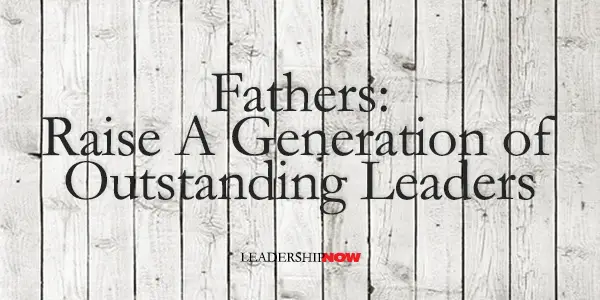
THE National Fatherhood Initiative has found that 24-million American children (over a third of all kids in the U.S.) live in homes without their biological father. Additionally, the absence of a dad from so many homes plays a direct role in a number of social ills. Kids in father-deprived homes are more likely to be abused, poor, prone to drug abuse, prone to poor scholastic achievement, and prone to emotional and behavior problems including suicide and crime. A study if violent criminals in U.S. prisons showed that prison populations are overwhelmingly made up of males who grew up without fathers. 60% of convicted rapists, 72% of adolescent murderers, and 70% of all long-term prison inmates came from fatherless homes.  Pat Williams has been going about the country for years stressing the need for fathers and their role in raising leaders. He insists that no child is too young to begin to develop traits that will serve to help them become outstanding leaders. He writes: Kids want to lead. They enjoy setting goals and then taking the steps to achieve those goals. When do kids become bored? When they feel they are being forced to do something they don’t care about. When do they rebel? When they feel they are being told what to do and how to do it. But give them a chance to lead, give them the opportunity and responsibility to make their own decisions, and they will astonish you with their ability to get things done.  You can read an excerpt of The Warrior Within. He is also the author of Coaching Your Kids to Be Leaders. 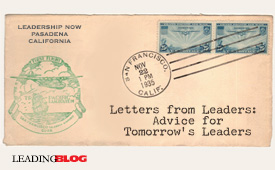 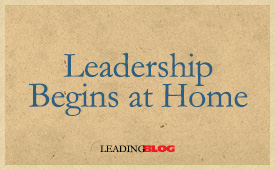
Posted by Michael McKinney at 12:24 PM
05.22.06

Looking for Leaders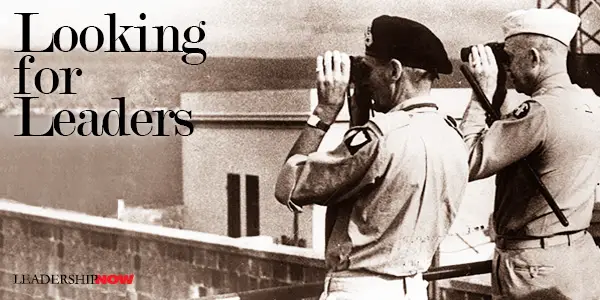
WHERE TO FIND good leaders has always been an issue. In our search, we unfortunately, find it easiest to gravitate to the role players— those people who appear to have the qualities we are looking for but really just are good at playing the “game.” They have been around long enough and possess enough ambition to get themselves noticed. These people help to produce the cynicism found in many organizations because they are not effective leaders but effective self-promoters. Once given a title they struggle to keep up because they just don’t have the substance required for the job. General Dwight Eisenhower writes about these people with fake reputations, as he calls them, to his friend General Prichard. This is excerpted from Alan Axelrod’s book, Eisenhower on Leadership: This is a long tough road we have to travel. The men that can do things are going to be sought out just as surely as the sun rises in the morning.In a letter to a friend and fellow commander Vernon E. Prichard, Ike took up the theme of leadership he had discussed in his letter to Scrappy Hartle just two days earlier. “Fake reputations,” he wrote, “habits of glib and clever speech, and glittering surface performance are going to be discovered and kicked overboard.” Those who remain are people capable of “solid, sound leadership,” possessed of “inexhaustible nervous energy to spur on the efforts of lesser men, and iron-clad determination to face discouragement, risk and increasing work without flinching.” Those who remain are the people who also possess “ a darned strong tinge of imagination—I am continuously astounded by the utter lack of imaginative thinking among so many of our people that have reputations for being really good officers.” Finally, those who escape being kicked overboard are those who are most dedicated and “able to forget . . . personal fortunes. I’ve relived two seniors here because they got to worrying about ‘injustice, ‘ ‘unfairness,’ prestige.’” Need will find leaders, but Ike counseled his friend Prichard to get a jump on need by starting to look right now. “While you are doing your stuff from day to day, constantly look and search among your subordinates for the ones that have those priceless qualities in a greater or lesser degree. . . . [Y]ou will find greater and greater need for people upon whom you can depend to take the load off your shoulders.”
Posted by Michael McKinney at 09:51 AM
05.12.06

Asset-Based Thinking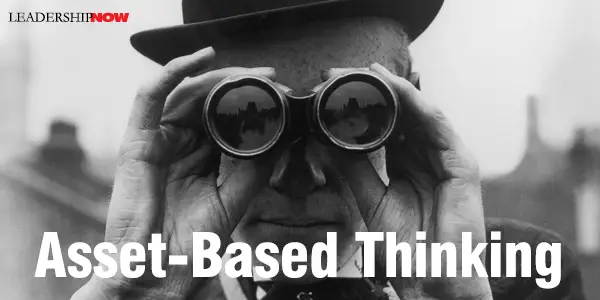
DOUGLAS RUSHKOFF wrote, "Instead of focusing on what we still lack, we must take stock of what we already do have in terms of resources, abilities, and pure will." This is the essence of asset-based thinking. It's not to be confused with the head-in-the-sand everything-is-wonderful way of thinking. That's the other ditch of typical one-dimensional thinking. It’s not about finding everything that’s wonderful around you to create a false sense of euphoria. It’s about asking, “What are the assets here?” What is working?” and how can I use these things — how can I leverage these things — to reach my goals. What is being encouraged here is reality-based multidimensional thinking. It demonstrates that there is another way of thinking about or looking at most every situation. Through brilliant design (as shown below), Change the Way You See Everything illuminates these concepts. Authors Kathryn Cramer (psychologist) and Hank Wasiak (advertising) ask you to image the seismic shift that would occur if people just focused their attention on opportunities rather than problems, strengths more than weaknesses and what can be done instead of what can't. When you decrease your focus on what is wrong (deficit-based thinking) and increase your focus on what is right (Asset-Based Thinking), you build enthusiasm and energy, strengthen relationships, and move people and productivity to the next level. We all need this book. Despite the fact that this is a simple — yet life-changing concept — it doesn't make it any easier to execute these ideas in our lives or organizations. Unfortunately, the fact is our default setting is toward deficit-based thinking. We gravitate towards the negative, towards what’s not working. This mode of thinking and viewing the world holds us back. Deficit-based thinking is driven by fear. Asset-based thinking is driven by desire.
This is an important book. It is both mentally and emotionally engaging. Get this book for yourself and anyone you care about. Asset-based thinking is the foundational step that you need to put into place in order to build a success system that has a sense of personal responsibility, creativity and resilience.

Posted by Michael McKinney at 01:11 AM
05.10.06

The Managerial Moment of Truth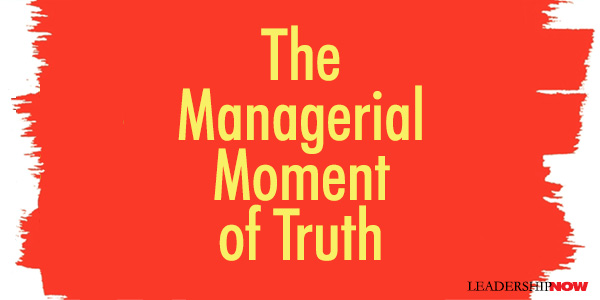
In The Managerial Moment of Truth, authors Bruce Bodaken and Robert Fritz claim that “truth is one of the most important competitive advantages there is in building a business.” It’s vital for creating an organization of learning individuals. Knowing what’s going on in reality gives organizations a better chance of success. “Without perceiving reality, it is next to impossible to succeed because invariably decisions are made in a vacuum.” The phrase managerial moment of truth refers to that moment when the leader has the choice to ignore or call attention to something that has occurred. They observe, “Too often, managers think they have only one of two unpleasant choices: to have a contentious confrontation or to avoid addressing the situation. Whichever path they choose, real or lasting change rarely happens.” They caution that telling the truth isn’t the same as “spouting our opinions or sharing our feelings. Groups that really tell each other the truth are the ones that ask each other questions, seriously seek to understand opinions that are different than their own.” The authors developed a practical procedure that has been used successfully at Blue Shield of California where Bodaken is Chairman, President and CEO. It's a way of telling the truth and getting to the bottom of an issue without hurting people. The technique has four steps: 1. Acknowledge the Truth — Entails the awareness that there is a difference between what you expected and what was delivered and the decision to do something about it.
The idea is to deal with these moments while they are small issues and before there is a need for a full-blown confrontation. Truth telling is a powerful agent of change. This system gives people the best chance to learn in a positive and safe environment. In the end facing reality is a lot easier than all the fancy footwork required in avoiding it. Great leaders are also great mentors. Greatness is hard to achieve without a substantial amount of learning built into the fabric of the organization. Mentorship is the most direct path to learning because it is done within the context of real work set against the realities of the world. 
Posted by Michael McKinney at 12:19 AM
05.08.06

Integrity is the Key to Success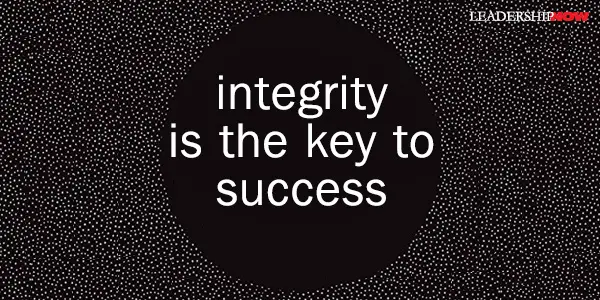
FOR THOSE WHO WISH to increase their performance or to help others to do so, Dr. Henry Cloud believes integrity is the key. By integrity, he means being a whole, integrated person. It’s about wholeness. It means a person who is "running on all cylinders." It’s more than simple honesty and ethics. In his book, >Integrity: The Courage to Meet the Demands of Reality, he focuses on the essential need for the character development necessary to make a person or an organization successful. The concept is built upon six traits of integrity: 1. Establishing Trust. This is the ability for someone to get outside their reality, agendas and concerns and connect with, understand, and work with the realities and concerns of the other person or people. 2. Orientation Toward Truth. This gets at the ability to operate in reality and deal with it. 3. Getting Results. Beyond a work ethic and working hard this trait is about how a person is put together that actually causes hard work and effort to end up in real results. 4. Embracing the Negative. Those who succeed are those that understand that life is about solving problems. They seek out the problems and develop the ability to solve them. The ability to move something forward when something bad happens. 5. Orientation Toward Growth. Not the desire to maintain but a real desire to grow and increase. 6. Orientation Toward Transcendence. The ability to see the big picture and to serve something larger than yourself. Any of these areas can be developed, but growth won’t happen because you feel you ought to do this. “Ought “ is not a good motivator. So how do you change? Cloud suggests: People change when they play the “movie,” which is to take a hard reality look at your life and work, then play that reality forward to see if you like the way the future movie of your life and career plays out. In that way, people begin to experience the future losses, rewards, and consequences right now and get with reality. When you look, for example, at your present performance, and the things that you are not getting, and then you realize that if you continue to do the same things expecting different results, you will never get what you want, you will change. 
Posted by Michael McKinney at 04:00 AM
05.05.06

Fire Someone Today
Fire Someone Today sounds like a book of contrary advice for bosses. Surprisingly, it is a book full of down-to-earth, practical, and tested advice for leaders seeking to better their company and the lives of those who work for them. It is written in a conversational and helpful tone by Bob Pritchett, President and CEO of Logos Research Systems (makers of Bible Software). Firing someone is never easy. Consequently, we often find ourselves doing everything we can to avoid facing the issue. And the reasons we come up with sound pretty good and effectively forestall the inevitable. However, Pritchett explains these are not just bad reasons; these are selfish excuses. Compassion is caring about others, but retaining the employee who should be fired is all about caring for ourselves—it is never about the employee. We want to protect our investment, our presumptuous feeling of parental responsibility, our time and energy, even our reputation for "being nice." If employees quit or were hit by the proverbial bus, we would find a way to address any real issues related to their sudden absence—we would have to, because their departure date would be out of our control. Pritchett reminds us that firing the employee should be a last resort after trying to retain the person in a different position (in reality, not in name only). But if it has to be done, he explains how to do it right. When we don’t fire employees who need to be fired, we aren't doing anyone any favors. When we don’t fire someone we should, our inaction is malicious. We are hurting our organization and wasting the employee’s time on a job with no future. Our motivations are most likely selfish; at the very best, we are just being stupid. Some of the other great and immediately practical advice: Nobody Needs an Optimistic Accountant: You should be optimistic about your business. Your salespeople should be optimistic about your business. Your parents, your children, your vendors, and your employees should be optimistic about your business. You do not want any negative, pessimistic, whining, cry-baby Chicken Littles on your team. Except for your accountant. Fire Someone Today will help you too look at business problems through another lens and show you how to deal with them head-on in constructive and profitable ways. 
Posted by Michael McKinney at 06:59 AM
05.01.06

Appraising Business Ideas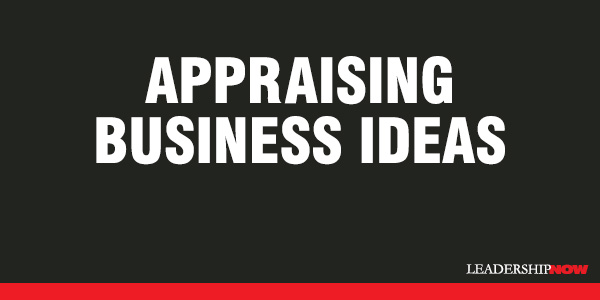
WE don’t know what we don’t know, so we have to proceed with our minds open and be willing to modify what we think we know in the face of credible data. How do we know when we have come across credible data? In the Stanford Social Innovation Review, Hard Facts authors Jeffrey Pfeffer and Robert Sutton, presented some rules to keep in mind when evaluating or developing business ideas:

Posted by Michael McKinney at 12:00 AM
04.26.06

Evidence-Based Management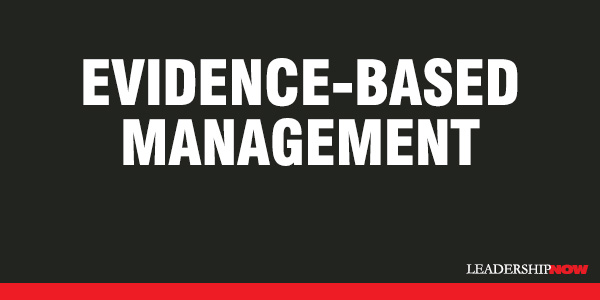
OBSERVING that if doctors practiced medicine the way many companies practice management, there would be far more sick and dead patients, and many more doctors would be in jail, professors Jeffrey Pfeffer and Robert Sutton Evidence-based management is really a way of thinking and looking at the world. The mindset rests on two disciplines: "first, willingness to put aside belief and conventional wisdom—the dangerous half-truths that many embrace—and instead hear and act on the facts; second, an unrelenting commitment to gather the facts and information necessary to make more informed and intelligent decisions, and to keep pace with new evidence and use the new facts to update practices." Some specific half-truths discussed in the book: The best organizations have the best people; financial incentives drive company performance; change or die; great leaders are in control of their companies. Instead of following half-truths, Pfeffer and Sutton endorse principles such as: Treat your organization as an unfinished prototype; see yourself and your organization as outsiders do; power, prestige, and performance make you stubborn, stupid, and resistant to valid evidence; evidence-based management is not just for senior executives; and ask the best diagnostic question: What happens when people fail? 
Posted by Michael McKinney at 12:05 AM
04.21.06

Napoleon’s Six Winning Principles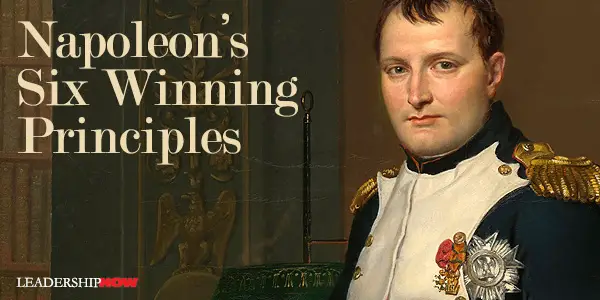
NAPOLEON still manages to get a lot of press. In his book Napoleon on Project Management, Jerry Manus effectively develops practical lessons from the career of the French leader. At the core of his analysis are Napoleon’s Six Winning Principles. These principles are meant to serve as a compass and not as hard and fast rules. However, Manus notes that “these principles work together and feed off one another like interlocking gears. A lack of any one of them will impede success." A chapter is devoted to each point, but here’s a quick summary:
Manus writes that Napoleon’s downfall was that his success eventually led to his undoing. The principles that had brought him success began to unravel. He offers four critical warning signs that we need to watch for: power (self-righteousness), overzealousness (obsession), scarcity of effective leaders (disorder and mistrust), and an unbalanced lifestyle (leading to burn out and loss composure and health). The bottom line: …if we adopt a compliance mentality as a result of our power, isolate ourselves from our leaders and subject-matter experts, and forget to involve our stakeholders in major decisions, we will turn around one day and there will be nobody behind us. And with nobody behind us, we can no longer call ourselves leaders. 
Posted by Michael McKinney at 09:12 AM
04.04.06

What Makes a Business Classic?ACCORDING to the Financial Times it is the business book that provides the most compelling and enjoyable insight into modern business issues, Simon London, the Financial Times management editor, lists his five great business books: • My Years With General Motors by Alfred Sloan, 1963
Posted by Michael McKinney at 03:27 PM
04.03.06

Servant Leadership
IN Peter Temes' remarkable book, The Power of Purpose, he gets to a fundamental point of servant leadership right from the get-go. He writes: Imagine the man or woman who looks at the world and understands, this is when I should push, here is the opportunity to reshape the world in some small way, and knows too when to say, here is when I must step back, here is when my desire has to yield to patience. The real power lies in being able to see both visions. He’s writing about the balance between ambition on one hand and humility and patience on the other. Being able to read a situation is fundamental to this balance and it comes from having both self-knowledge and a quality best described as mindfulness. This is the essence of servant leadership; an outward focus. (By the way, if you are interested in looking into the topic of mindfulness, Mindfulness by Harvard professor Ellen J. Langer is well worth your time.) 
Posted by Michael McKinney at 09:30 AM
|
BUILD YOUR KNOWLEDGE
 

How to Do Your Start-Up Right STRAIGHT TALK FOR START-UPS 
Grow Your Leadership Skills NEW AND UPCOMING LEADERSHIP BOOKS 
Leadership Minute BITE-SIZE CONCEPTS YOU CAN CHEW ON 
Classic Leadership Books BOOKS TO READ BEFORE YOU LEAD |
|